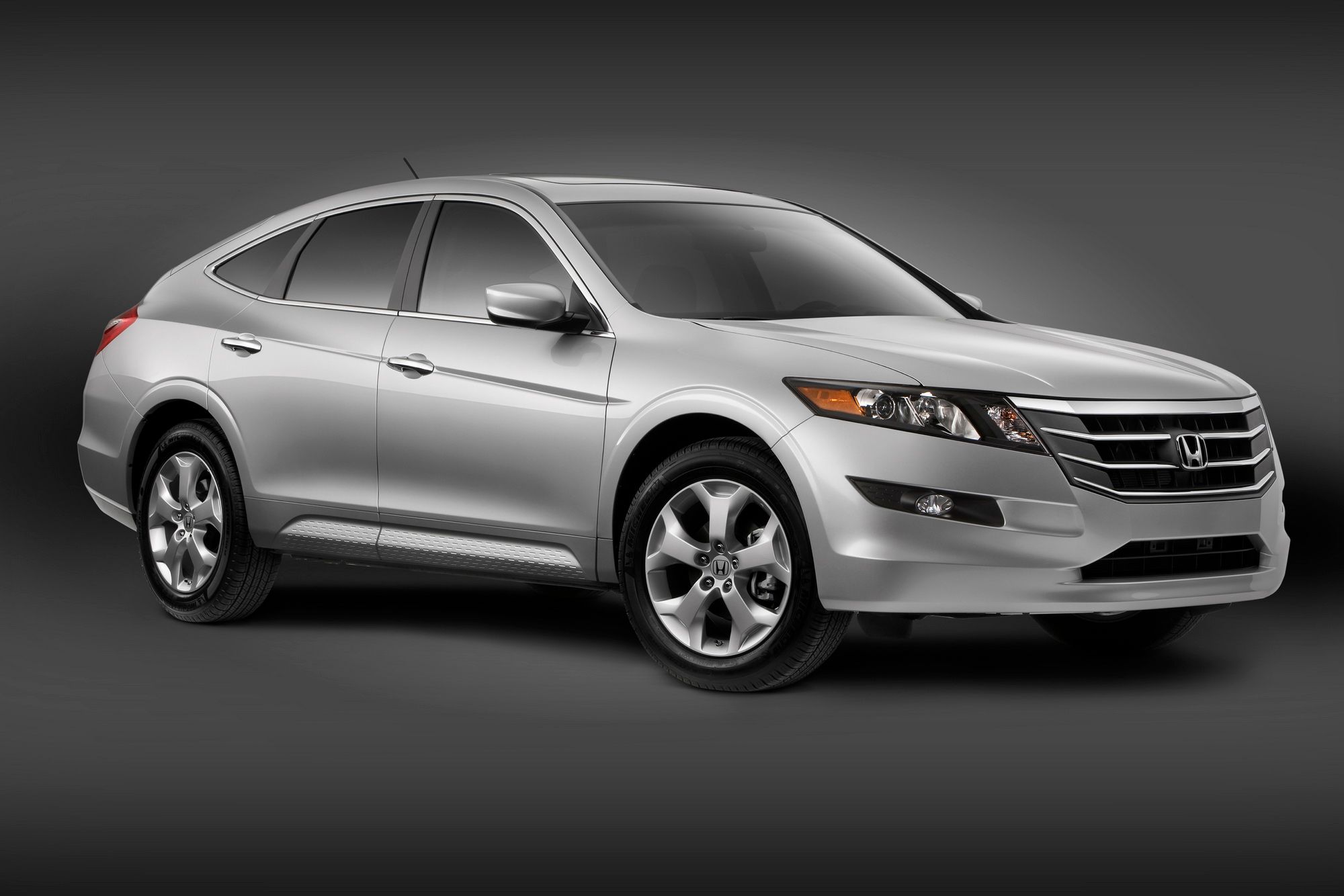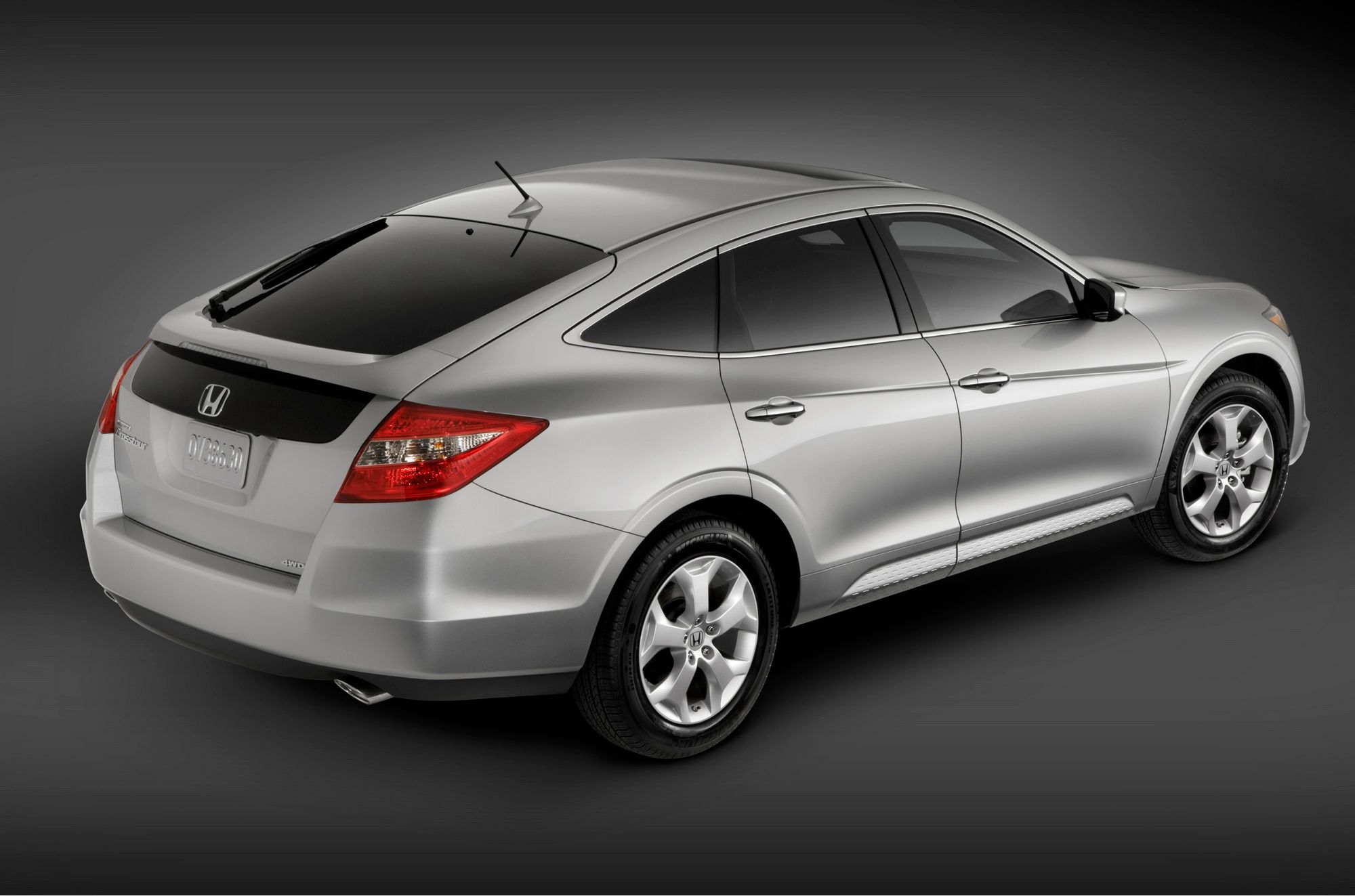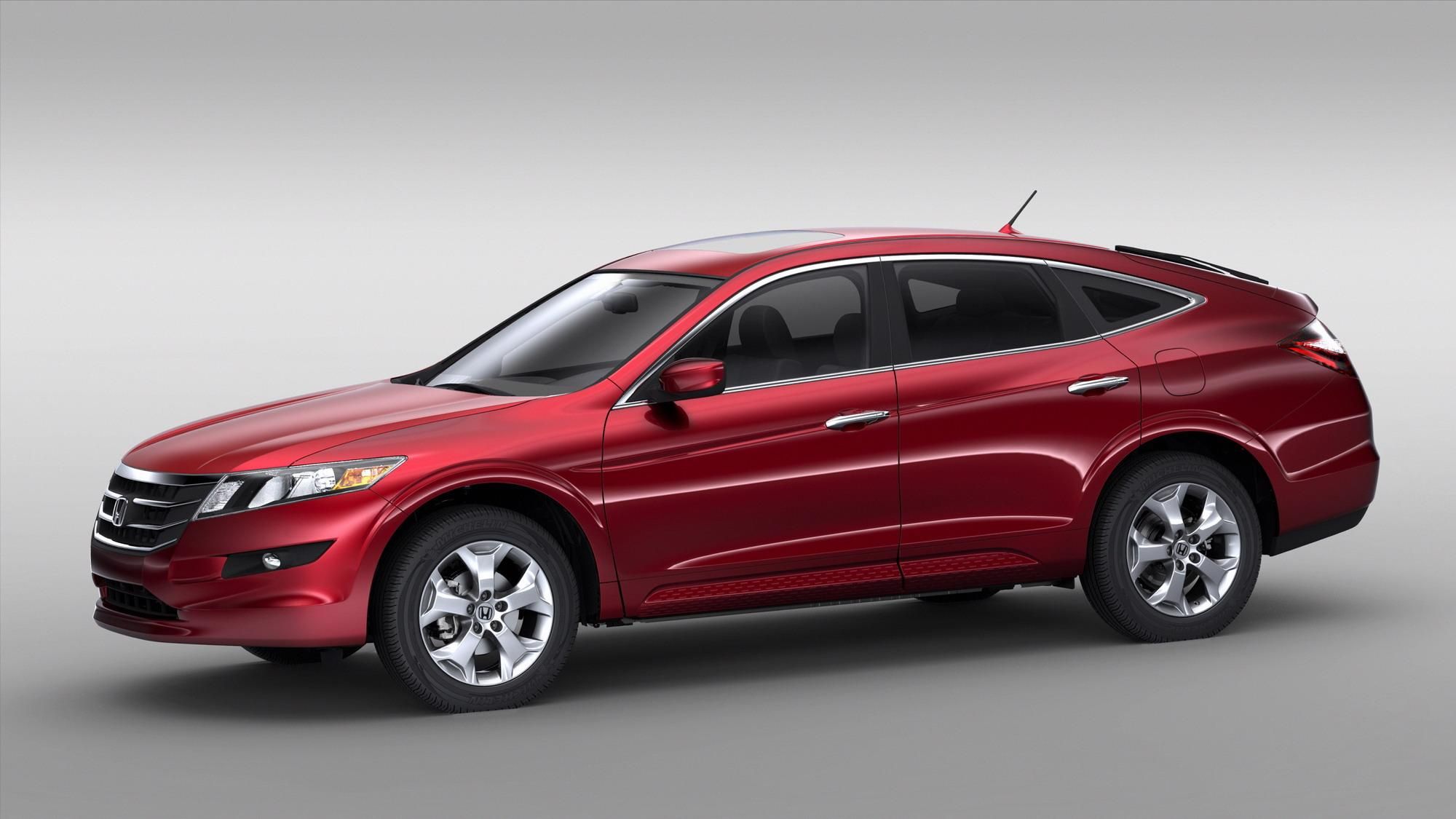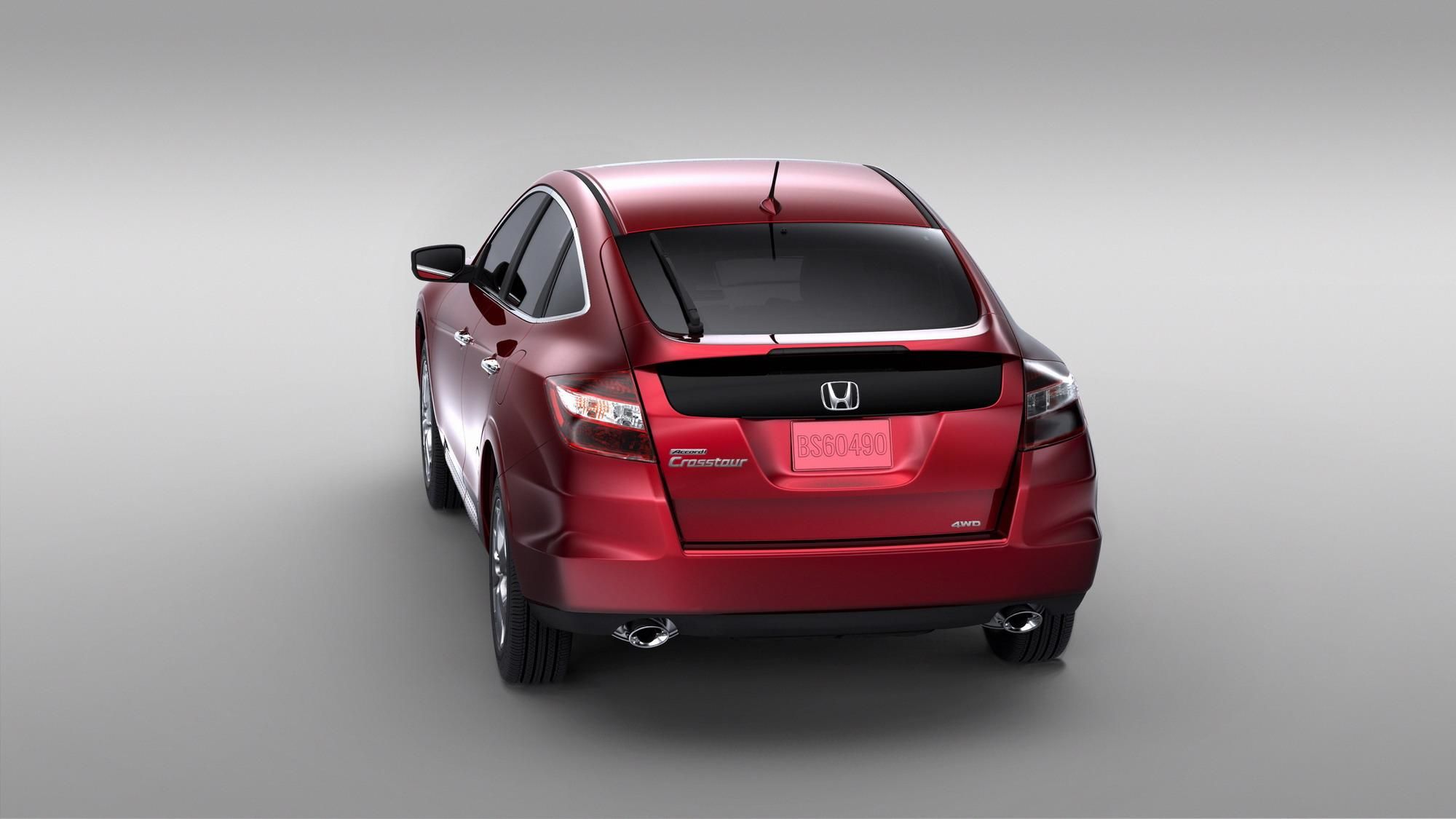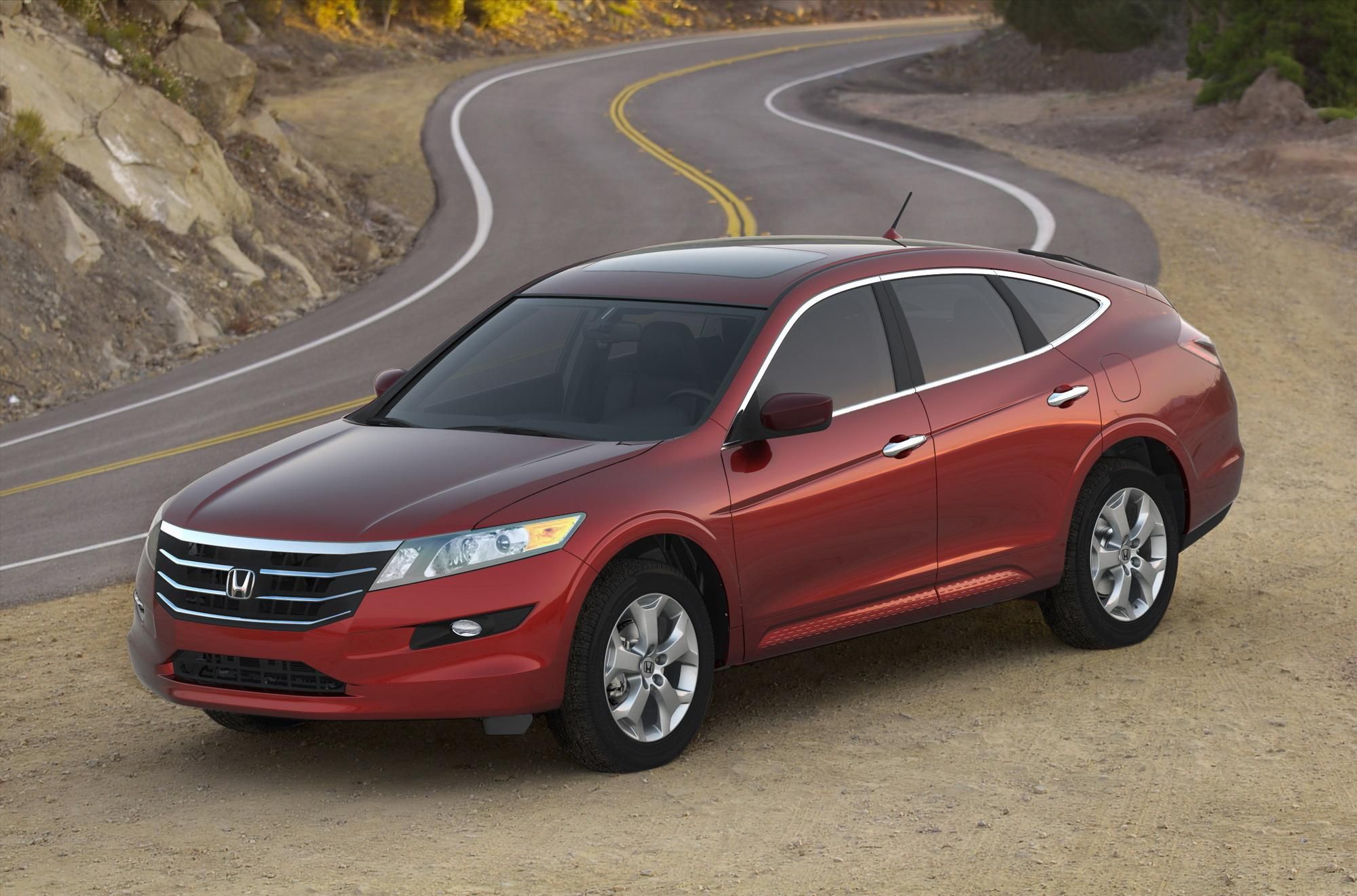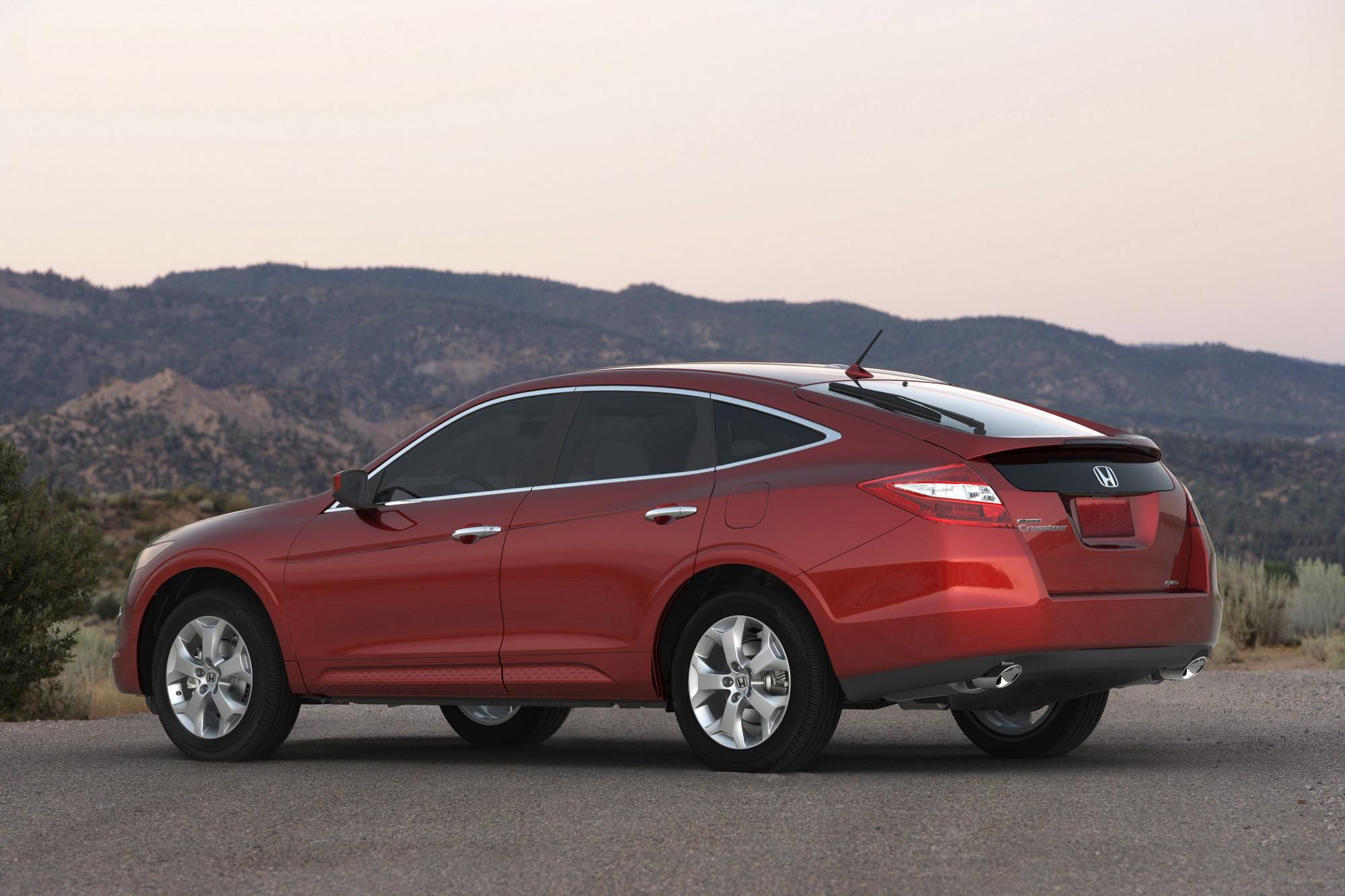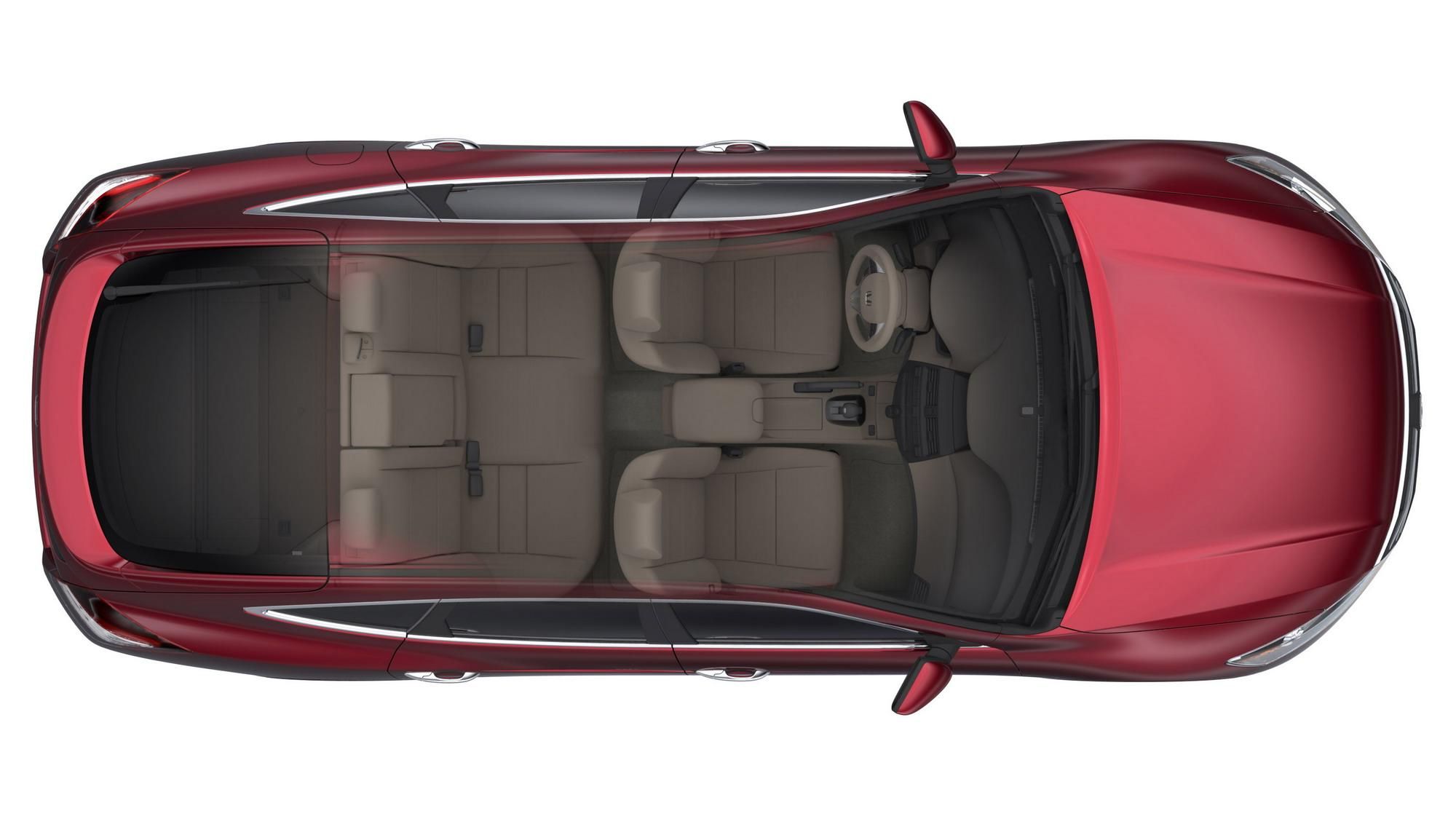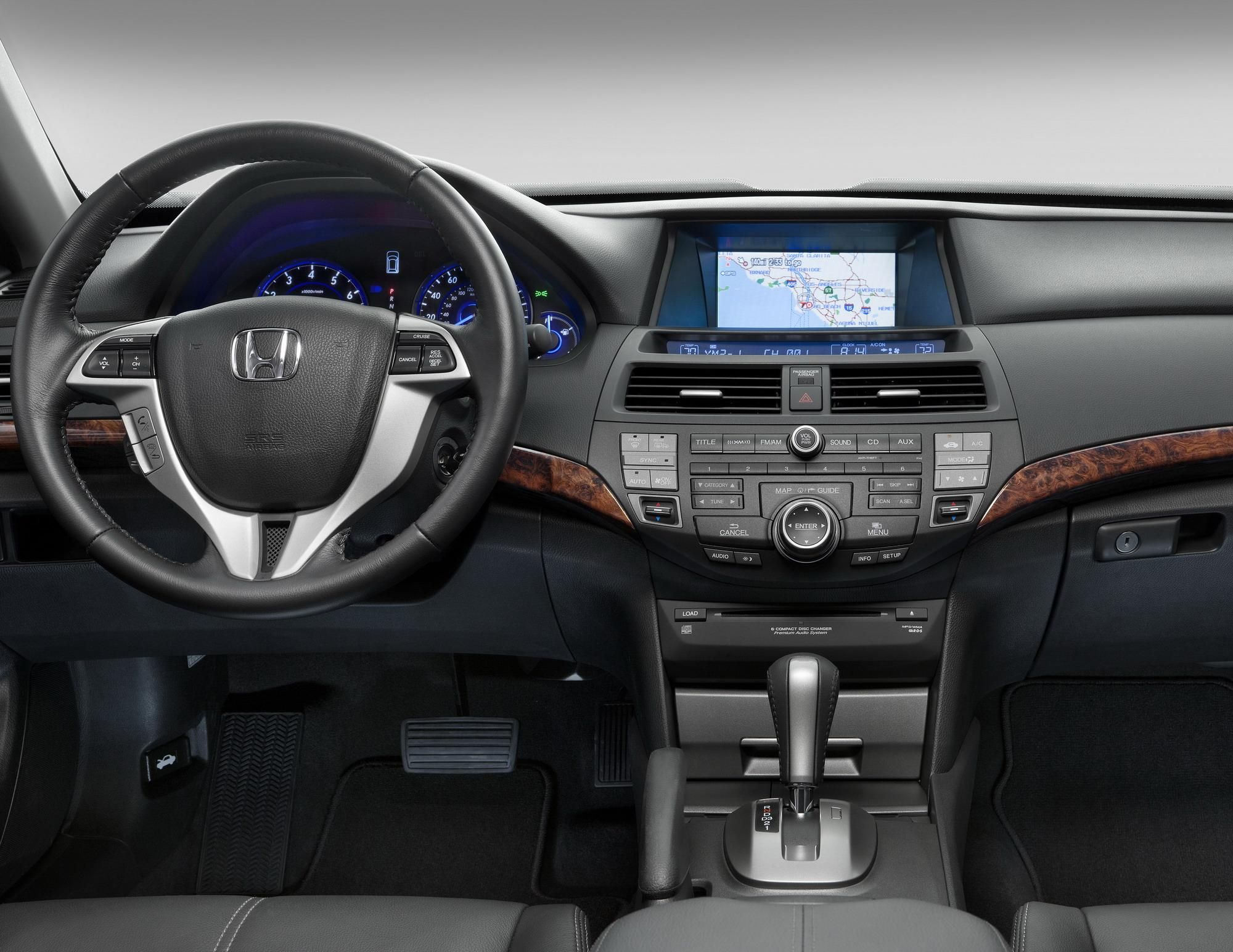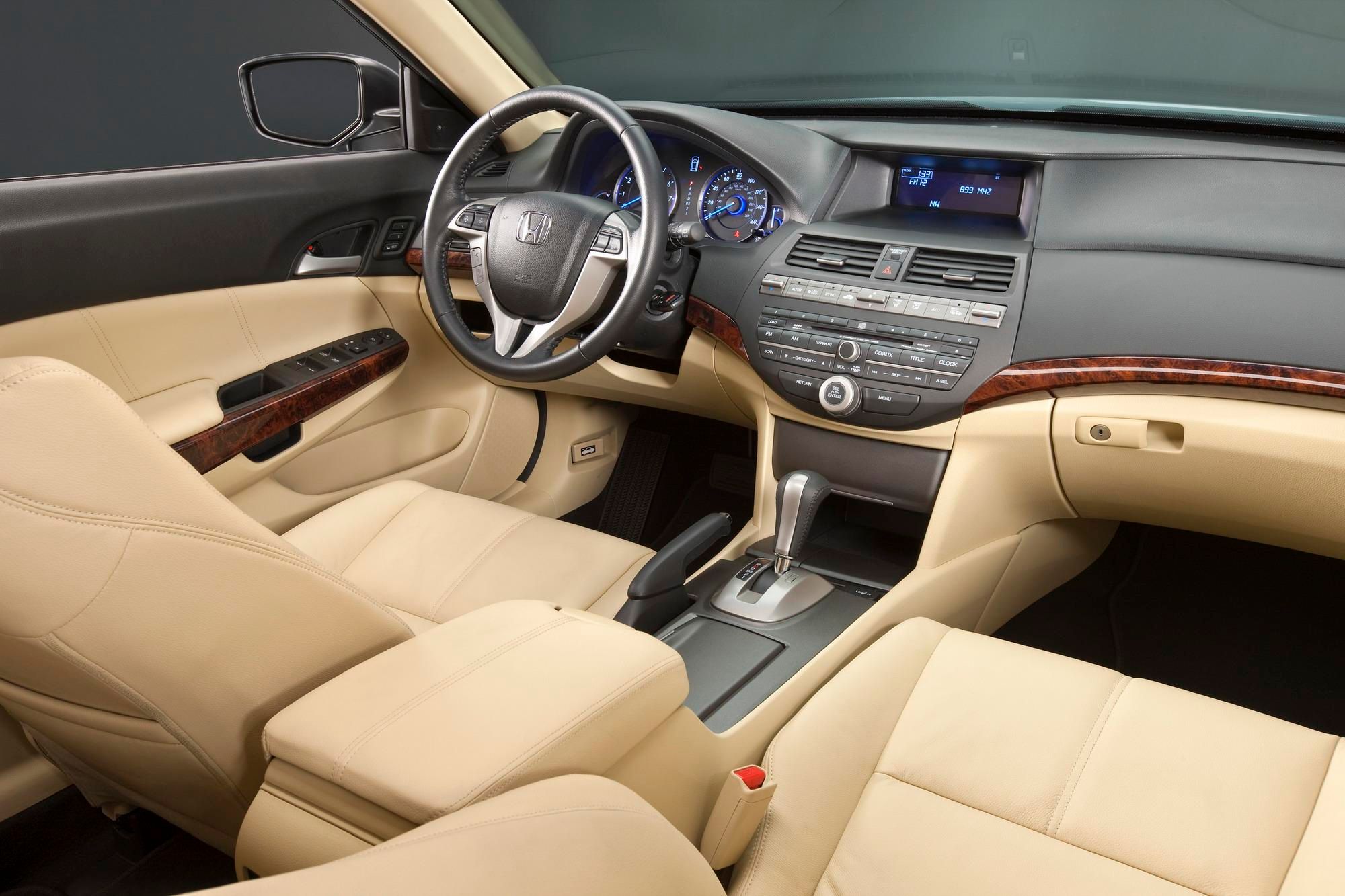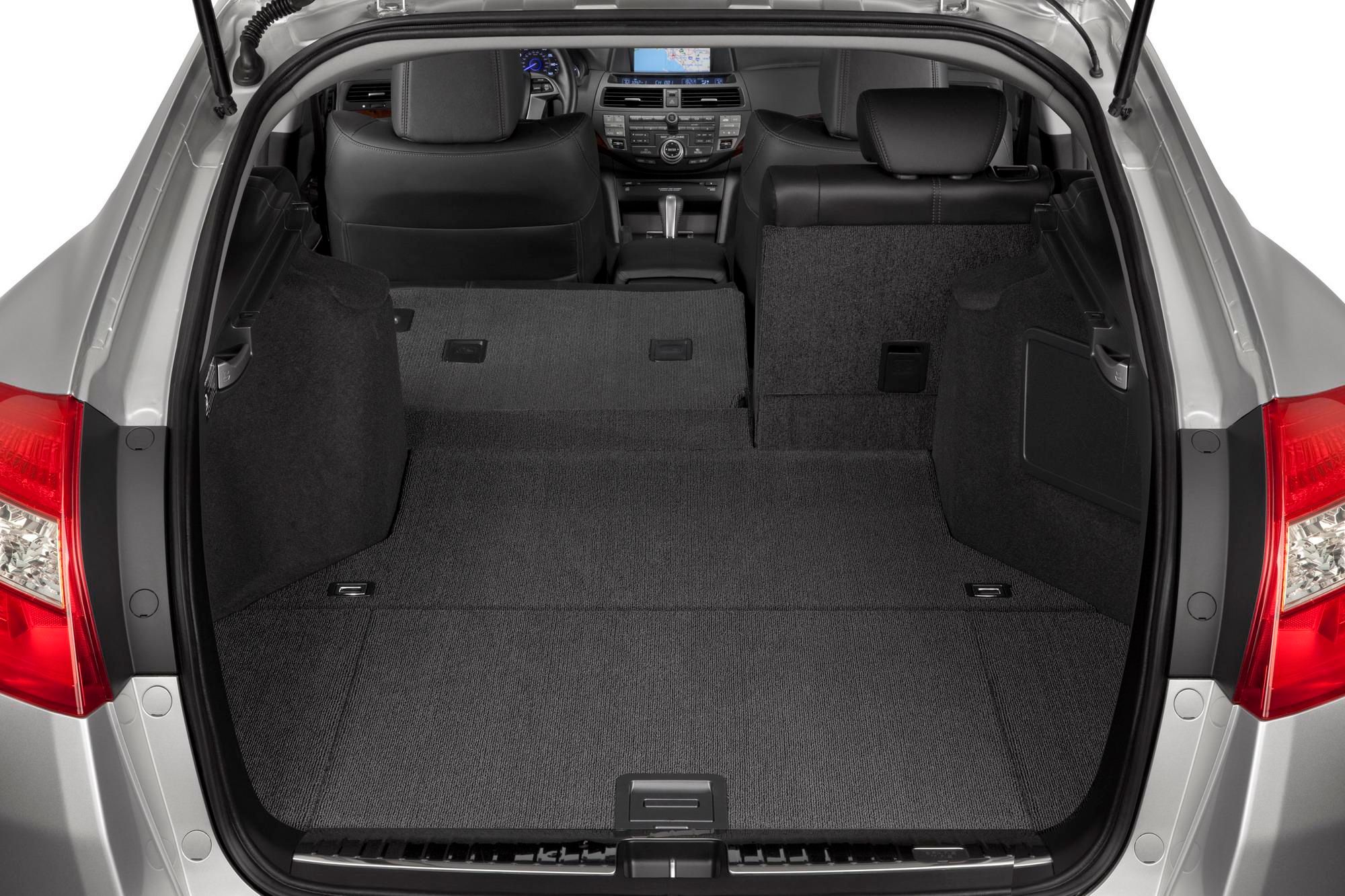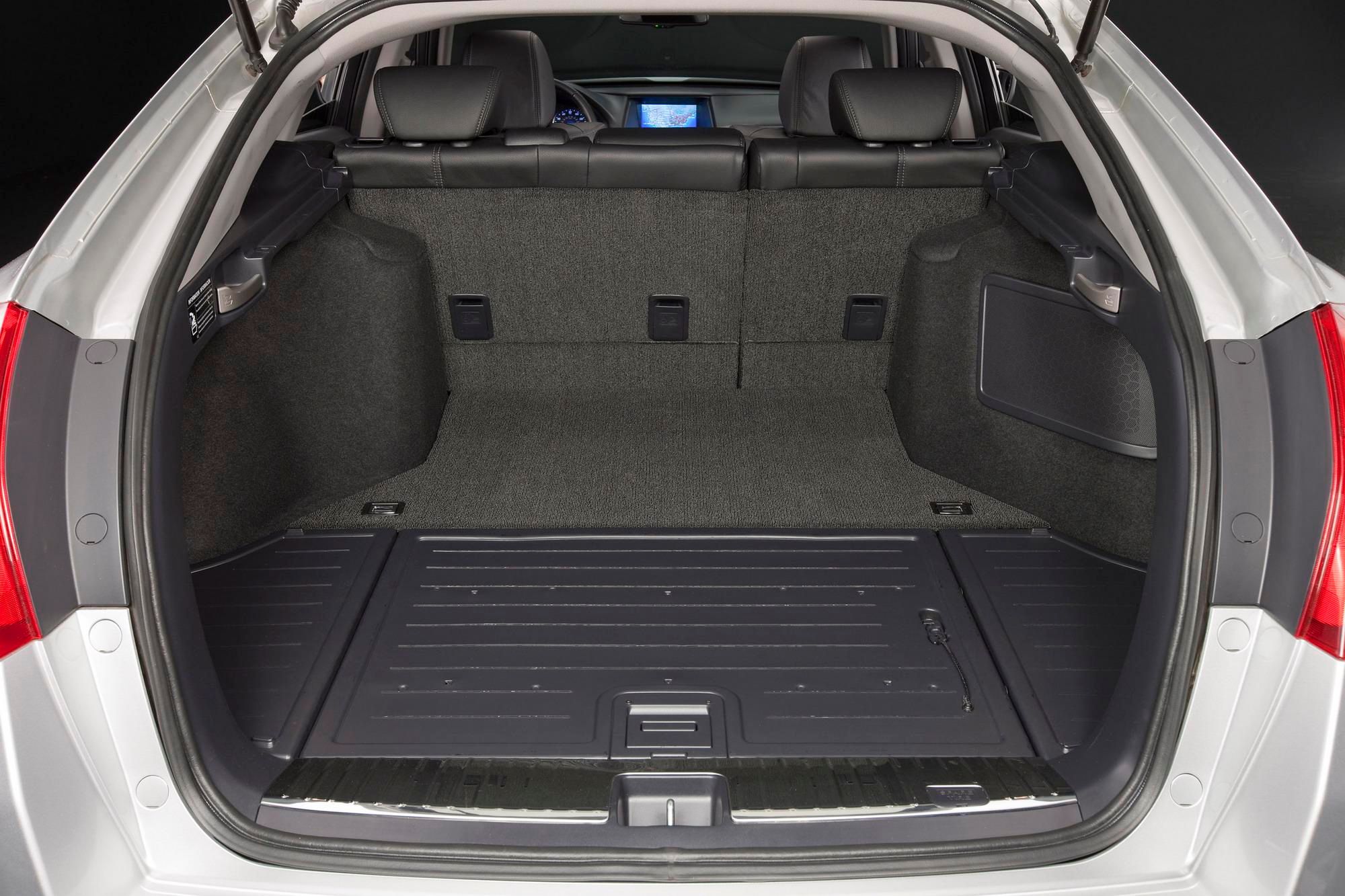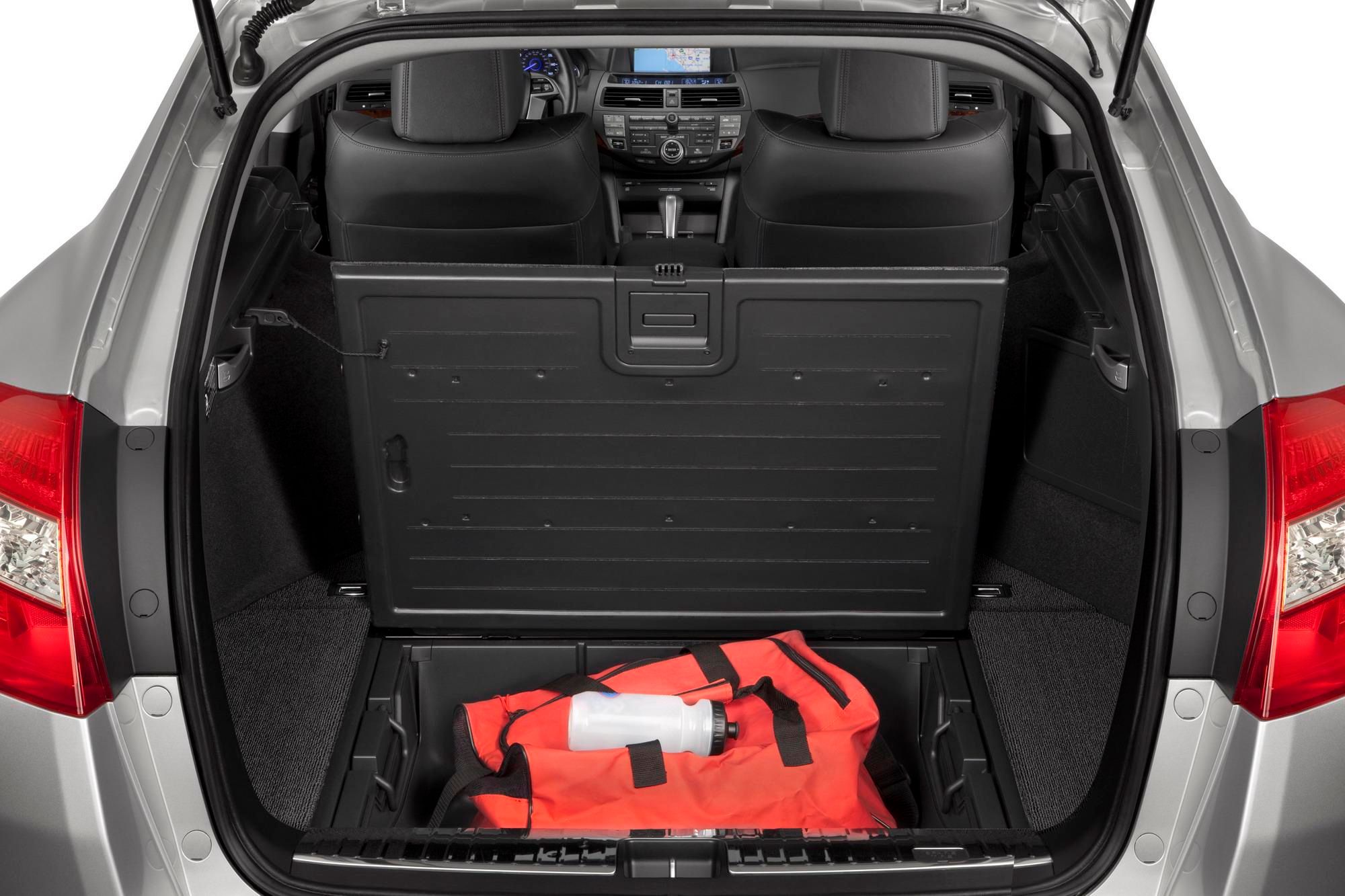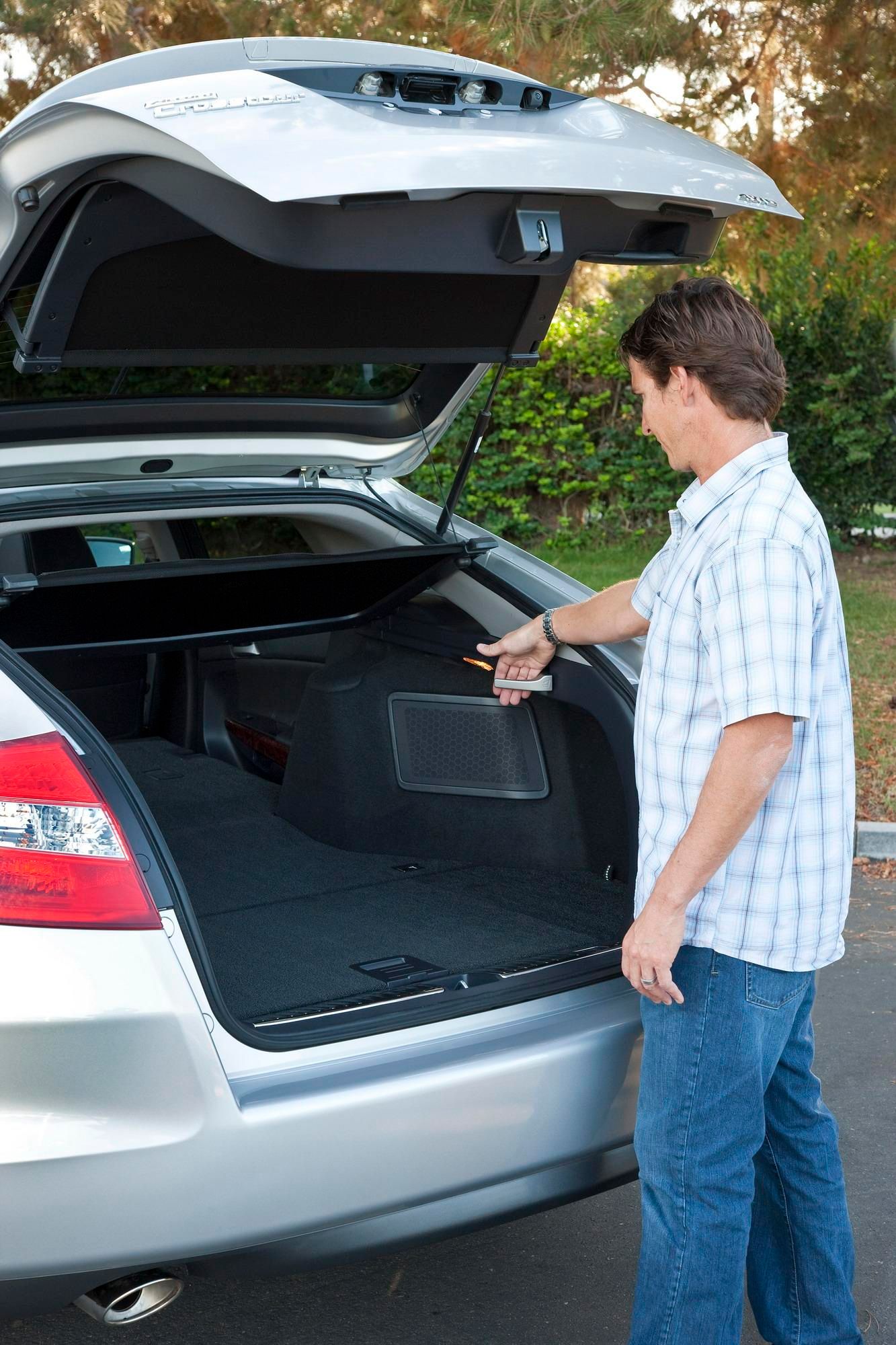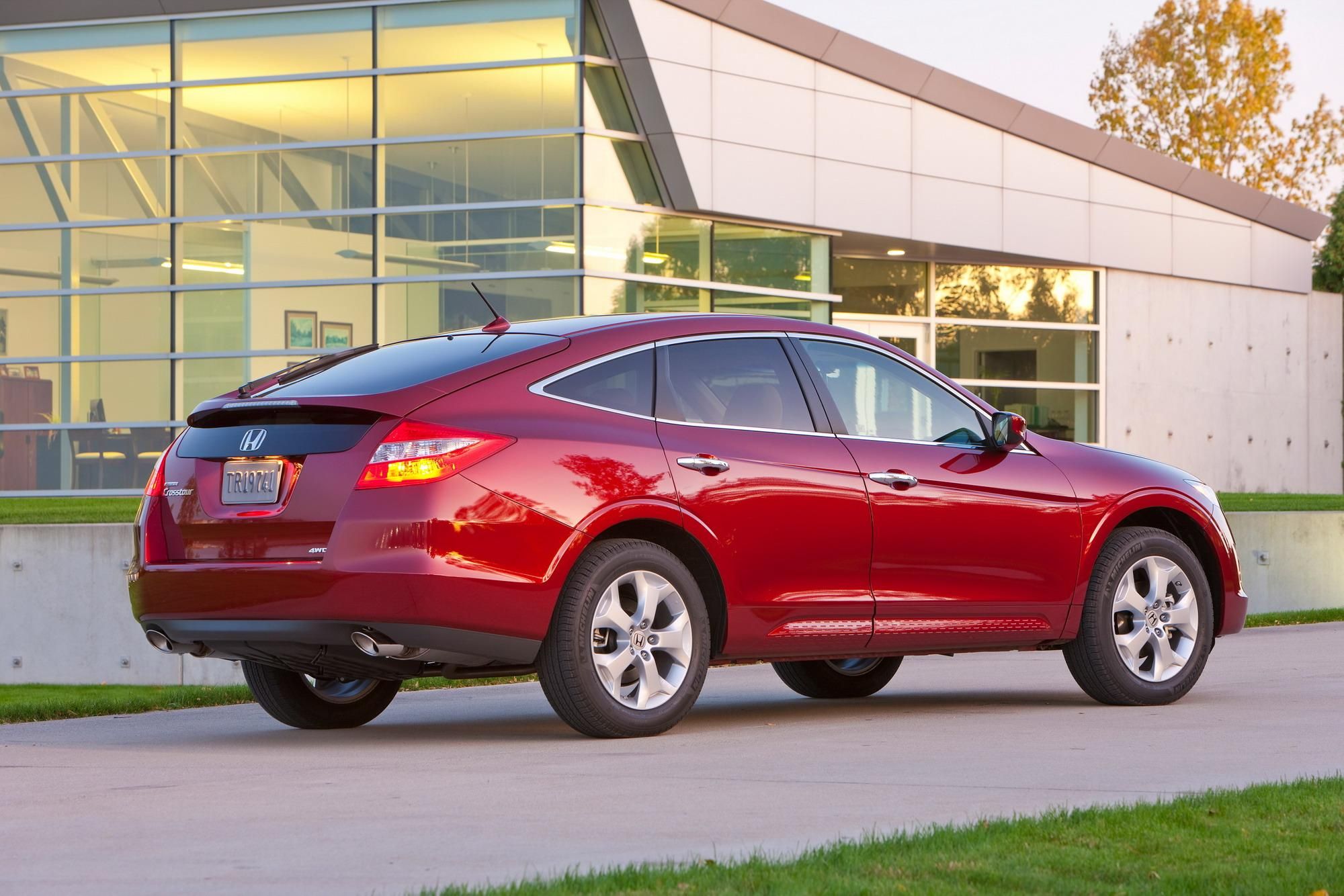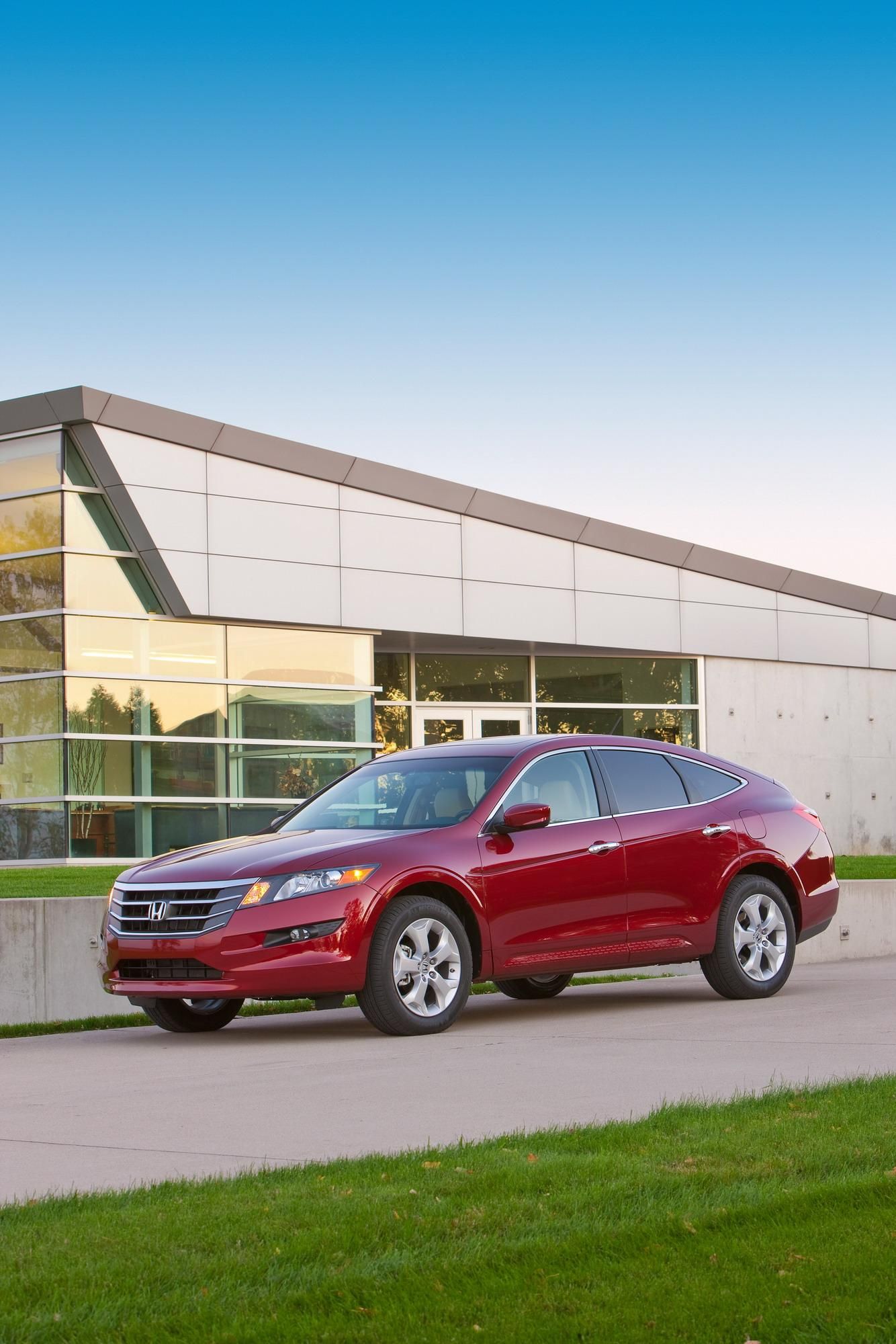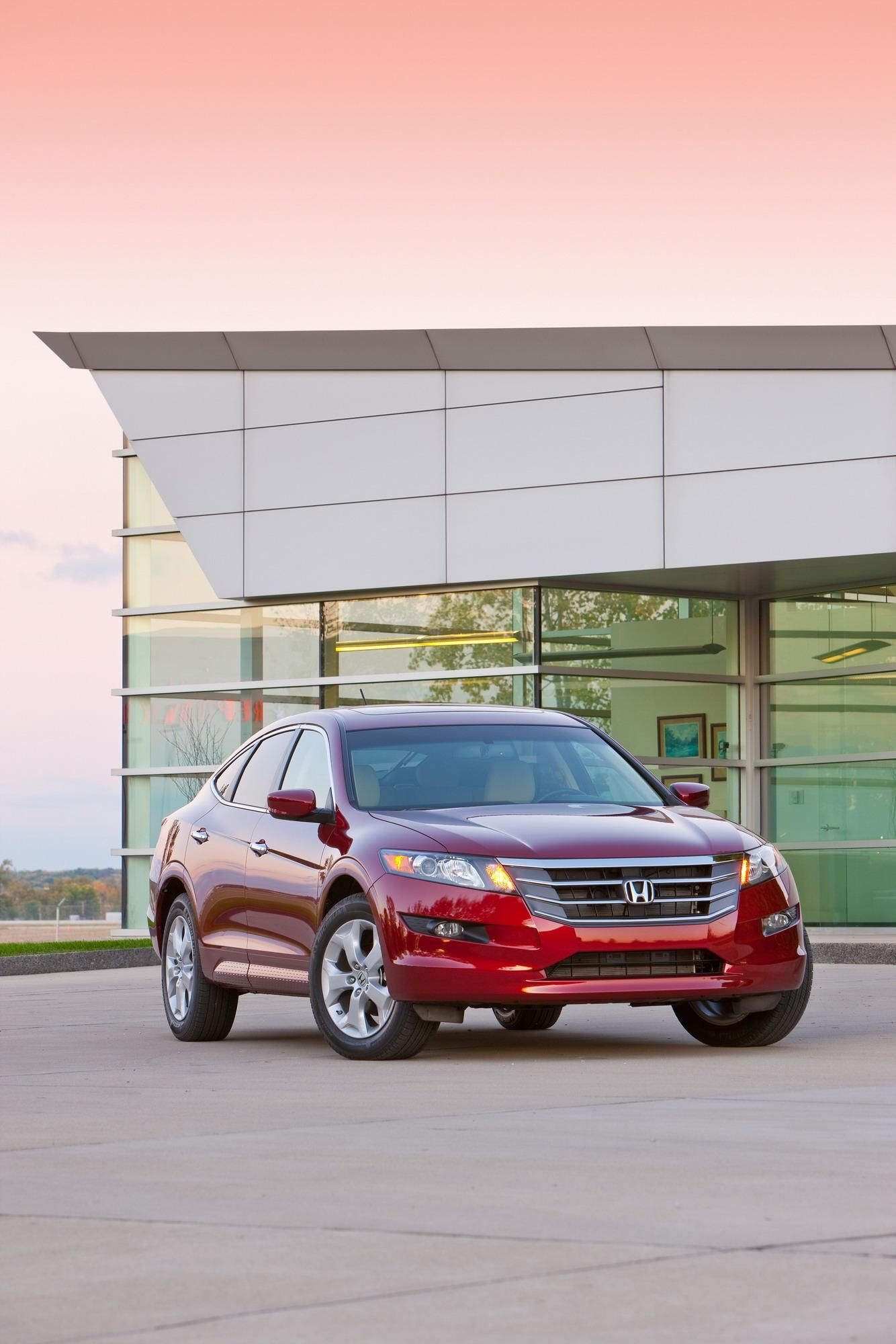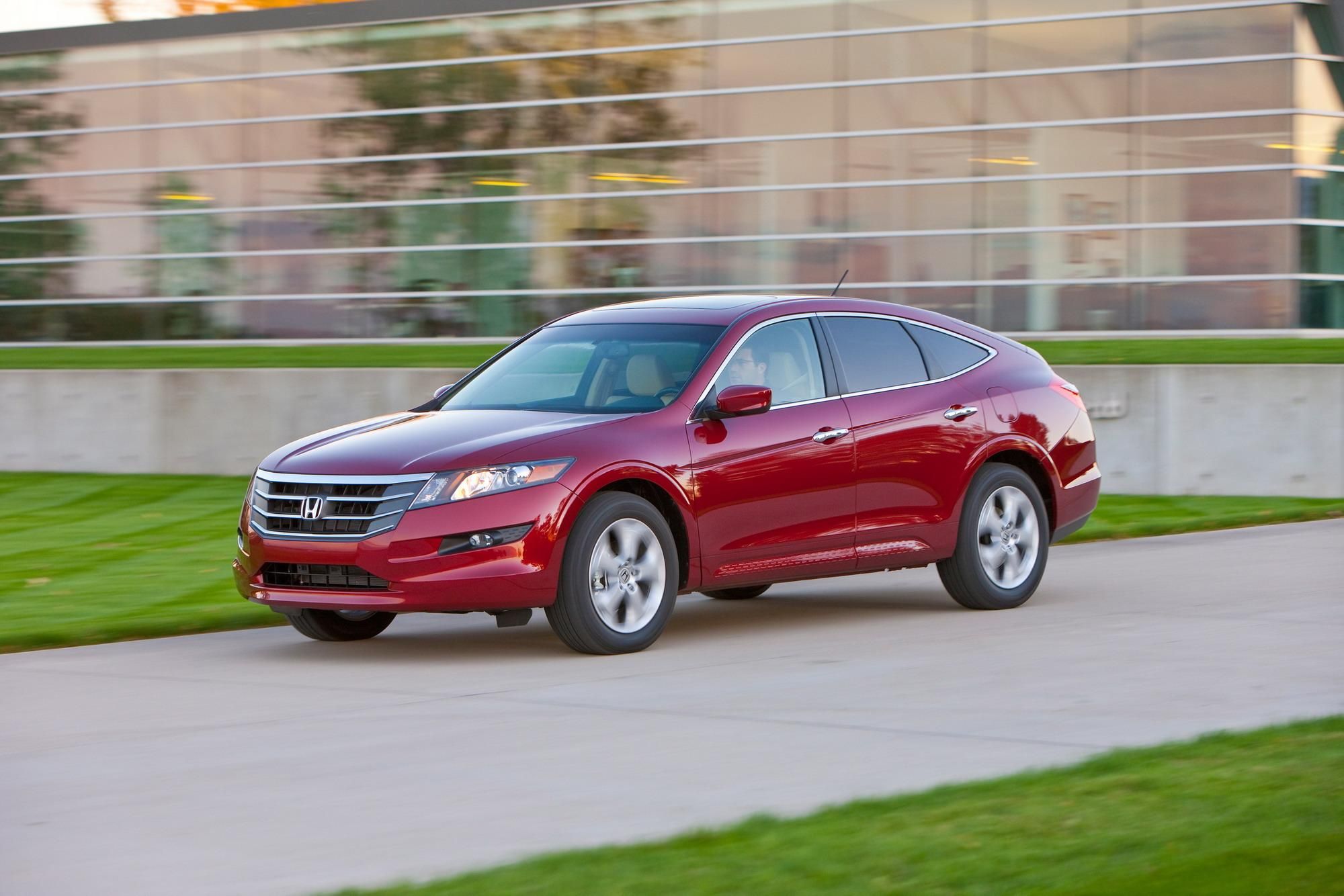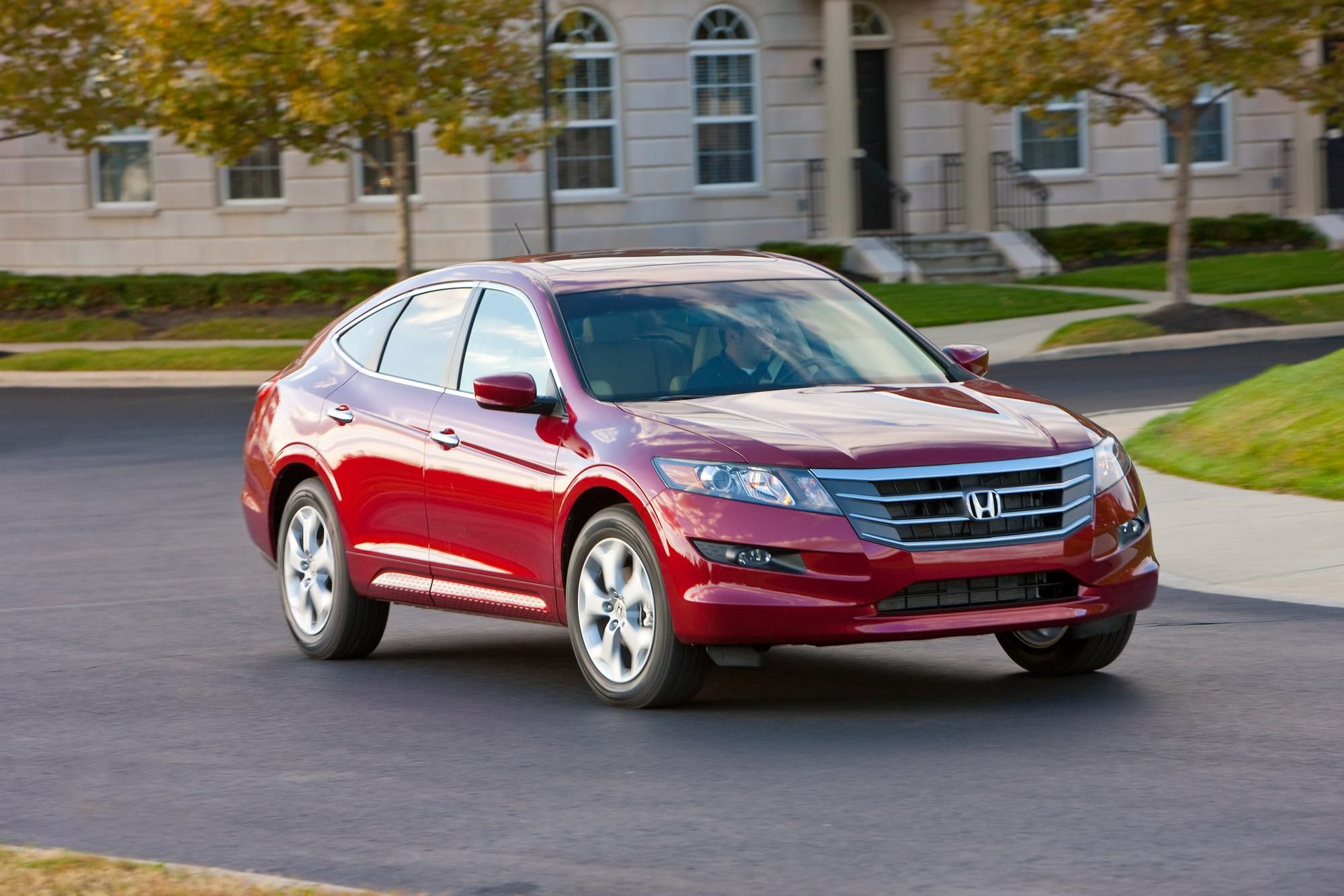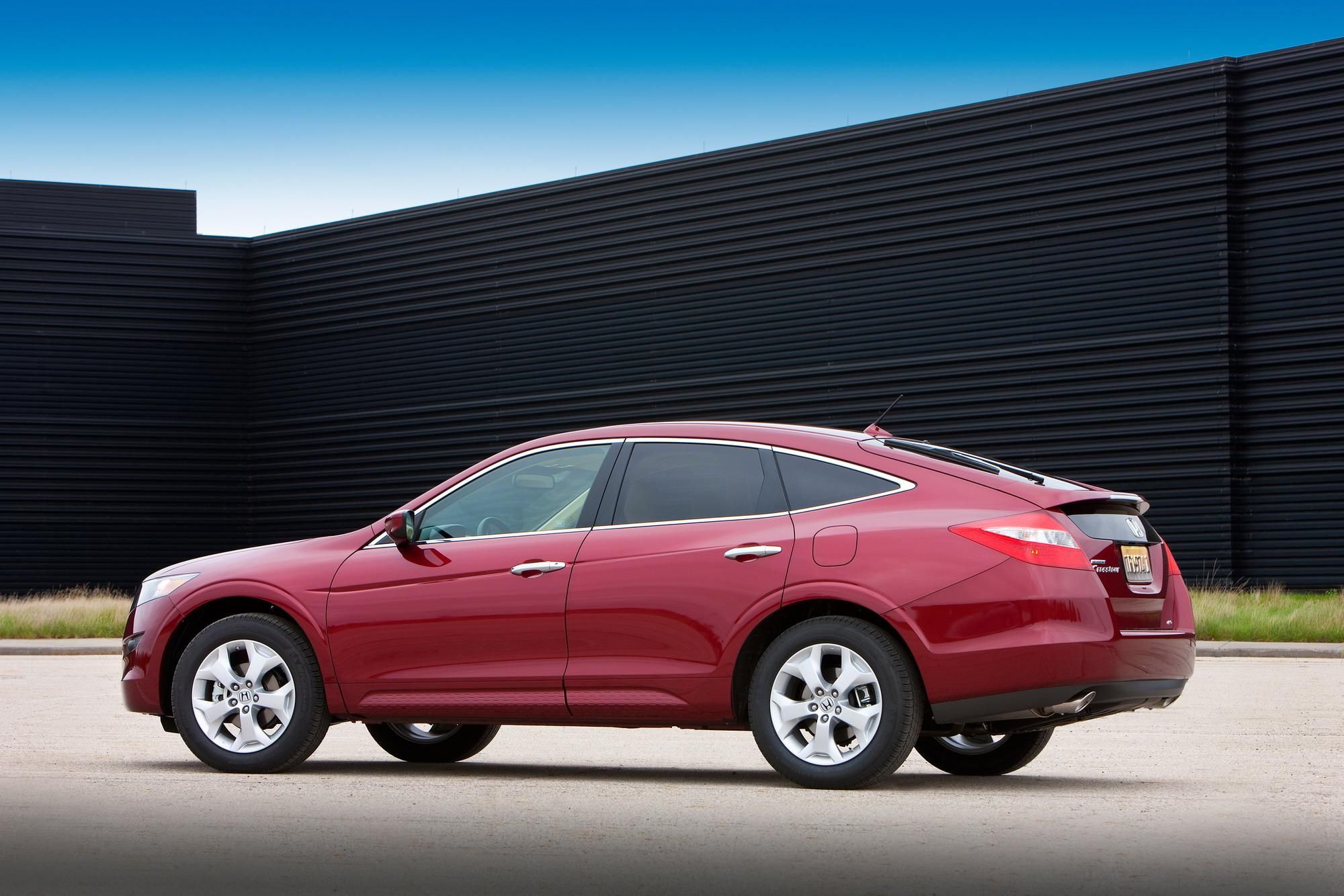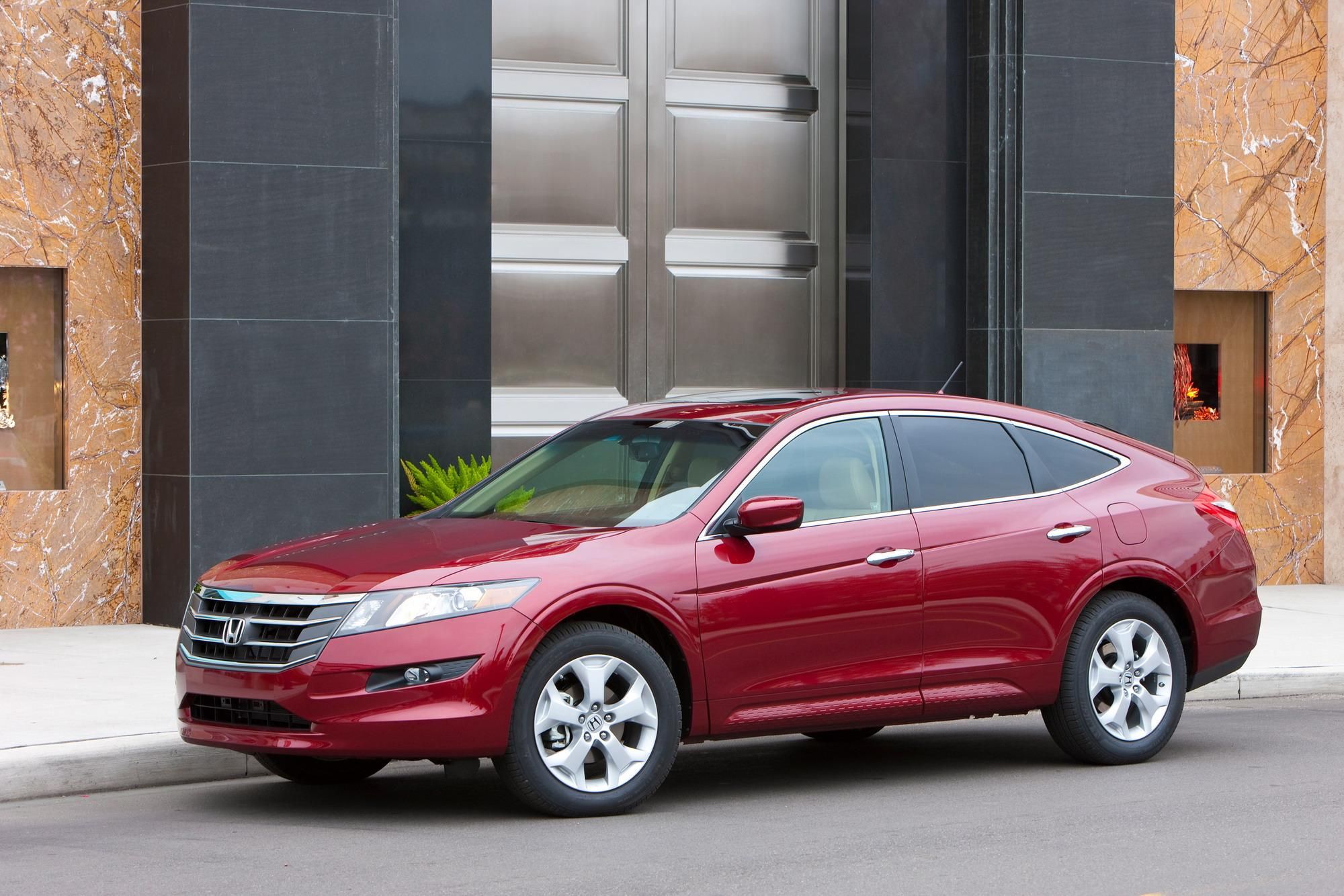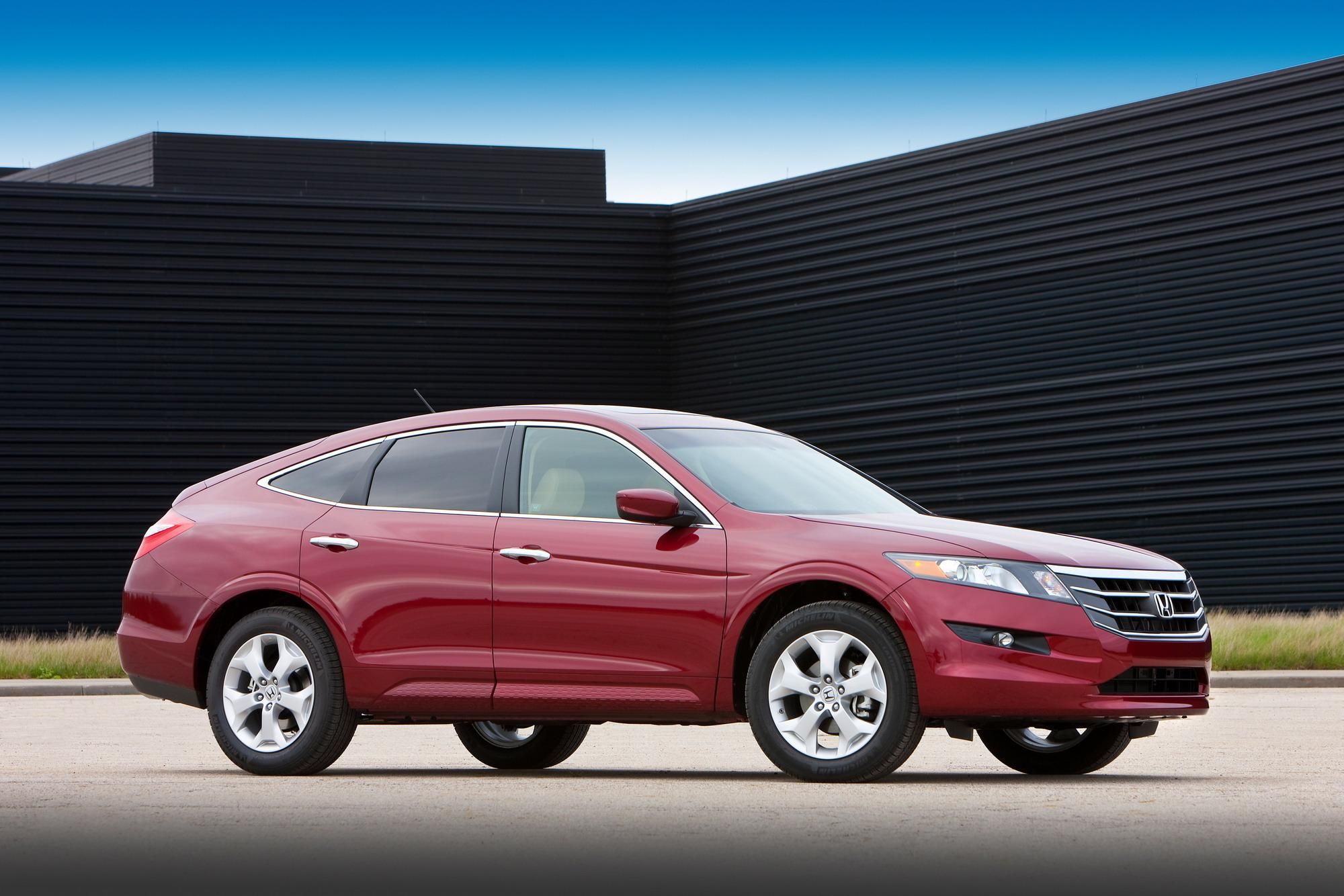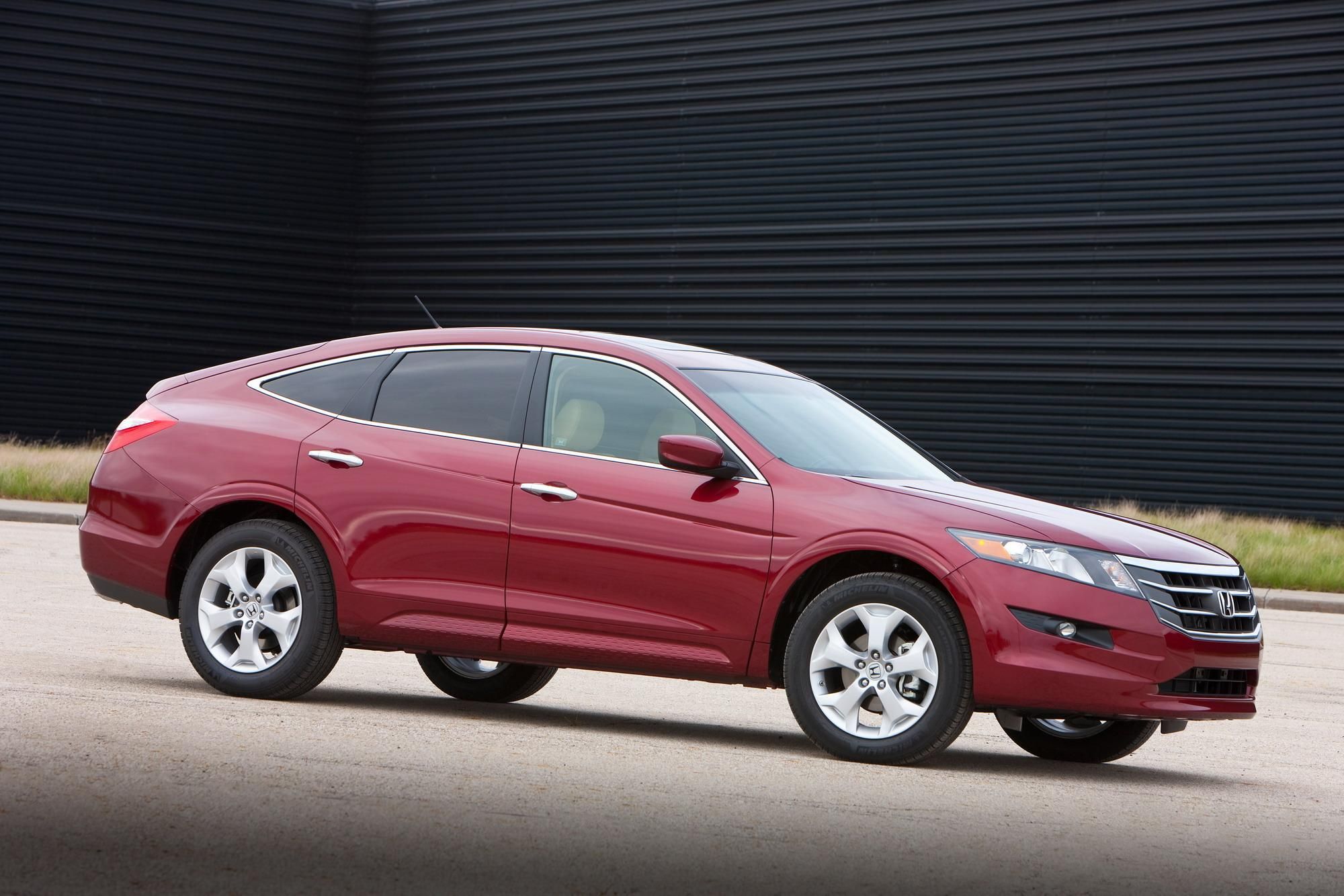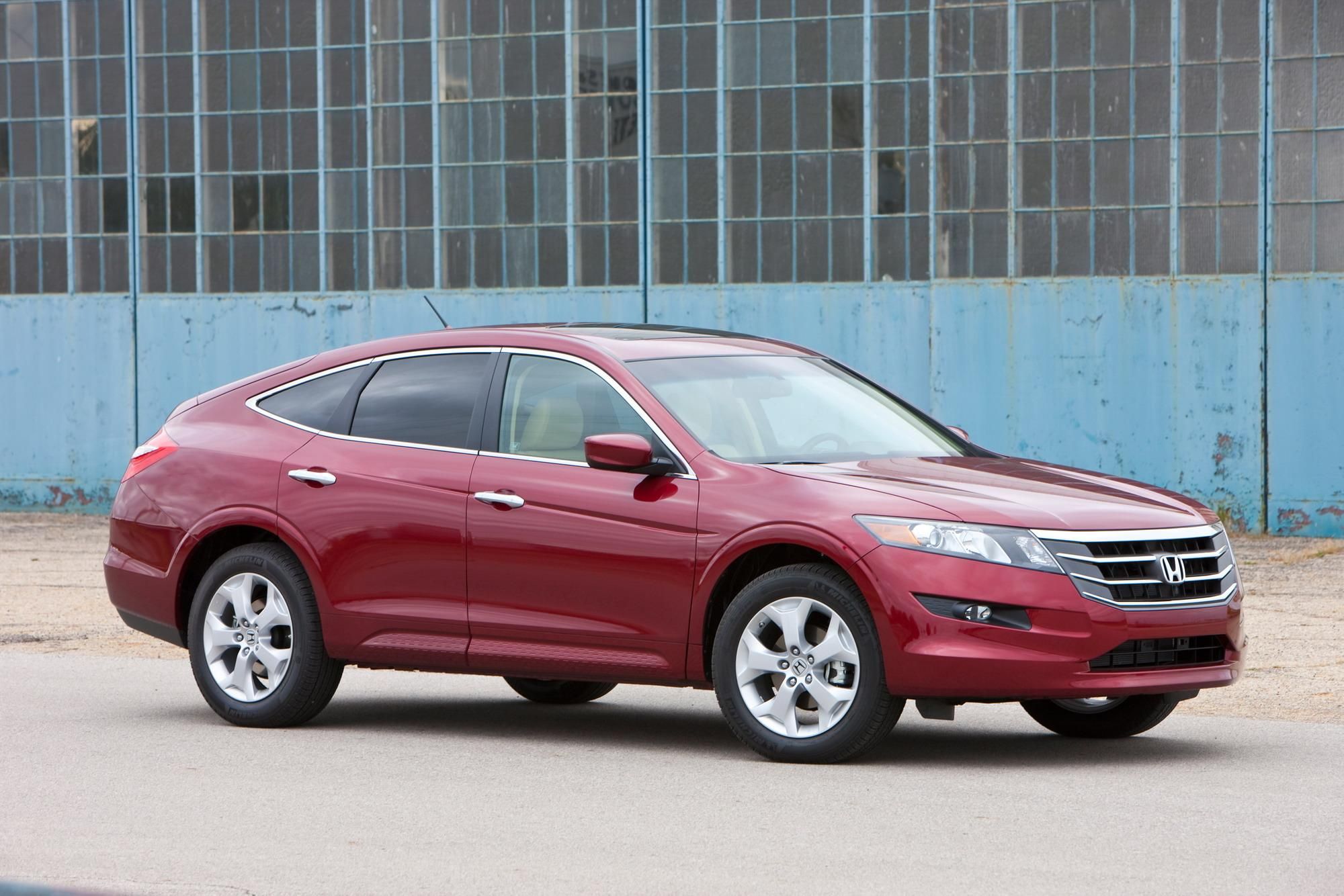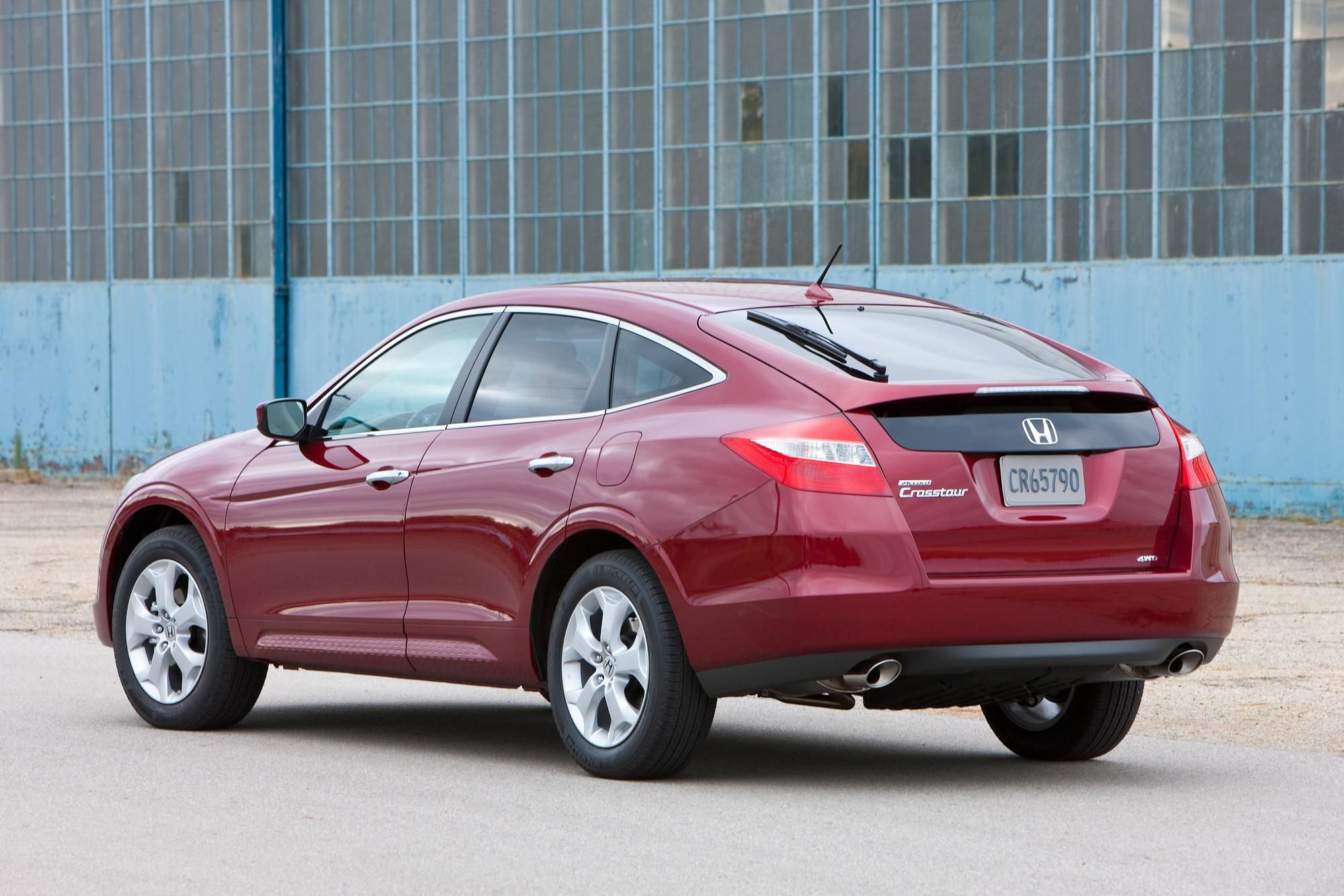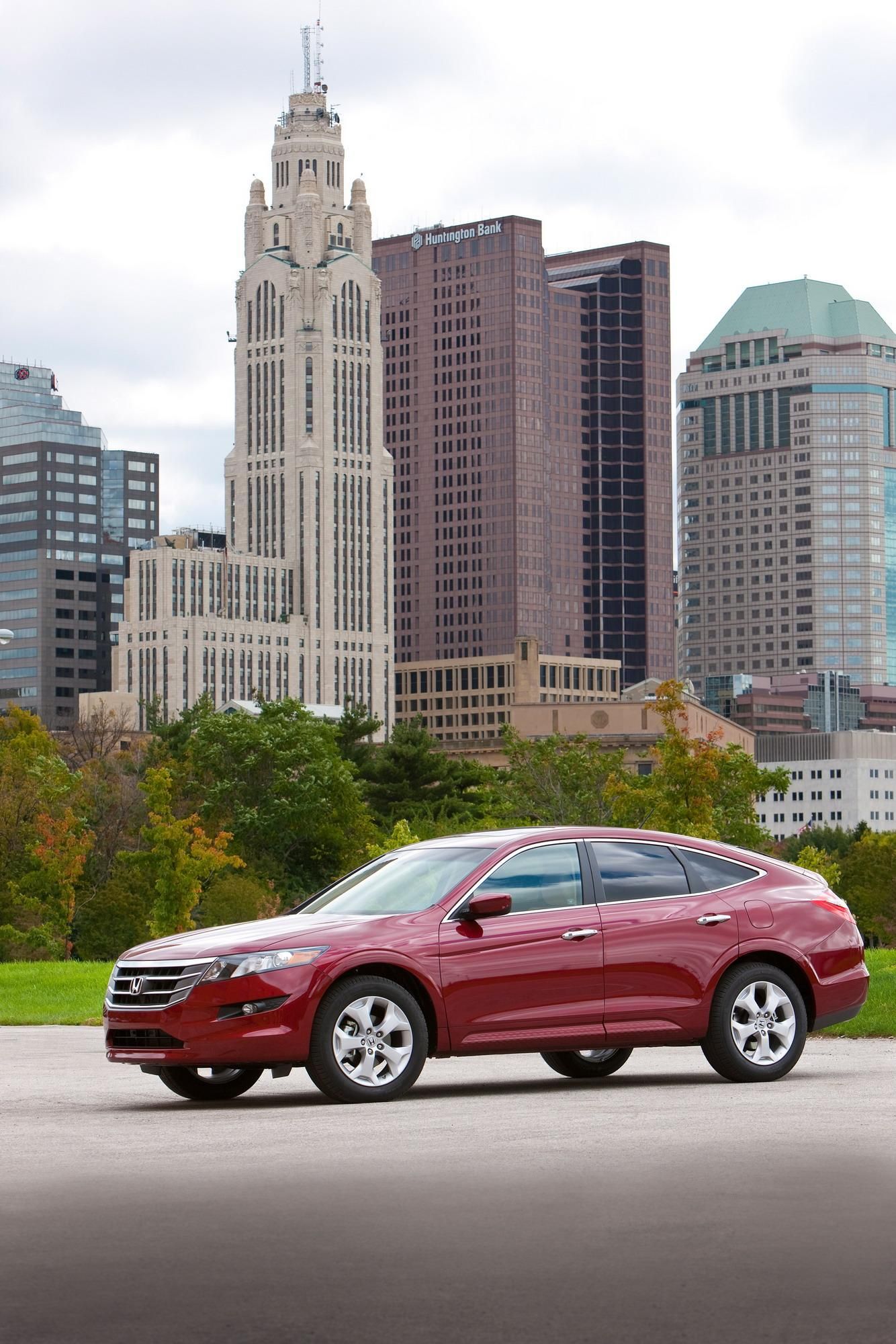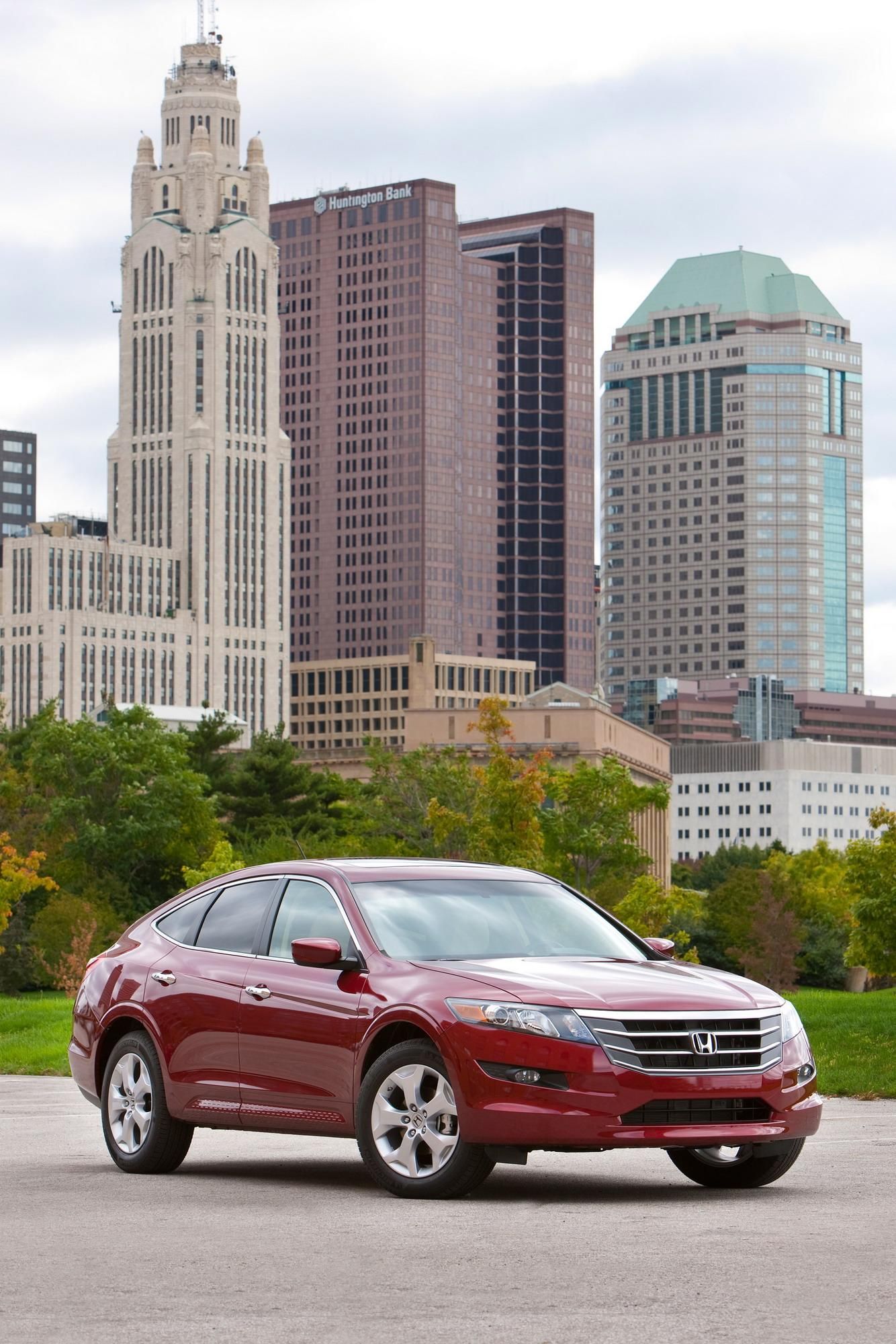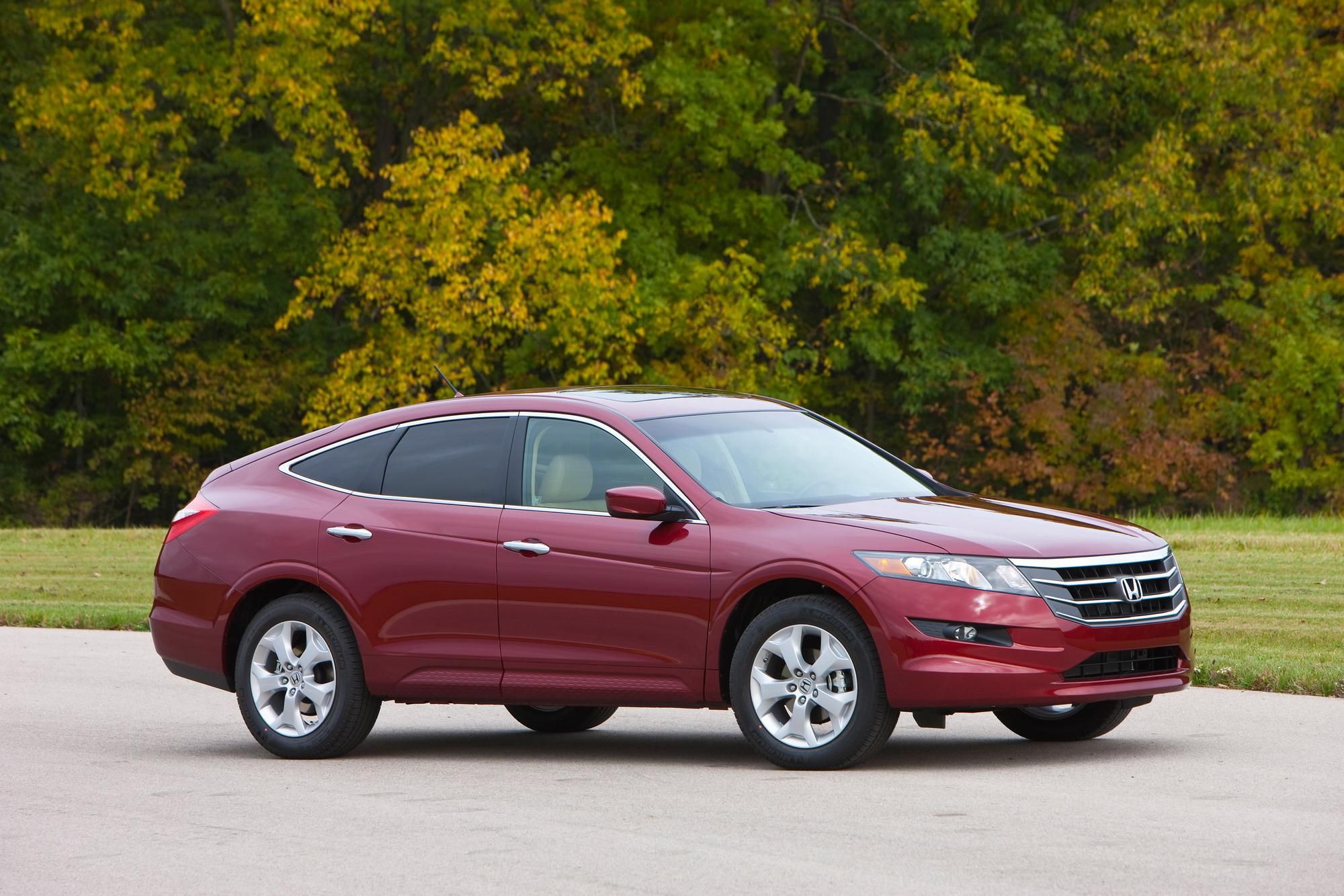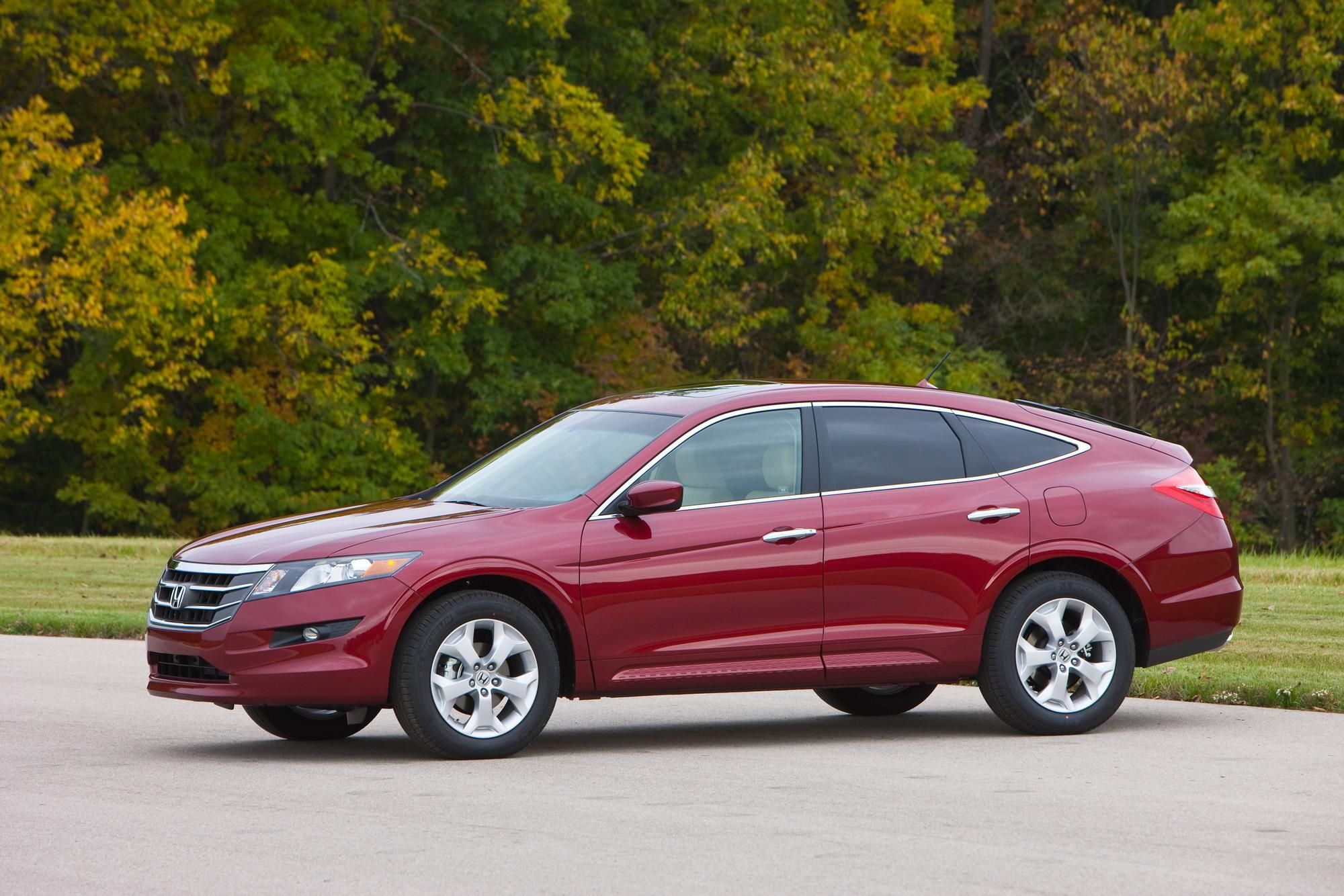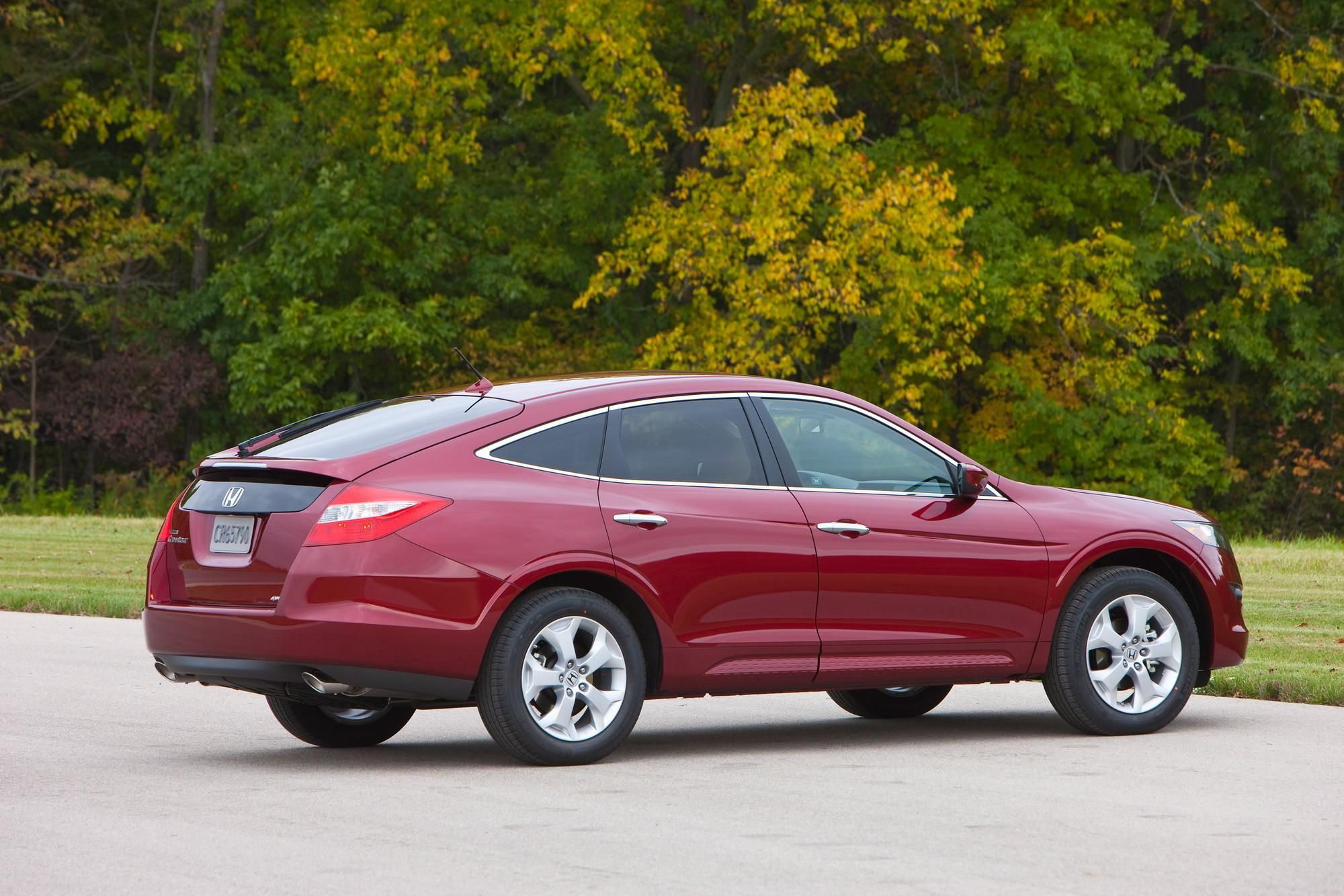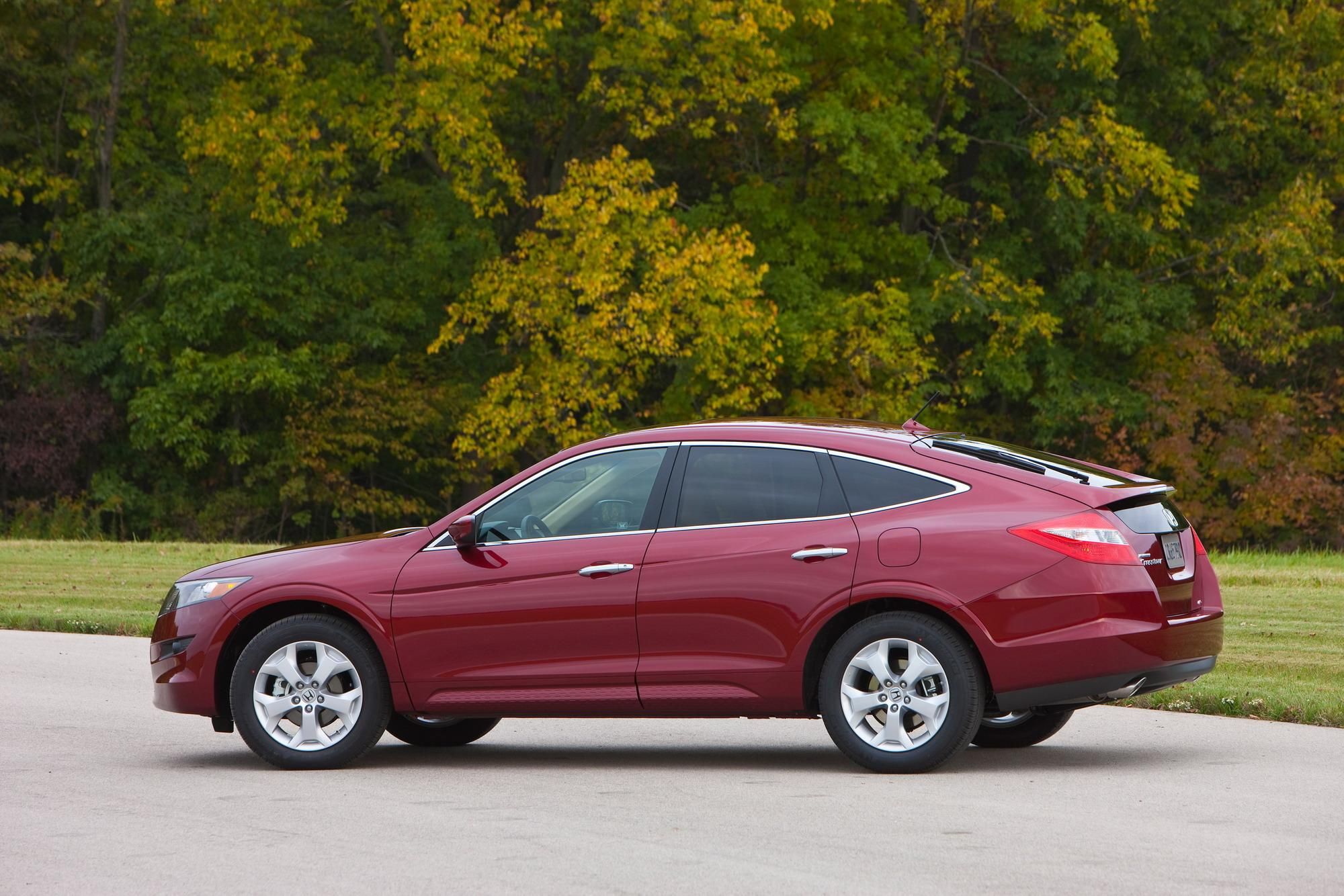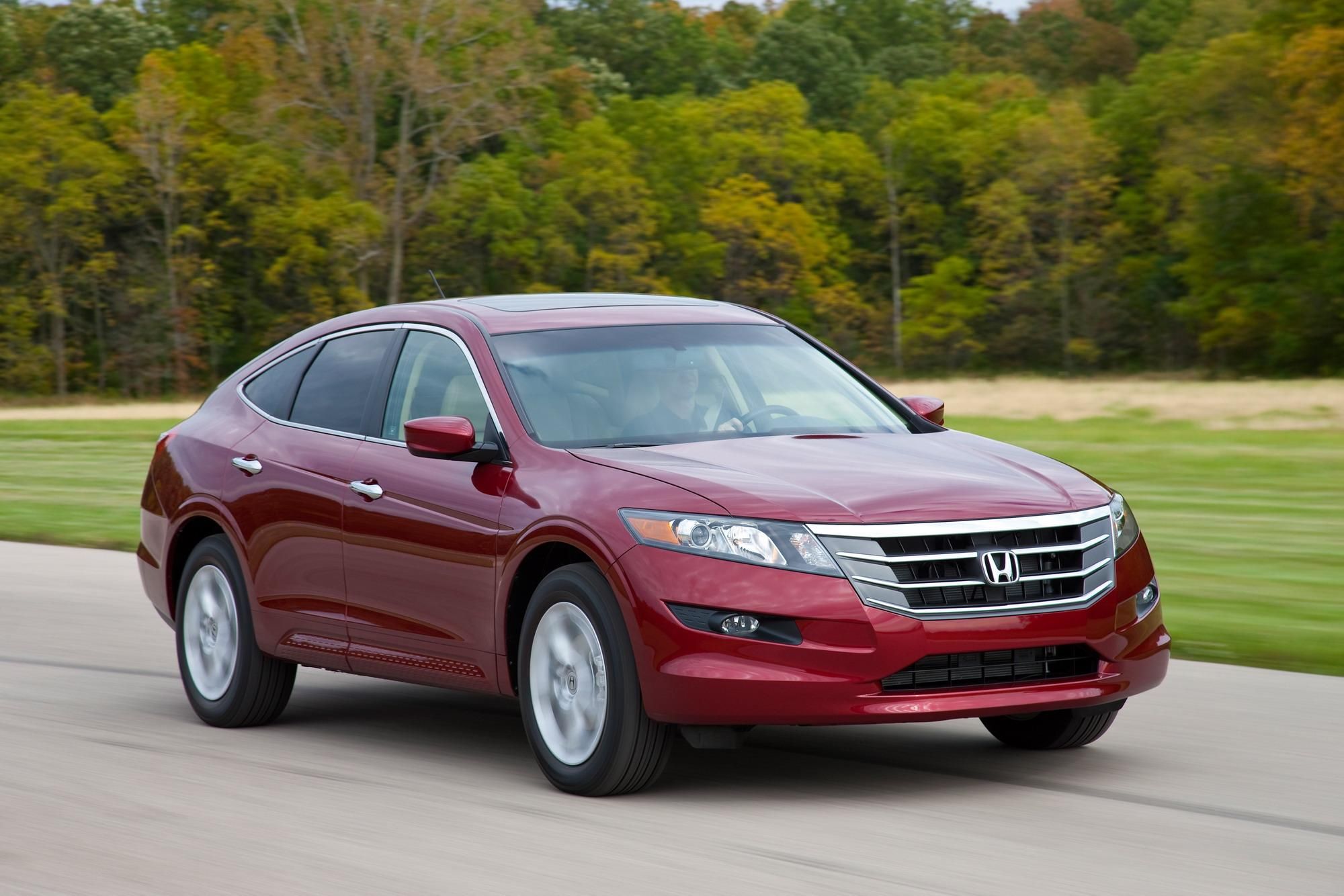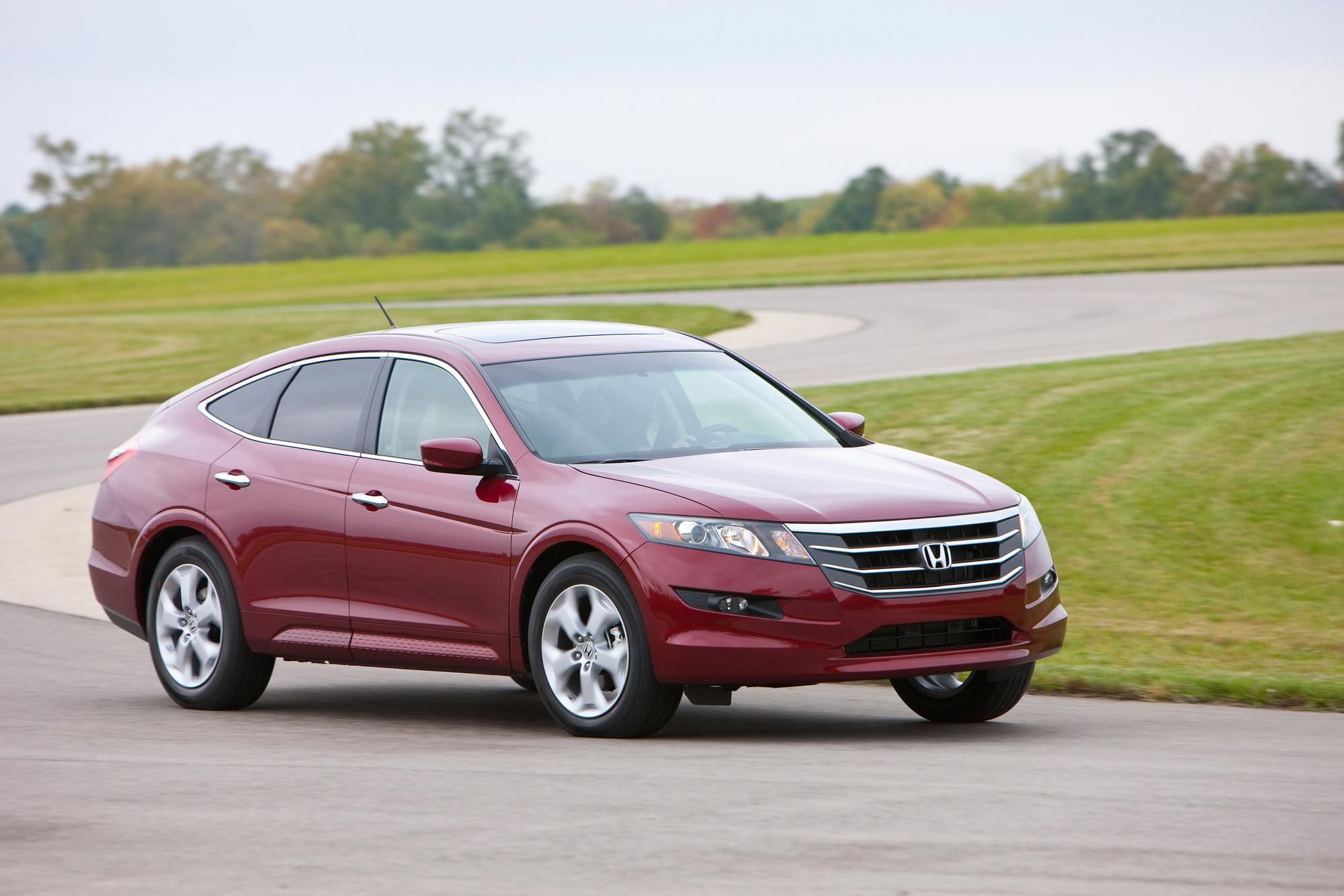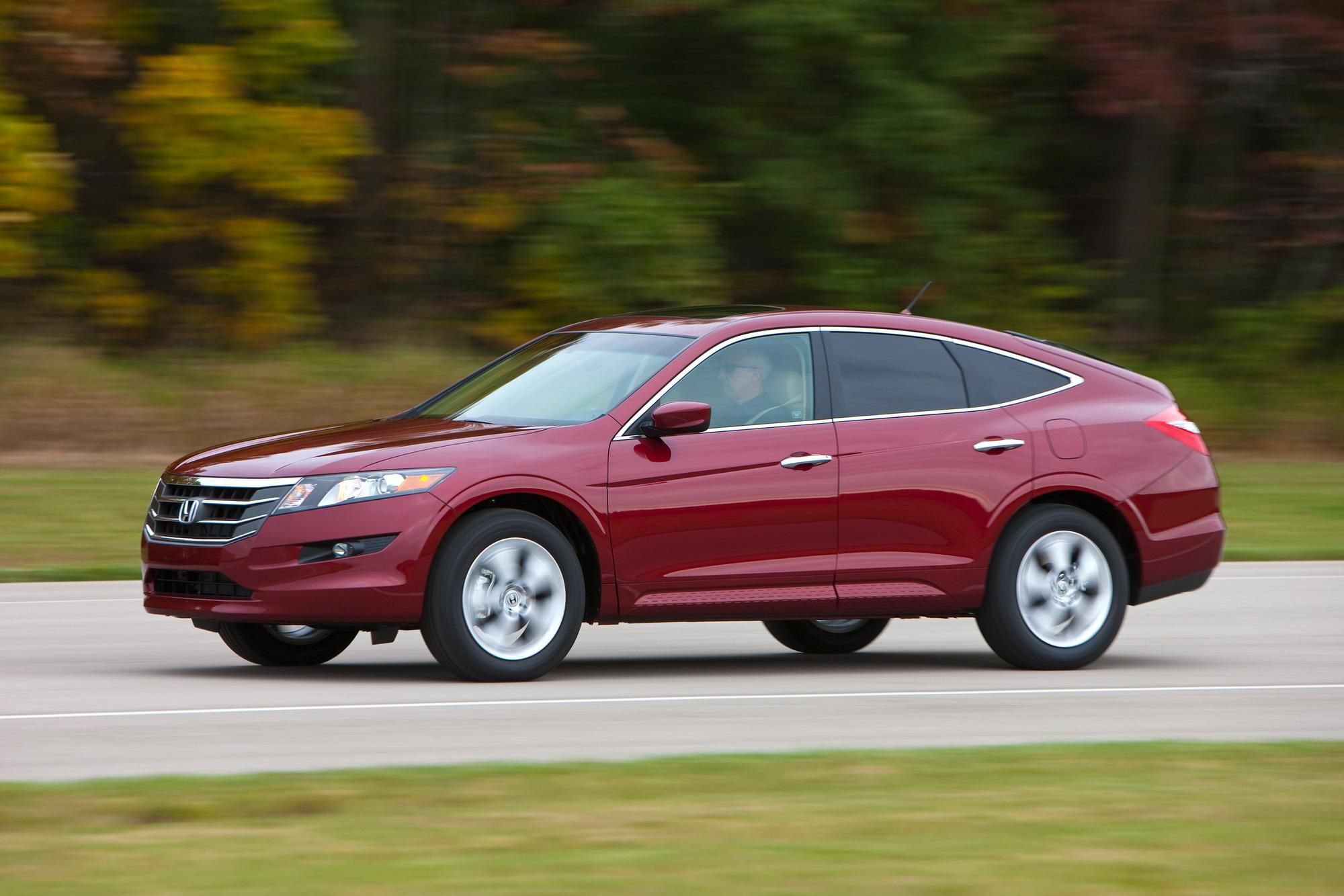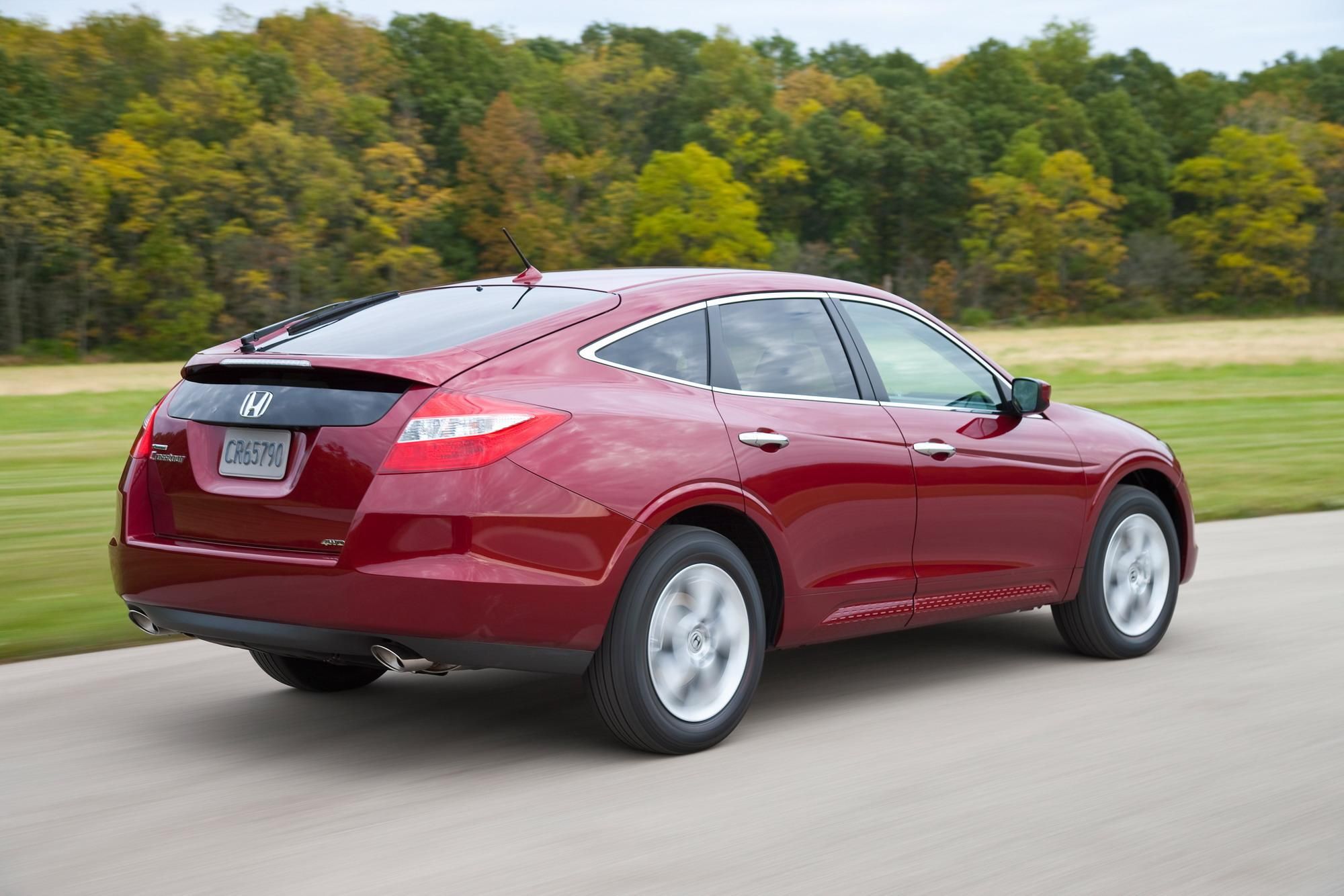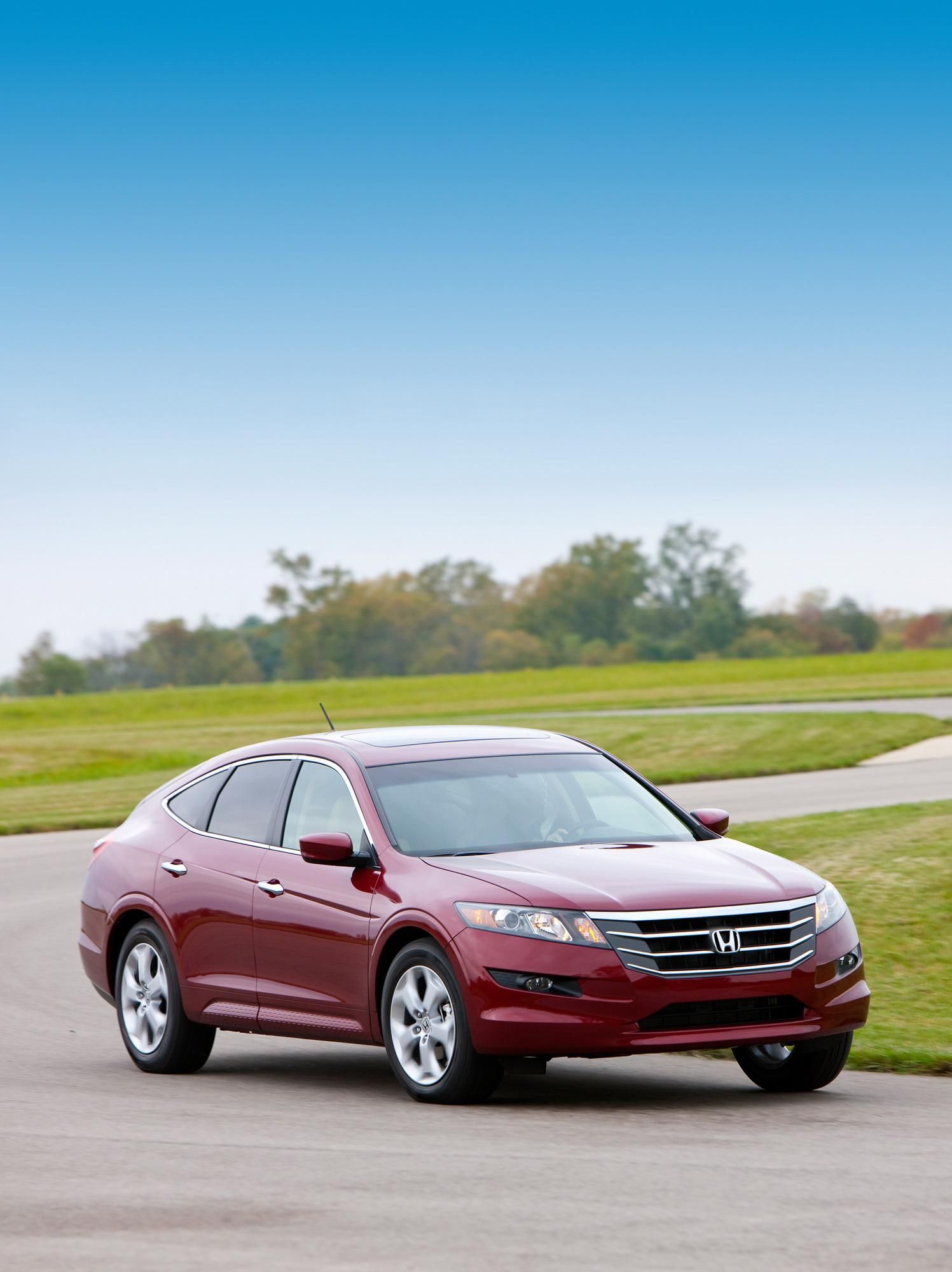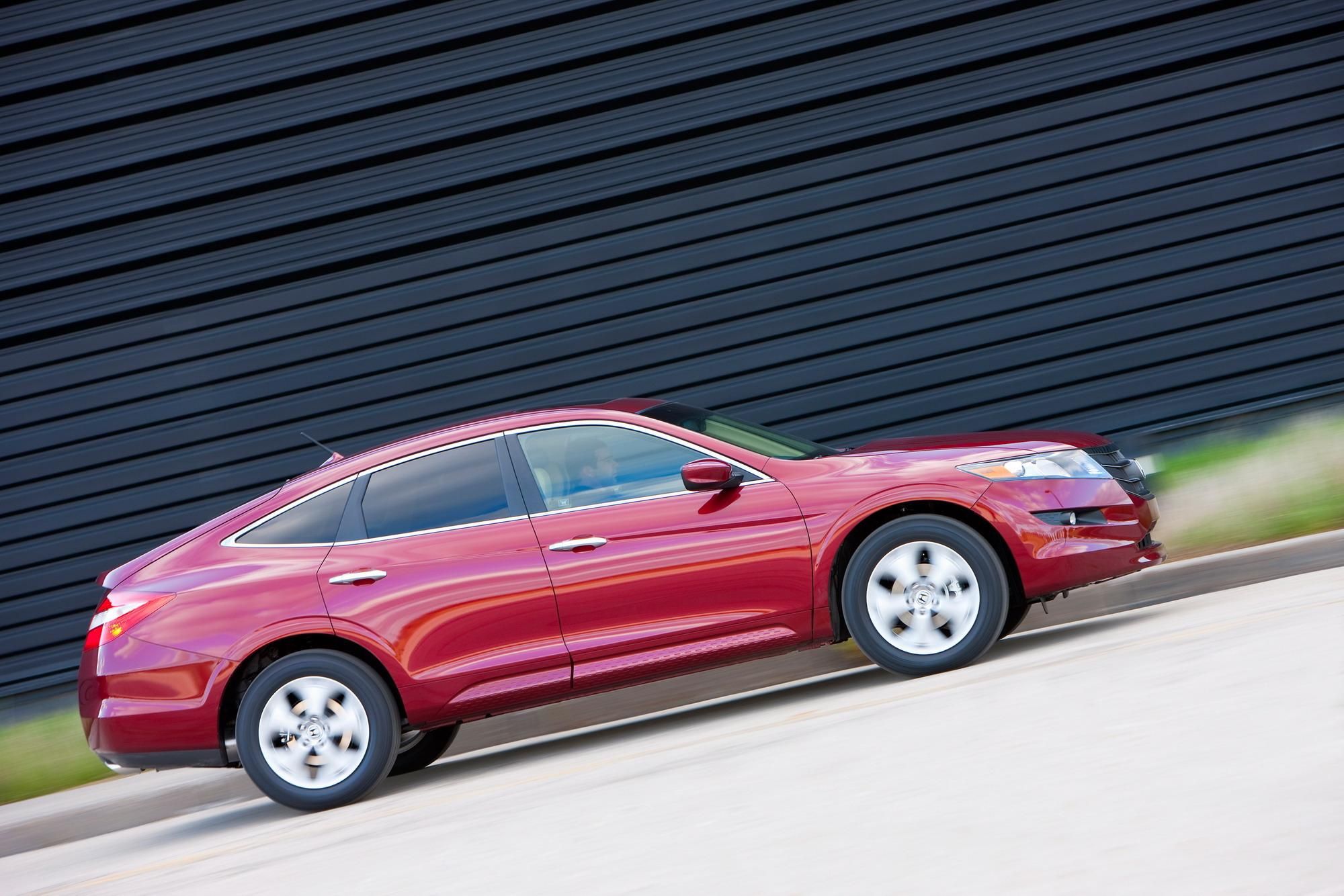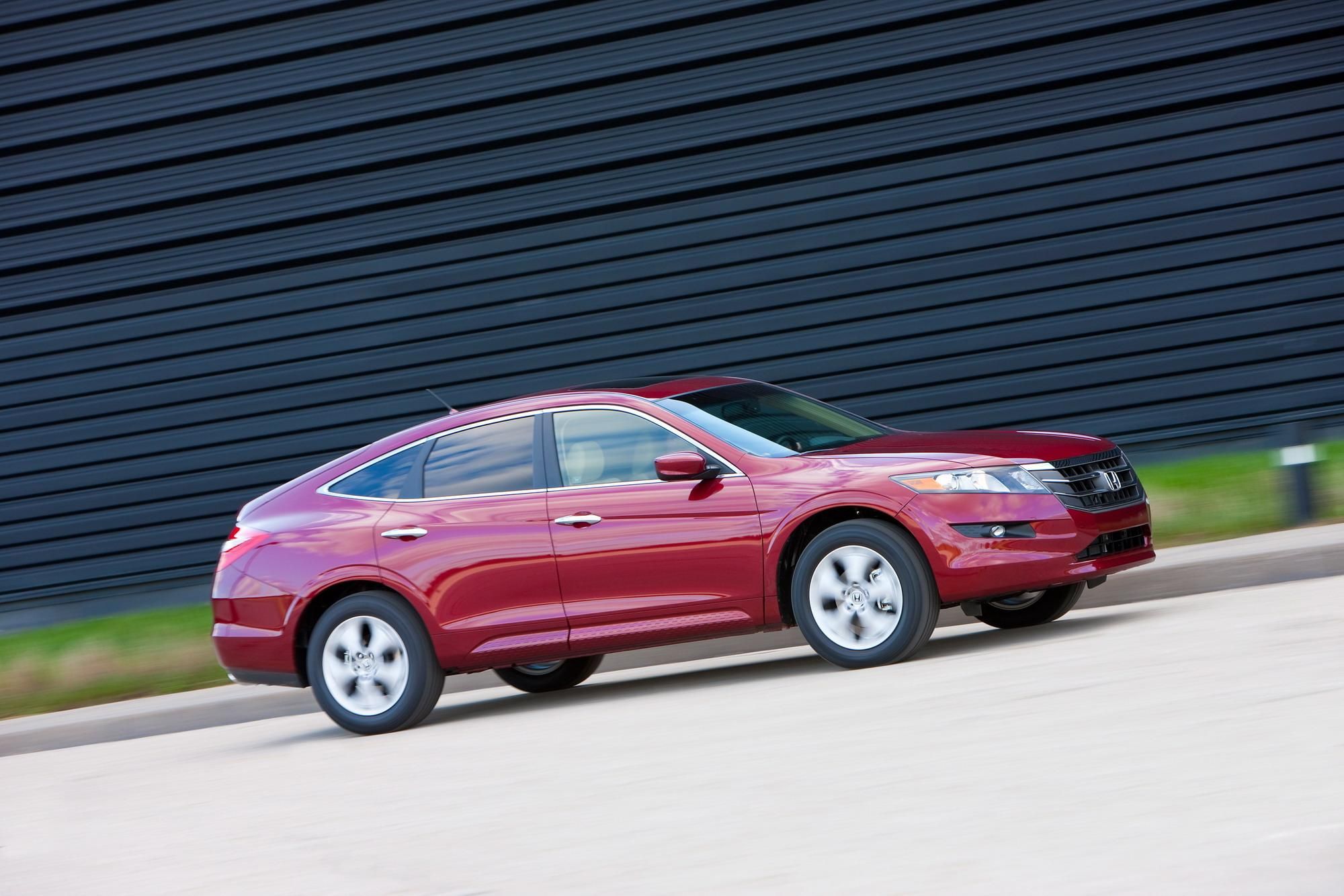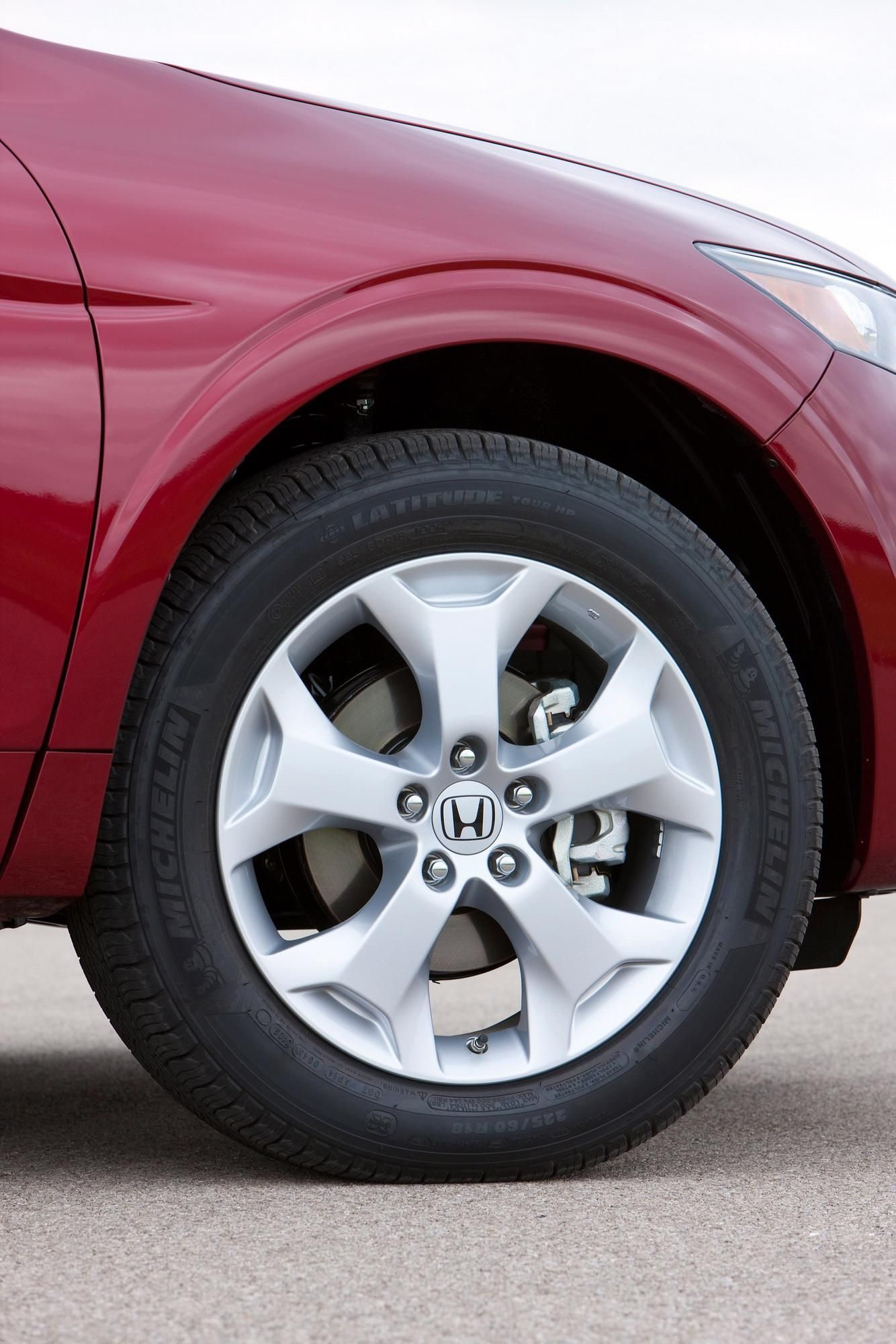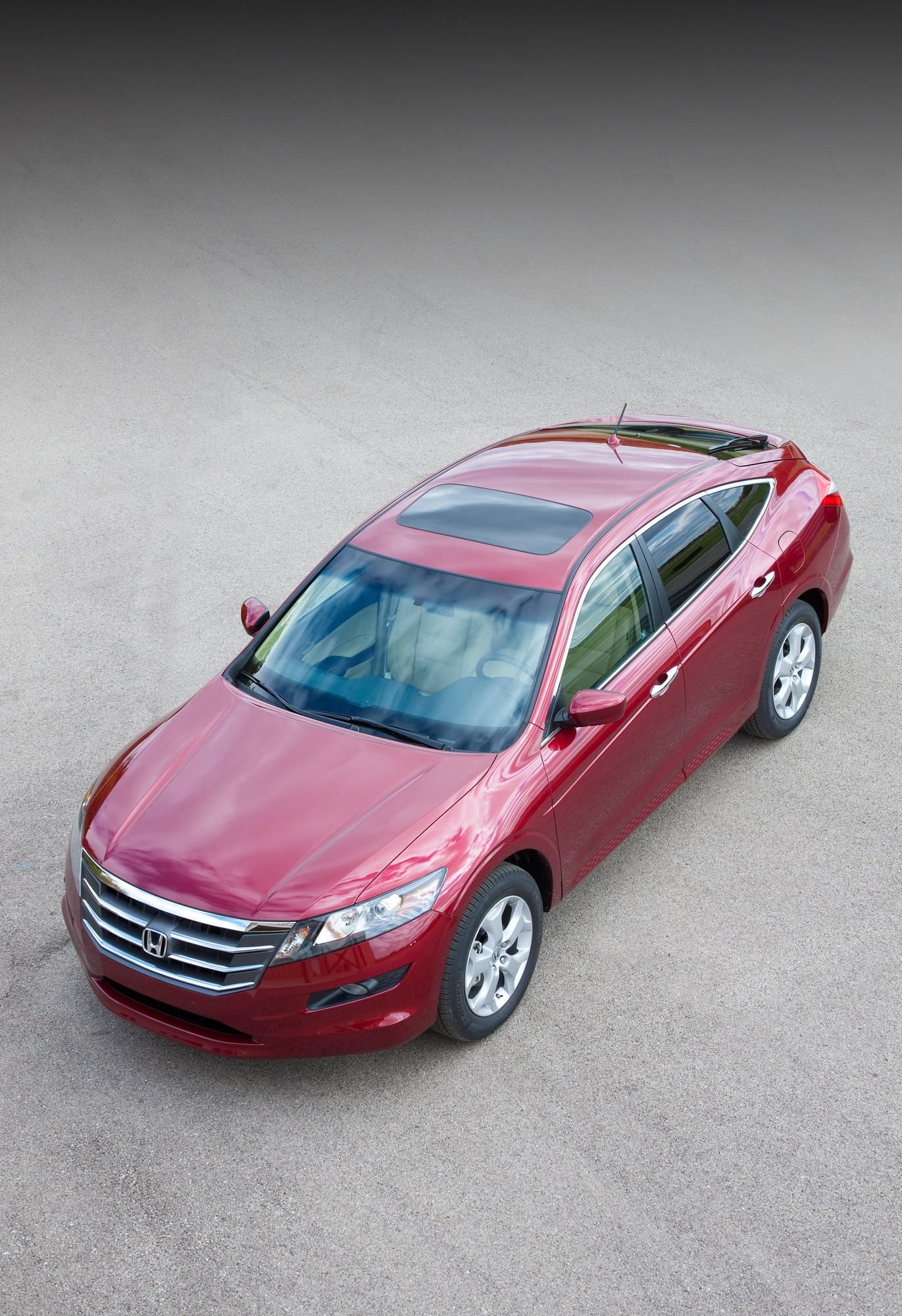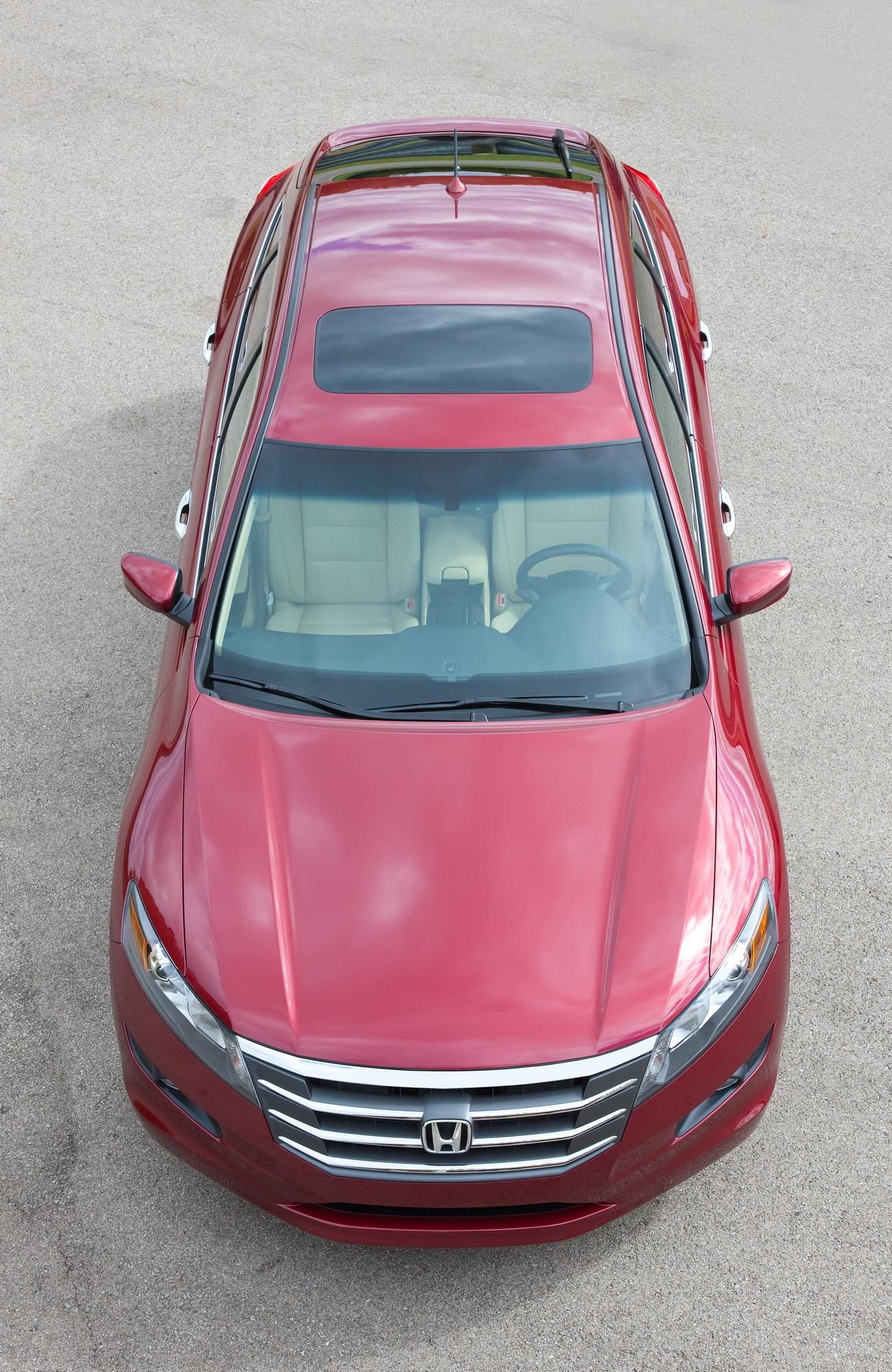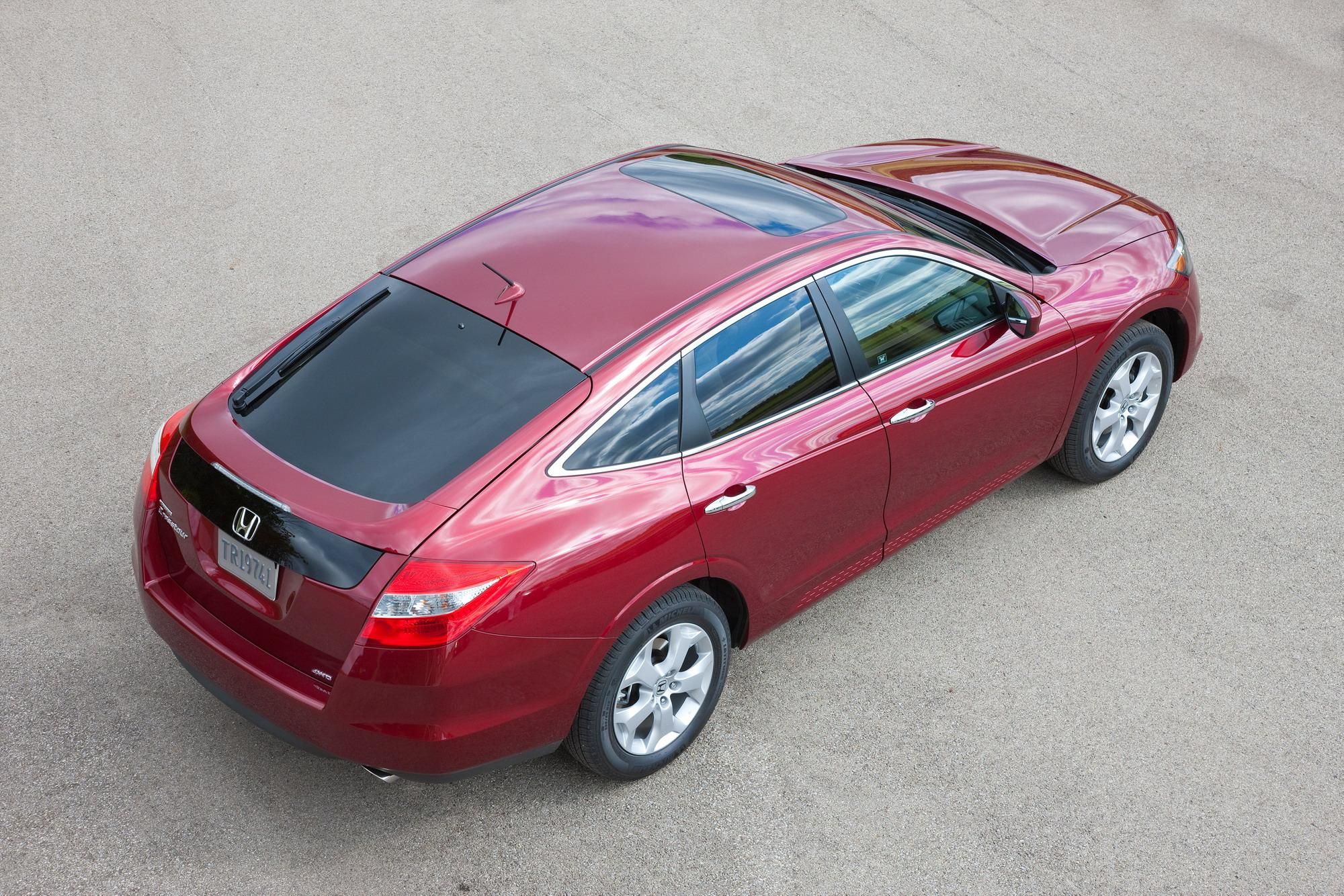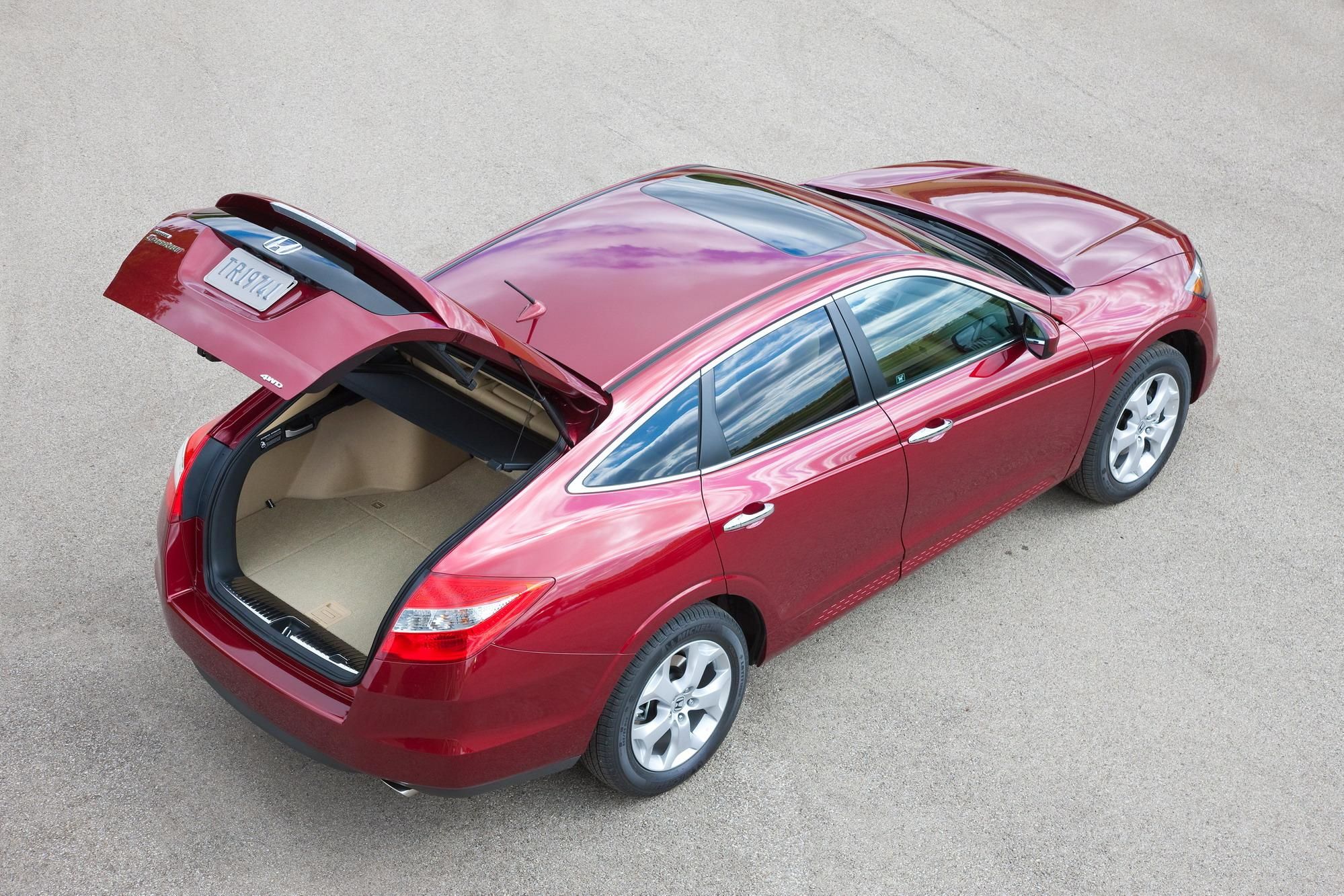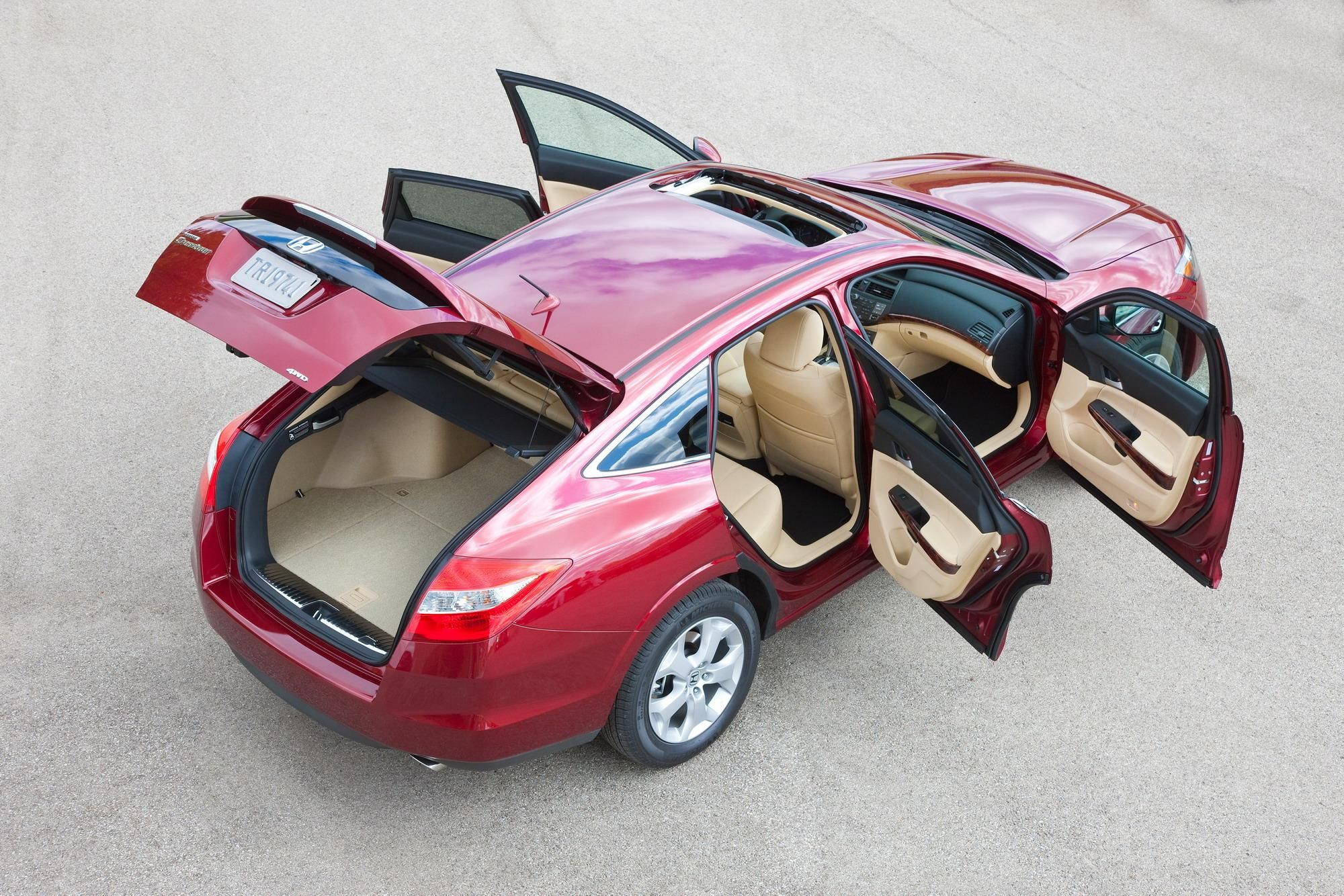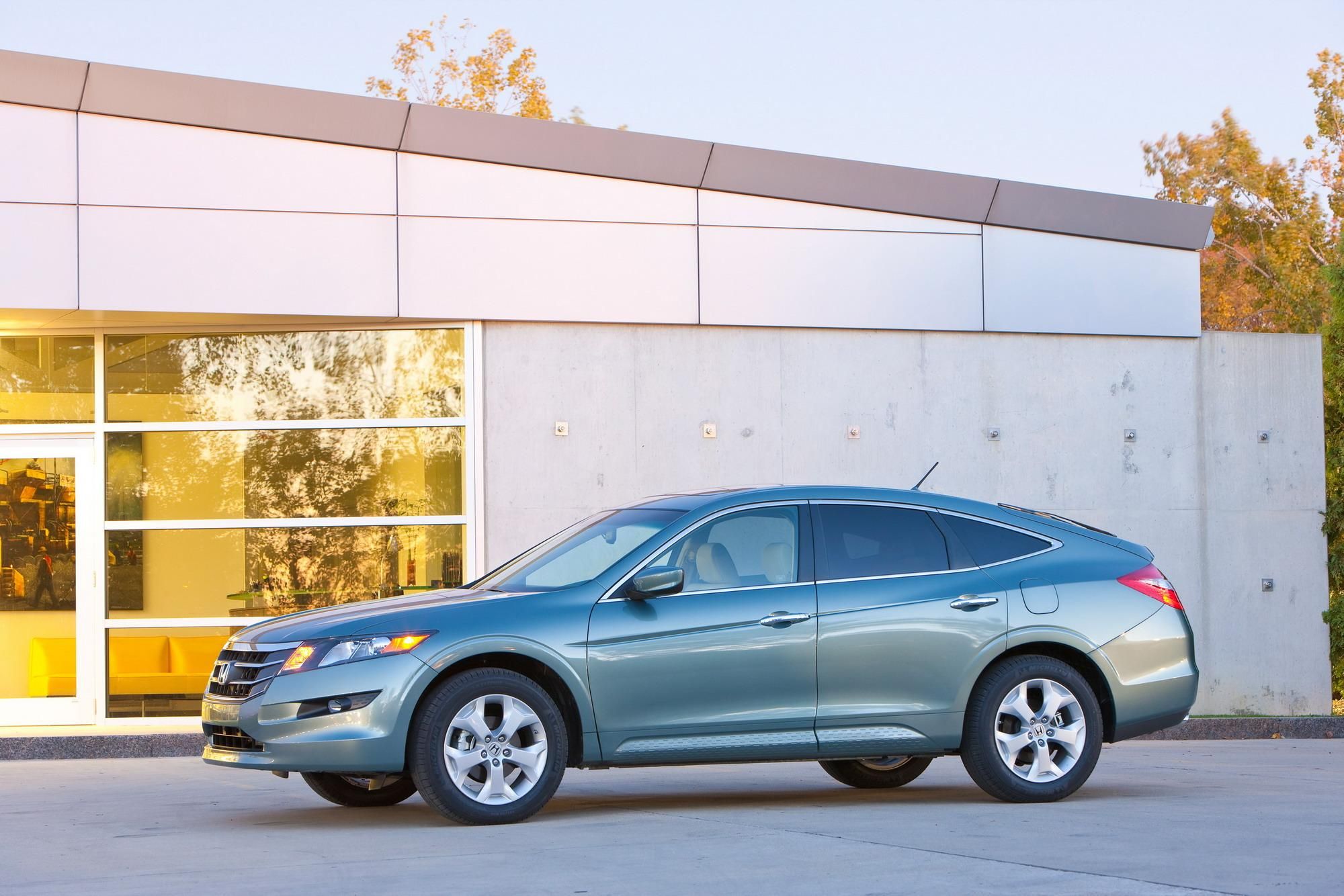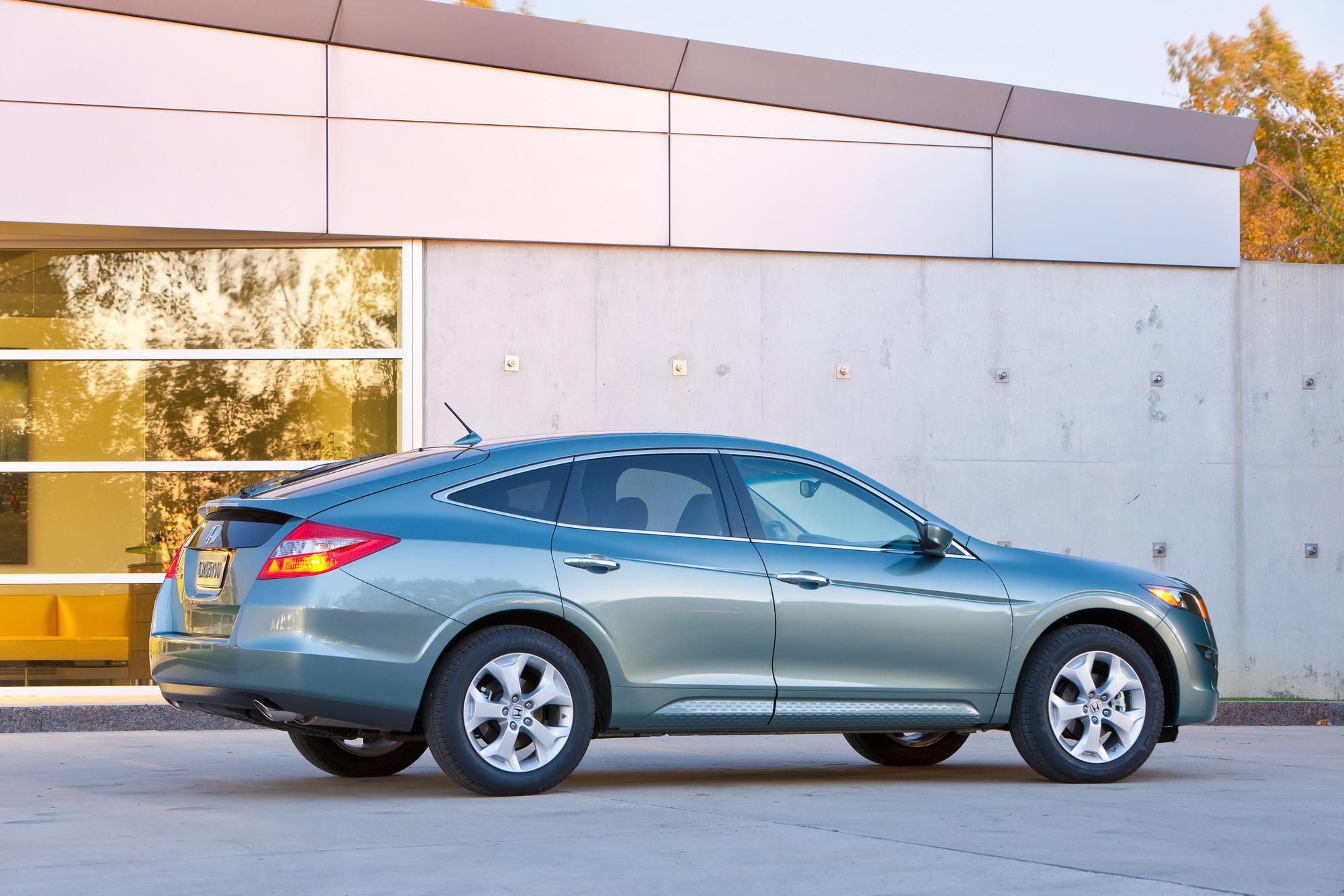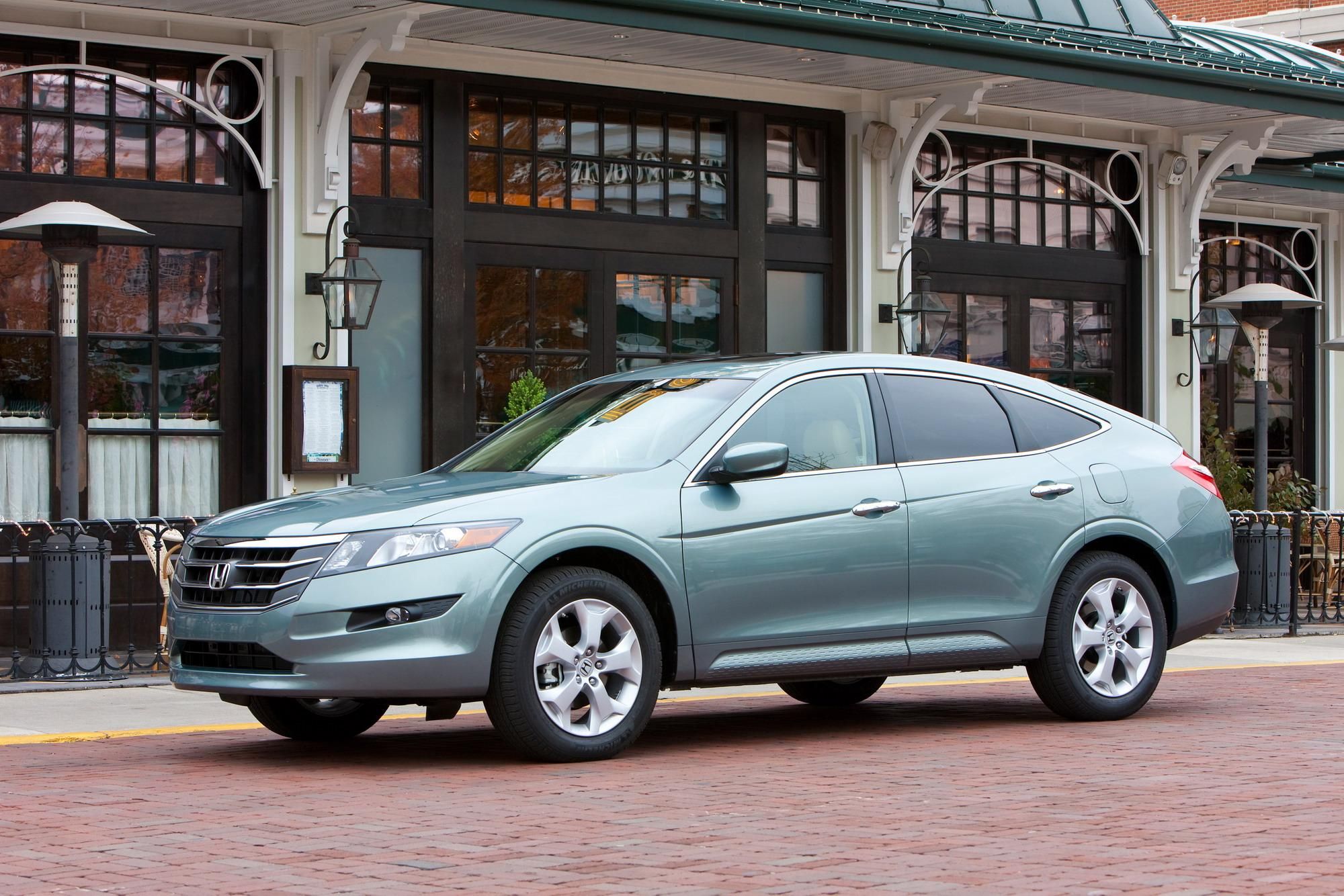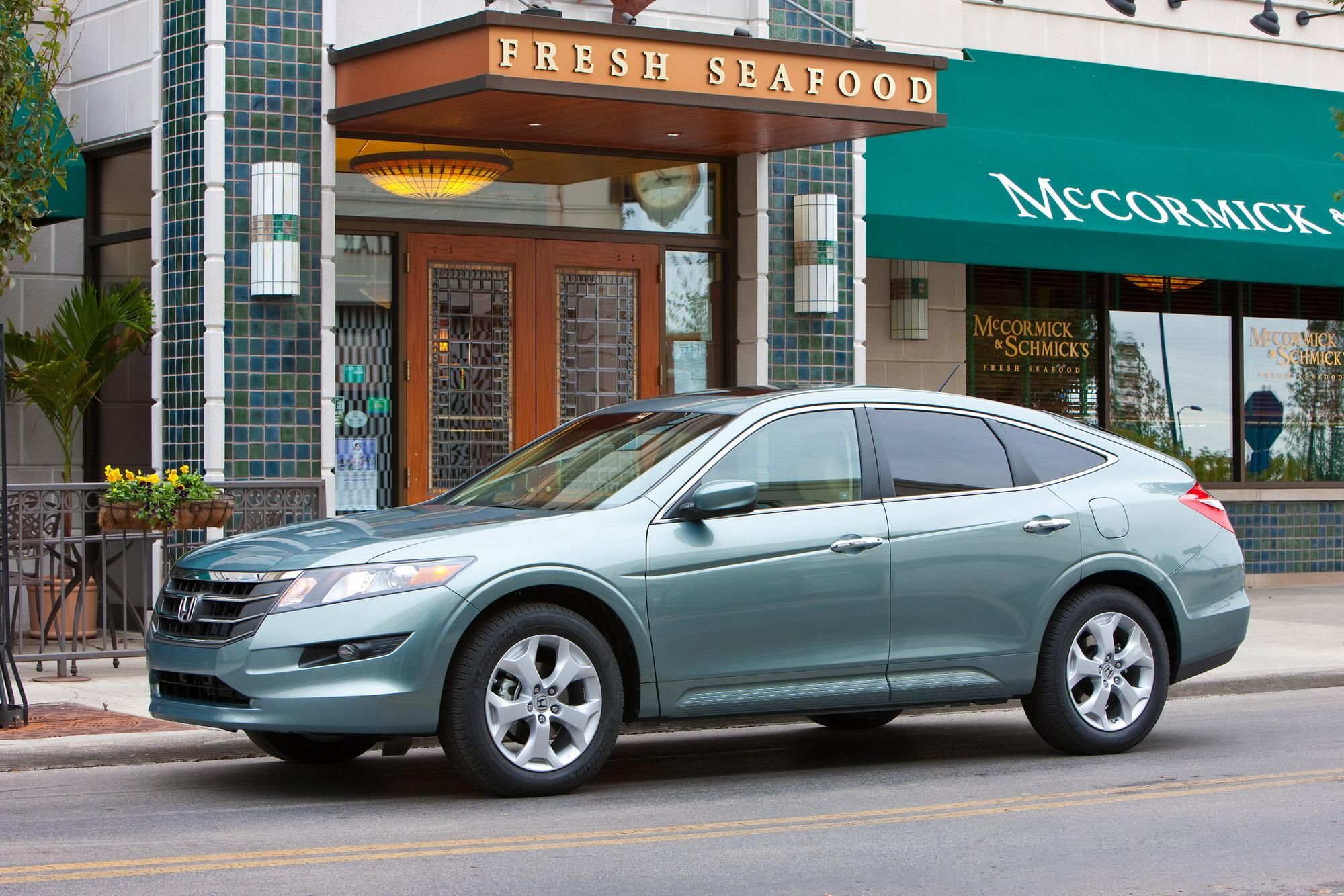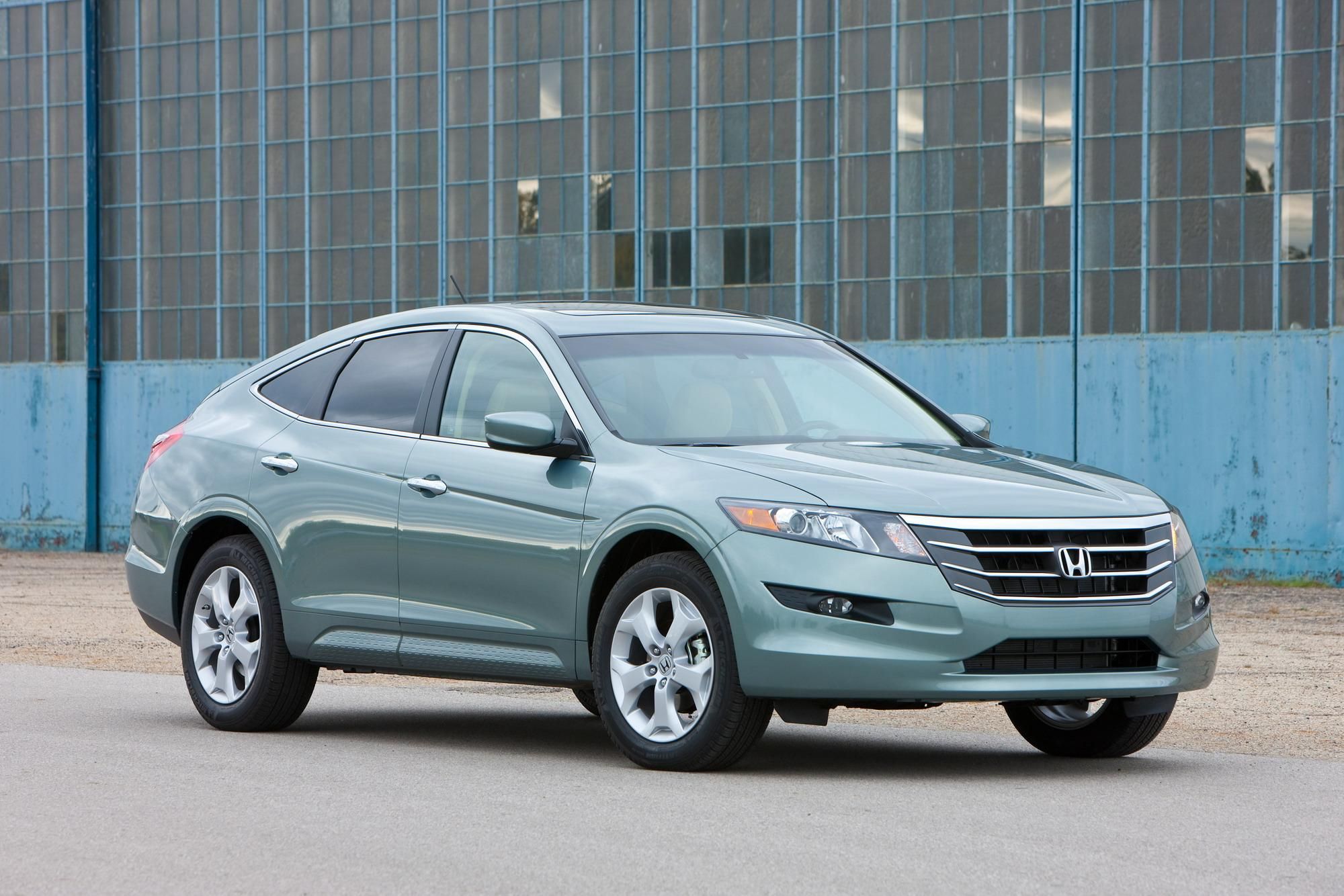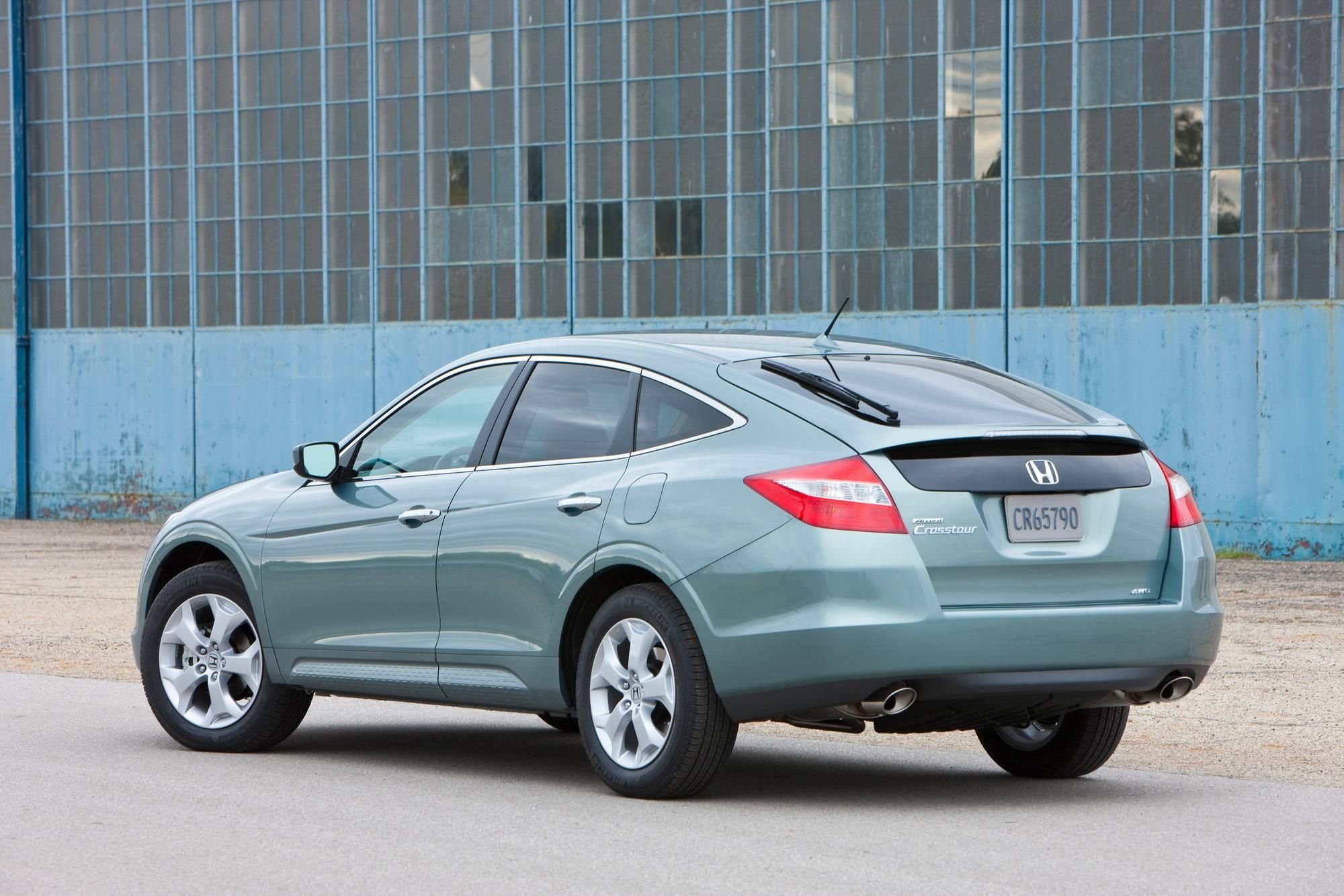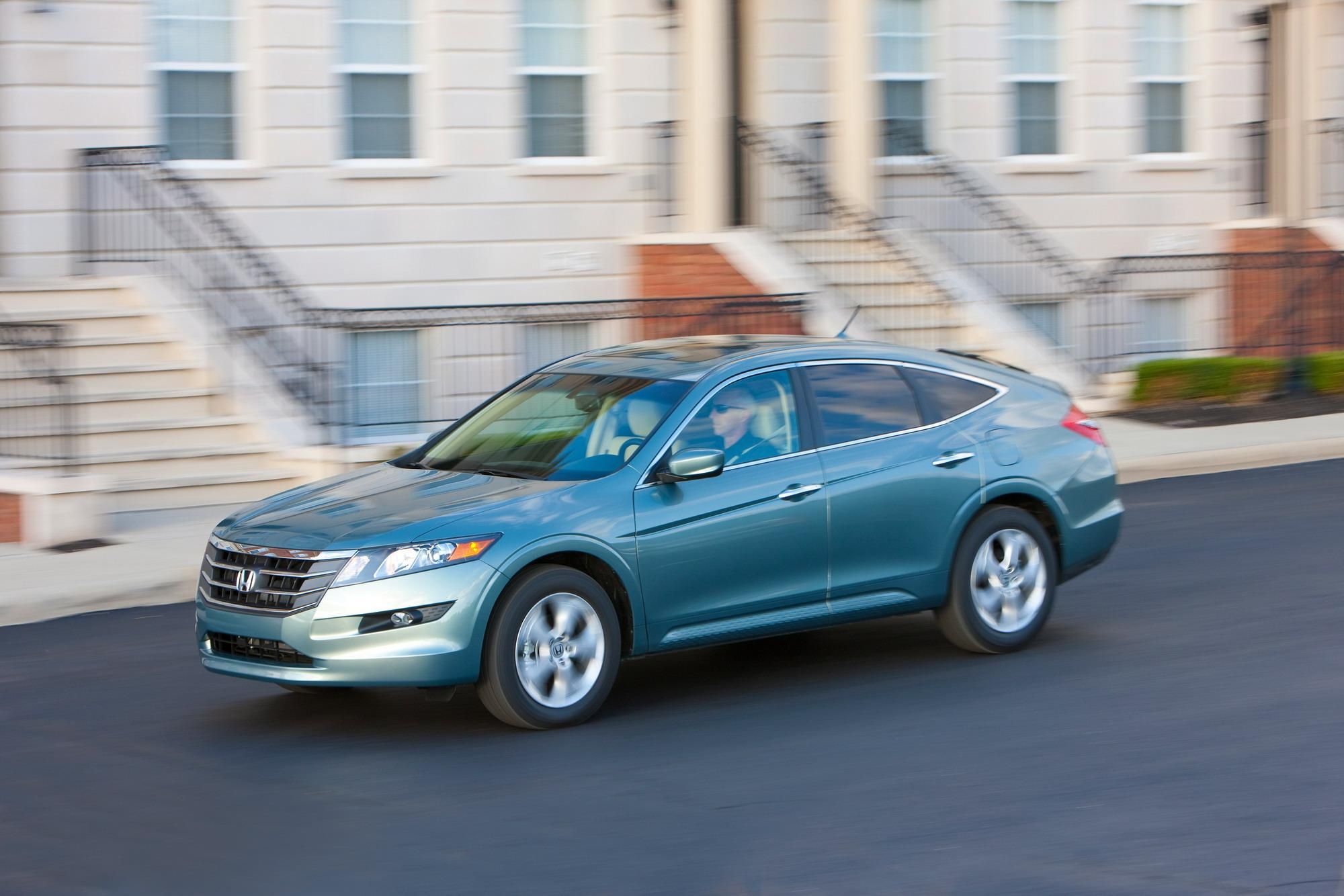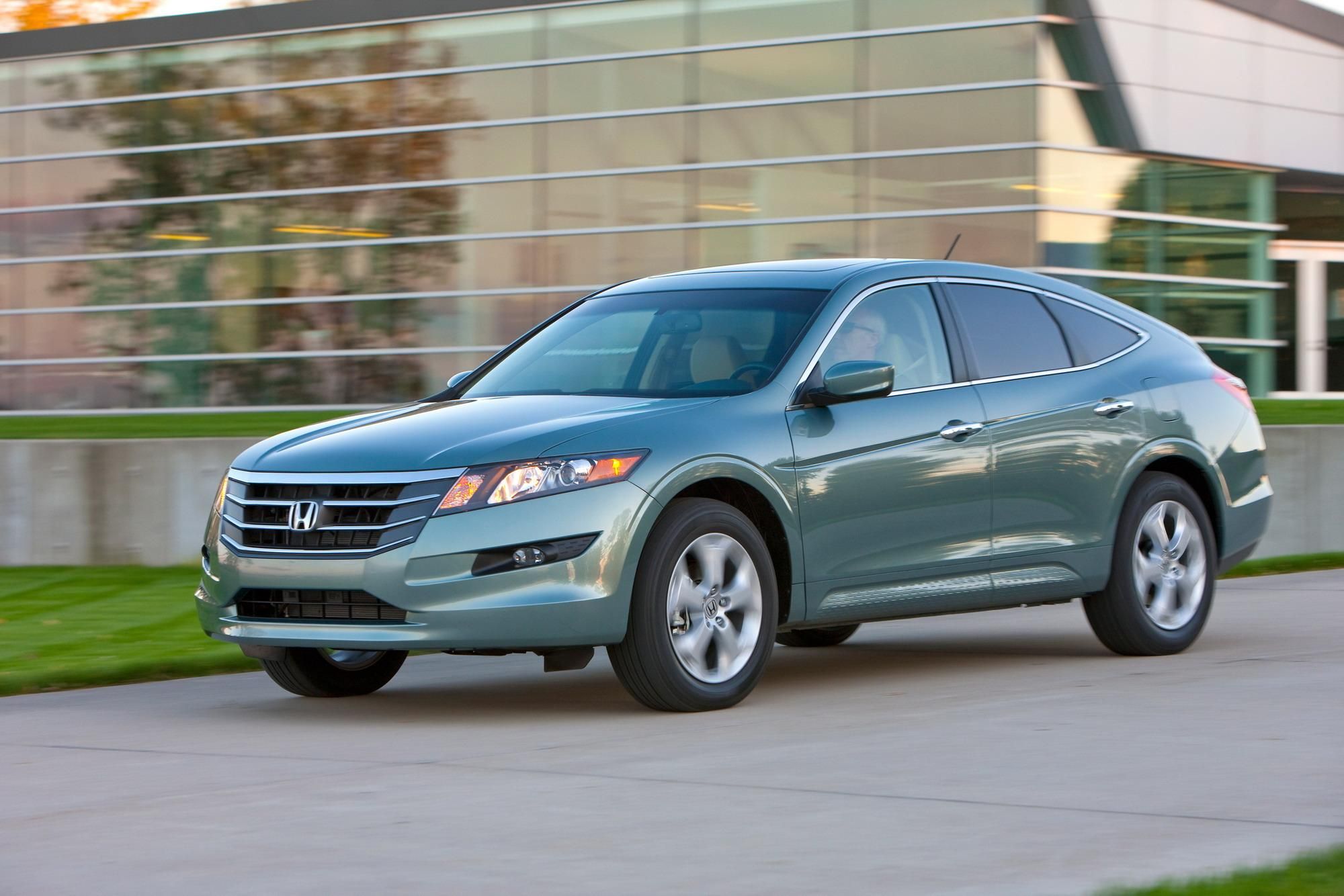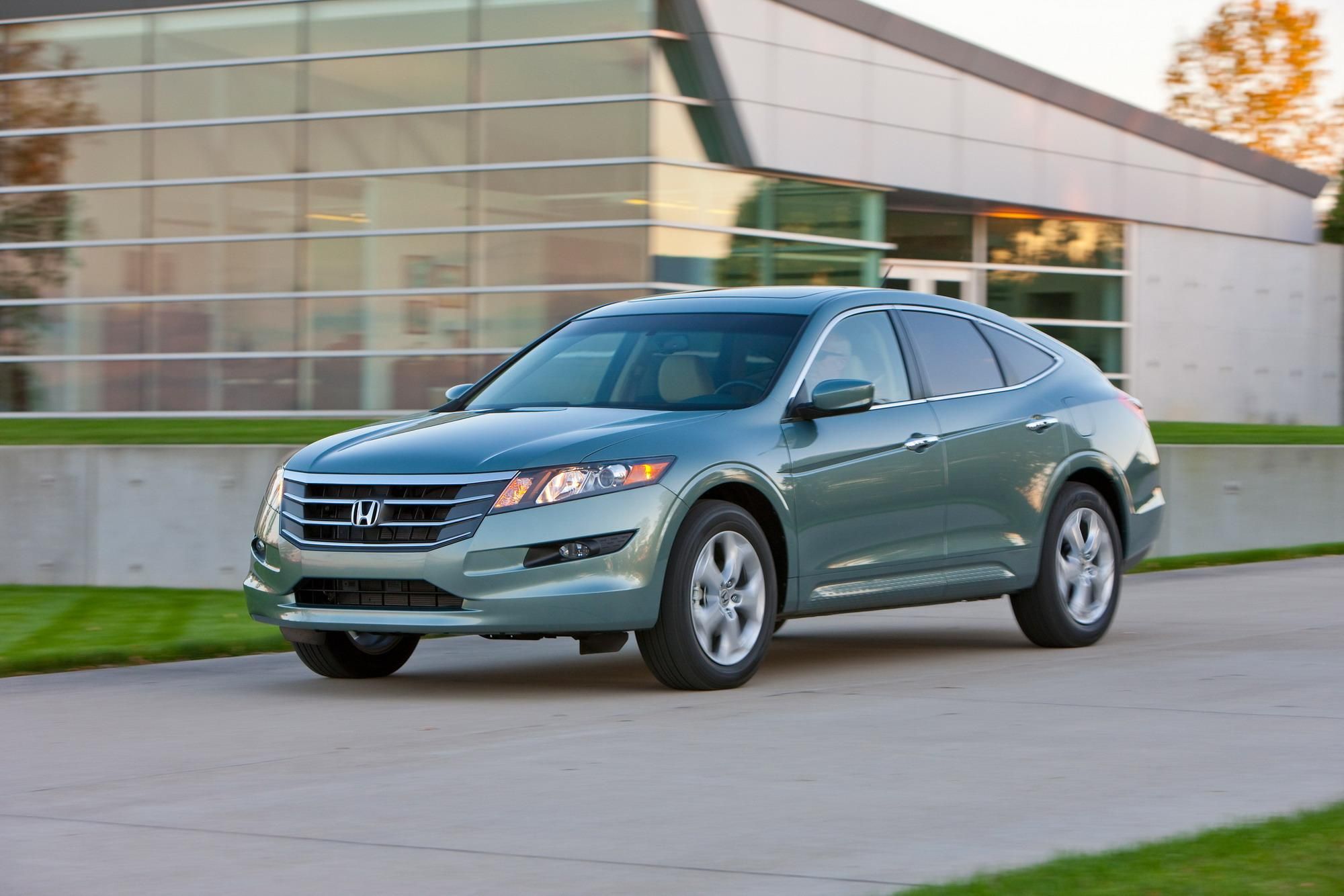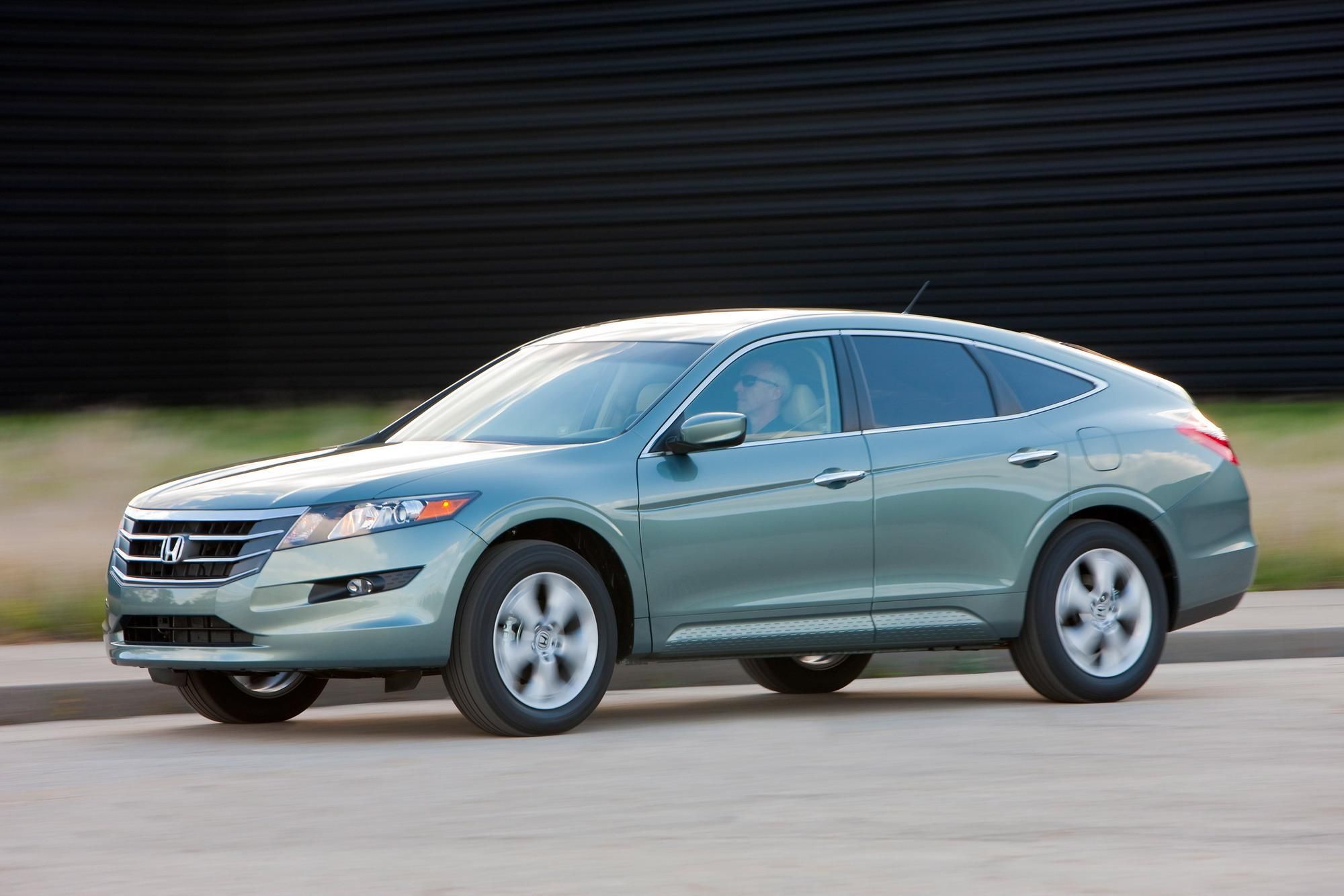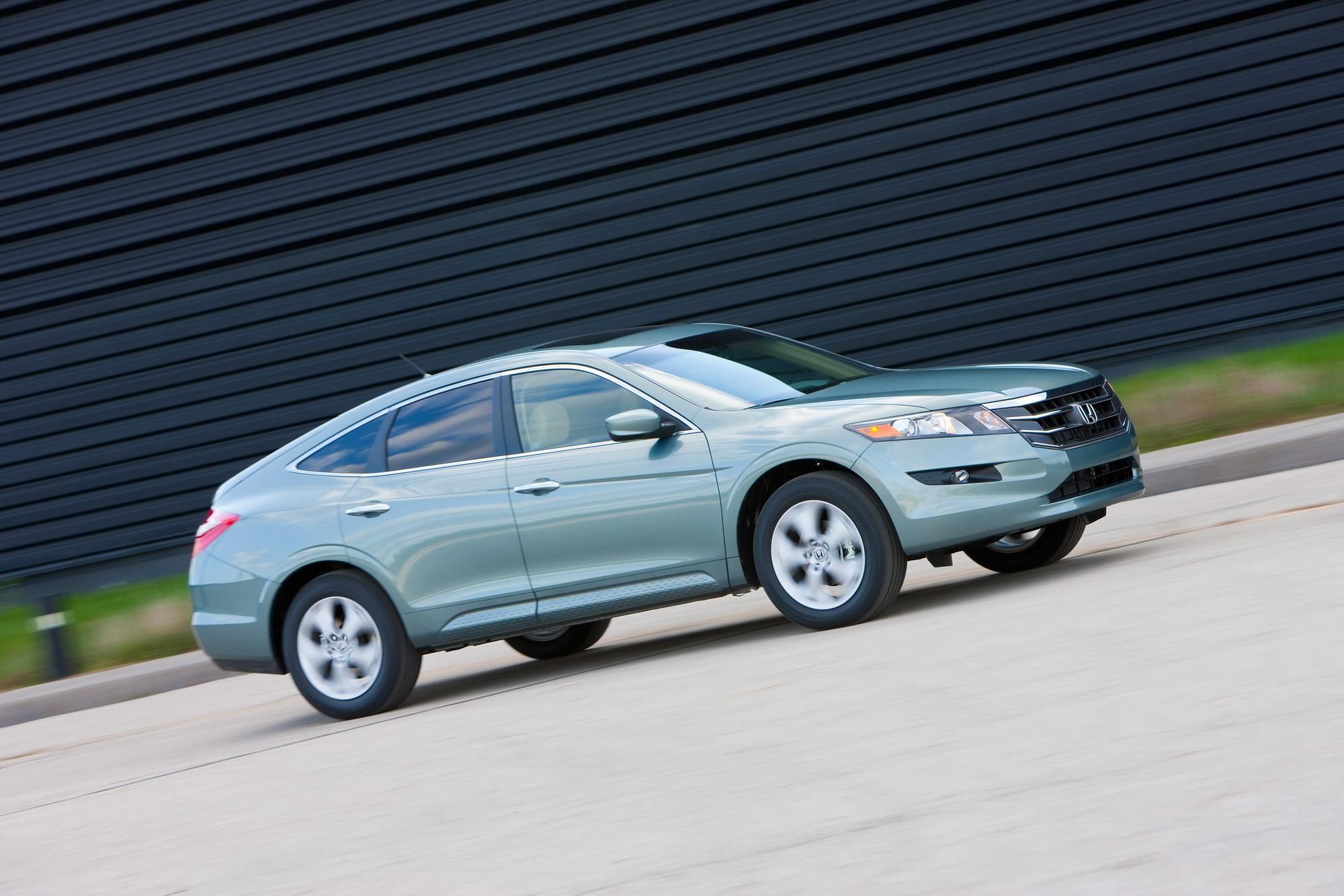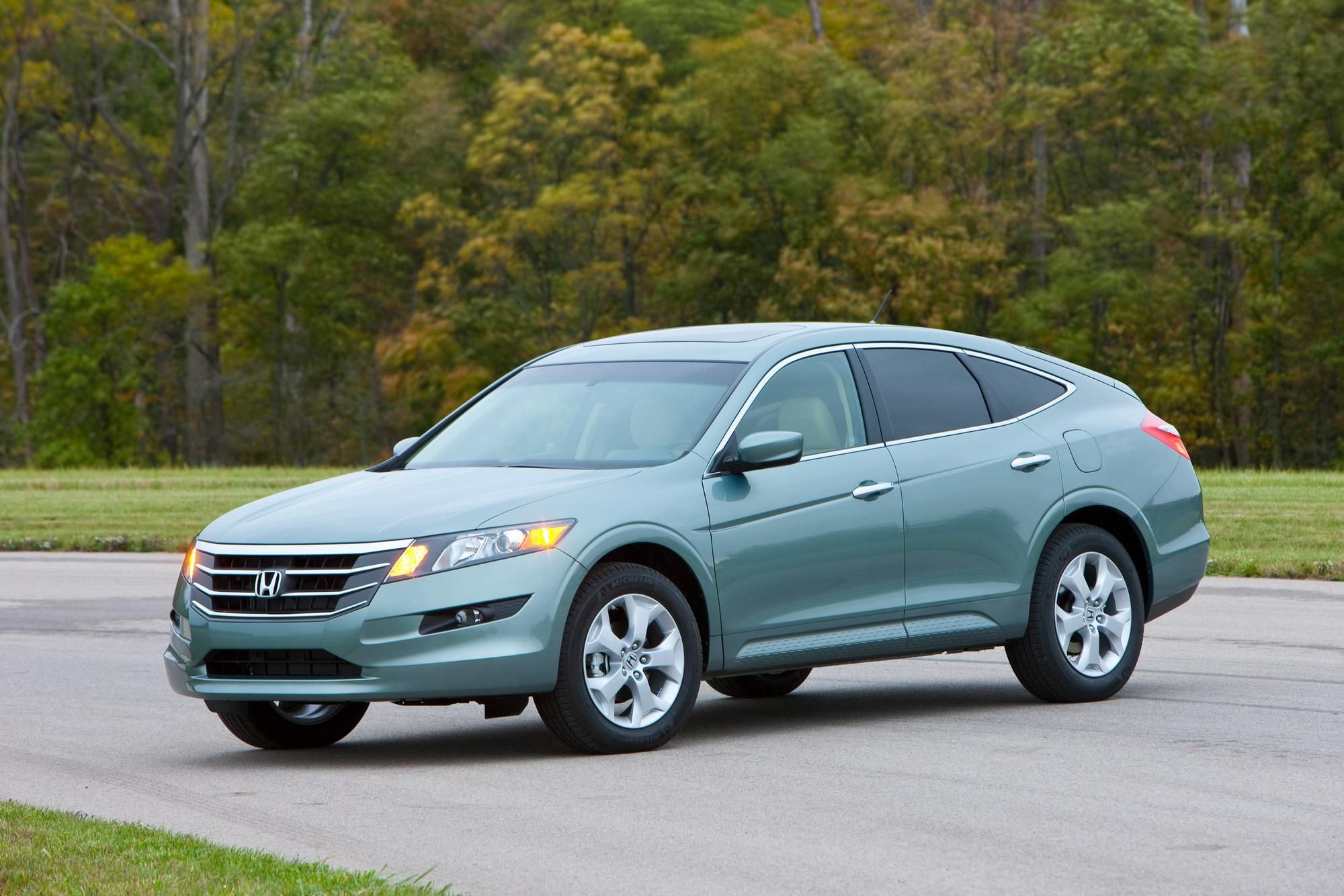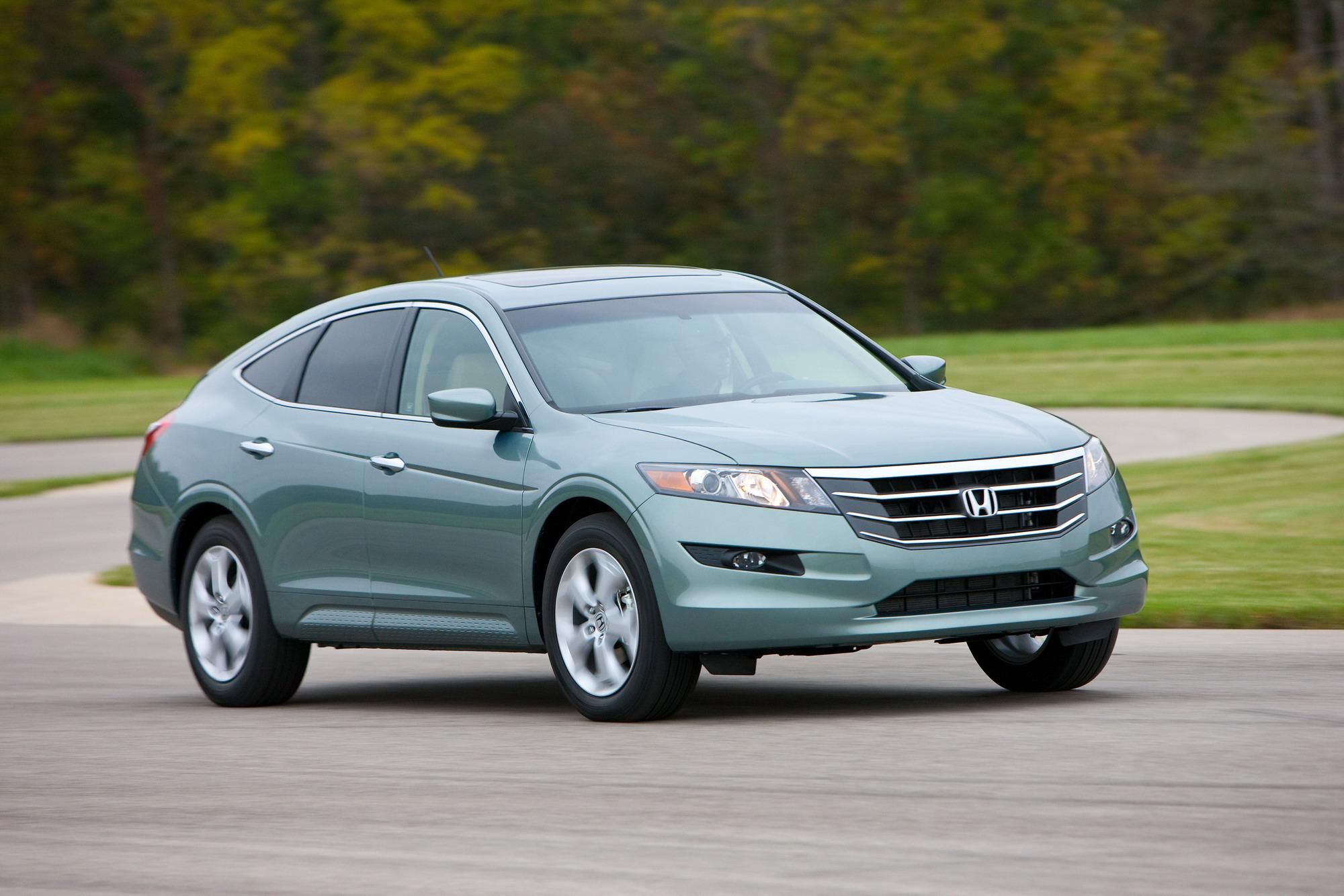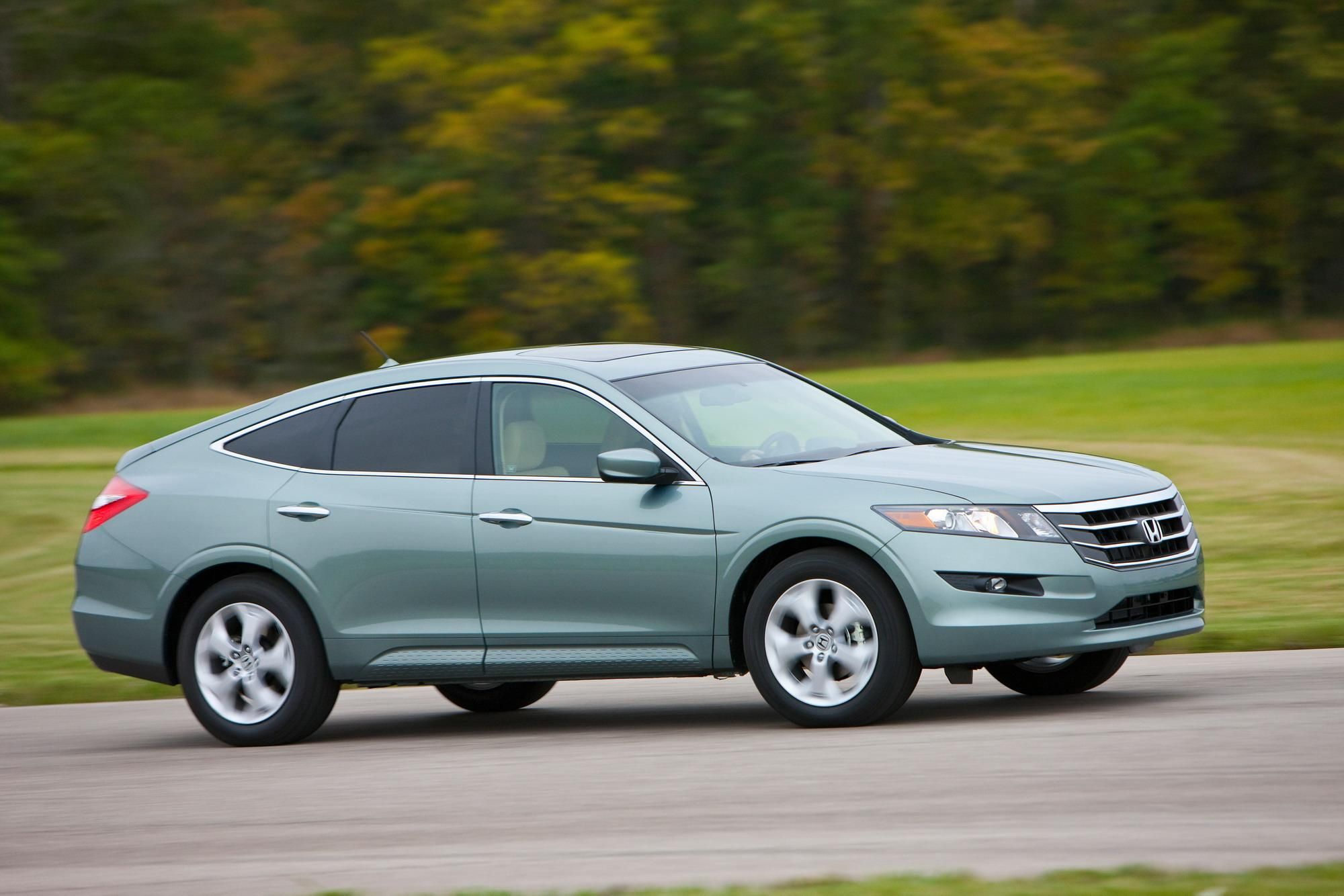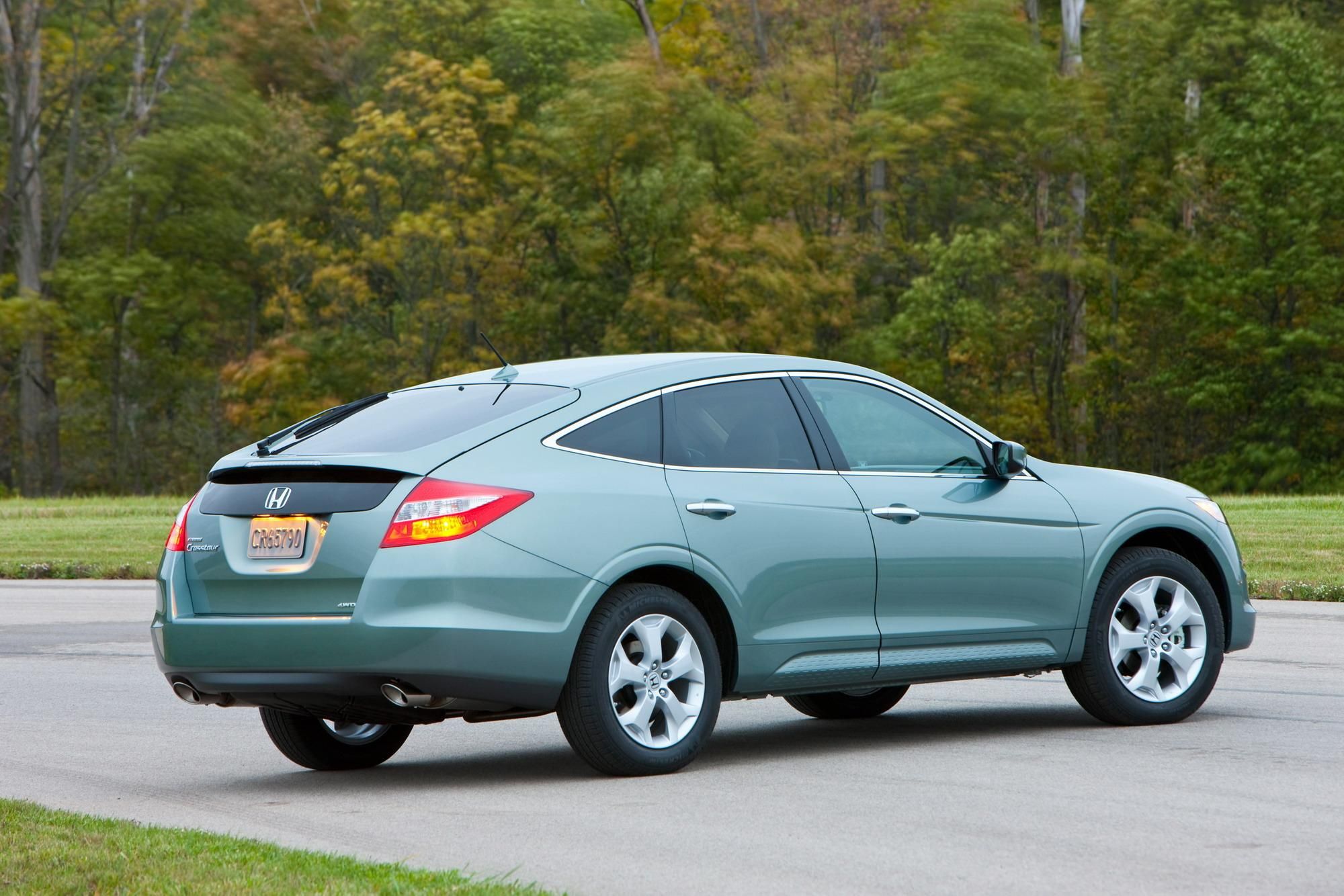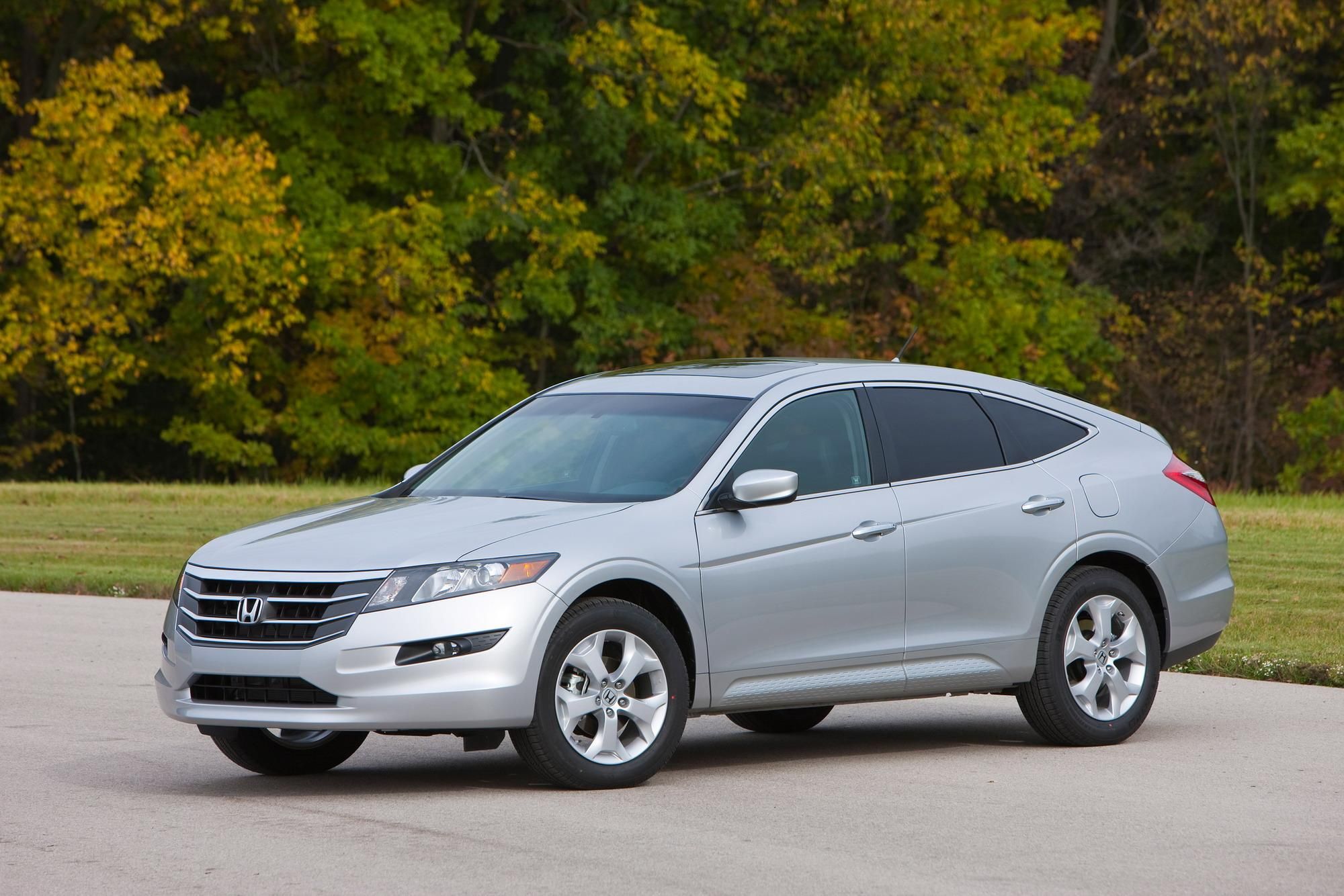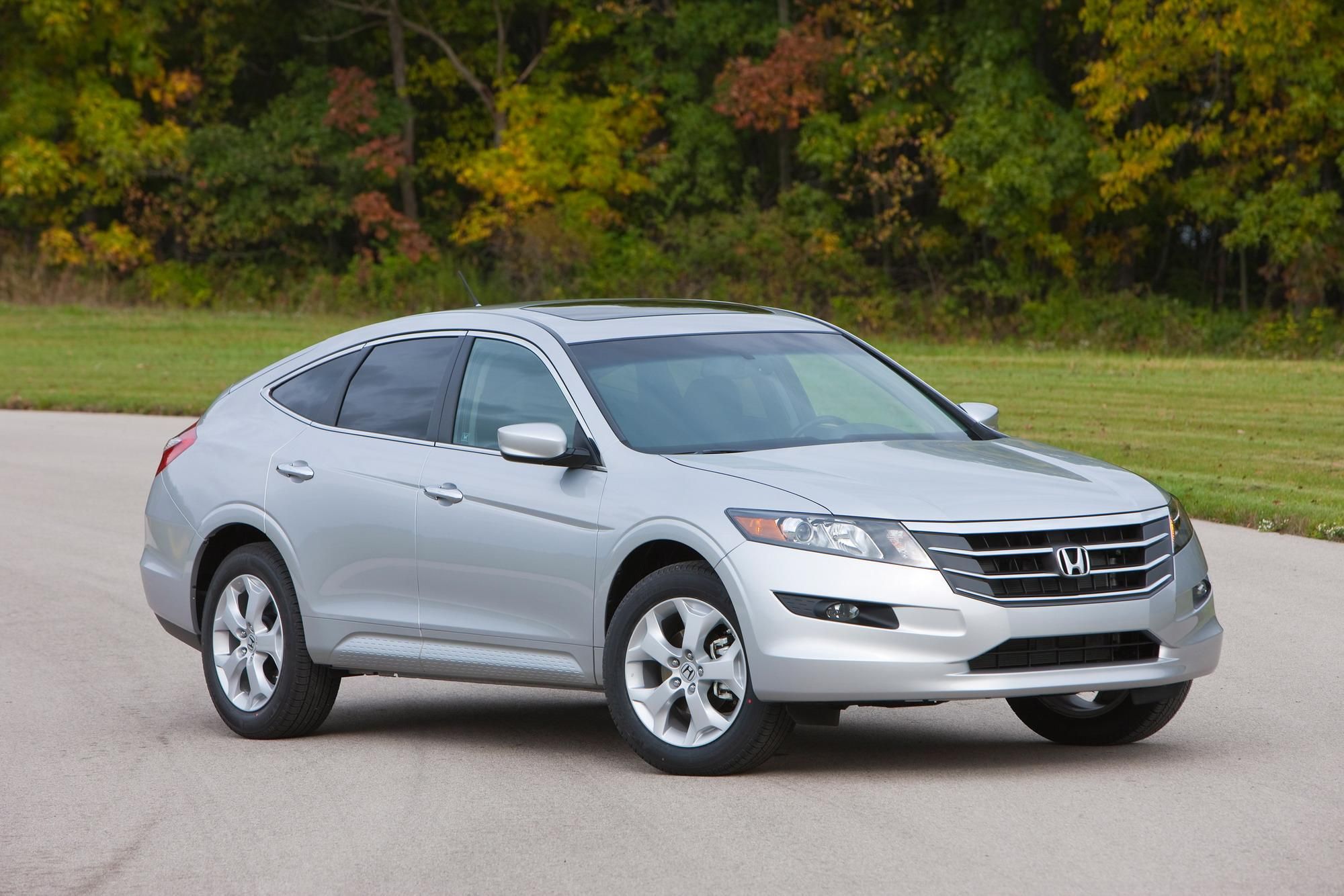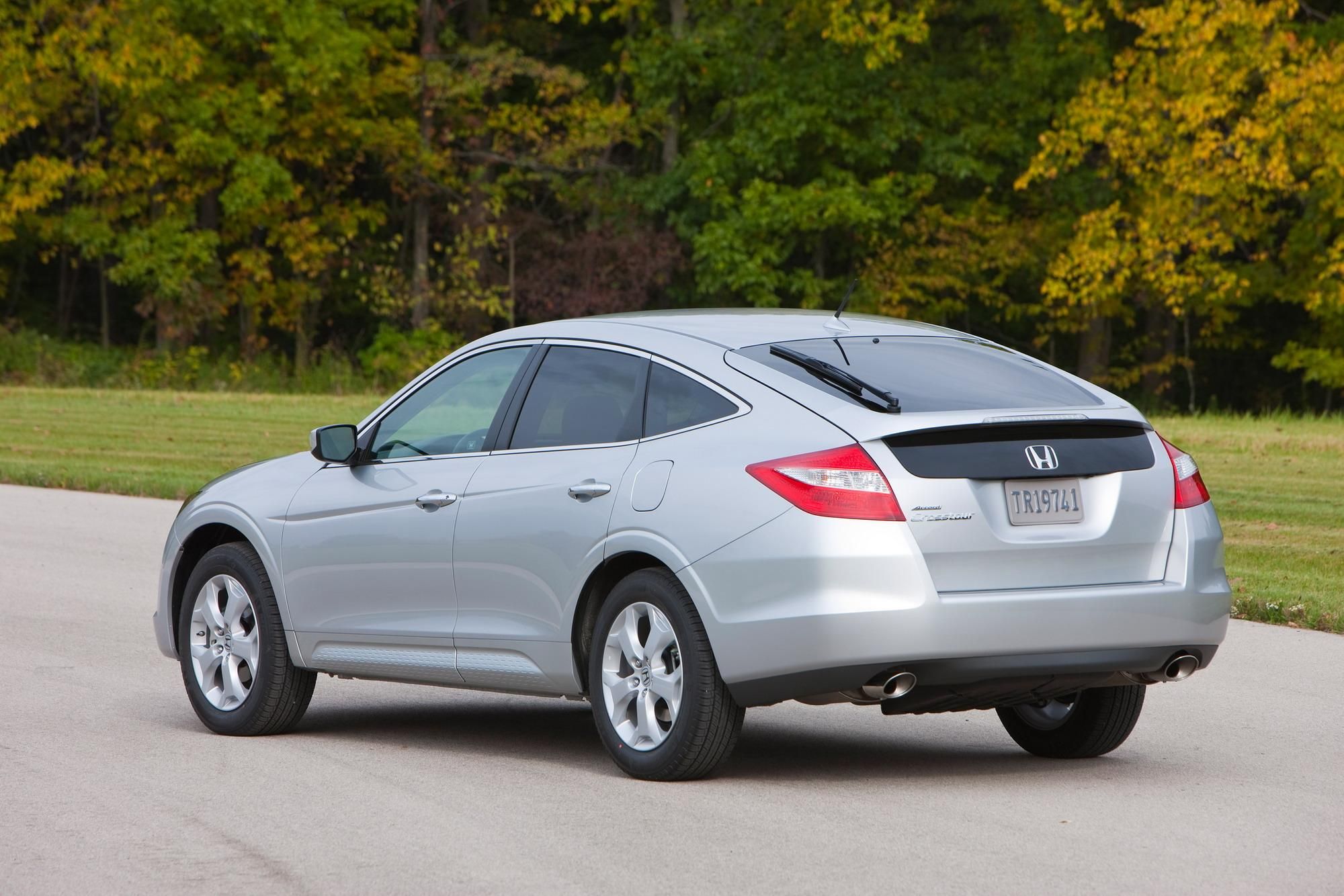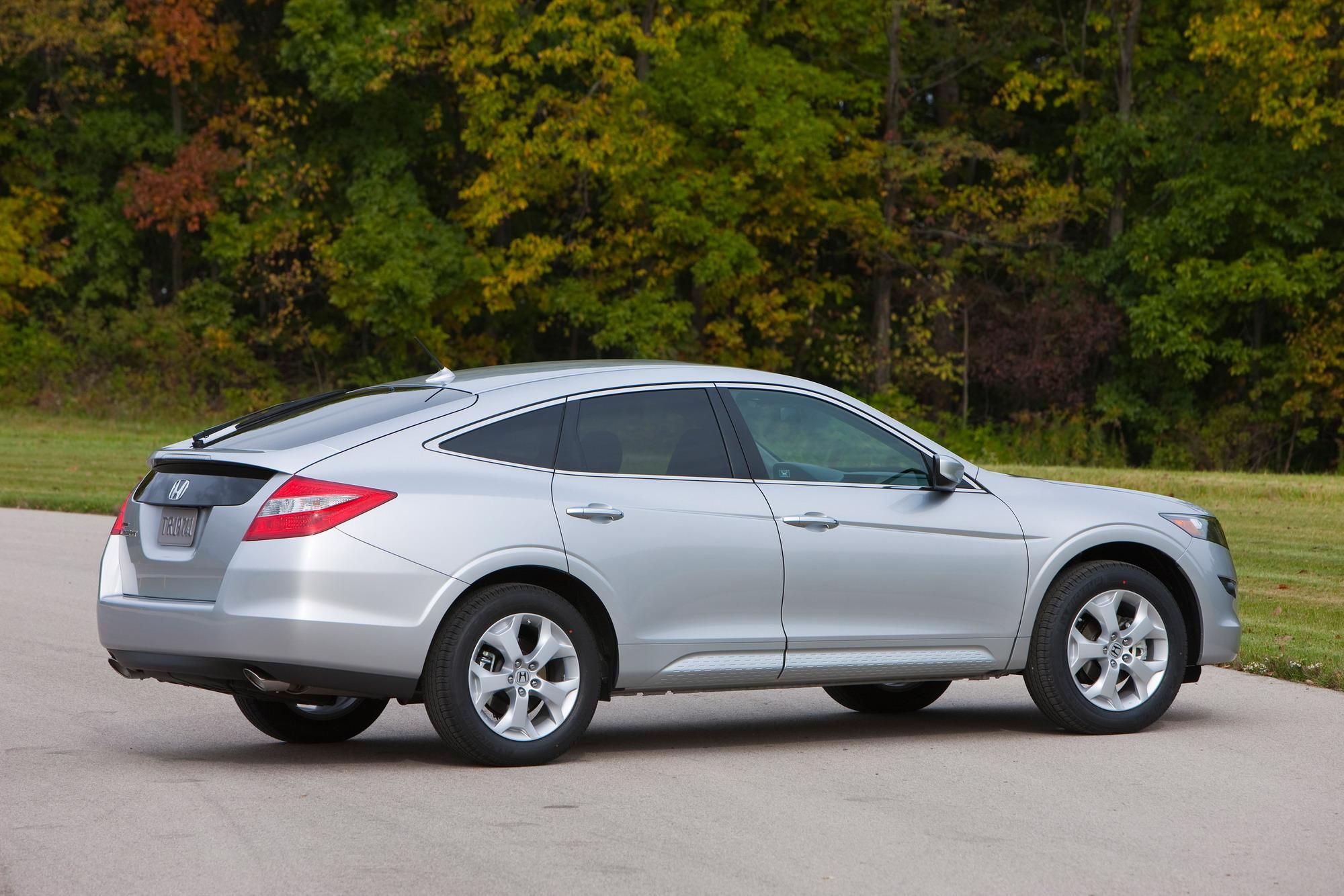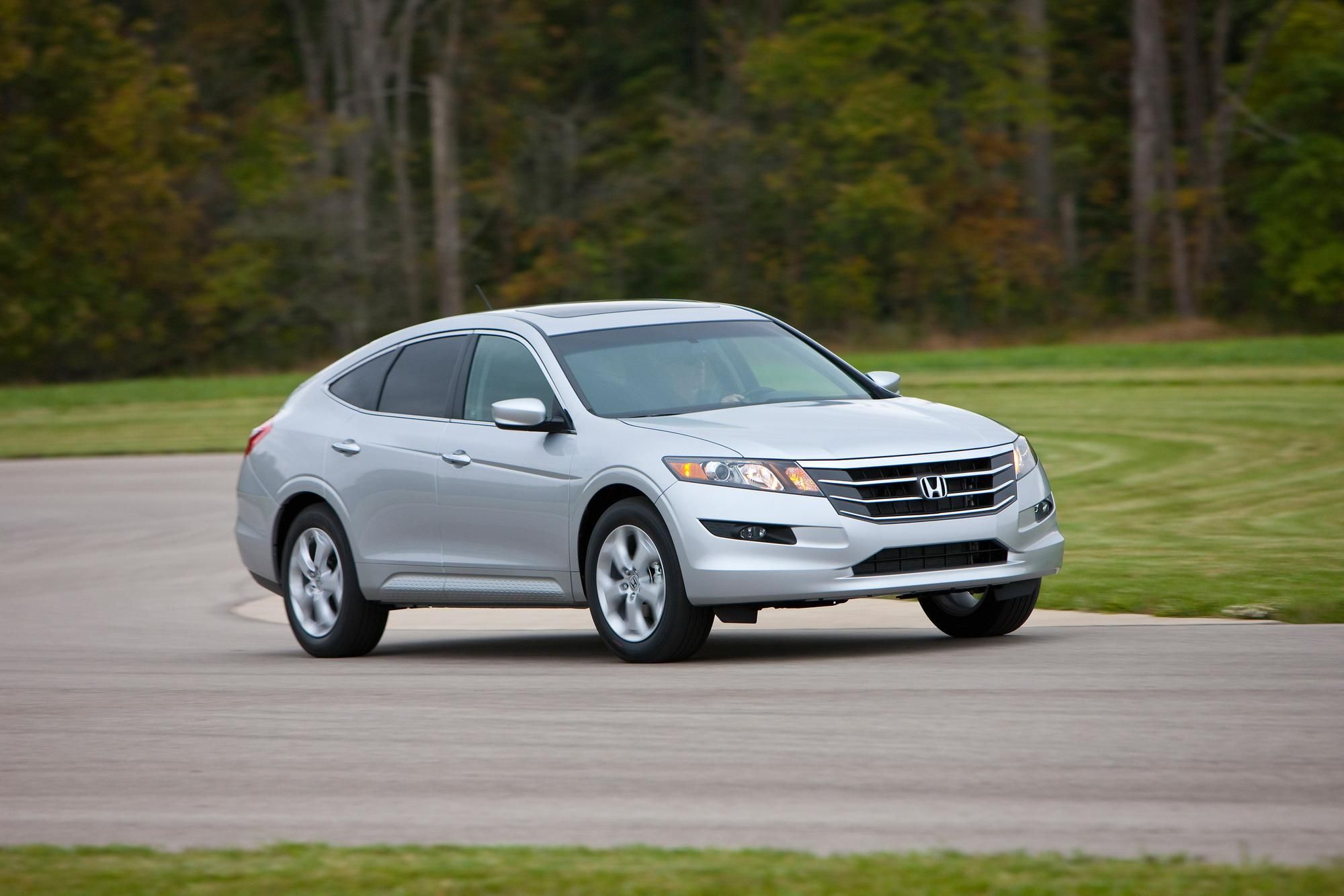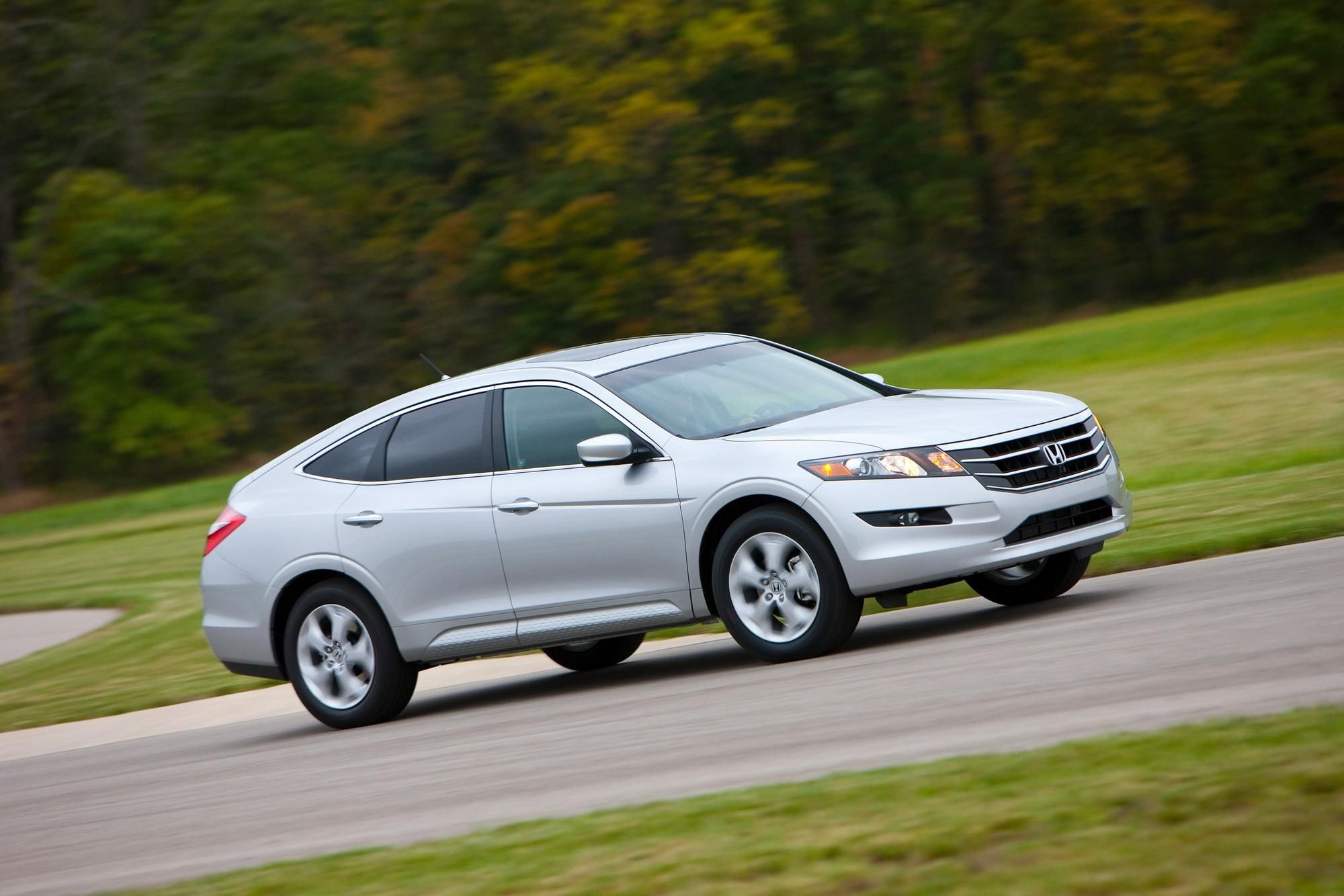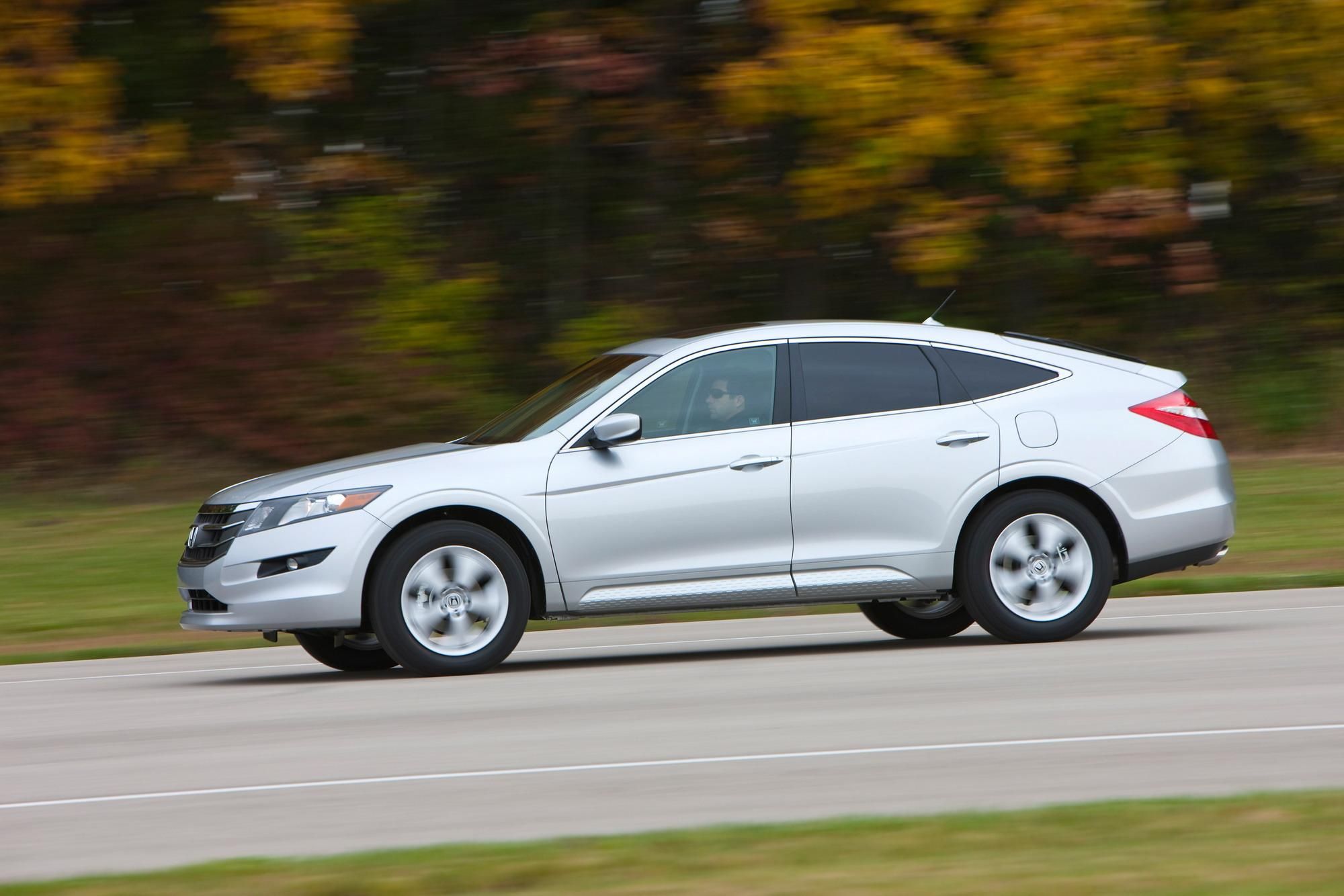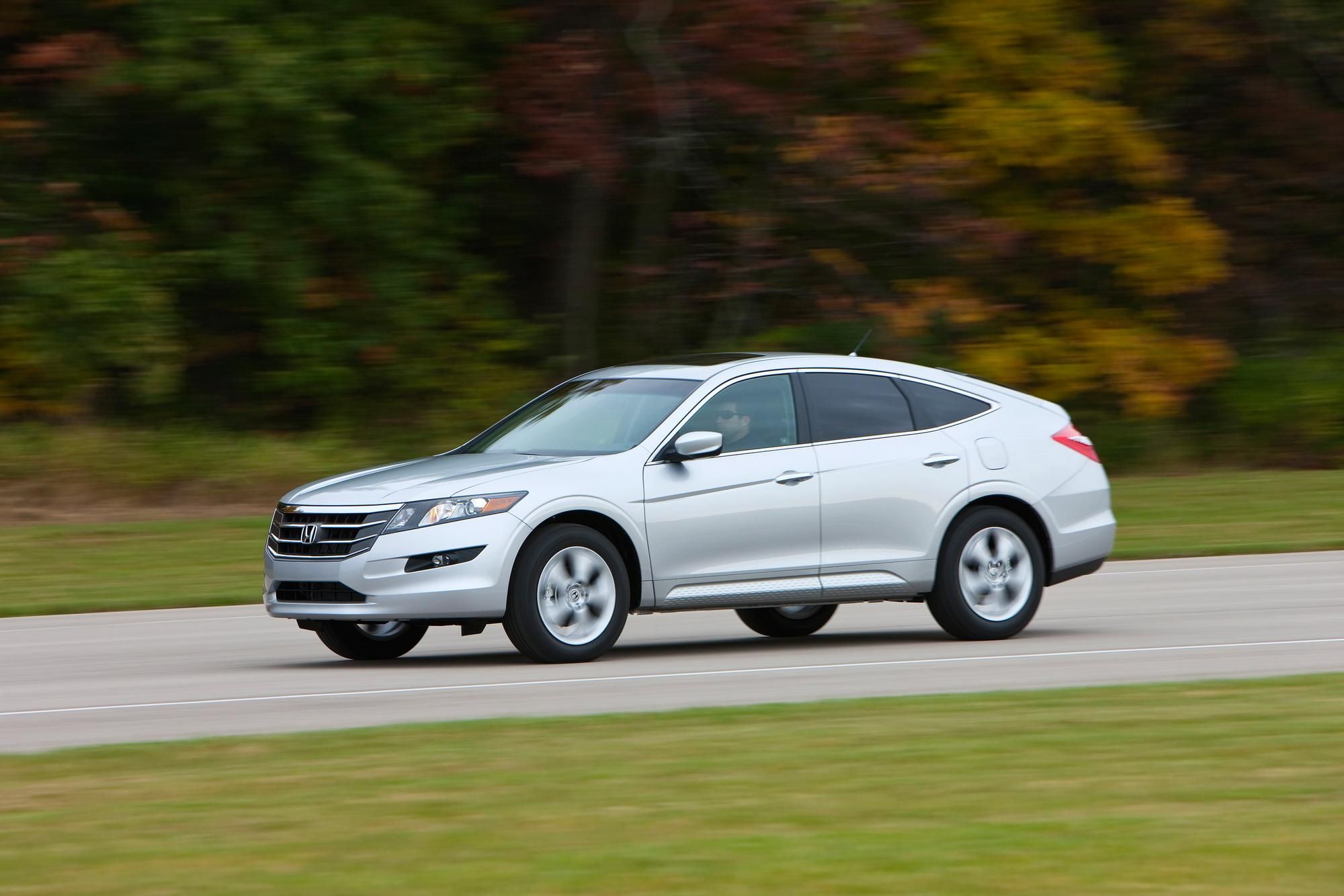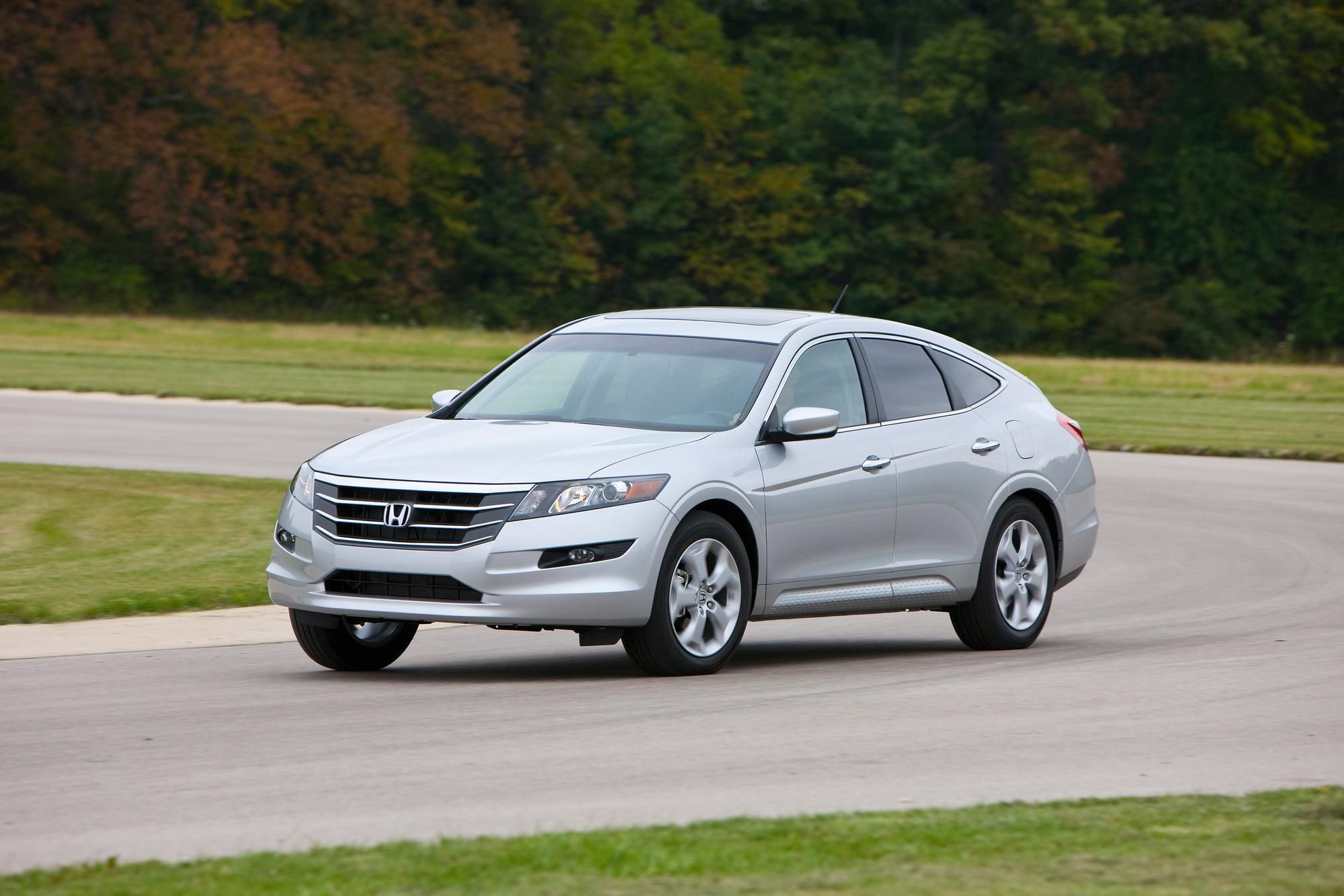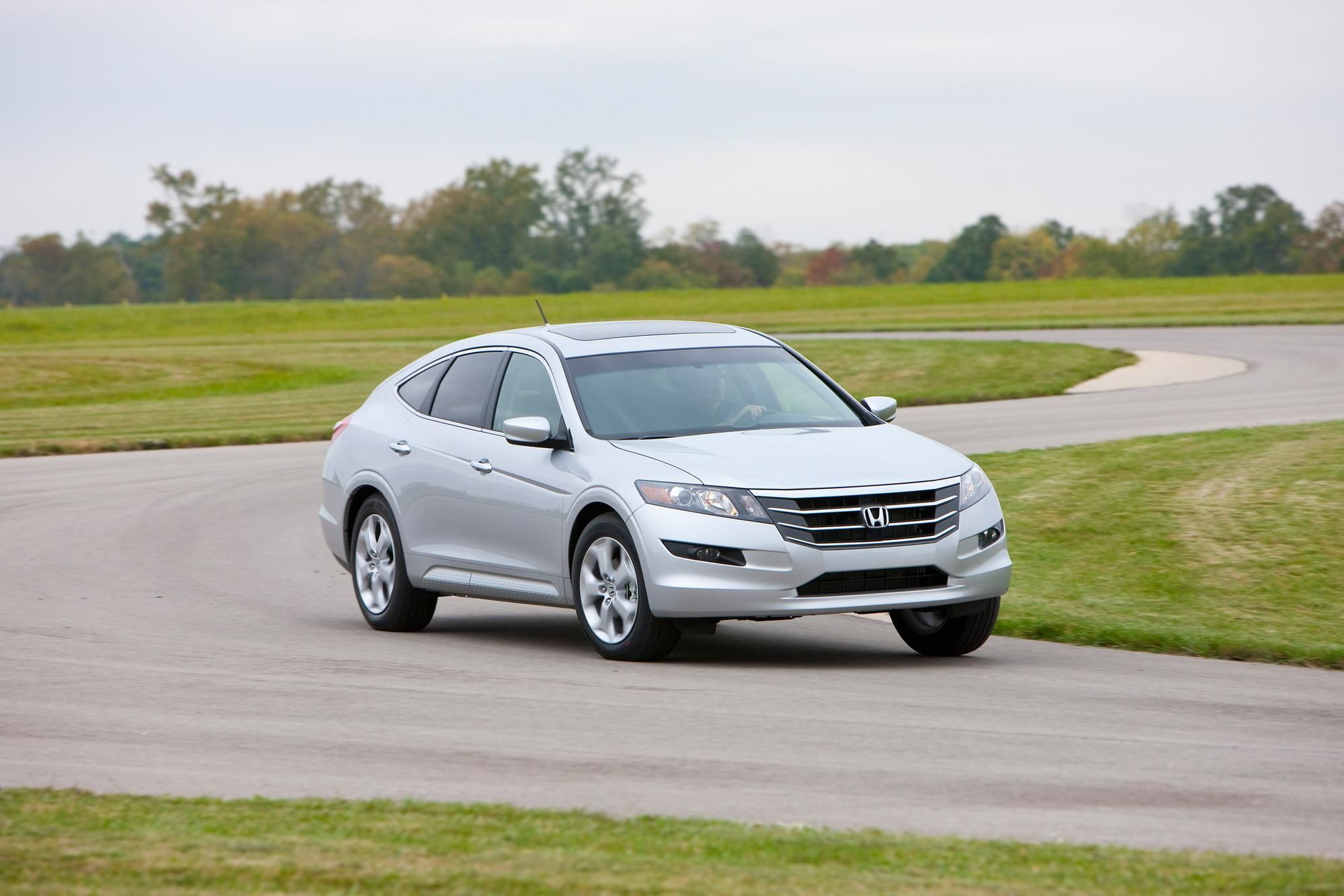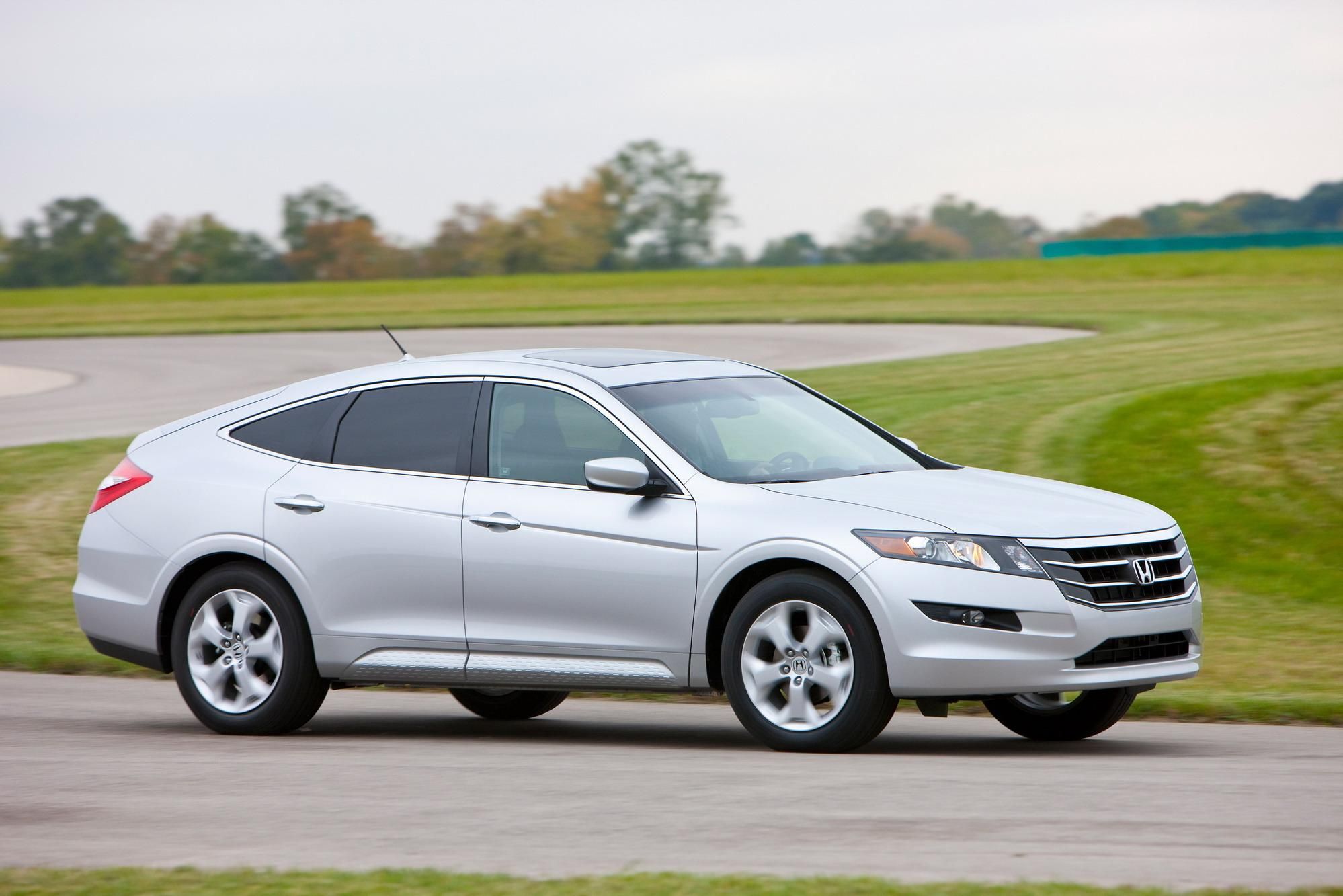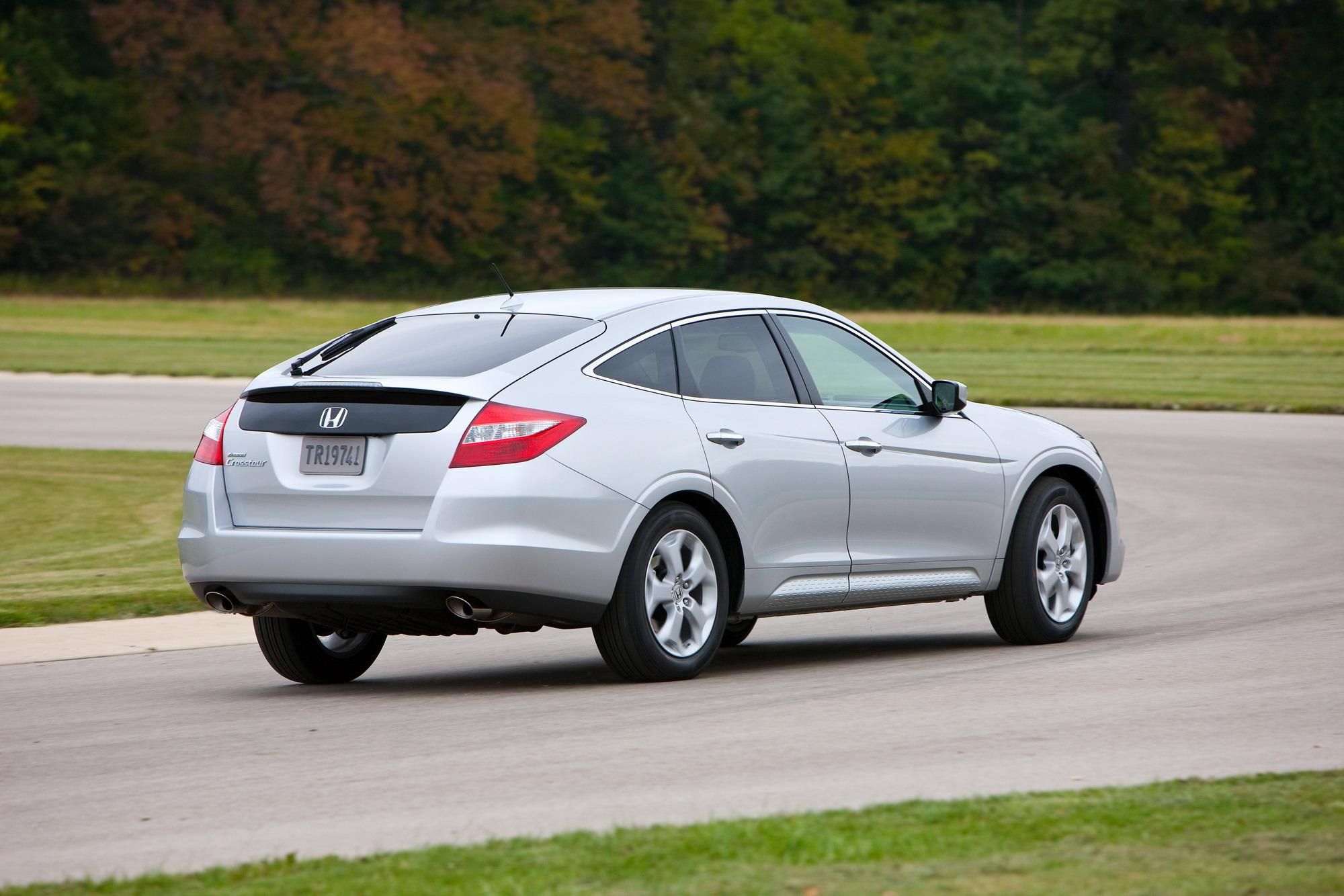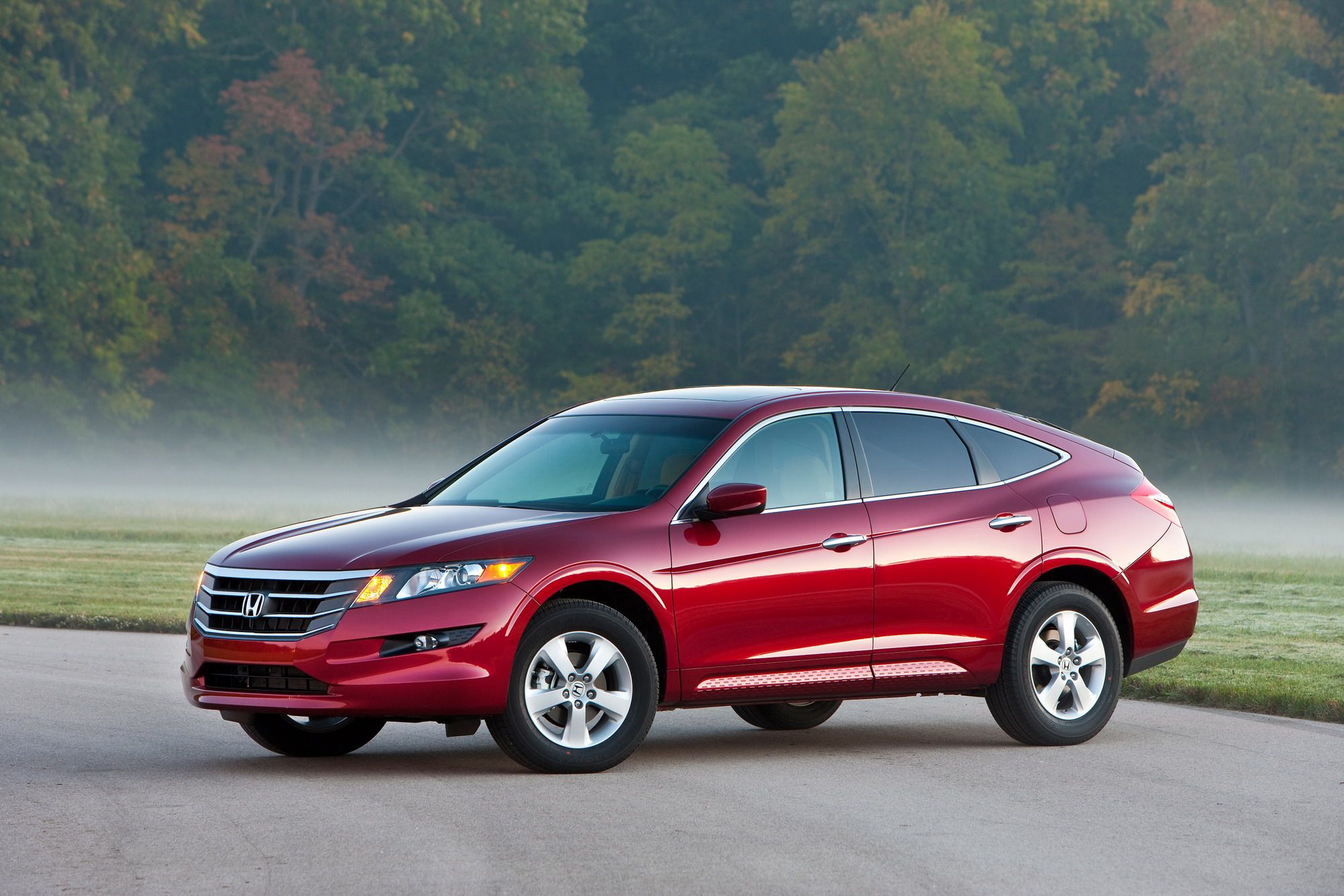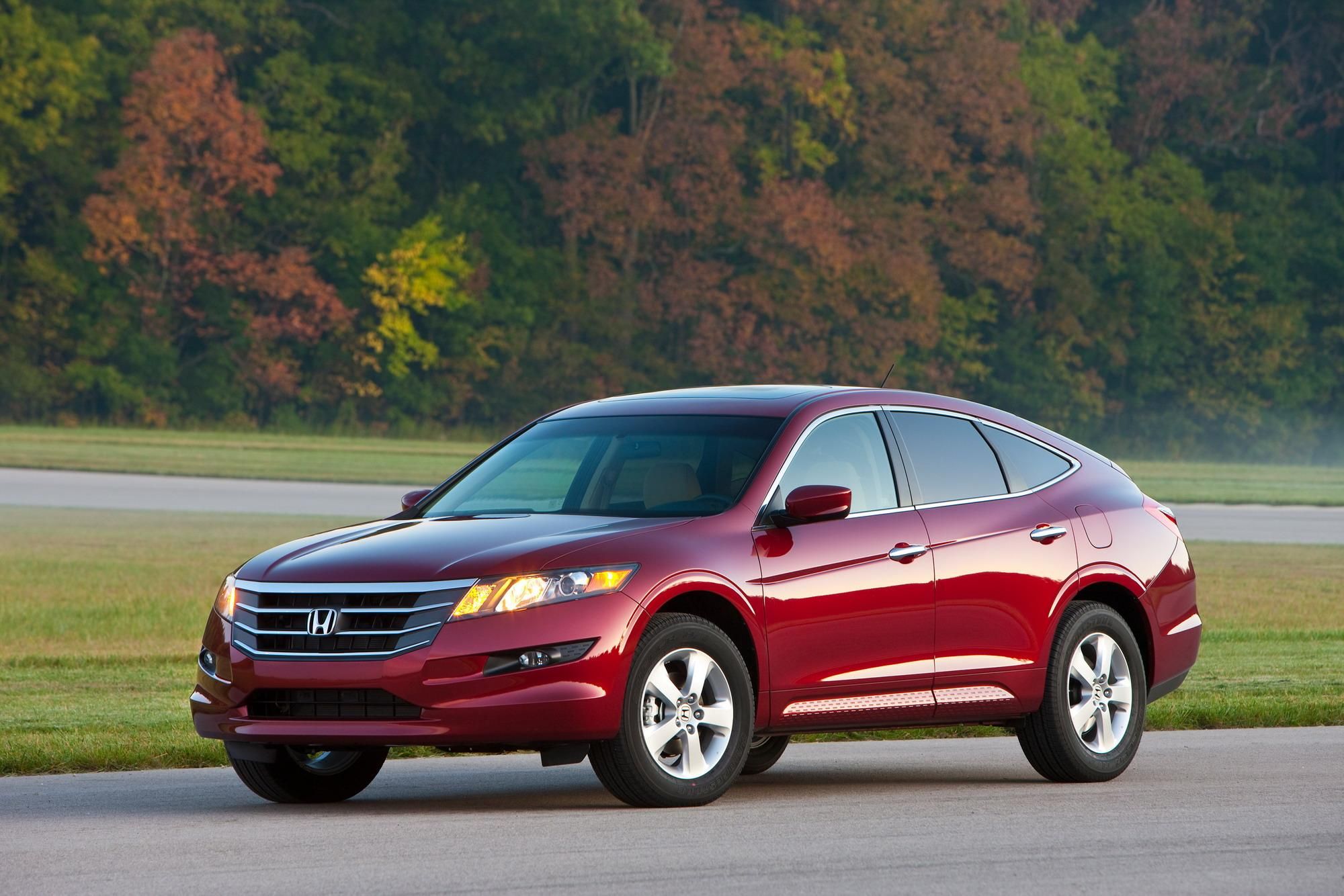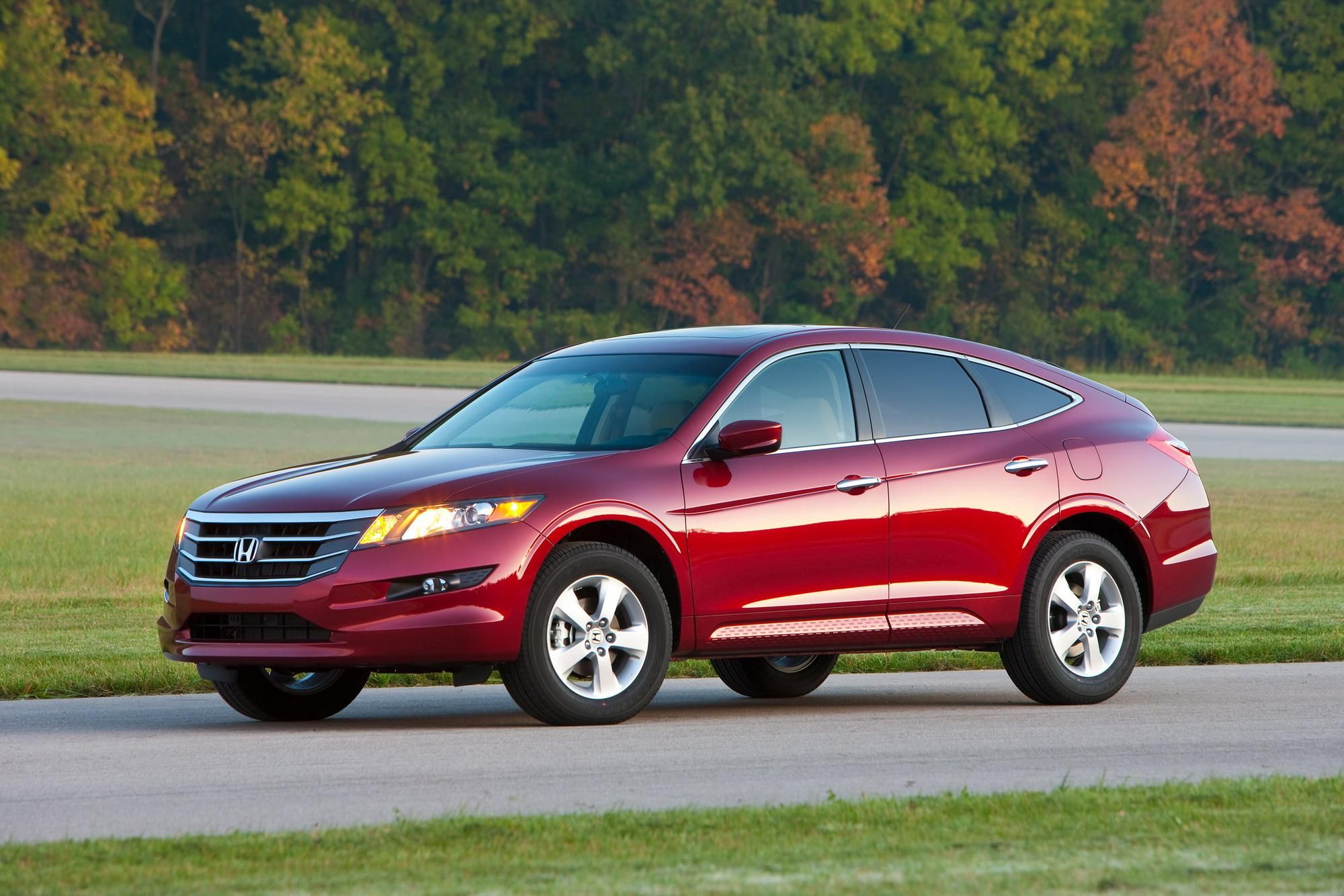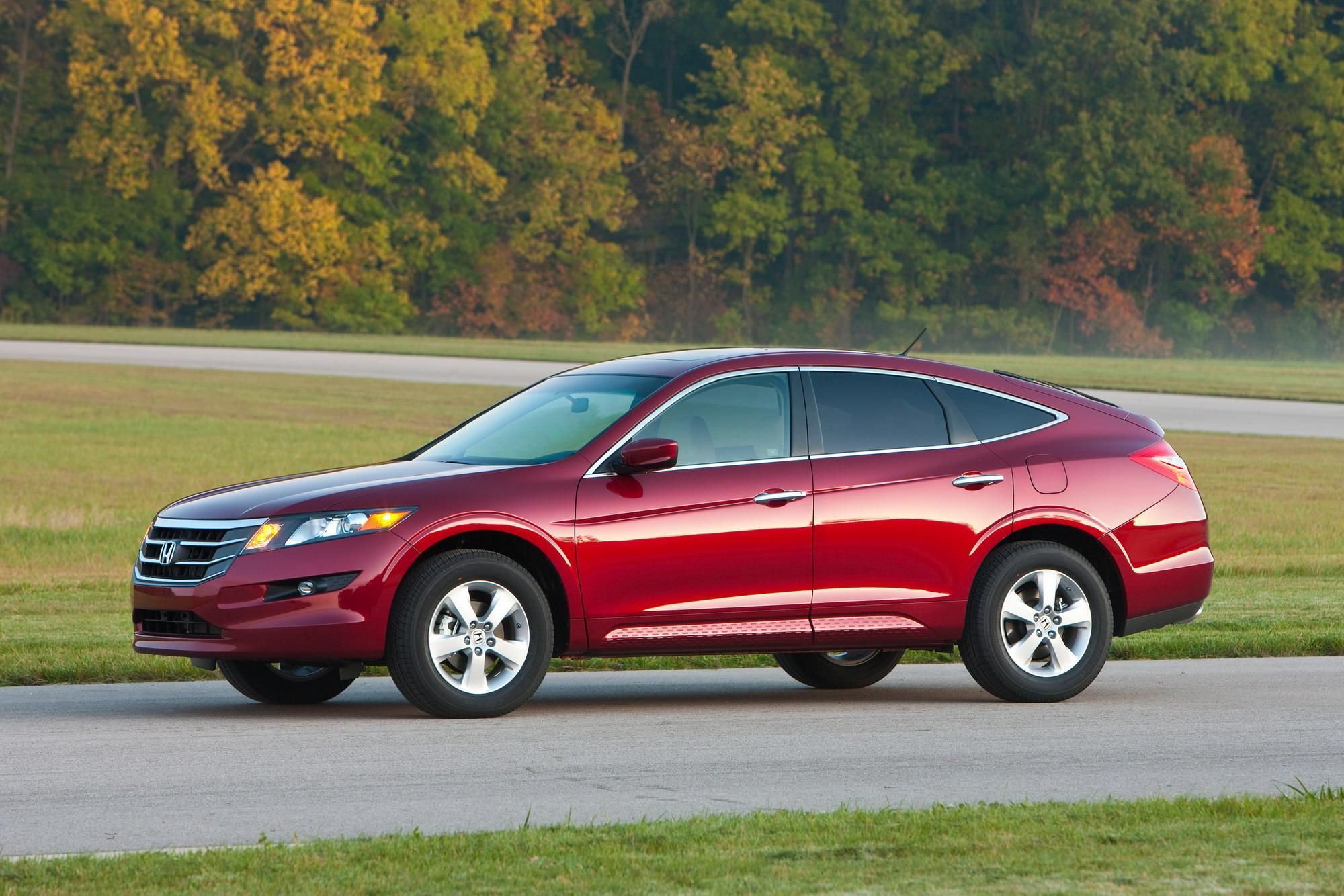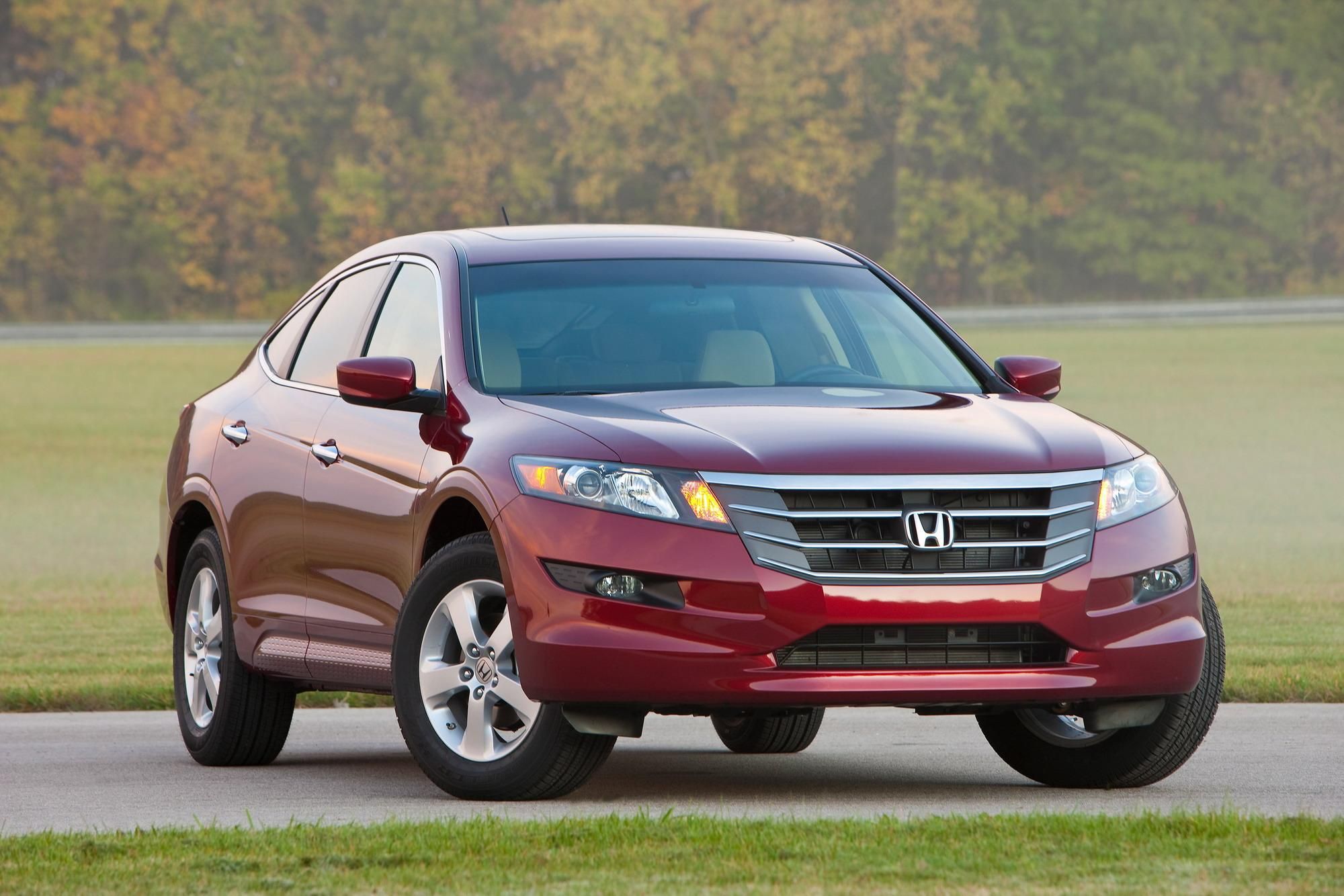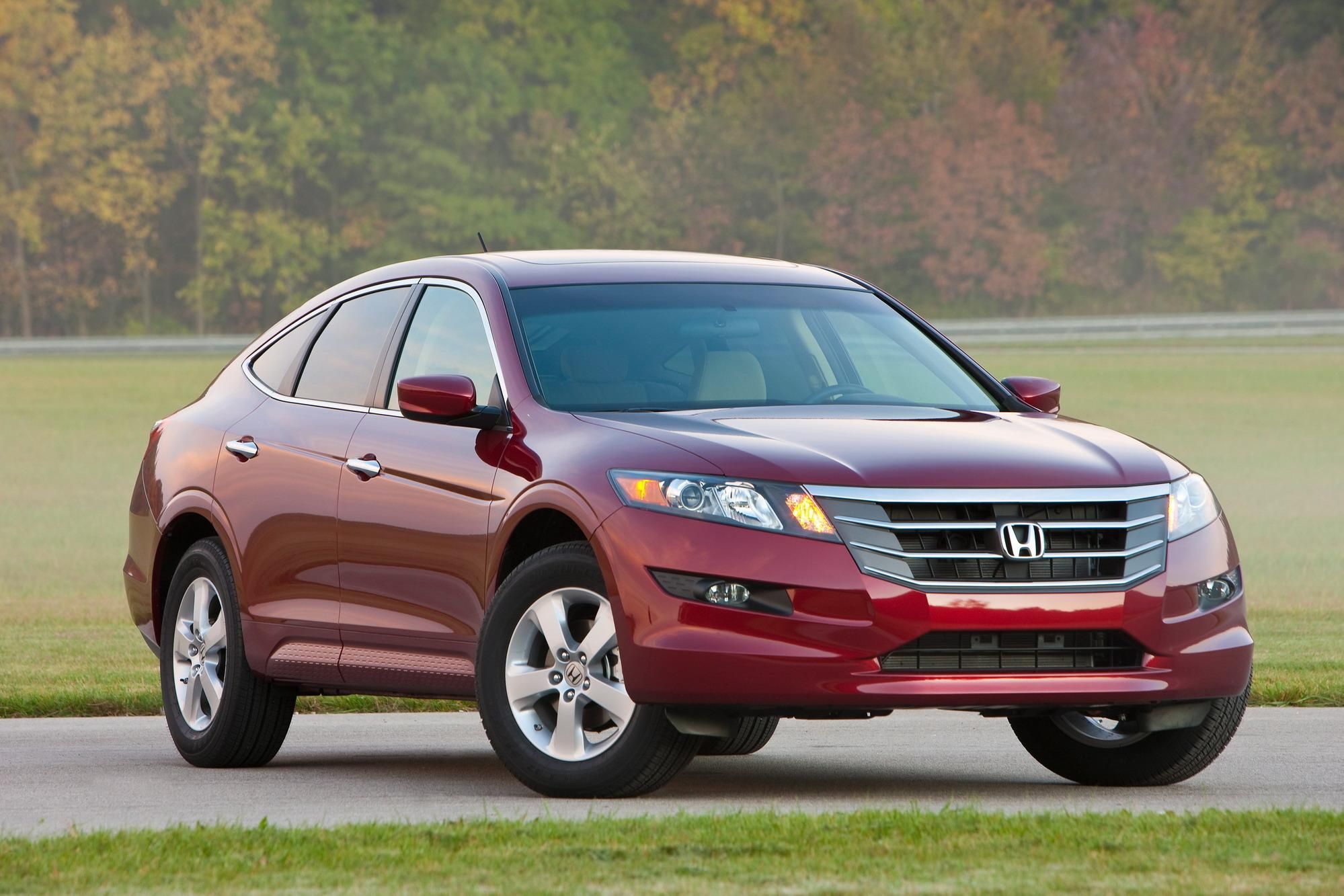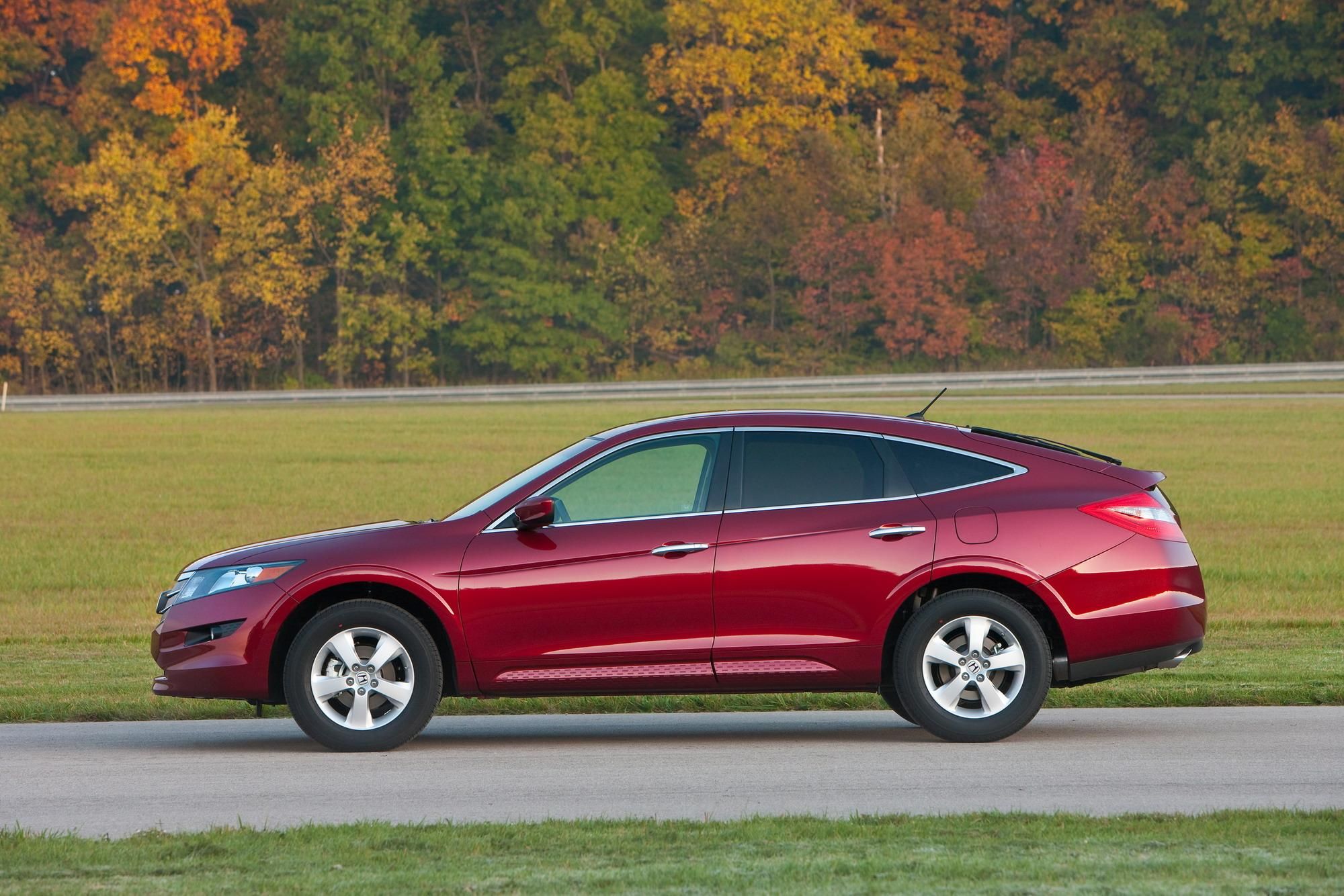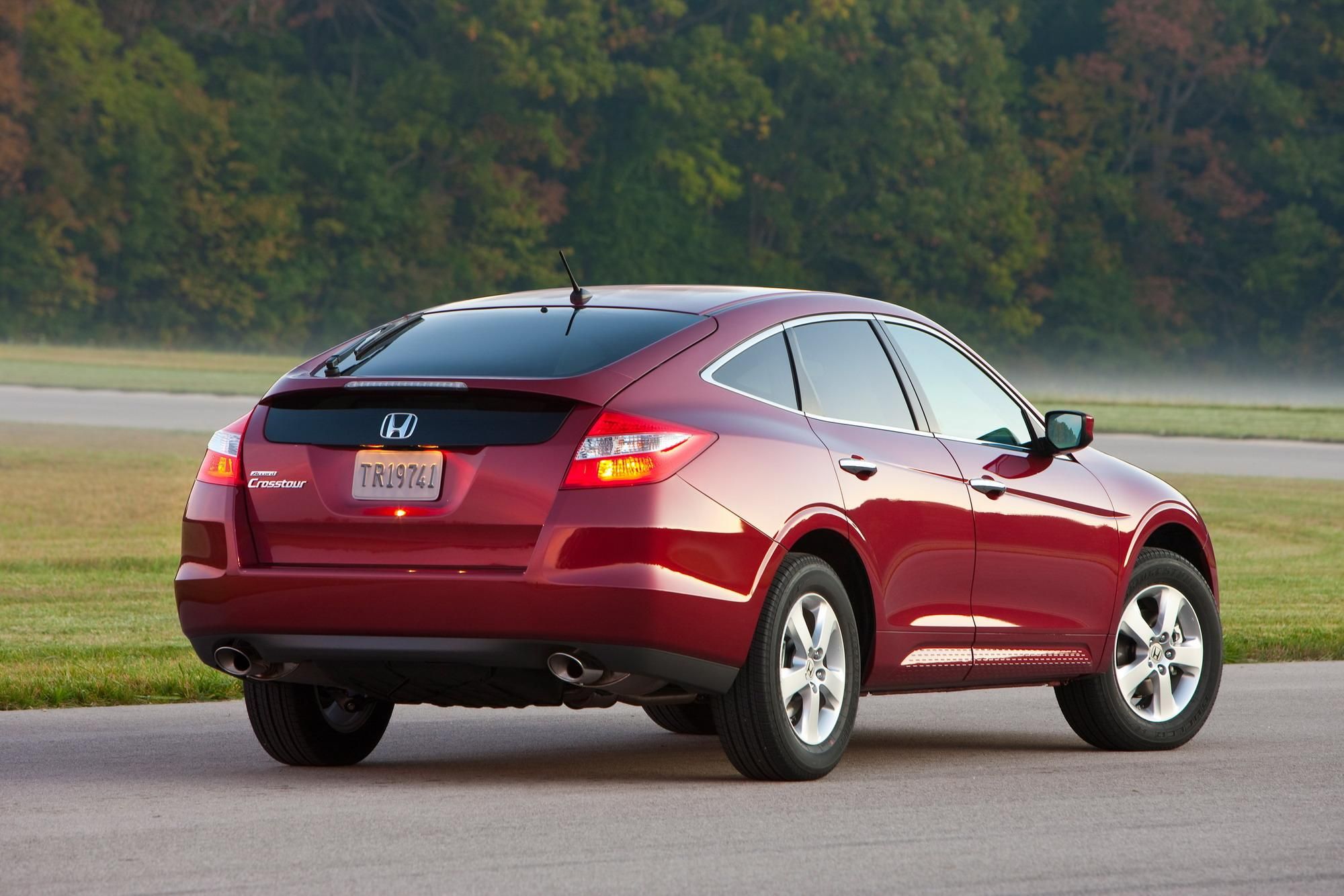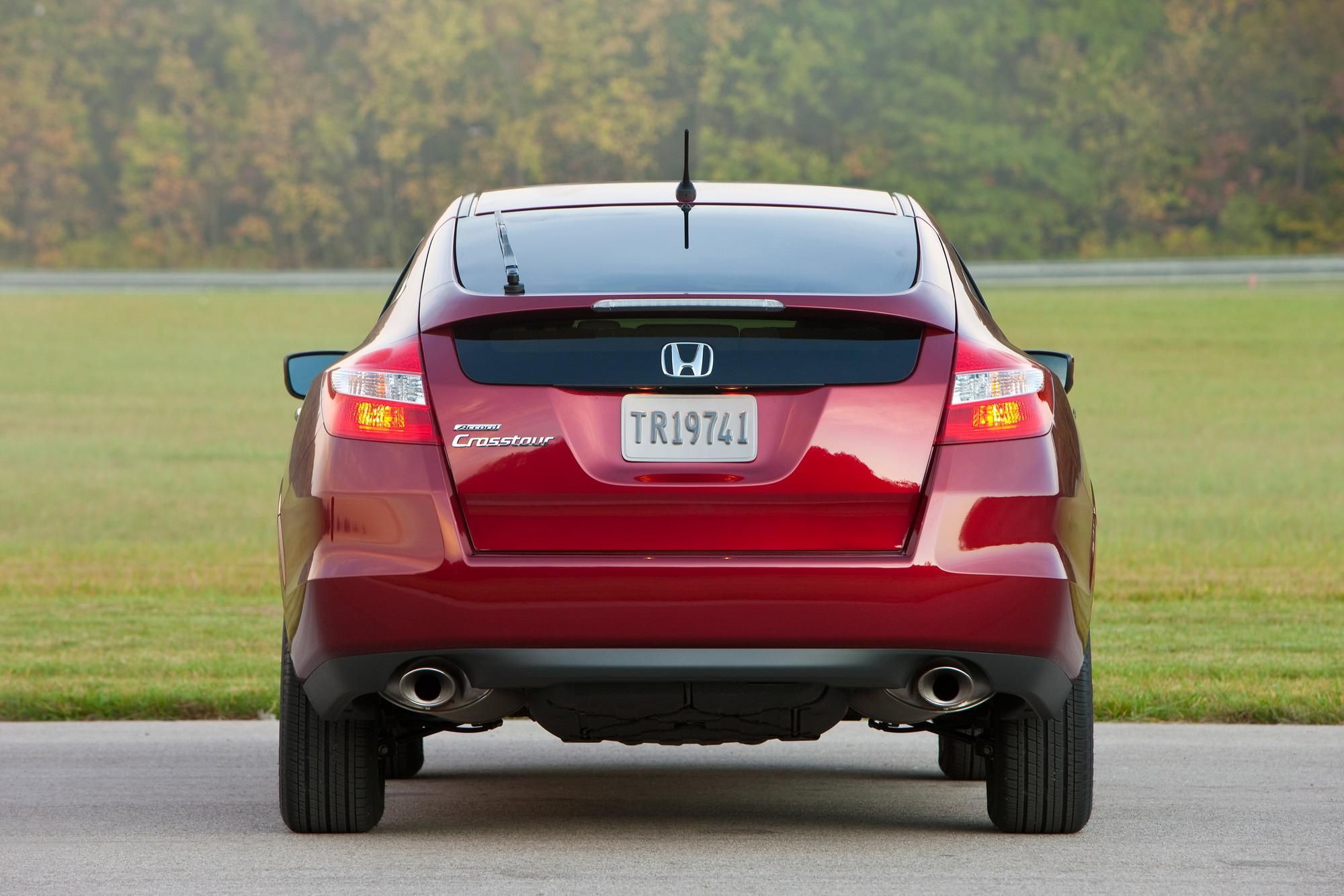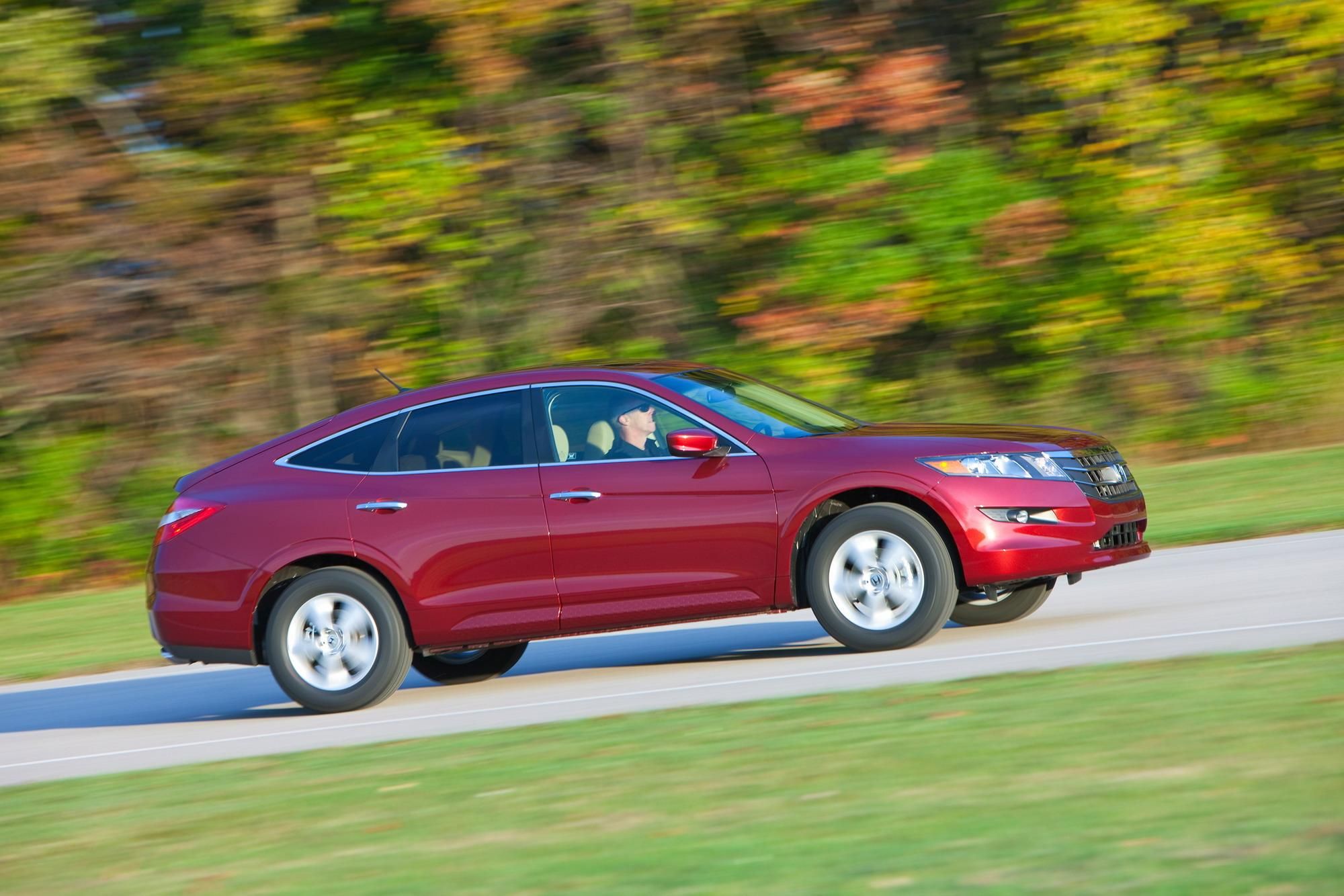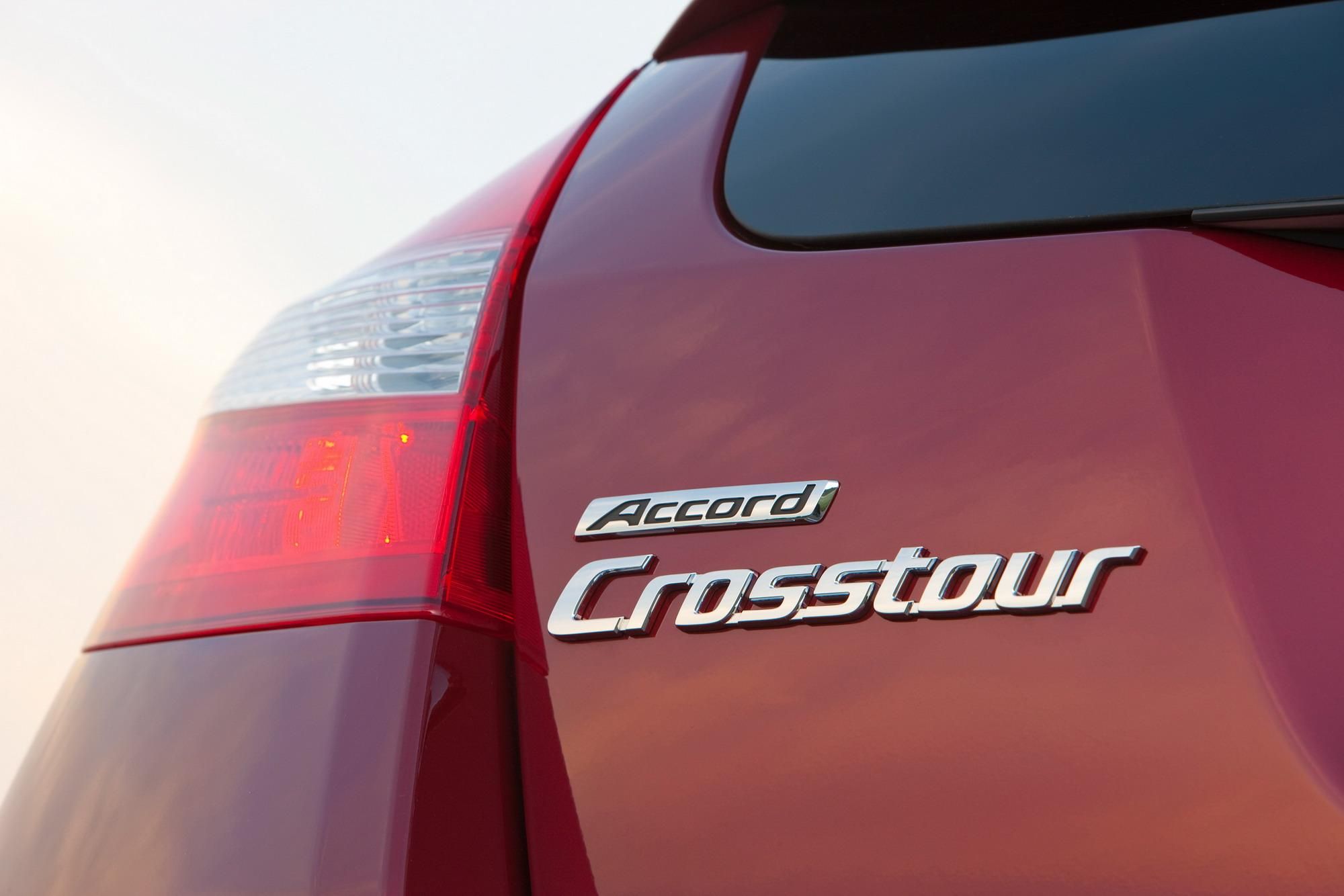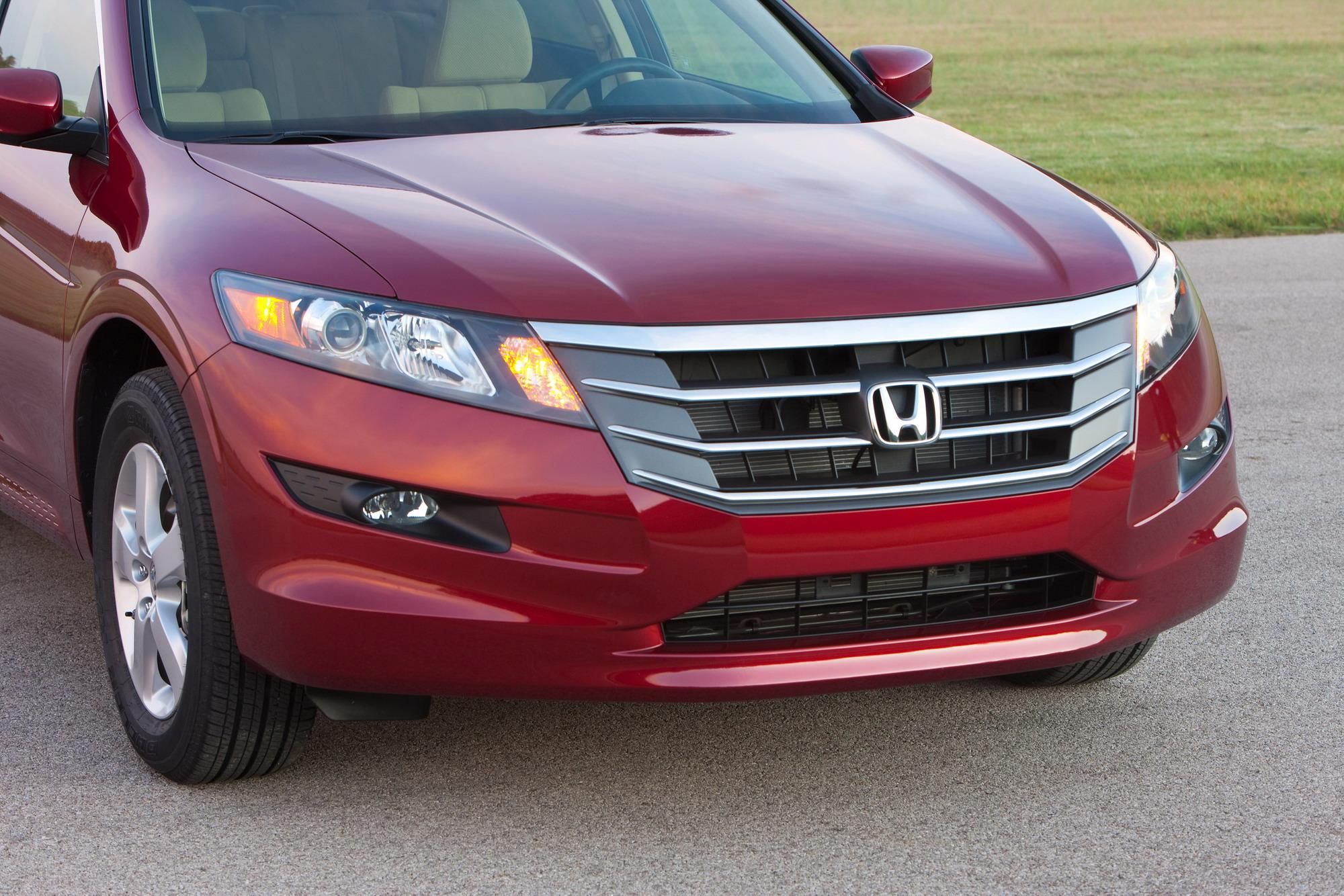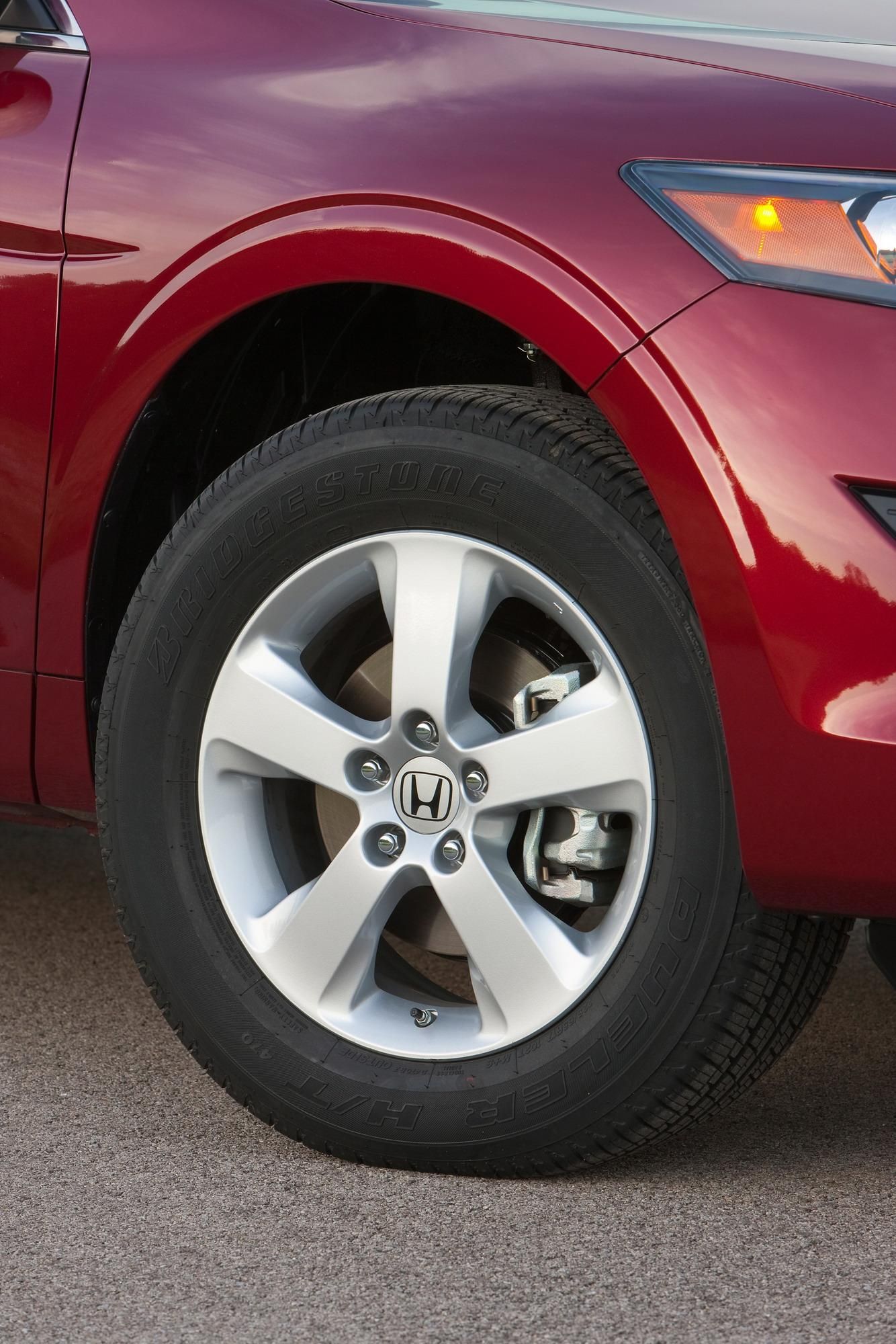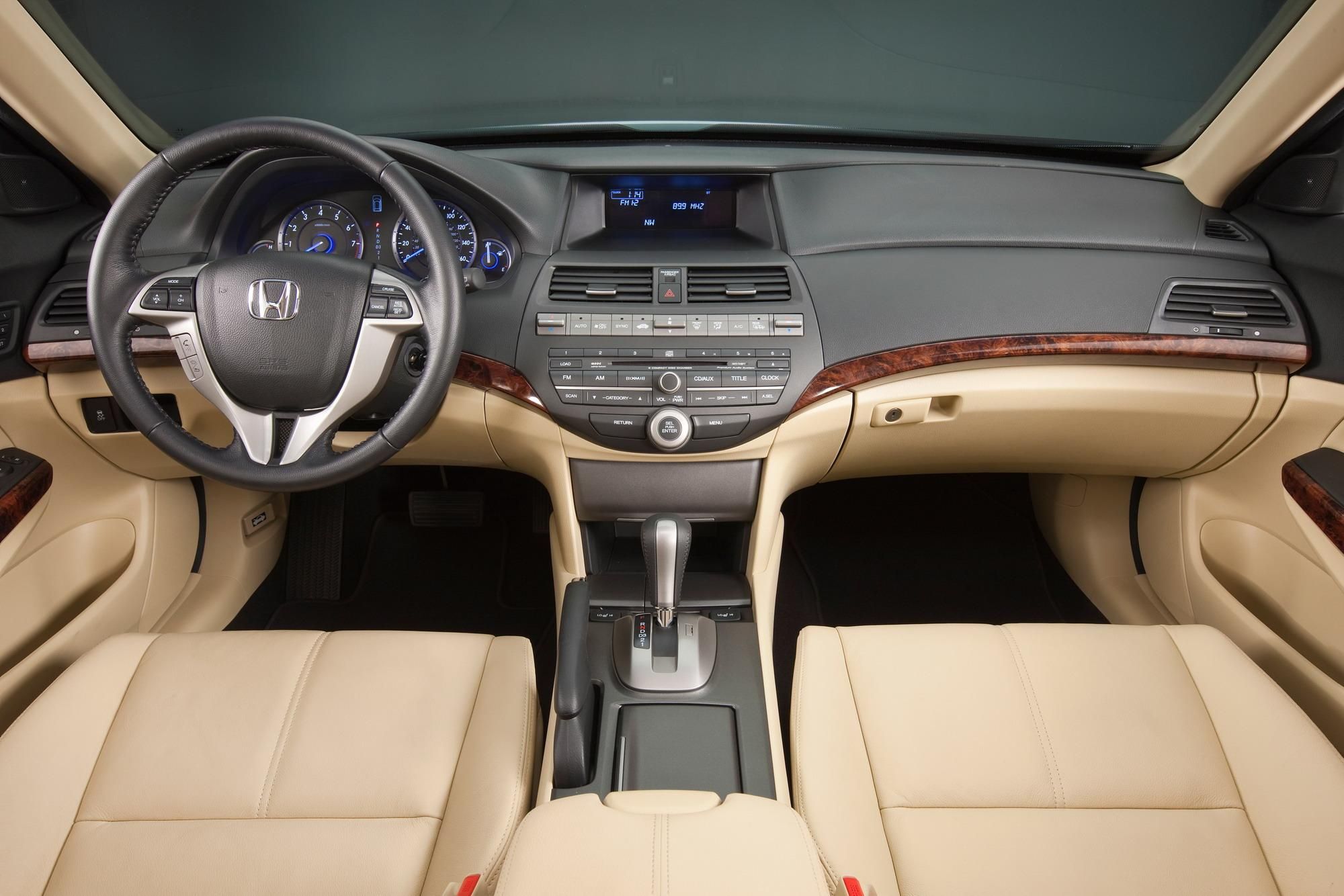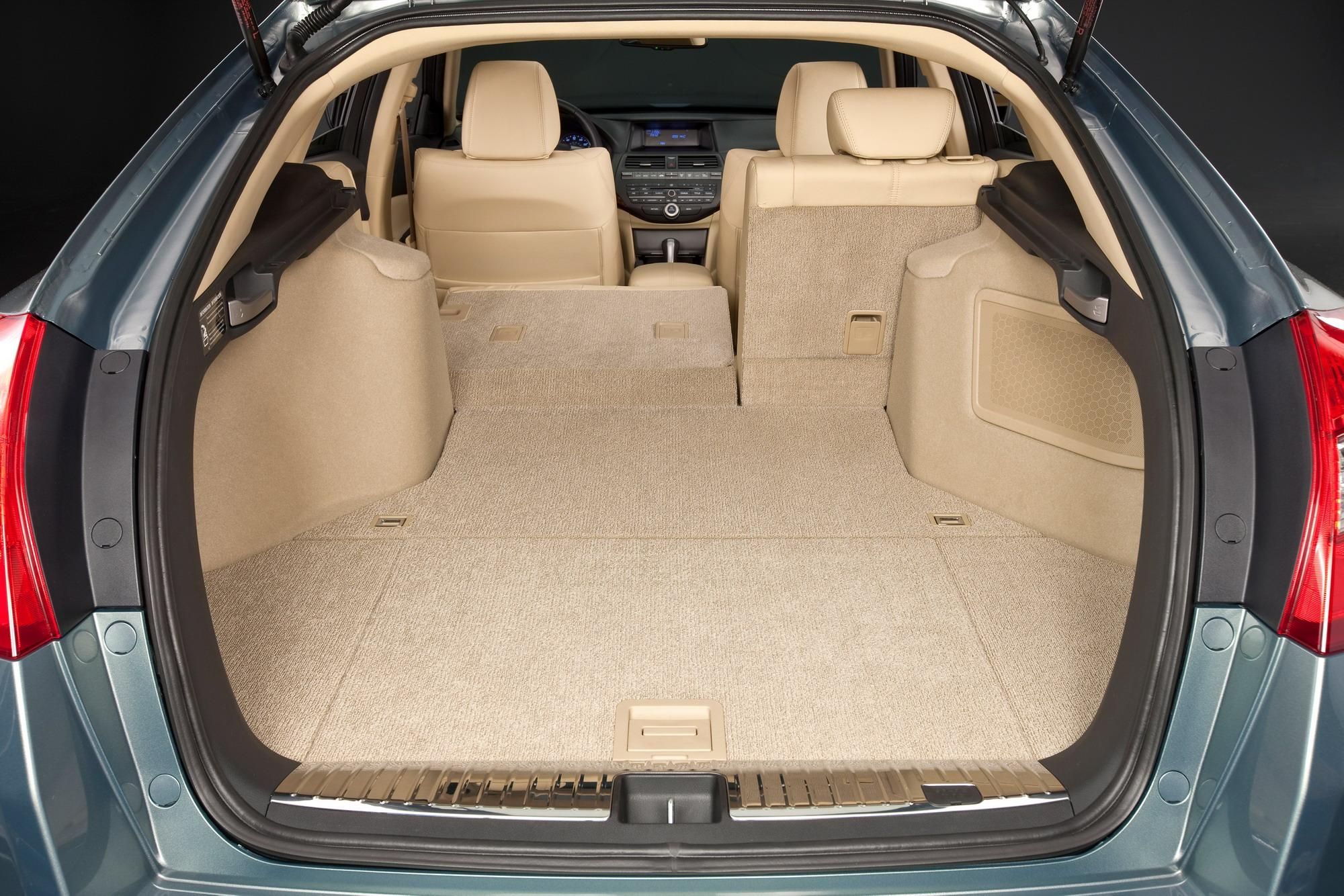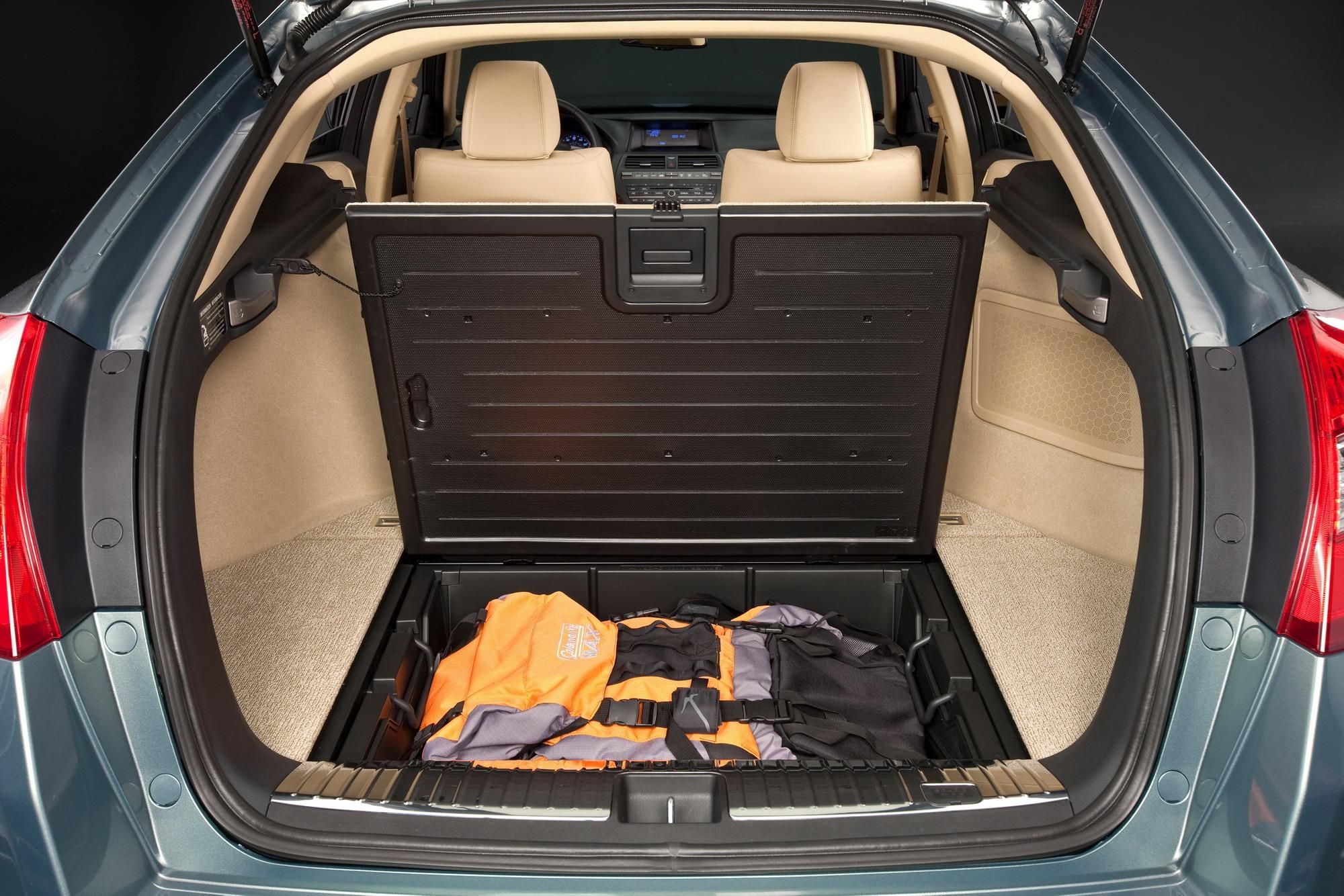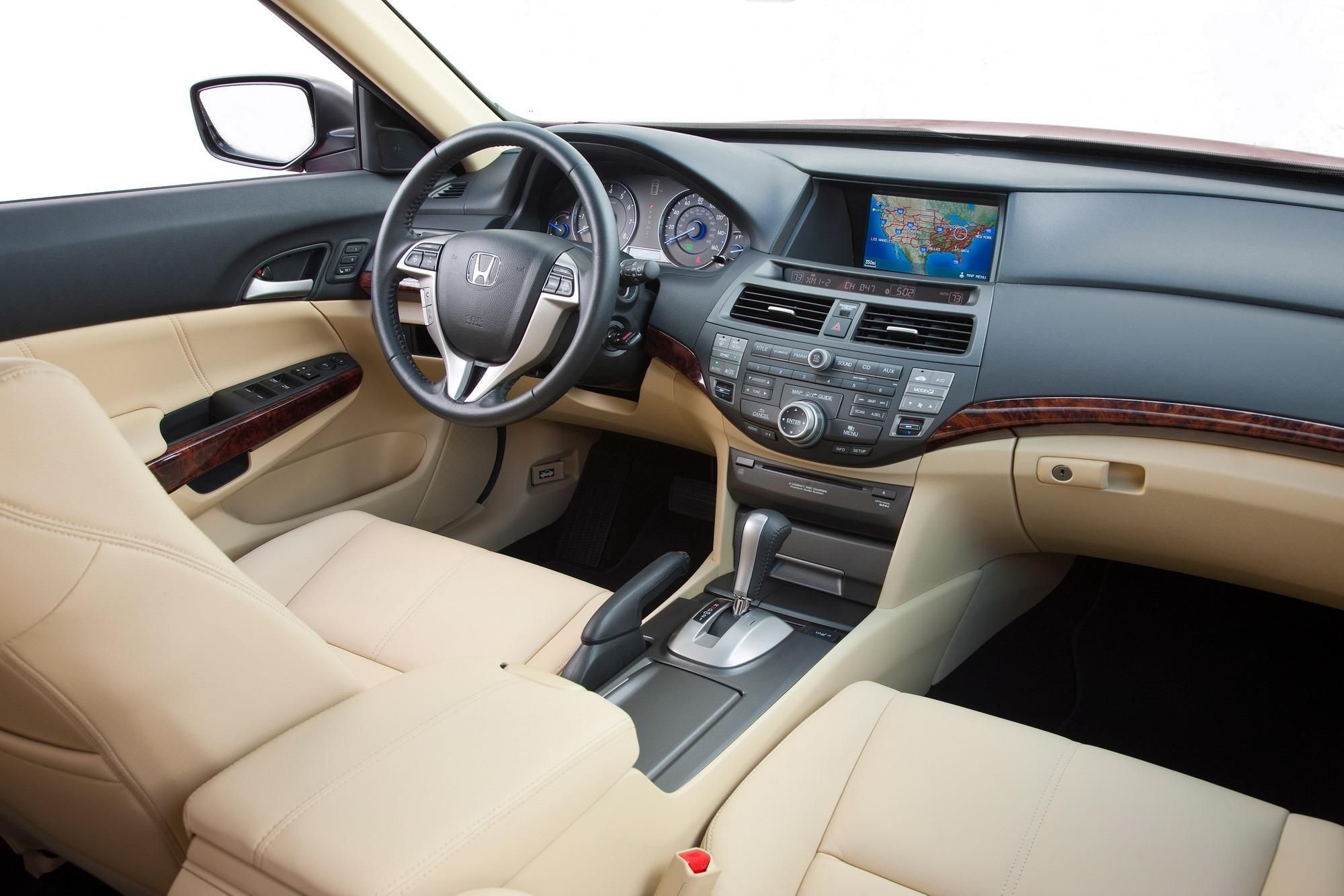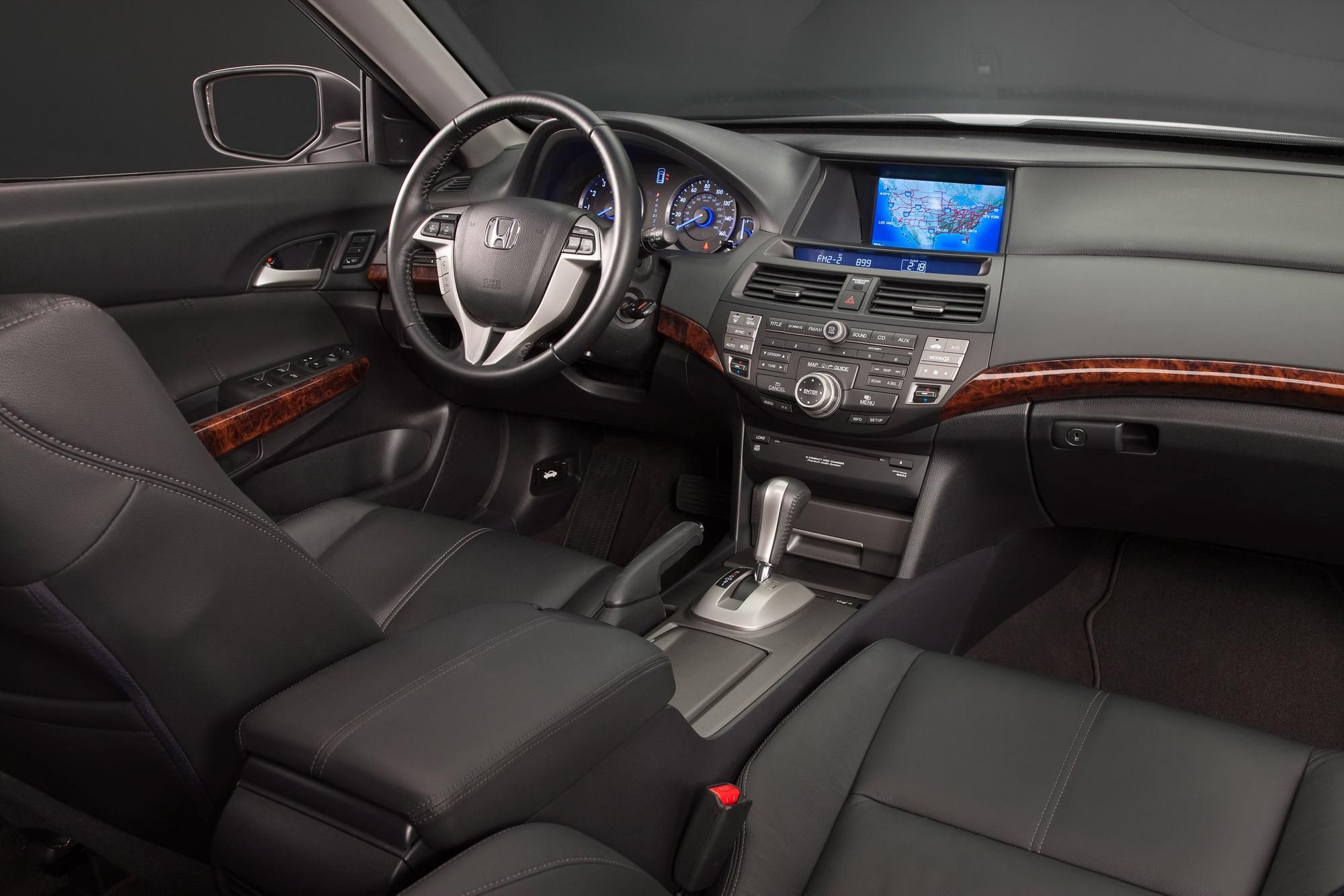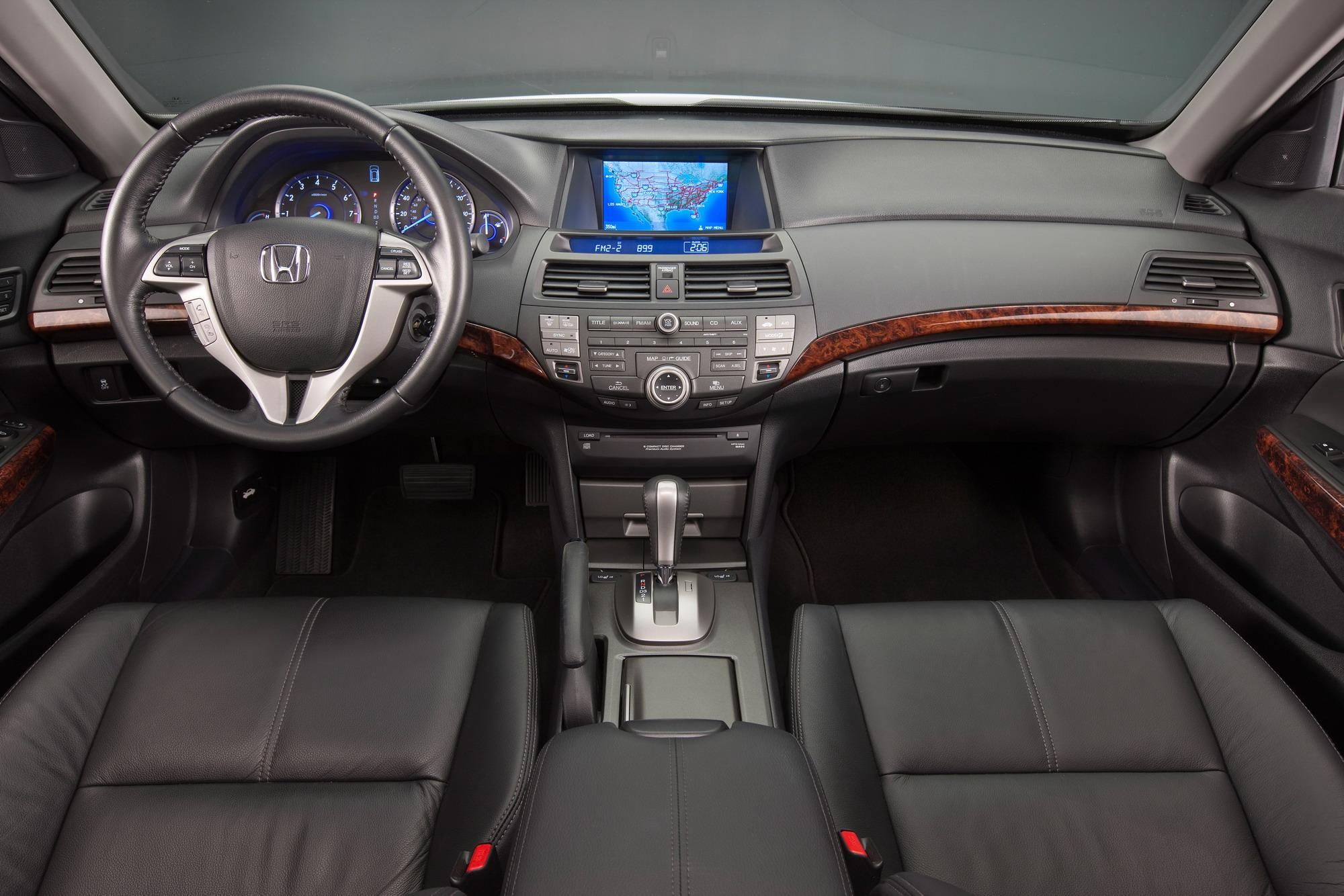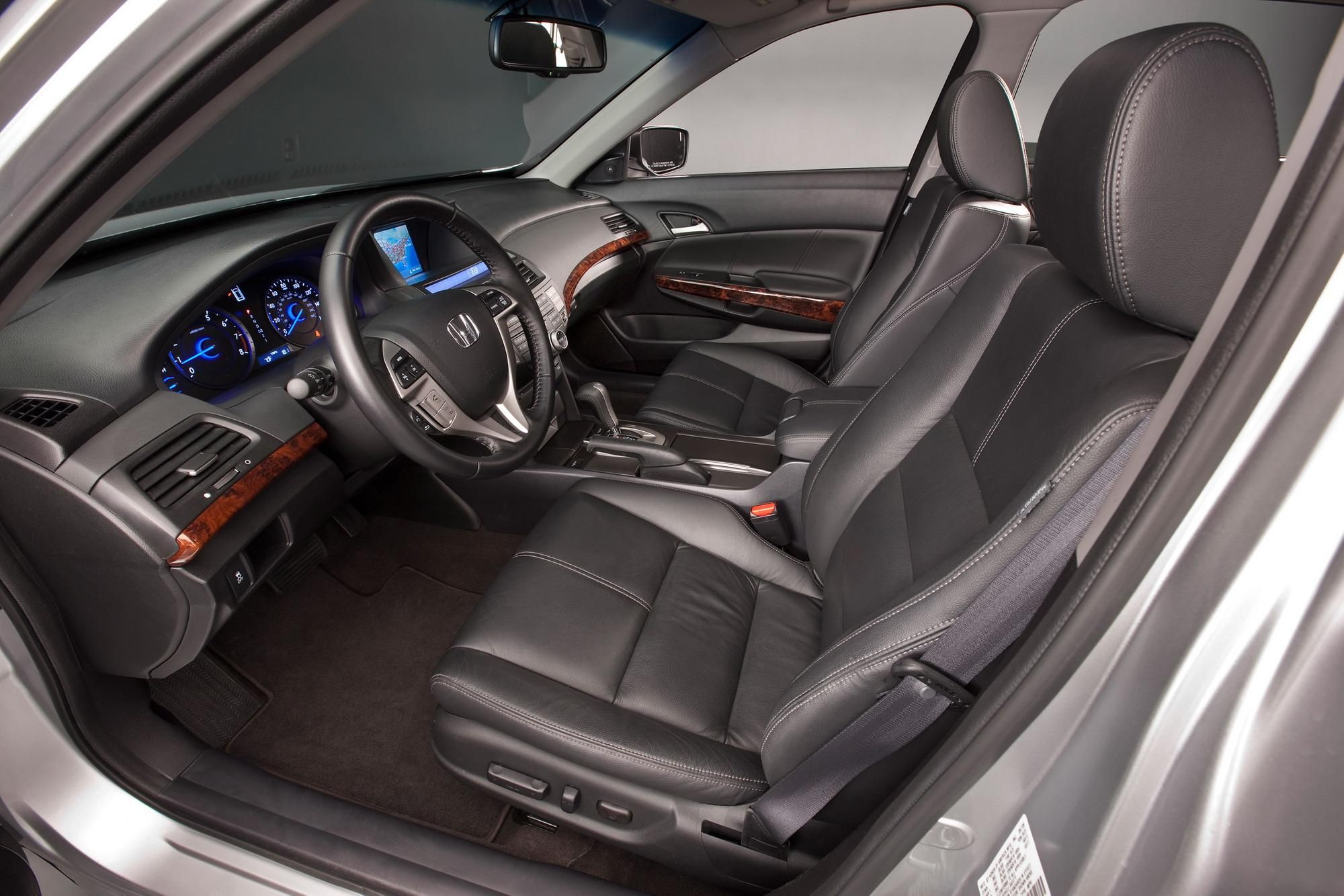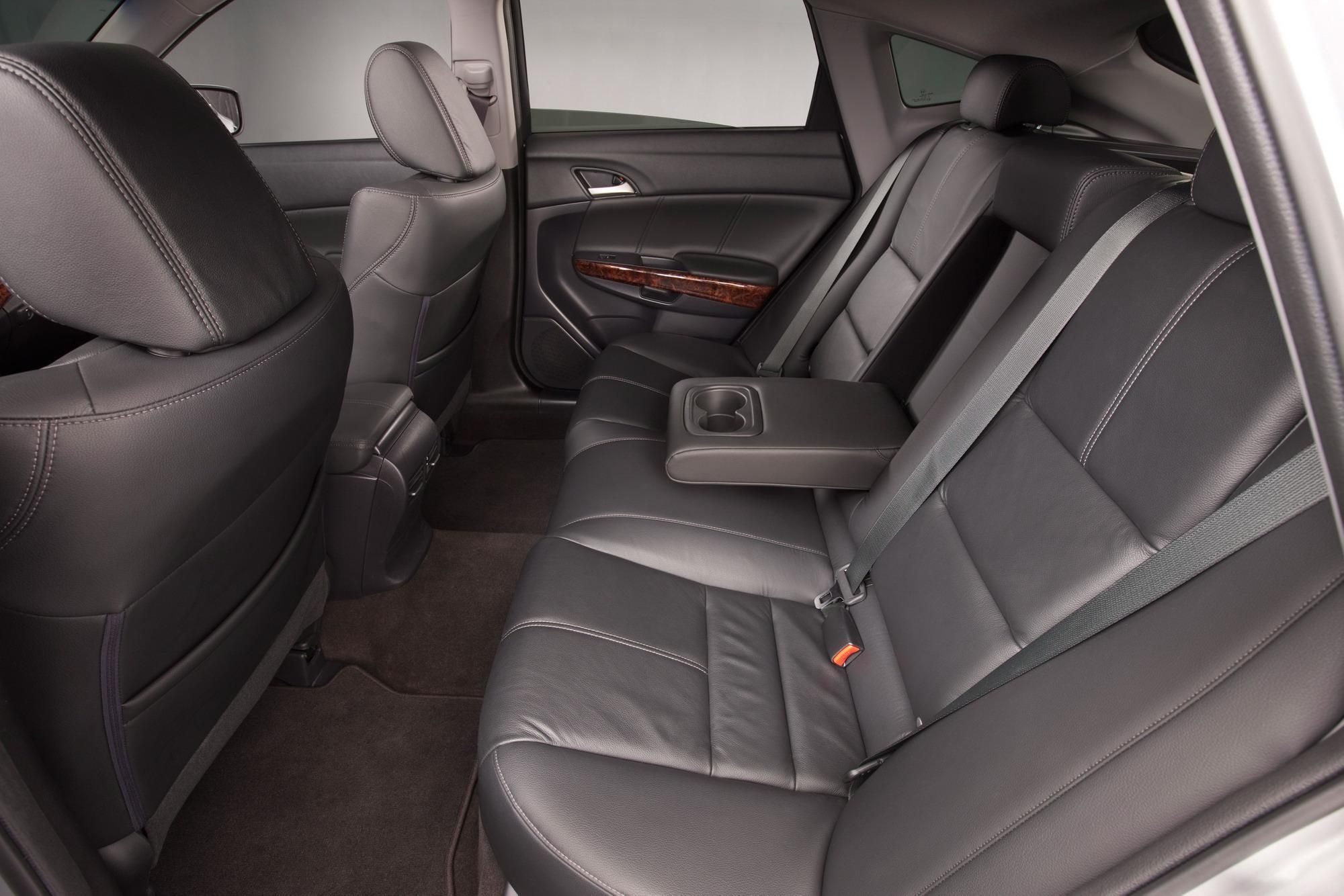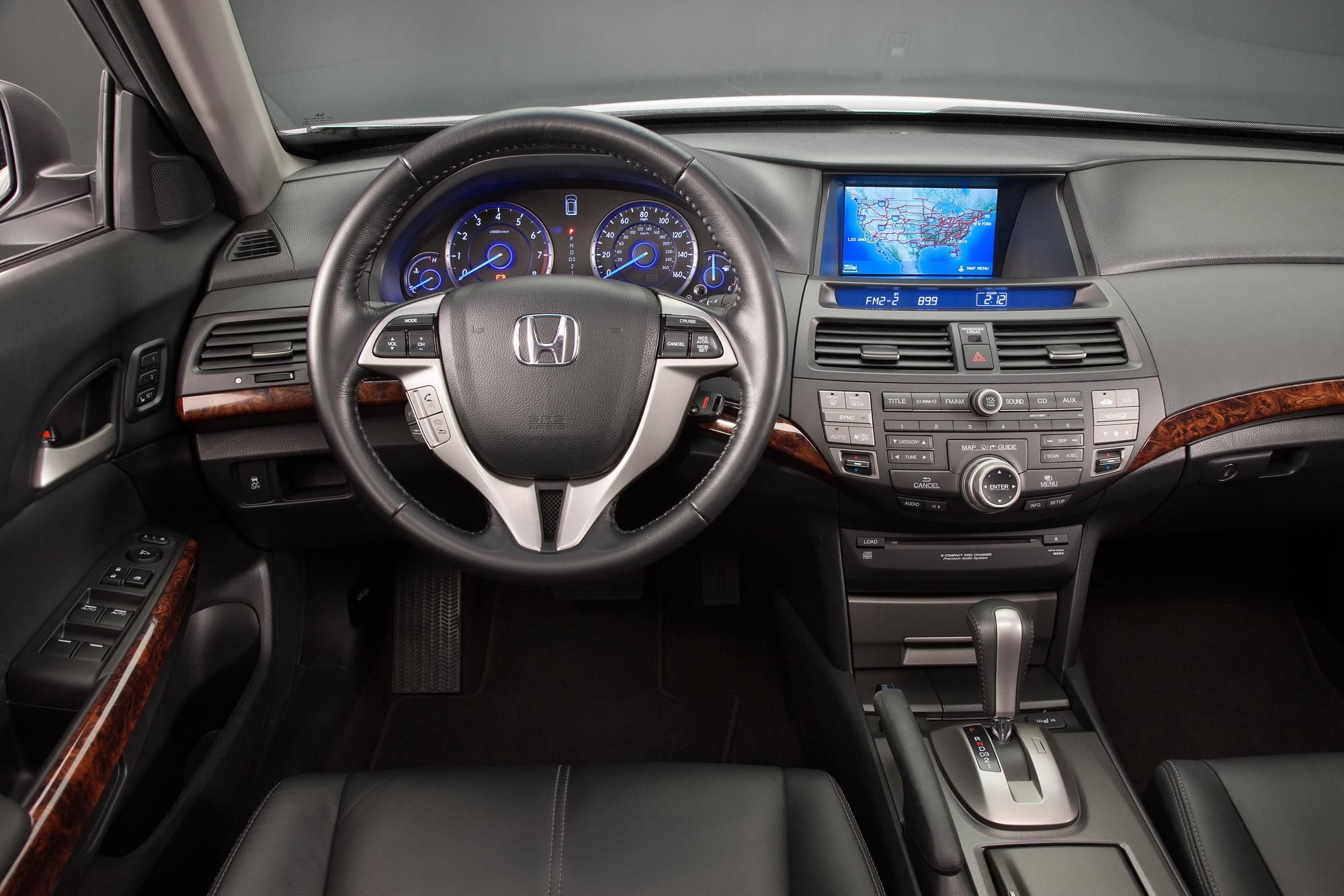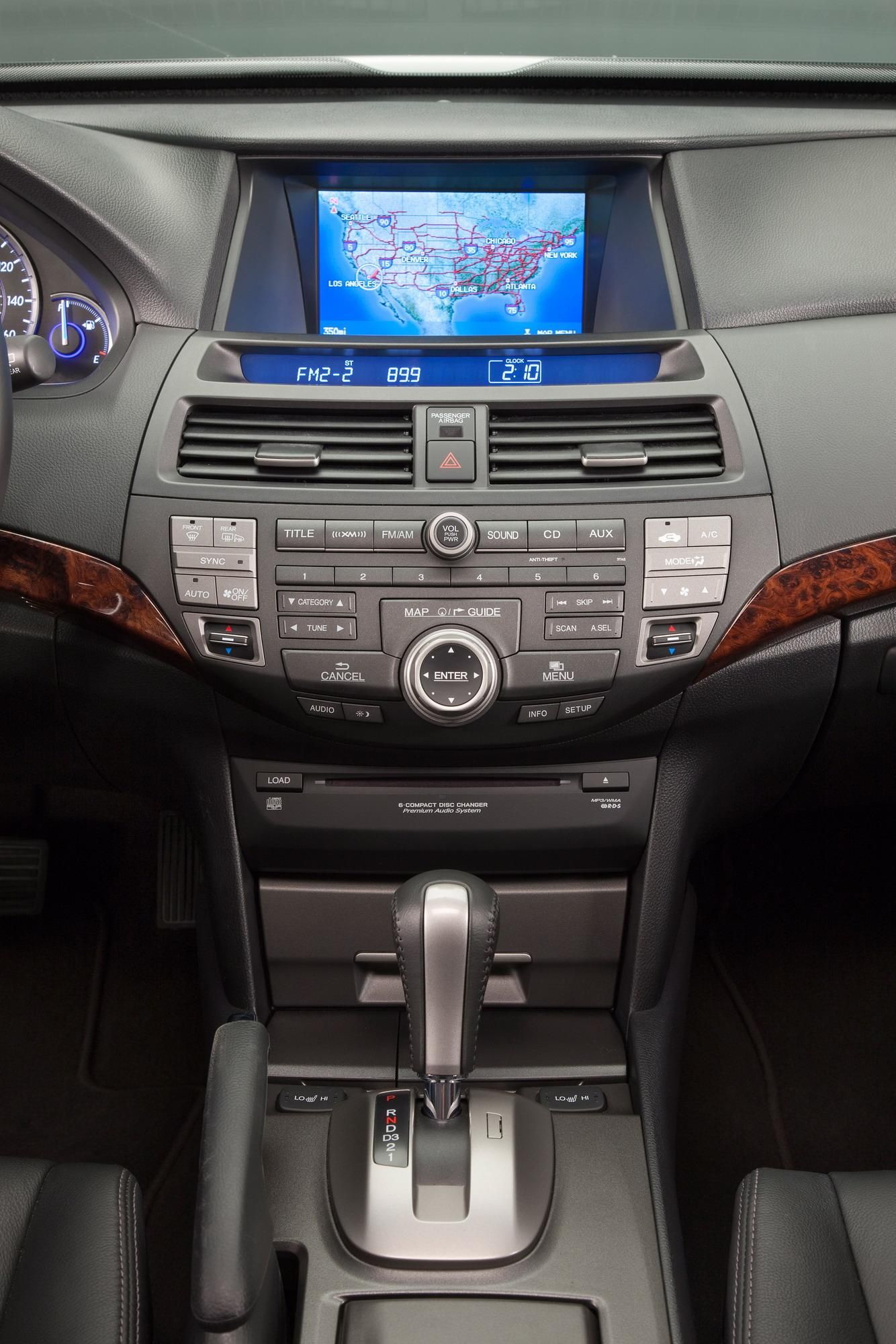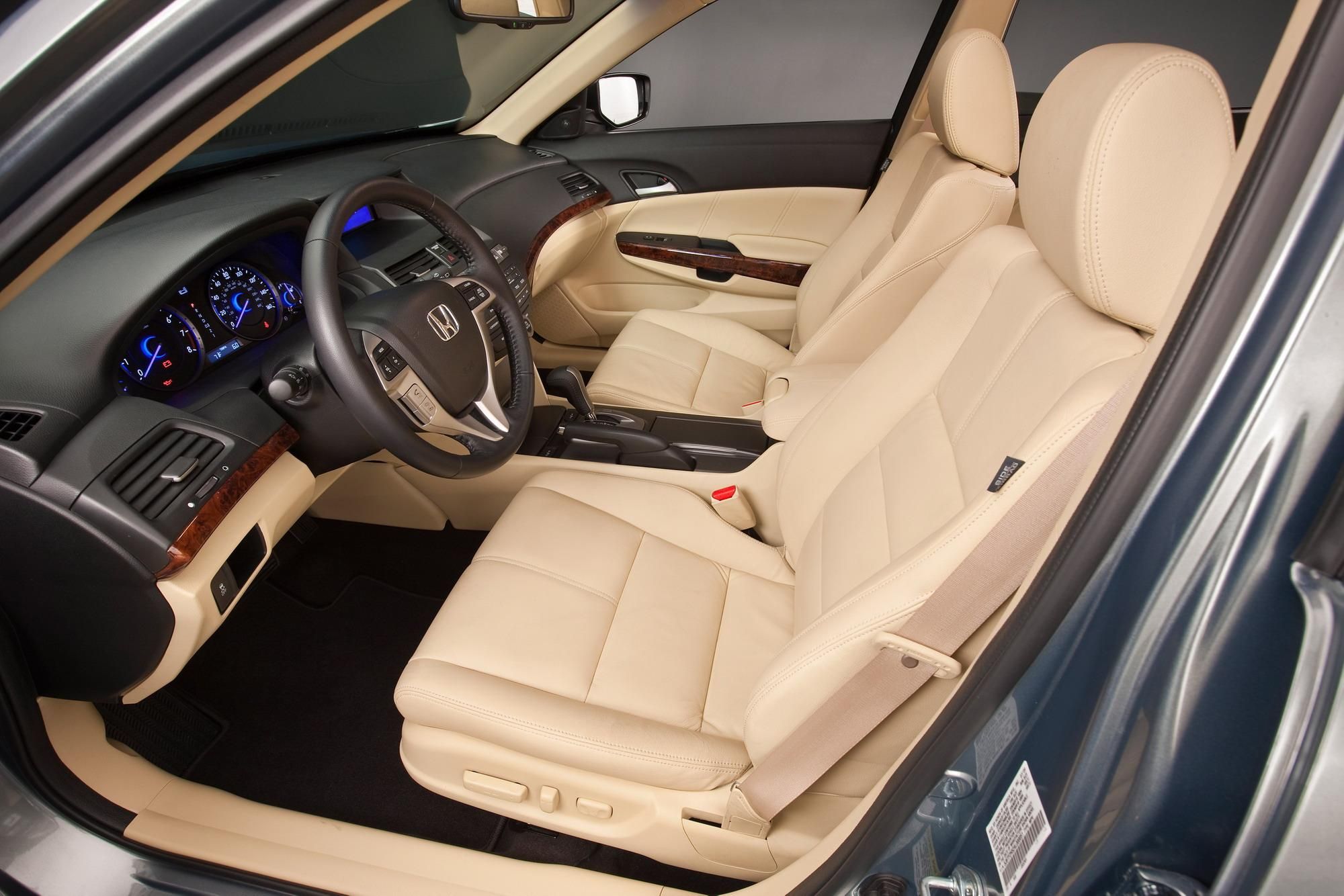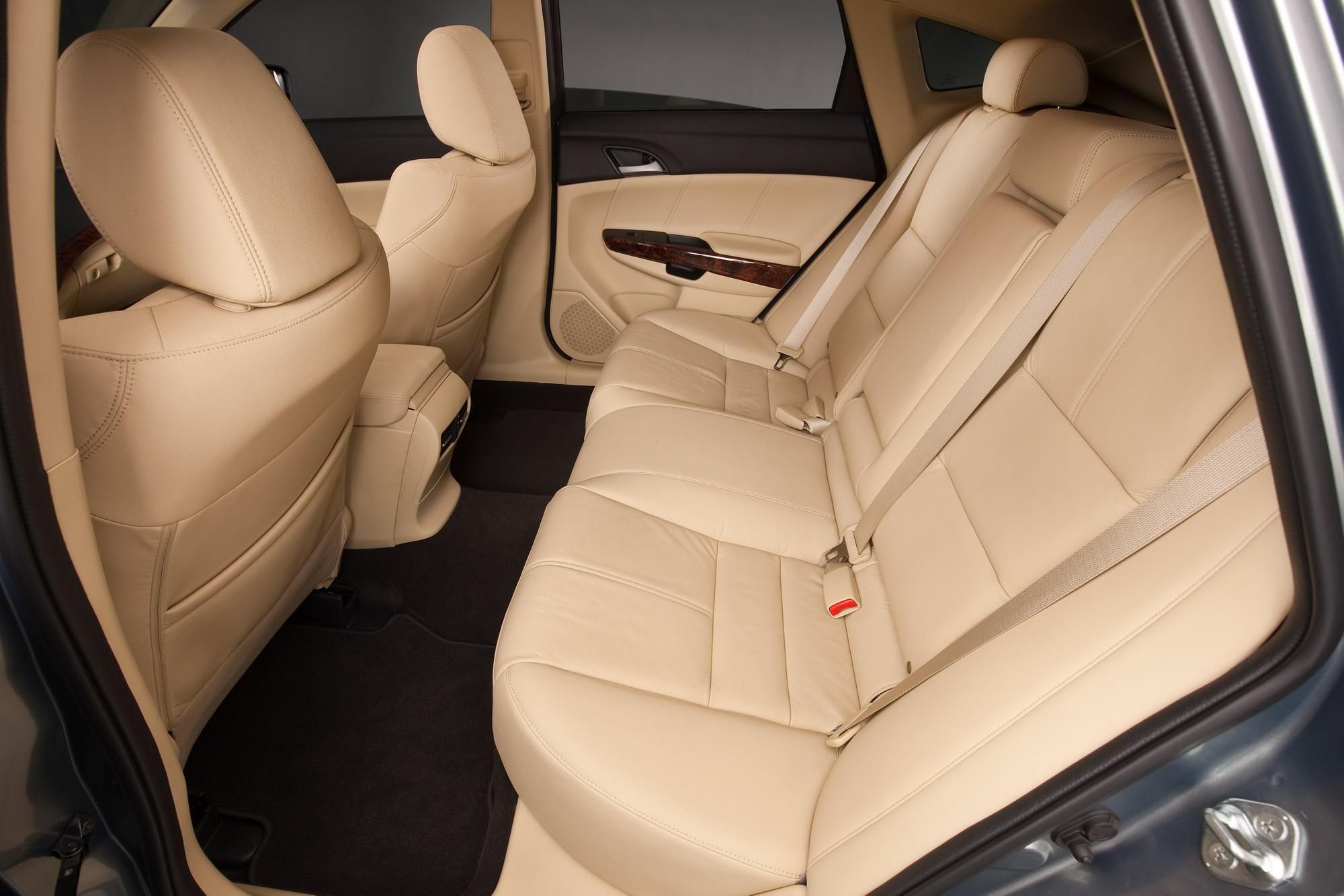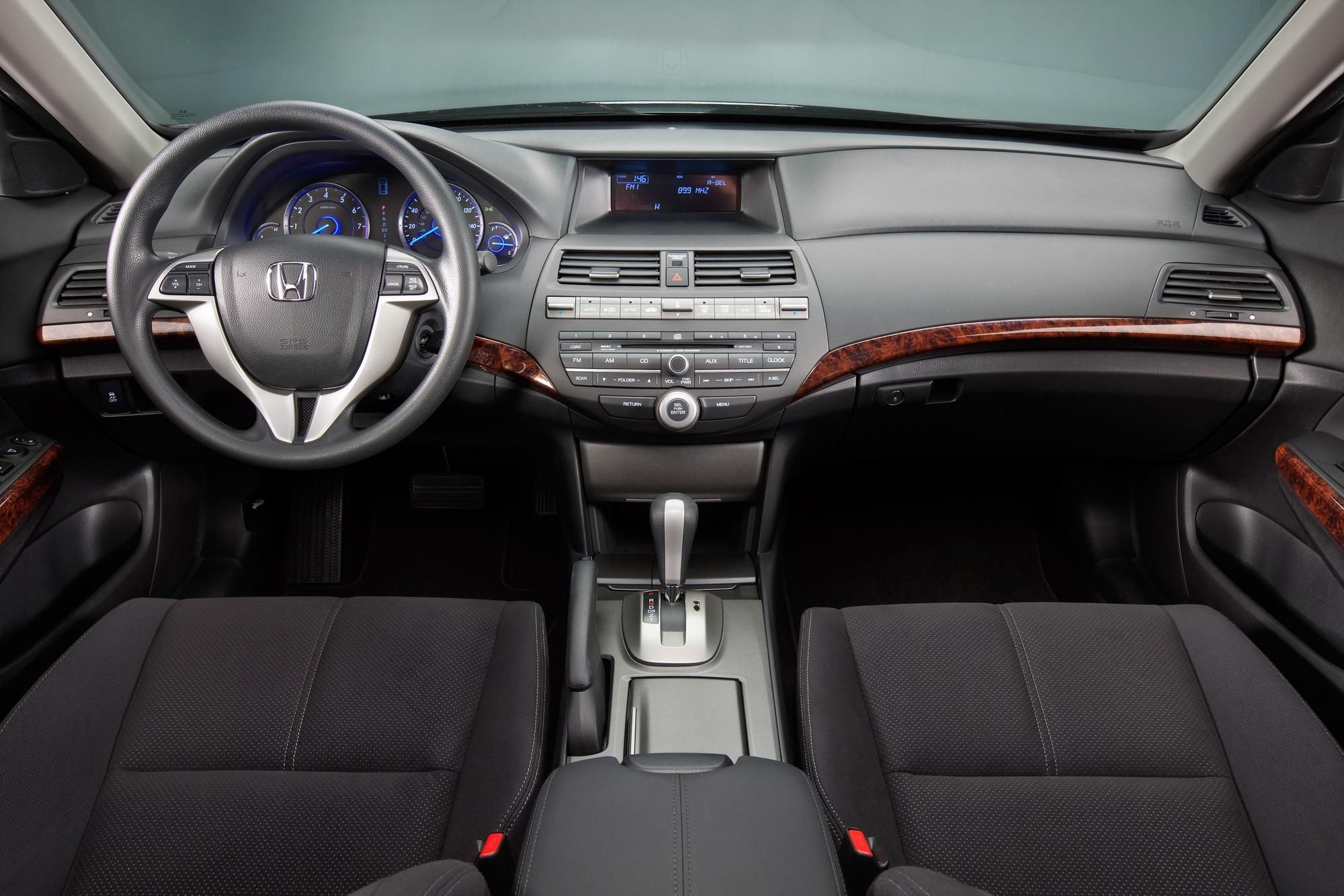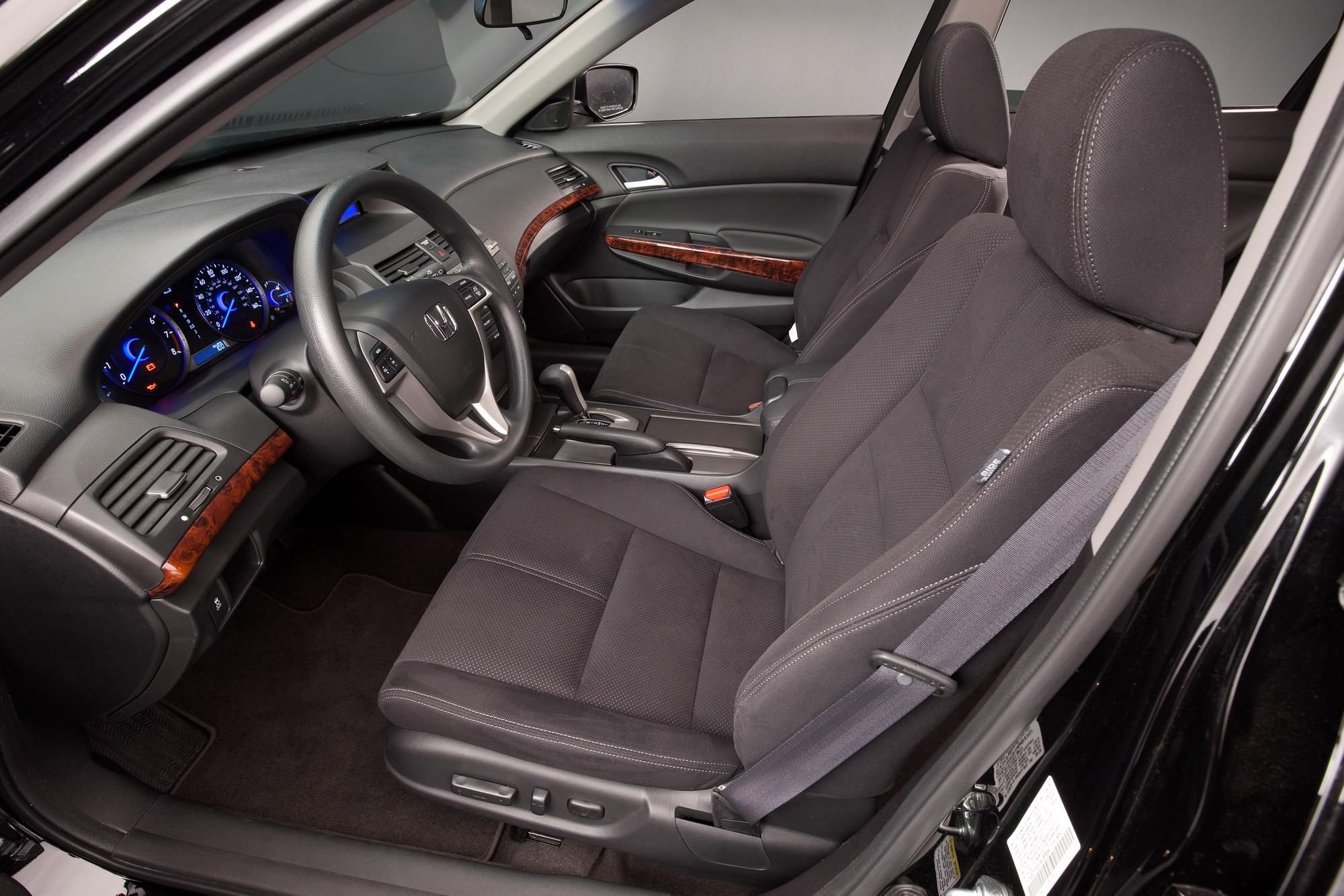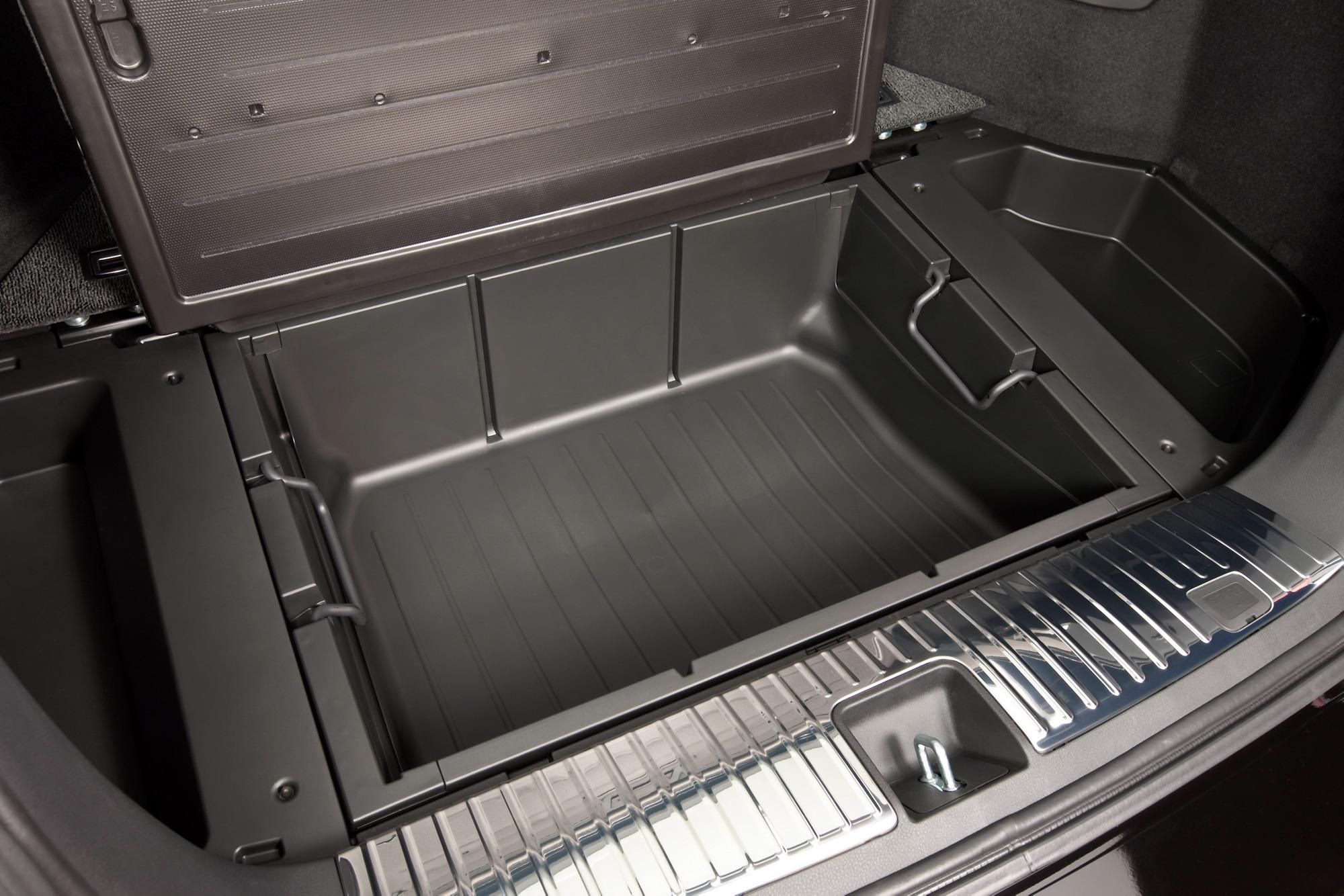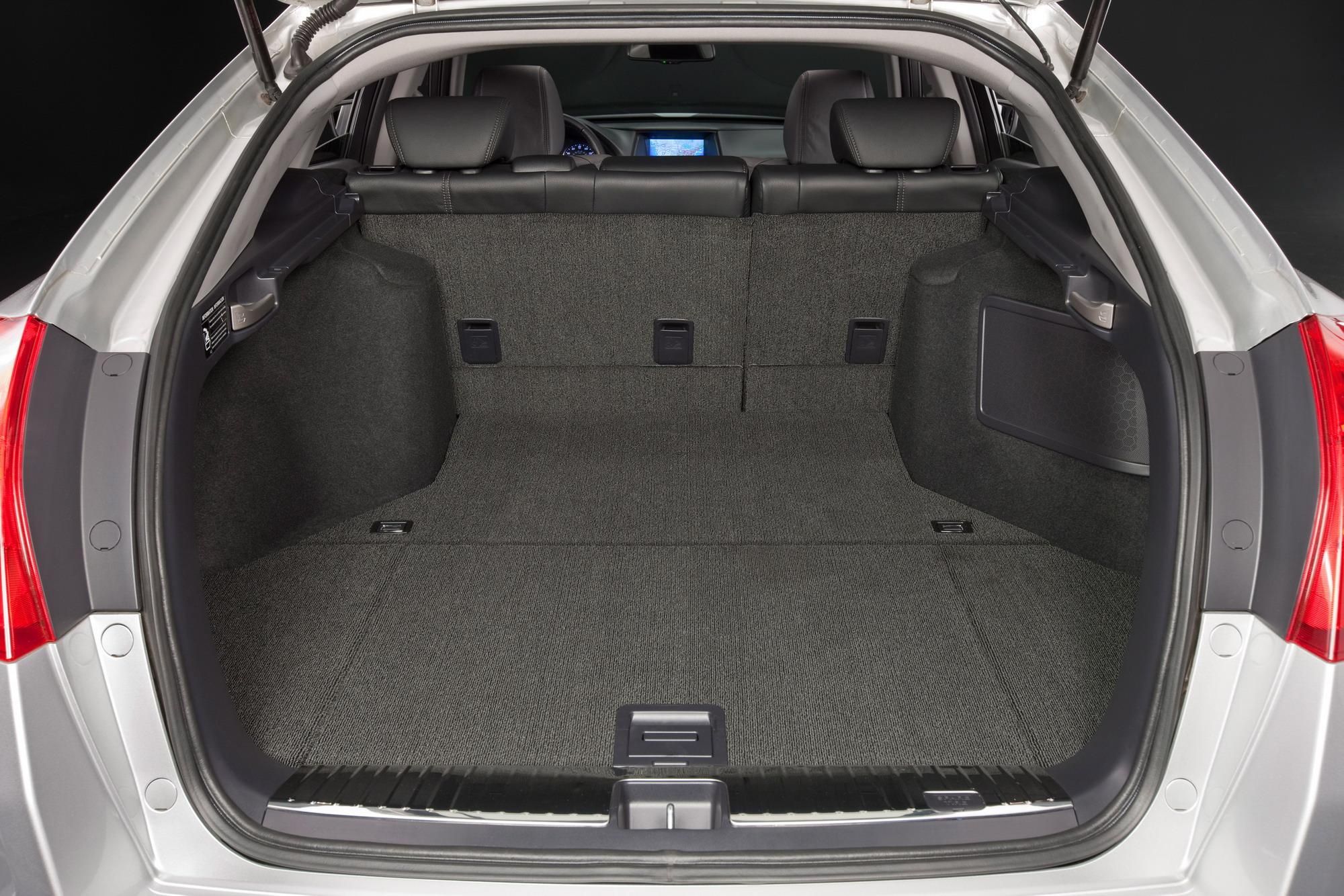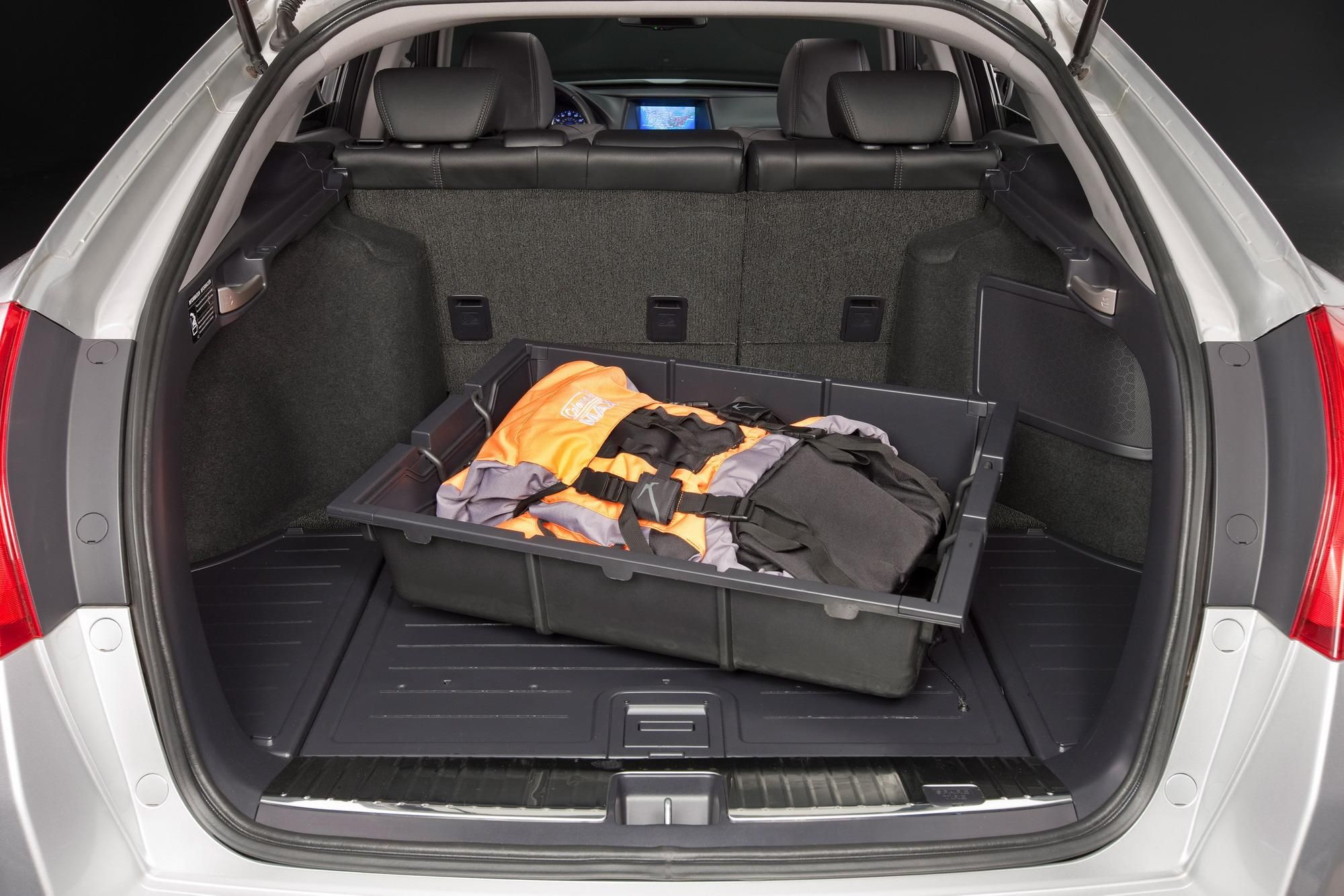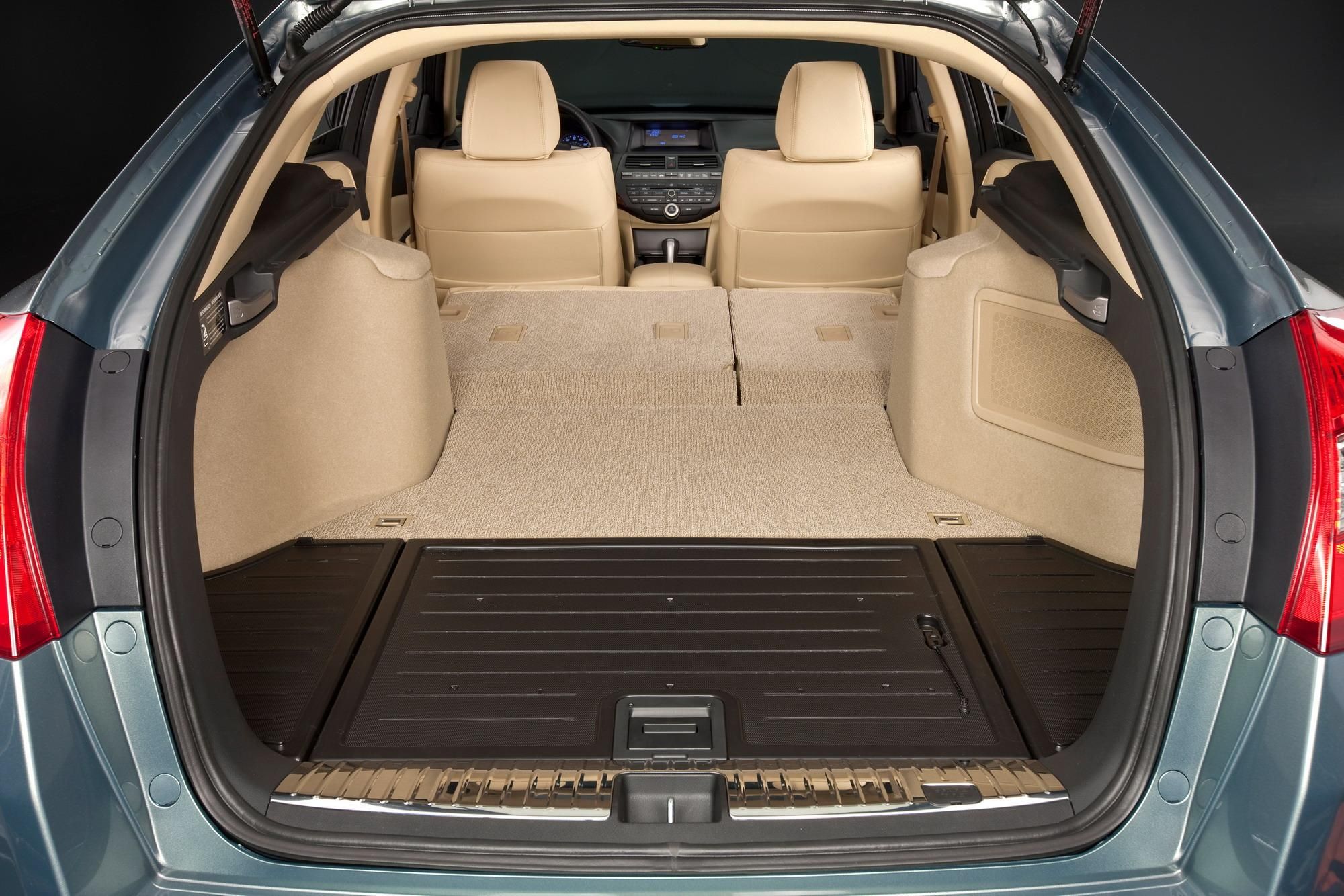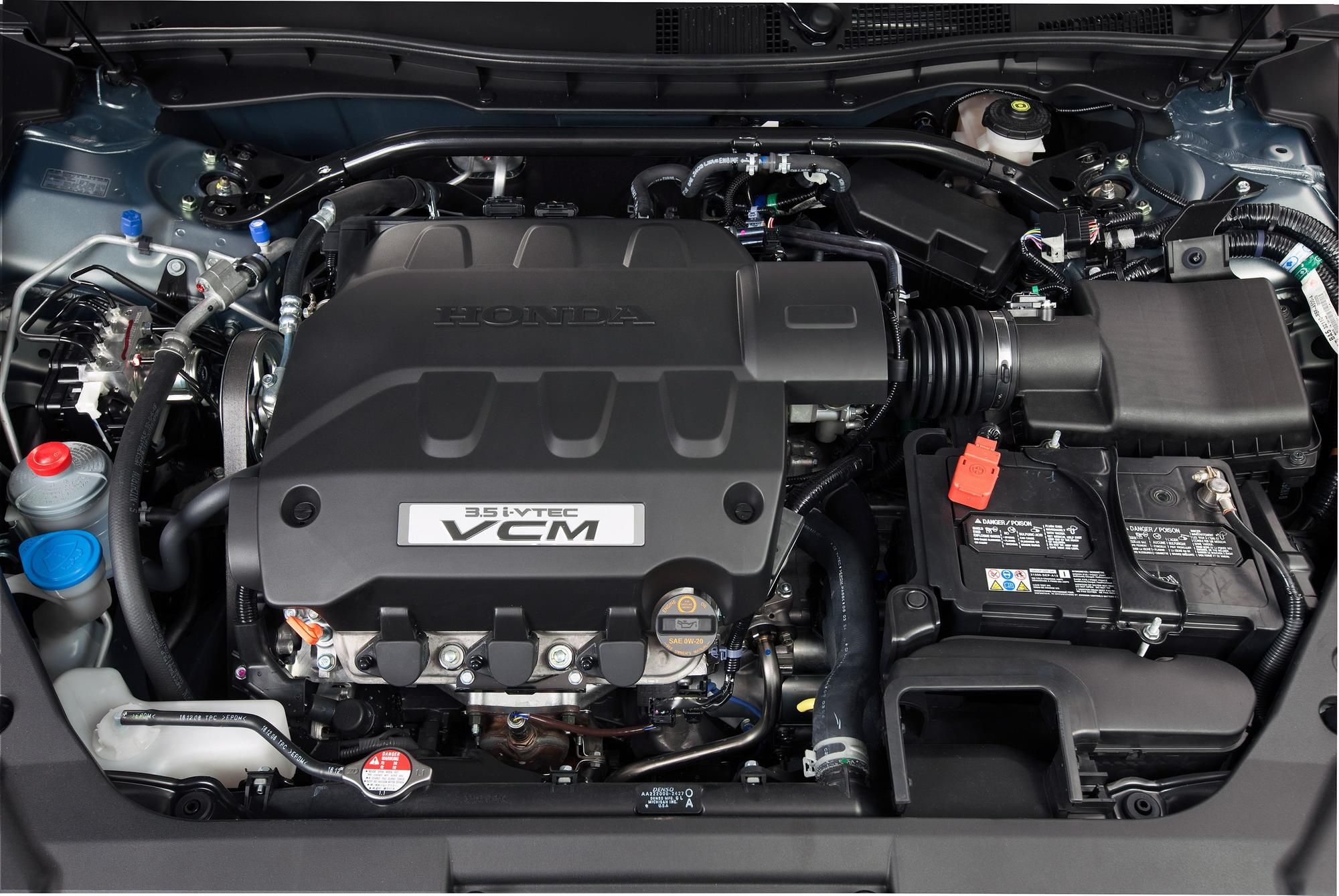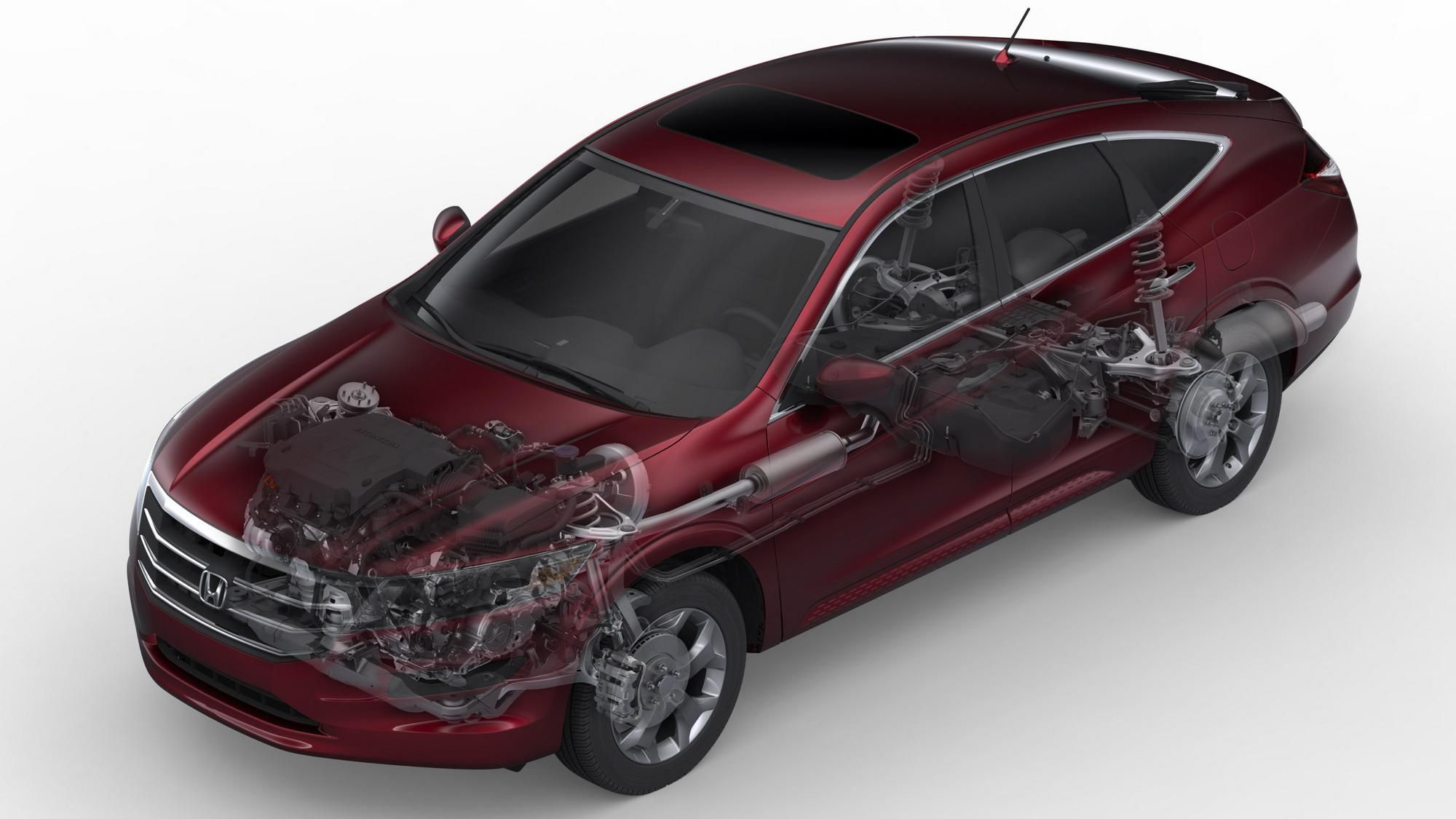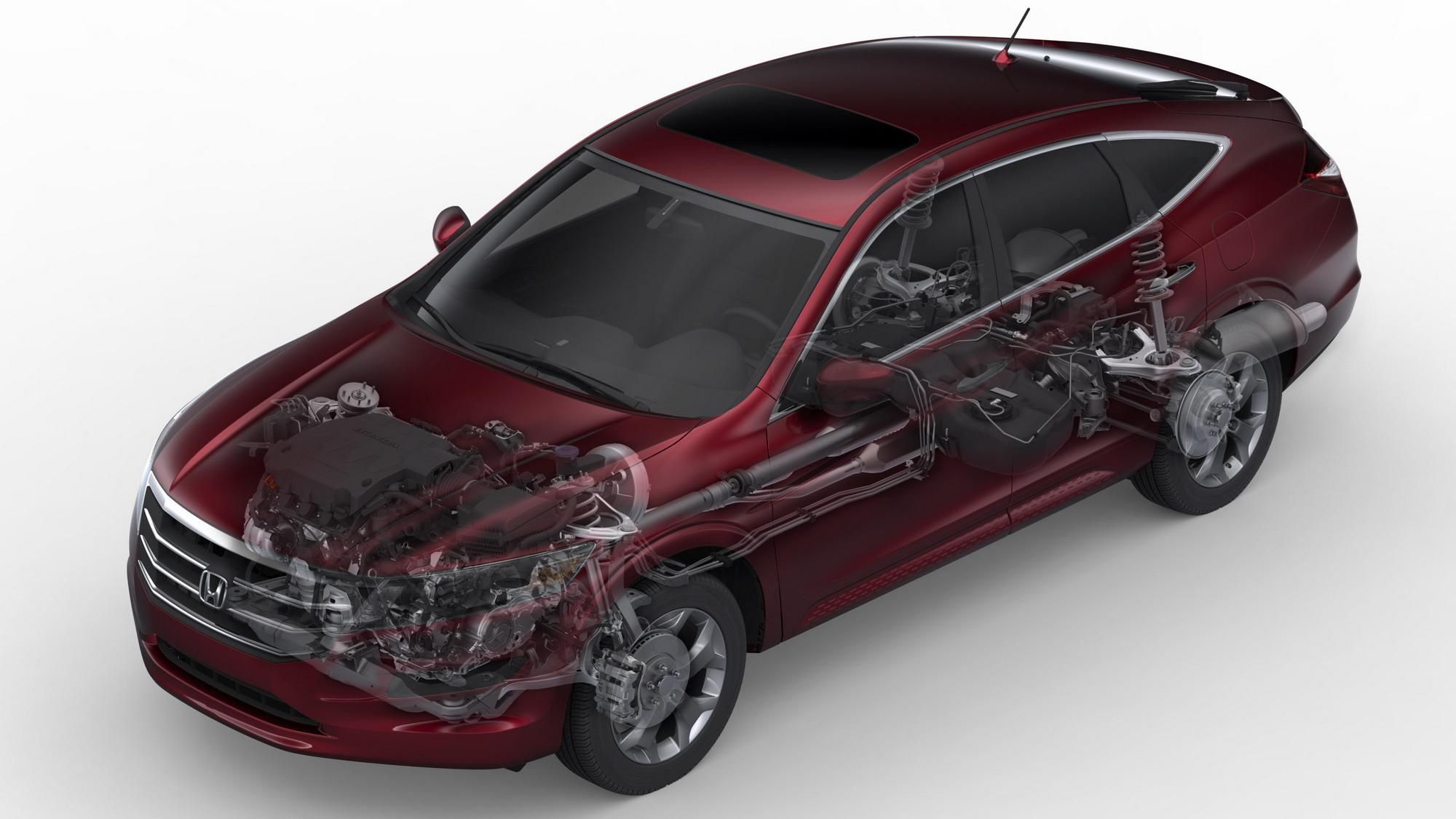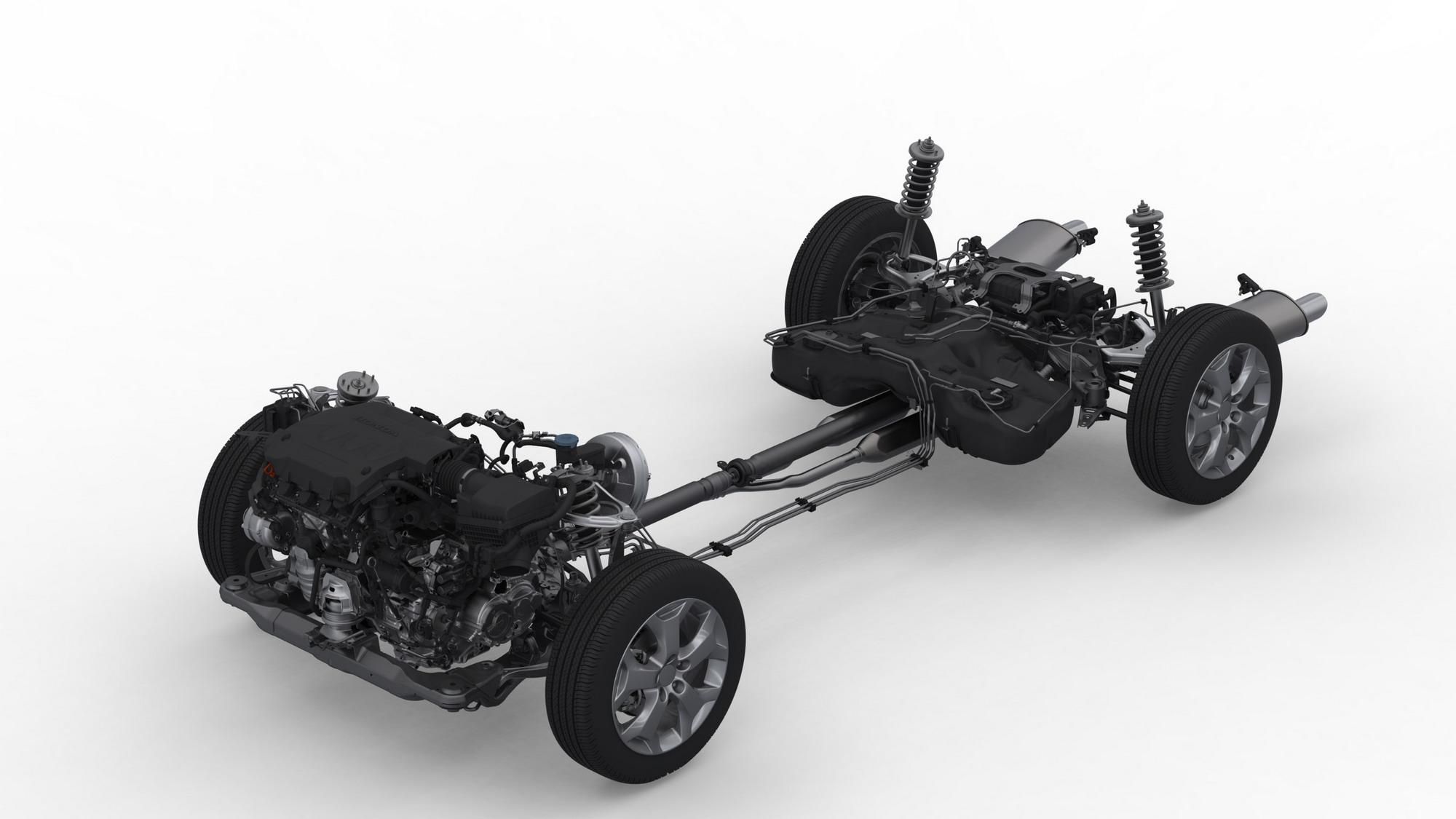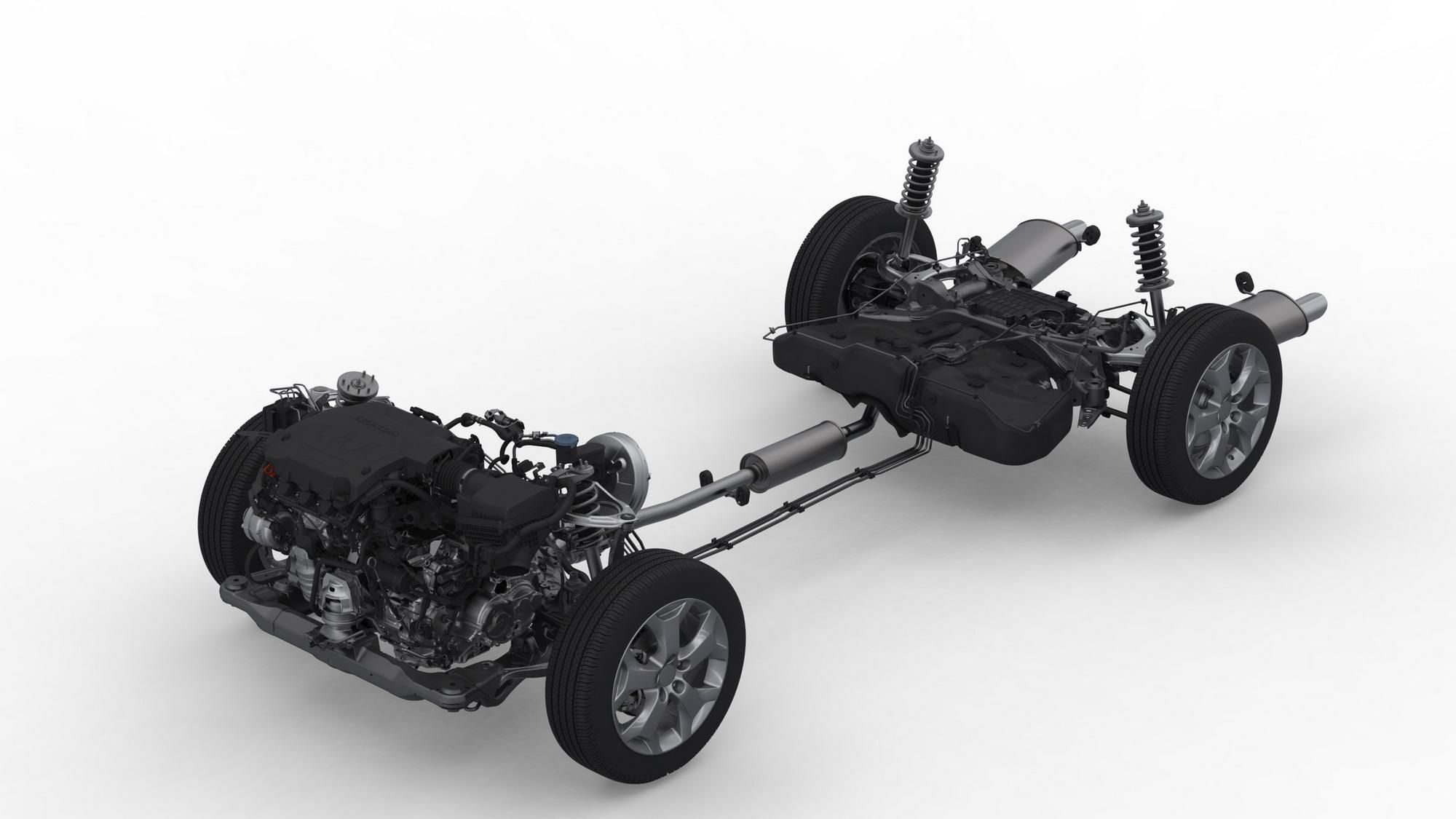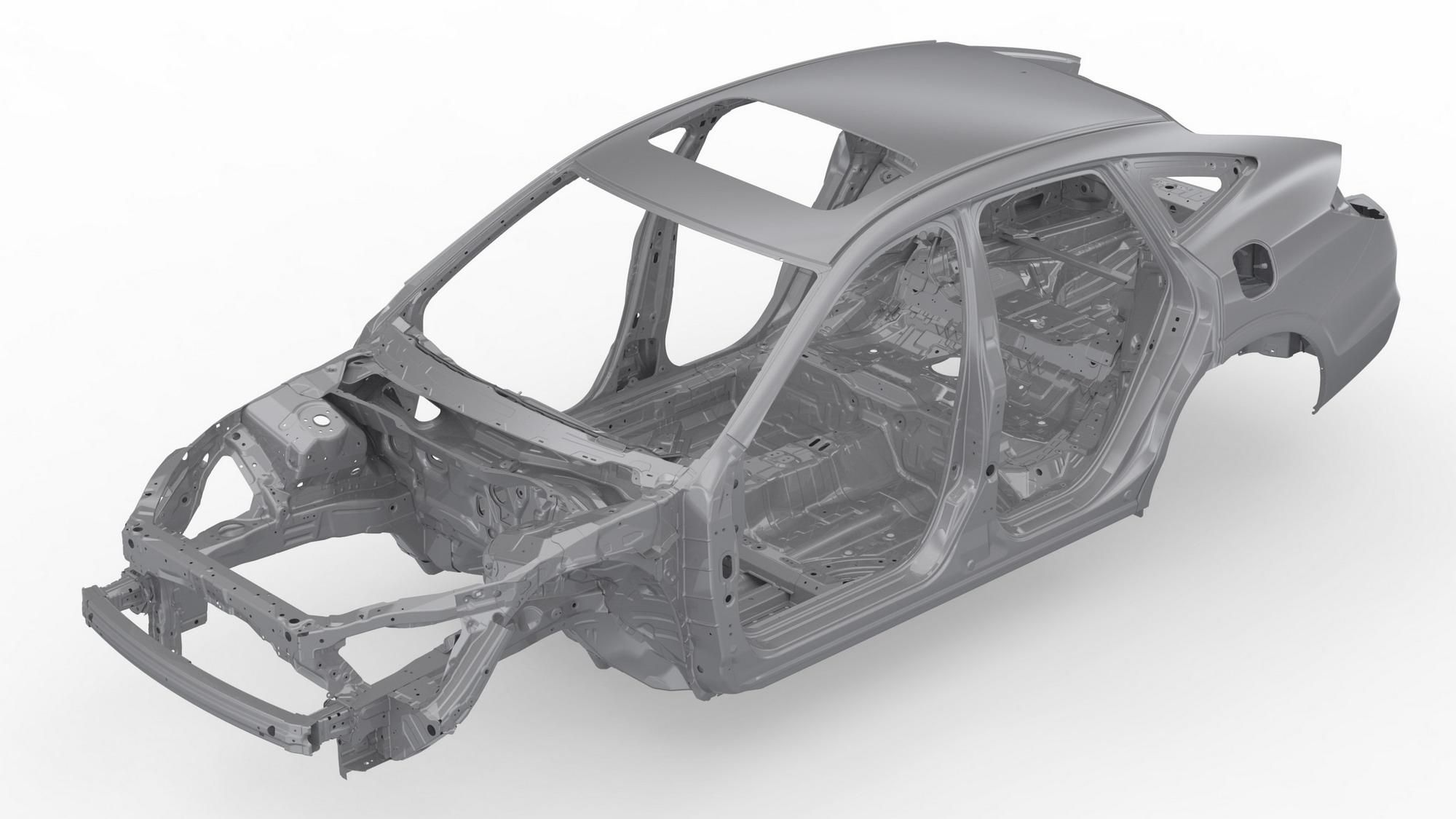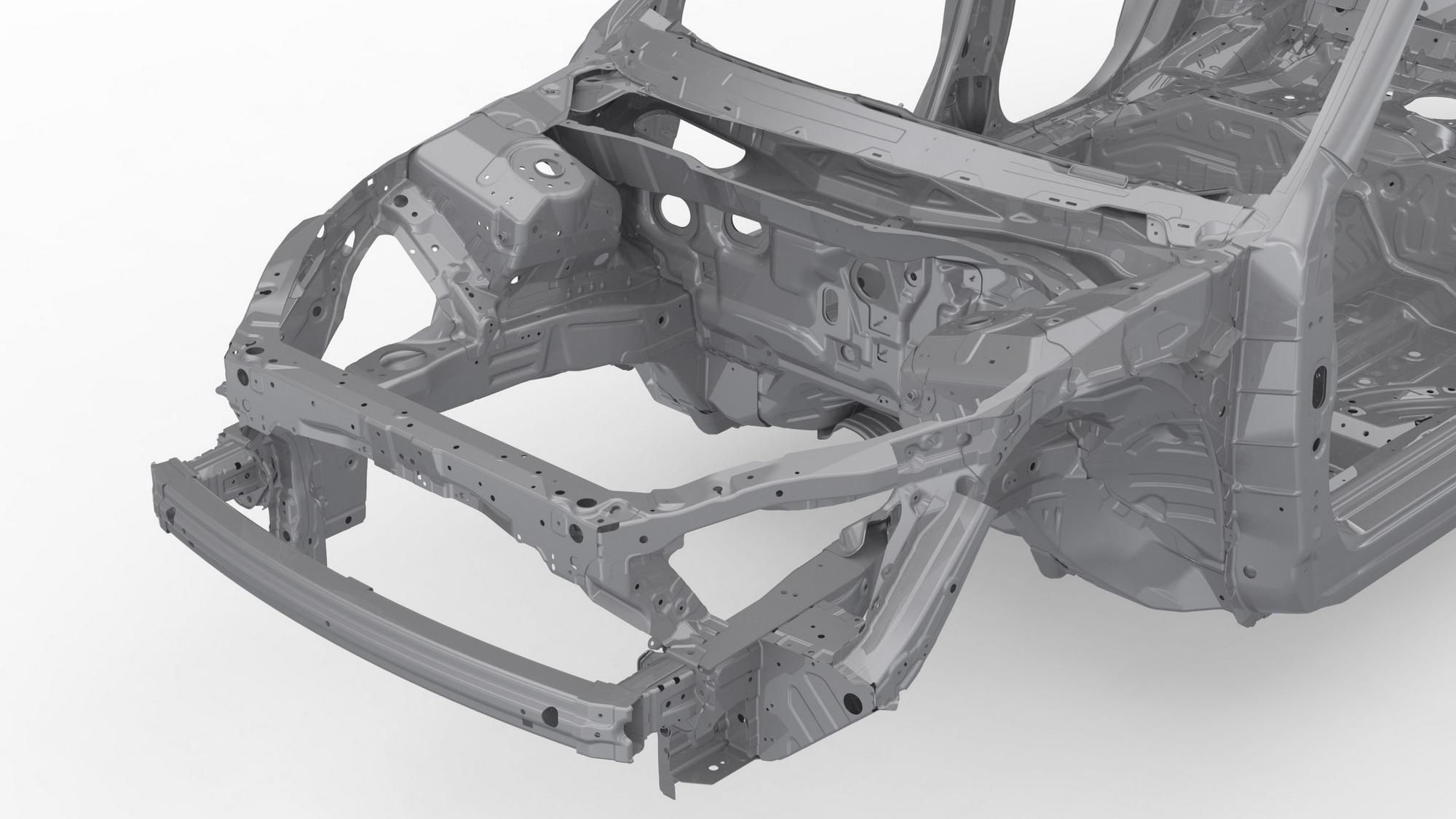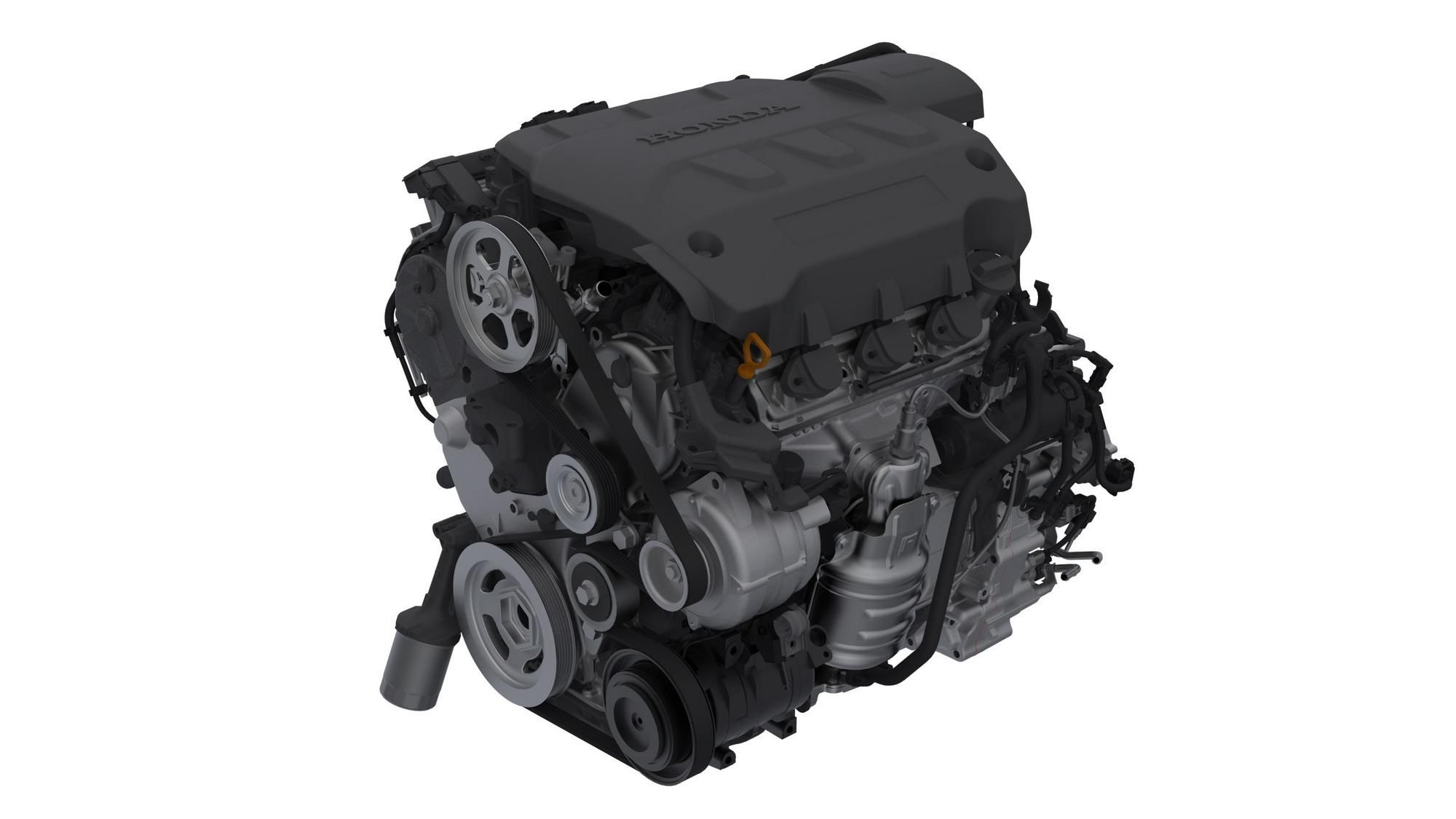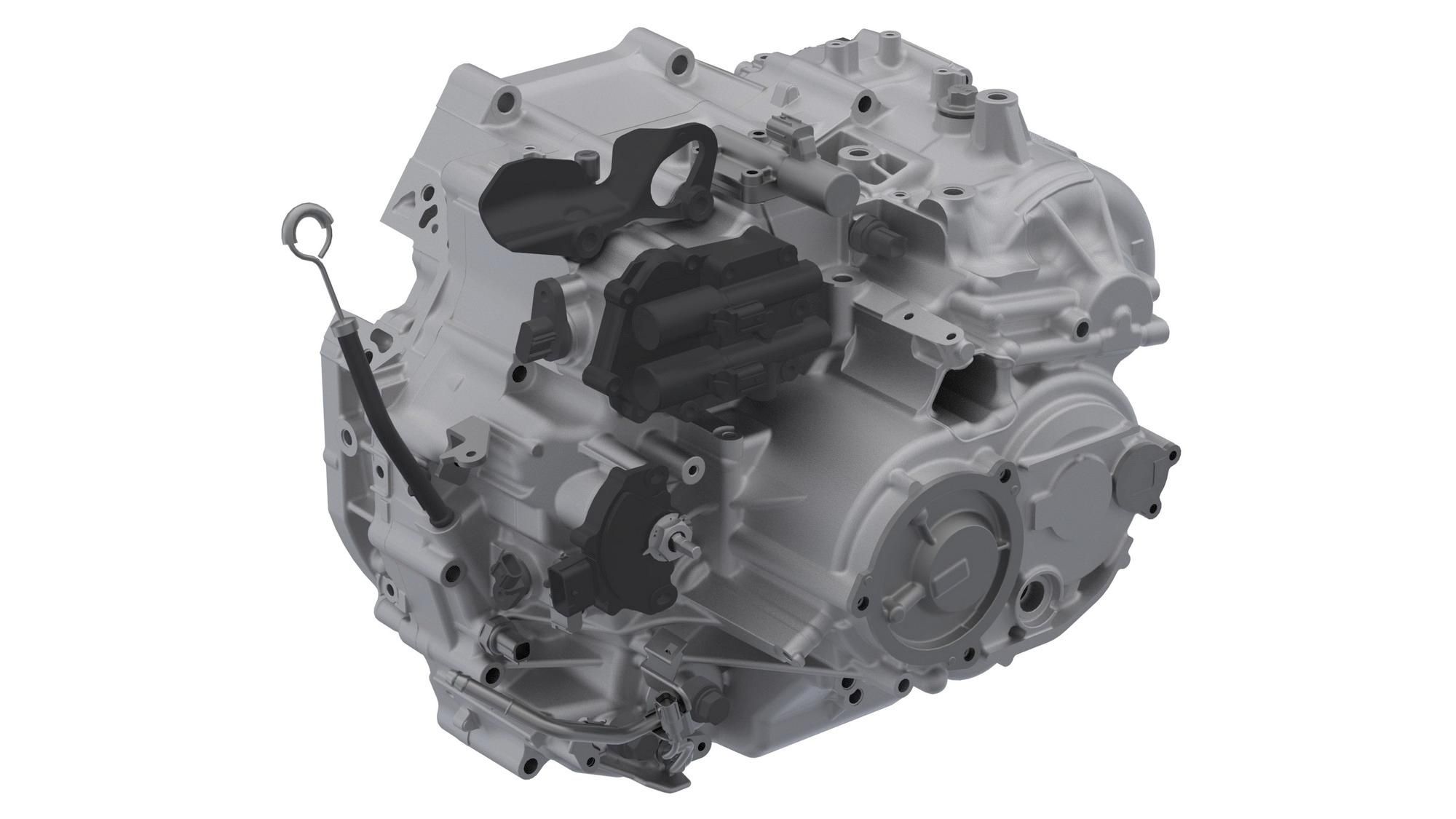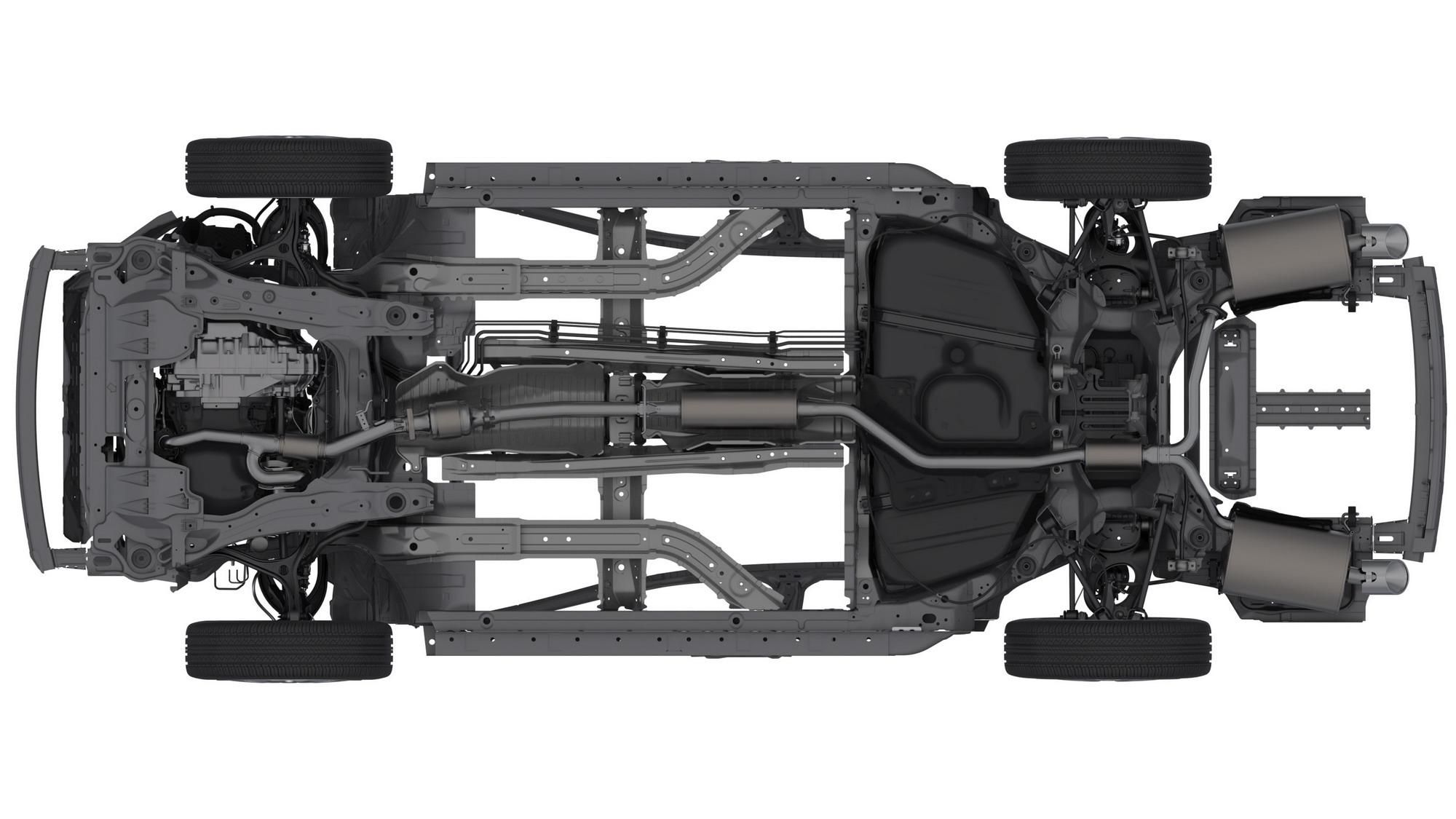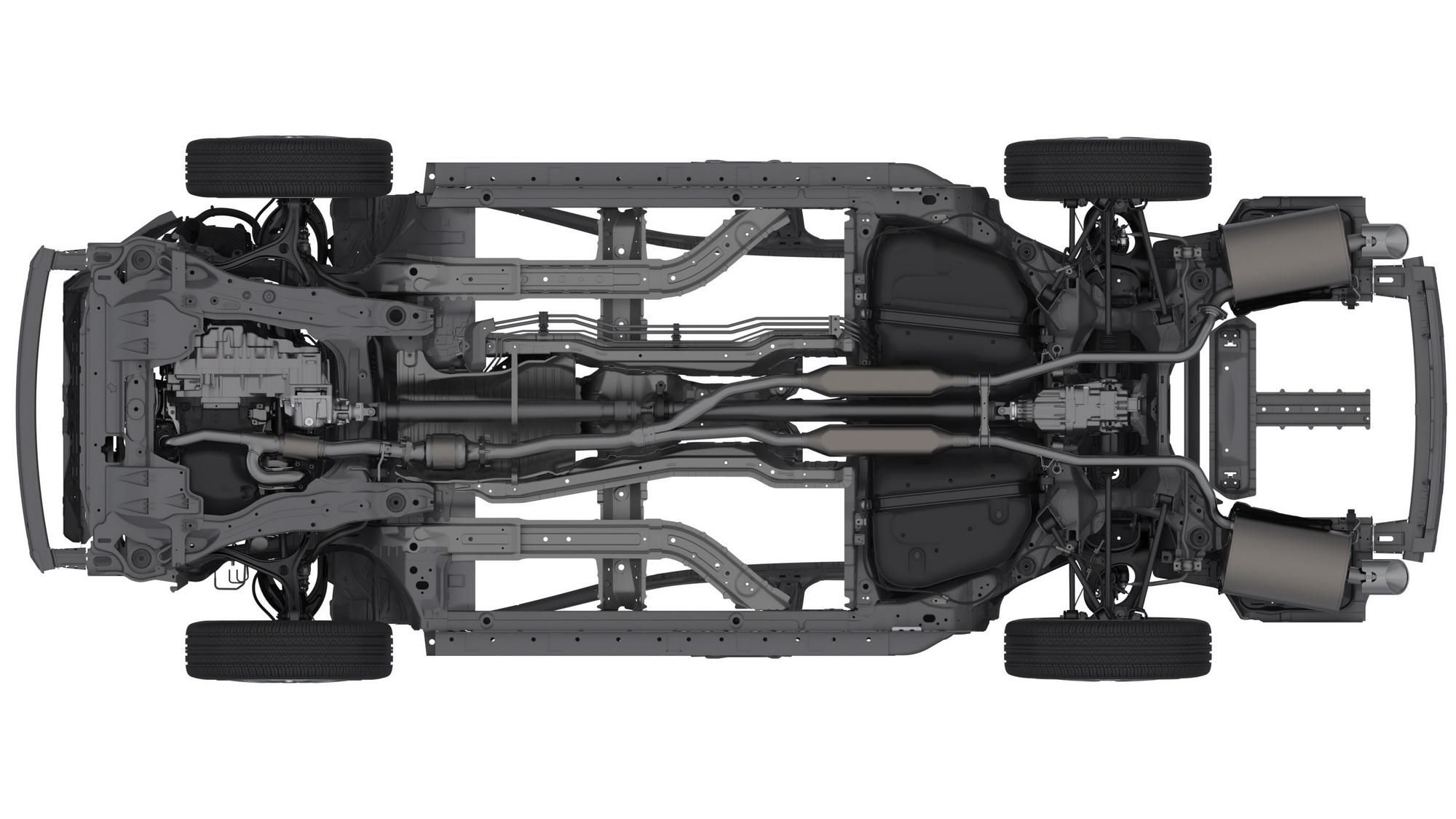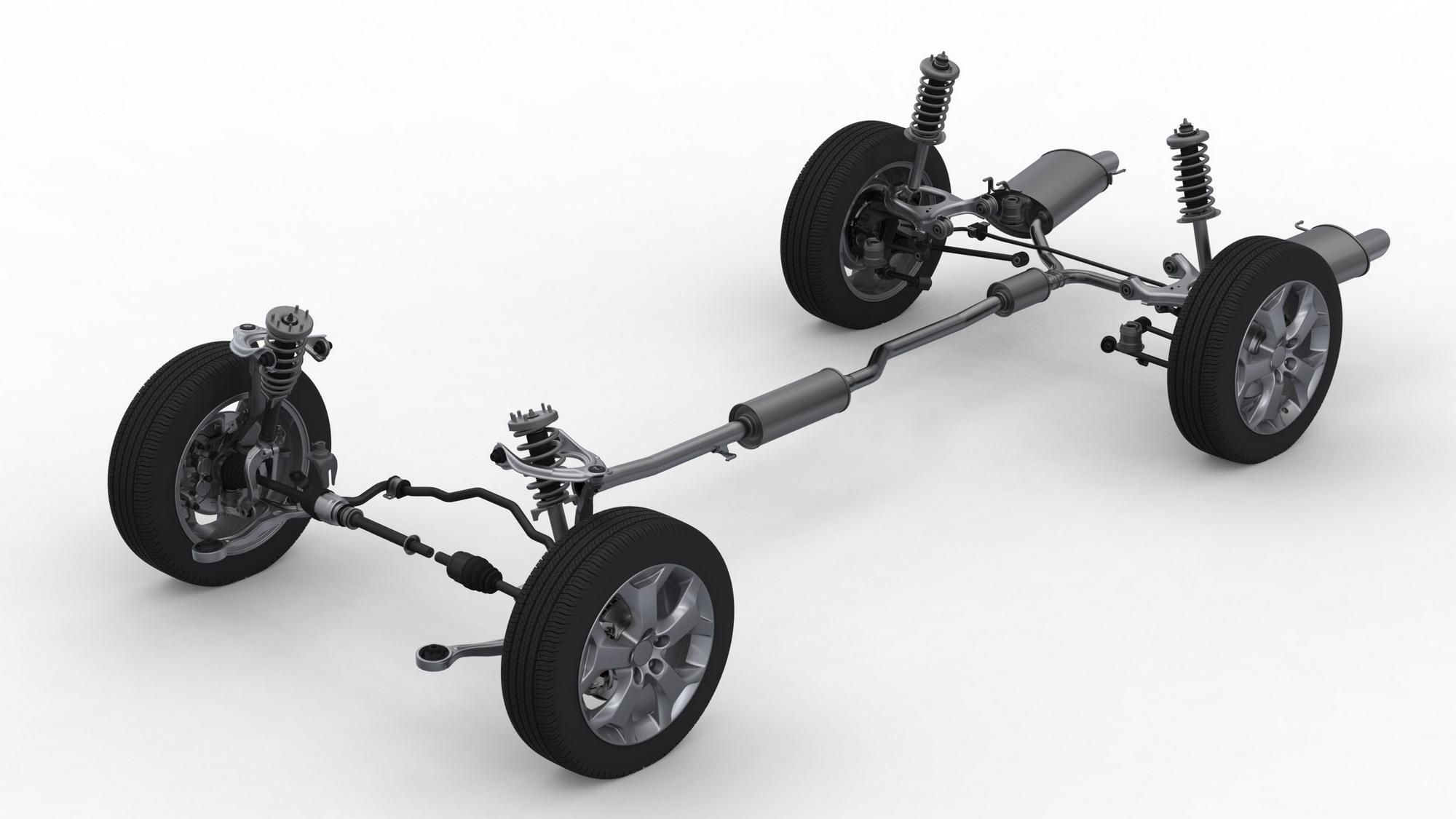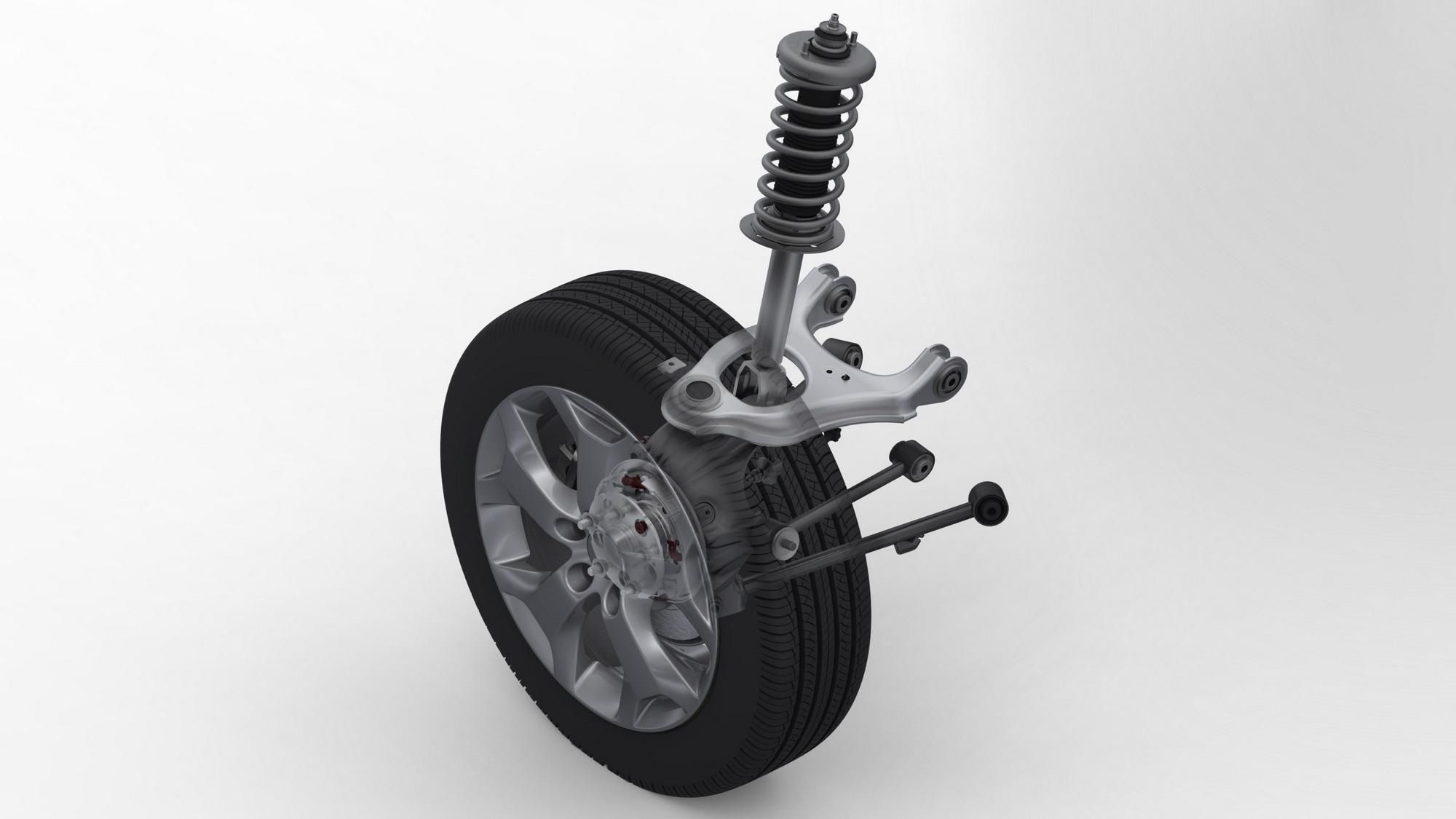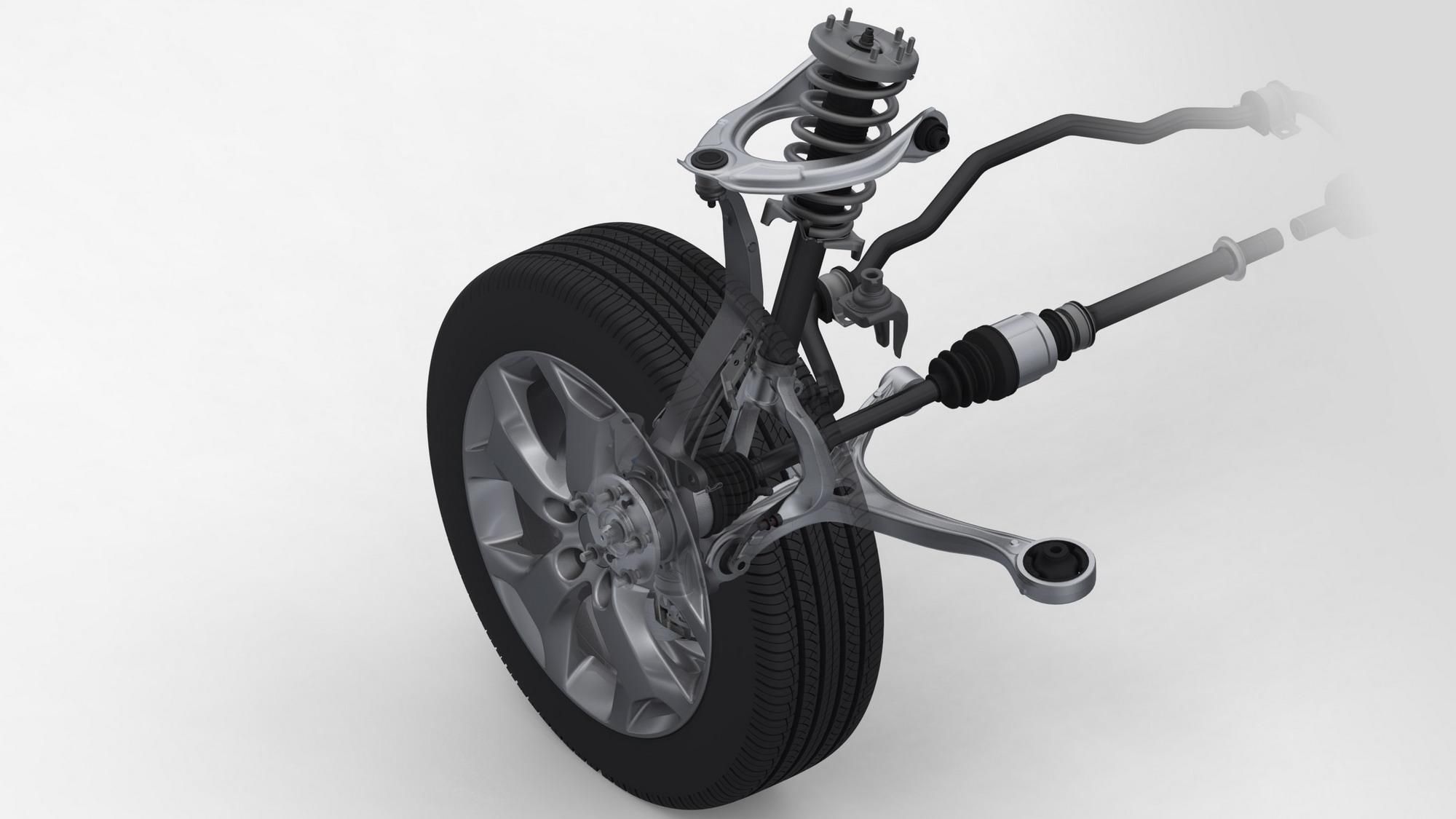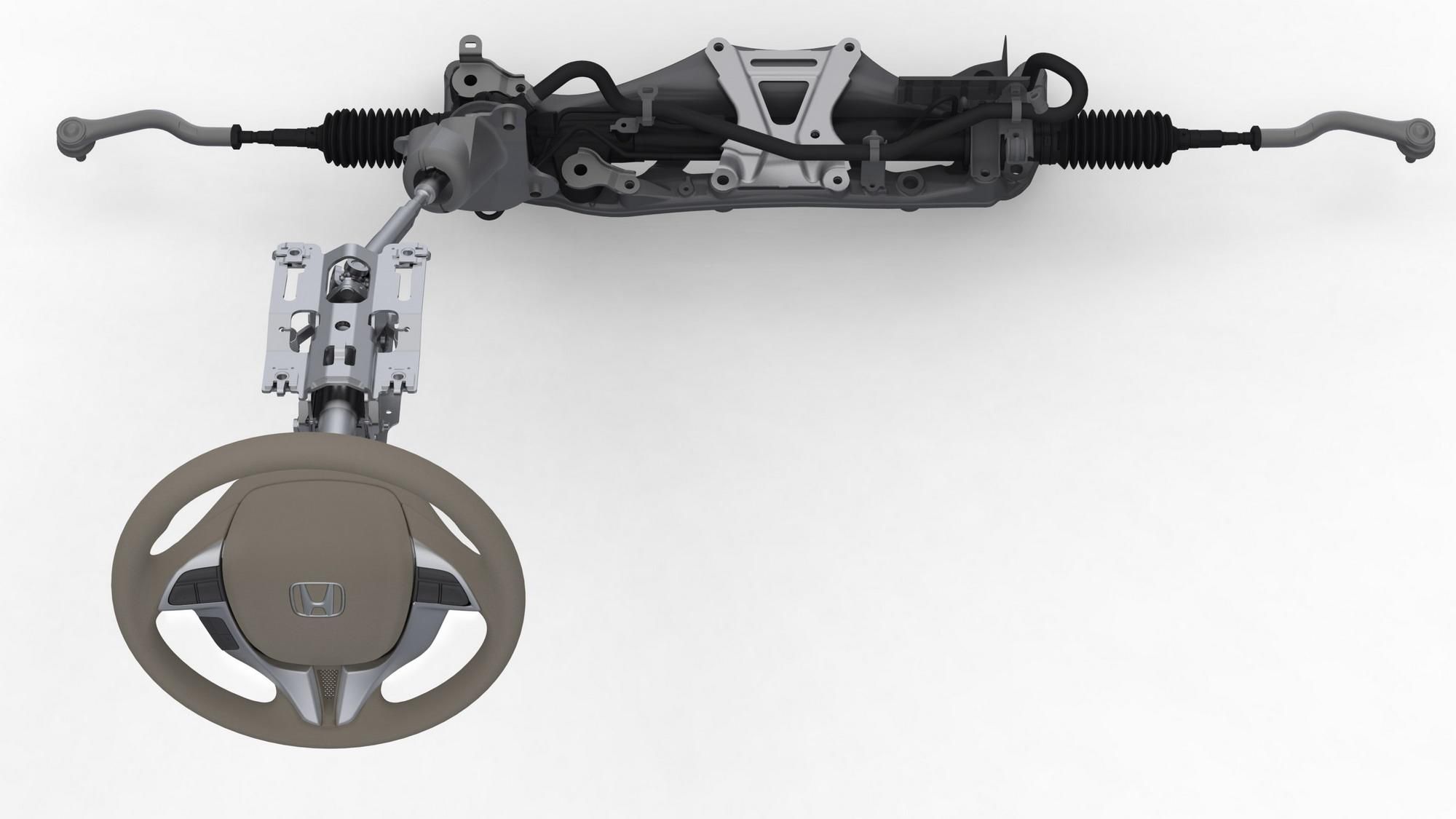The Japanese automaker Honda->ke34 has just reveled the first details on their all new crossover variant based on the popular Accord->ke237 sedan, the Accord Crosstour, as it will be known will be placed at the top of the Honda Accord family and is slated to go on sale this Fall after today's online debut.
The new Accord Crosstour's design is inspired by the Accord's familiar body lines and adds a bolder front grille that is complemented by a bolder and more muscular front bumper giving the Crosstour an aggressive stance while the wedge shaped C pillars add a bit of a fastback appeal to the sporty CUV. The flowing roofline narrows smoothly into the rear of the vehicle to create an attractive set of hips, which also makes for a rather large cargo area that can fit a bit more than the traditional sedan.
With the Honda Accord Crosstour, the world's largest engine manufacturer is getting into the game of plus sized luxury sedans that offer the practicality of a wagon while at the same time giving the owner the appearance of driving an SUV. It should only be a matter of time before we see an Acura badged variant to compete with other high end crossovers.
UPDATE 07/15/2010: Check out our review of the Honda Accord Crosstour by clicking here.
Press release after the jump.
2010 Honda Accord Crosstour
- Make: Array
- Model: 2010 Honda Accord Crosstour
- [do not use] Vehicle Model: Array
Press release
The all-new 2010 Honda Accord Crosstour evolves the Crossover Utility Vehicle (CUV) concept by integrating a sleek and aerodynamic shape that blends sporty, low-profile contours with versatile CUV functionality, American Honda Motor Co., Inc., announced today.
"Our concept is to broaden the appeal of the Accord line-up by leveraging traditional Accord strengths of fun-to-drive performance and handling while also adapting to dramatic shifts in the light truck marketplace," said Erik Berkman, vice president of American Honda Motor Co., Inc. "The Accord Crosstour accomplishes that by offering a modern interpretation of a CUV while integrating the refinement and efficiency of a premium sedan."
Derived from the Accord Sedan, the Accord Crosstour maximizes car-like ride and refinement, yet maintains capabilities consistent with a CUV's increased ride height and all-weather potential. The Accord Crosstour's styling builds on the Accord's familiar character lines and adds a bolder front grille complemented by a durable lower-body appearance, wedge-shaped C-pillars and an aggressive rear stance. The flowing roofline narrows smoothly into the rear of the vehicle to create an aggressive-looking design, which conceals a unique cargo area that can adapt to large objects that exceed the capacity of a sedan.
"We know SUV buyers like the commanding view of the road that comes with a high eye-point and like the comforts of living with an SUV," said Berkman. "This vehicle meets the needs of buyers looking for those attributes yet at the same time want an image that is different from a conventional SUV."
The Accord Crosstour will be positioned at the top of the Accord family when it goes on sale in fall 2009.
Interior
The all-new 2010 Honda Accord Crosstour will feature a versatile, upscale 5-passenger interior with an innovative rear storage area, a standard 3.5-liter i-VTEC V-6 engine and available four-wheel drive when it goes on sale in November, American Honda Motor Co., Inc., announced today.
"Honda has a longstanding reputation for maximizing interior space and utility in its vehicles," said Erik Berkman, vice president of corporate planning and logistics for American Honda Motor Co., Inc. "Like the award-winning Honda Fit, the Accord Crosstour uses a versatile design to create an interior that functions with the practicality of a larger vehicle."
The rear storage area features an innovative 8-inch deep under-floor Hidden Removable Utility Box with a reversible lid, featuring both plush-carpeted and durable-plastic sides. Levers near the interior fender wells, conveniently accessible from the tailgate opening, allow for one-touch conversion of the seats into the floor for additional cargo space.
The interior design is intended to enhance the feeling of width and space in the passenger cabin while creating a premium and accommodating atmosphere. The inset sculpting of the instrument panel along with a wide center console increases the sense of roominess. Intuitively grouped controls for the audio, climate and available navigation system are designed to operate with solidity and precision.
The exterior styling evolves the Crossover Utility Vehicle (CUV) concept by integrating a sleek and aerodynamic shape that blends sporty, low-profile contours with versatile CUV functionality.
-----
Body
The Honda Accord Crosstour's styling and body construction evolved from the sophisticated foundation of the Accord Sedan. Architecturally similar to the distinctive shape of the Accord, key differences can be found throughout the entire body. No exterior panels are shared with any other Accord. The most noticeable differences include the overall height of the body from the floor to the roof and the obvious design differences in the rear of the vehicle to accommodate the sloped roofline and the tailgate.
Exterior Styling Concept
The exterior styling builds on the Accord's familiar character lines and adds a bolder front grille complemented by a durable lower-body appearance, wedge-shaped D-pillars and an aggressive rear stance. The designers sought to build on the Accord's style that is already powerful, bold and sophisticated. Like the Accord Sedan, the Accord Crosstour's design is both sharp and strong, with a powerful-looking stance. Starting at the front, the Accord Crosstour's front fascia is enlarged and raised for dynamic toughness, and incorporates a wider and taller 6-point grille with large, horizontal slats surrounded by sharp and wide projector beam headlights. Well-defined wheel arches convey a strong stance and muscular tension. The fender lines appear broadened, like strongly muscled shoulders, with prominent character lines that sweep along nearly the entire body sides, subtly transitioning from an inverse line to an external line. Besides providing visual distinctiveness, these character lines communicate strength and structural depth. The flowing roofline narrows smoothly into the rear of the vehicle to create an aggressive-looking design, concealing a unique cargo area that can adapt to large objects that exceed the capacity of a normal sedan.
Body Construction
Increased rigidity enables enhanced vehicle dynamics, ride comfort and driving quietness. The Accord Crosstour is constructed of 46 percent high strength steel (340 grade or above) to create a strong, yet lightweight body with high rigidity and enhanced safety. The ACE Body structure further enhances frontal collision compatibility between vehicles with different bumper heights. The Maximum Efficiency Floor (MEF) design is comprised of a network of longitudinal rails, floor cross-members and pillar reinforcements that carry heavy loads to enhance crash safety, handling and packaging efficiency. High tensile strength steel tubular beams inside the door structure provide additional intrusion resistance.
Noise, Vibration and Harshness (NVH) Reduction Features
The Accord Crosstour is designed to drive exceptionally smooth and with reduced noise intrusion into the cabin. To accomplish this, the vehicle approaches NVH reduction from two primary directions - traditional insulation in the floor, doors and firewall; and active systems that work with the engine and audio system to cancel certain types of unwanted engine noise. A triple door-seal system is used to minimize wind and road noise. Strategic use of insulation in the rear fender wells also minimizes road noise.
Aerodynamic Enhancements
Aerodynamic performance is increased through the use of body under covers, a deflector under the front bumper, front strakes, the optimum inclination of the tailgate and an effective rear spoiler.
Ground Clearance
The ground clearance for the majority of the underbody area measures 8.1 inches and contributes to the Accord Crosstour's commanding presence compared to the Accord Sedan. The front strakes represent the lowest point under the vehicle at 6.0 inches (the official ground clearance number for EPA measurement purposes).
Active Control Engine Mounts
The Active Control Engine Mount (ACM) system is used to minimize the effects of engine vibration caused by the VCM system when cylinders are deactivated. During cylinder deactivation, the Powertrain Control Module (PCM) instructs the ACM actuators to move in concert with the engine motions to effectively cancel the vibrations inherent to cylinder deactivation. Inside the cabin, the audio system-based Active Sound Control (ASC) further minimizes any unwanted sound relating to the function of the VCM system. (Please see the Interior section for more information.) Together, these innovations help make the implementation of fuel saving technology transparent and seamless to the driver.
Glass and Visibility
The Accord Crosstour was designed to provide excellent outward visibility, improving the comfort and convenience for all occupants. A large greenhouse creates excellent outward visibility. Deeply tinted privacy glass is used in the rear side doors, wedge-shaped rear quarter windows and rear tailgate.
Tailgate
The Accord Crosstour's front-hinged tailgate design creates a wide opening into the vehicle of 38.5 inches (980mm) and a low lift-in height of 28.4 inches (721 millimeters). The hinge design is configured so that the user does not have to step backwards when the door is opening or shutting. The tailgate includes a large upper window and a smaller lower window for increased rearward visibility at lower sight angles. The lower window allows for objects like a 3.3-foot (1 meter) tall parking lot pole to be spotted at distances as close as 5.3 feet (1.6 meters). Comparatively, some CUV designs that lack a lower rear window require approximately 6.5 feet or more to spot the same 3.3-foot pole. The upper tailgate glass incorporates an intermittent rear wiper and washer nozzle. An electric defogger system is incorporated into the upper and lower glass sections.
The tailgate locks and unlocks with the interior's door locks. To open, an electronic switch under the license plate awning releases the tailgate when the vehicle is unlocked. For ease of closing, a grip handle is located under the tailgate base. The tailgate can be opened in tight parking situations, requiring a minimum of 5.9 inches of space between the leading edge of the tailgate and a potential obstruction like a nearby vehicle or wall. Two gas-filled struts support the open tailgate.
Headlights and Taillights
The Accord Crosstour is equipped with halogen projector-beam headlights for low beam illumination and conventional reflective halogen high beam headlights. Projector-style headlights provide a distinctive and sporty appearance with a bright, focused beam for a superior, even distribution of light compared to conventional reflector lens designs. The standard fog lamps are integrated into the front bumper. The taillights convey a deep three-dimensional appearance with layered inner lines that wrap from the back of the vehicle into the fenders. A clear lens for the backup light punctuates the overall red design. The taillight housings integrate a side reflector and turn signals in addition to the running lamps and the stop lights.
Door Design and Construction
The Accord Crosstour's doors are designed to operate with solid precision with a convenient three-stage detent hinge. Additional premium features include triple seals in the bottom of the door structure to better insulate the cabin from road noise. Triple seals also serve to keep moisture, dirt and road grime away out the kick panel area – a space that can sometimes come into contact with clothing while entering or exiting the vehicle. All door handles are soft to the touch underneath to improve operating comfort.
With the key inserted, the door lock cylinders can raise and lower the windows and open/close the moonroof by turning clockwise for up and counter-clockwise for down. The unlock button on the key fob will lower the power windows and open the moonroof when depressed for three seconds and then continuously held.
An automatic door locking/unlocking system is customizable by driver preference. Automatic locking can be linked to vehicle speed reaching 10 miles per hour (15 km/h), or the gear shift lever shifting from park, or it can be deactivated entirely.
Automatic unlocking, configurable to the driver's door or all doors, can be linked to the ignition switch being turned to the off position, or the gear shift lever being positioned in the park position, or it can be turned off entirely. The factory default for locking is linked to vehicle speed. The factory default for unlocking is linked to the gear shift lever and unlock activation for the driver's door only.
Side Mirror
The vehicle's side mirrors are aerodynamically optimized to prevent wind noise and minimize turbulence. When the driver puts the transmission in reverse on the Accord Crosstour EX-L model, the driver or passenger-side mirror can tilt down (depending on left/right/off mirror switch position) to reveal curbs and ground level obstacles. The Accord Crosstour EX-L model includes mirror position memory linked to the driver's seating profile (activated with the key fob or the controls near the driver's door release). All models feature heated side mirrors as standard equipment.
Moonroof
To tilt or slide the moonroof the driver or front passenger needs only to fully press the ceiling-mounted switch once (instead of pressing and holding it for several seconds). The moonroof fully opens or closes automatically. However if the operator wishes to only partially open or close the moonroof (such as to achieve partial ventilation), a lighter touch yields fully manual control. The moonroof can also tilt to provide ventilation. An auto-reverse feature is built in, helping to ensure that the moonroof will not forcefully close if someone's hand or arm is positioned in the path of the moonroof. If an obstruction is detected, the moonroof mechanism will reopen the moonroof.
-----
Interior
The Accord Crosstour is designed to offer a comfortable, high quality and premium environment for up to five passengers along with enhanced cargo functionality that can conveniently accommodate active lifestyles. Compared to the Accord Sedan and Coupe, the Accord Crosstour provides a uniquely higher step-in height and hip-point for ease of entry and exit, which also results in a commanding view of the road.
The cargo area incorporates useful and versatile features that make configuring the vehicle for people or large items a simple operation. Levers near the interior fender wells, conveniently accessible from the tailgate opening, allow for one-touch conversion of the rear seats into the floor for quick access to the 51.3 cubic feet of maximum-possible cargo space. An 8.4-inch deep under-floor hidden removable utility box adds 1.9 cubic feet of storage. The carpeted lid of the cargo box can be reversed to a plastic side for storage of wet or dirty items. Accord Crosstour EX-L models include a cargo privacy cover.
Styling Concept
"Premium and active" represents the dual role functionality of the Accord Crosstour's interior design. Consistent with all Accords, a variety of design techniques were used to enhance the feeling of width and space in the passenger cabin to express premium and accommodating quality. The inset sculpting of the instrument panel along with a wide center console increases the sense of roominess. Intuitively grouped controls for the audio, climate and available navigation system are designed to operate with solidity and precision.
Two interior color combinations are available. The charcoal black interior is intended to convey a stylish and sporty environment and features a monochromatic black instrument panel divided with wood trim-appearance highlights. The ivory interior is intended to create a sophisticated and bright ambiance and features a two-tone instrument panel with a black upper segment and tan lower segment. Wood trim-style accents on both color combinations divide the upper and lower portion of the instrument panel.
Interior Packaging Concept
The Accord Crosstour interior packaging concept is divided into two distinct zones for premium passenger accommodation and versatile cargo capabilities. The passenger zone seeks to provide occupants with sophisticated styling and advanced features similar to all Accord body styles. The cargo zone continues the premium theme with highly visible application of quality materials above the floor line, then adds more rugged versatility beneath the floor.
Instrument Panel
The driver's instrument cluster includes two large analog meters for the speedometer and tachometer, each surrounded by silver trim rings for a premium sporty appearance. The Accord Crosstour meters use blue illuminated pointers for a premium appearance. The 8000-RPM tachometer and 160-mph speedometer are flanked by temperature and fuel gauges. Below the meter array is an LCD display that can show odometer, Trip A or Trip B functions, outside temperature, and maintenance alerts.
The center panel has been carefully designed for maximum visibility and ease of use. A central display is mounted at the top of the center stack for good visibility, and the controls are mounted lower for easier reach. Switches for the audio system, climate controls and navigation system (if equipped) are grouped together in corresponding zones differentiated by function type. The button positions and size are prioritized by frequency of use. Switchgear is flush mounted with high-grade materials for an upscale appearance and feel. For further differentiation, climate control buttons appear light gray and audio controls appear black.
The Accord Crosstour EX and EX-L (non navigation) three-line central display features a digital clock; audio mode indicator; station and broadcast contents information for FM, XM (on EX-L), track and time information for CD and the EX-L's USB-connected media; dual climate control temperature readouts and a digital compass. The Accord Crosstour EX-L with navigation integrates an 8-inch screen in place of the three-line display and an interface dial down low on the center panel within easy reach.
Underneath the center display are two movable climate control vents, the emergency flasher switch and a passenger-airbag off light. Below the vents are the HVAC controls. Audio-system controls are located in a separate row and feature larger switches that are easier to identify at a glance. Accord Crosstour EX and EX-L (non-navigation) models also have an interface dial in this location, flanked by Menu and Cancel switches. The dial is rotated to select among different on-screen items. Pushing the center button selects the highlighted item.
Steering Wheel
The 3-spoke steering wheel on the Accord Crosstour (leather wrapped on EX-L) is intended to create a sporty feeling. Steering-wheel mounted audio and cruise-control buttons include Mode, Volume and Channel, plus Cruise, Cancel, Set/Decelerate and Resume/Accelerate. Accord Crosstour EX-L models add buttons for the Bluetooth® HandsFreeLink® telephone interface. In models equipped with the navigation system, the steering wheel also features buttons for navigation voice control activation. The tilt and telescope range for the steering column, along with seat height adjustment range, enhances comfort for a wide array of driver sizes.
Dual-zone Air Conditioning with Air Filtration System and Humidity Control
The Honda Accord Crosstour is equipped with dual-zone automatic climate control as standard equipment. The primary heating, air conditioning and ventilation (HVAC) controls include individual controls for temperature, fan speed, vent selection (center, floor and defogger vents), rear electric defogger and fresh or re-circulated air. To maximize rear passenger comfort, the Accord Crosstour includes vents in the rear console (identical to the new vents added to Accord Sedan EX and EX-L models for 2010). The airflow is connected to the front center vents. The dual-zone automatic climate controls maintain a user-selected temperature based on the driver's or front passenger's preferred settings for temperature. The dual-zone aspect of the automatic climate control allows the driver and front passenger to select different temperatures.
The automatic climate control on models equipped with the Honda Satellite-Linked Navigation System benefit from GPS-linked, solar-sensing technology that intelligently modifies the temperature setting on the side of the vehicle facing the sun.
Based on its continuously updated vehicle position information, the navigation system determines the position of the sun relative to the driver and passenger and then increases or decreases the temperature accordingly. When in AUTO mode, this information is combined with input from the solar sensor located on top of the instrument panel to automatically adjust the temperature from side to side as needed in order to compensate for asymmetrical solar heating.
To provide greater operating efficiency while maintaining a comfortable interior climate, the Accord Crosstour partially mixes cool cabin air with fresh air in the blower to reduce compressor operation by up to 20 percent (compared to operating exclusively on exterior air).
To prevent the compressor from being excessively operated, the Accord Crosstour's climate control system has a cabin humidity sensing system. This control system provides greater passenger comfort and minimizes the time the air conditioning runs. When set to operate in AUTO mode, a temperature and humidity sensor located in the front of the passenger cabin monitors the interior climate. If the system determines that there is a low probability of window fogging, it maintains a comfortable humidity level. If the system determines that potential window fogging conditions exist, it changes the climate control parameters to help keep the windows clear.
Front Seats
Designed to provide both long term comfort in the center and firm lateral support on the sides, the front seats are identical to those found on the Accord Sedan. The seats include active head restraints that help reduce the likelihood of neck injury in the event of a rear collision. The cloth seating surfaces on the Accord Crosstour EX include 10-way power adjustment (including lumbar support) for the driver and 4-way power front passenger-side seat. The Accord Crosstour EX-L upgrades to leather-trimmed seating surfaces and adds a position memory function for two drivers. The memory function is activated by either the key fob or by the panel located next to the driver's door handle, and it also recalls the preferred side mirror settings.
Center Console
The center console provides 5.3 liters of storage and functions as a wide armrest for the driver and front passenger. A spring system supports the operation of the cover, which doubles as the center armrest. In addition, 19 CDs can fit inside. The armrest slides fore and aft for improved comfort for drivers of different heights.
Located inside the center console is an auxiliary input jack (aux-in) that supports a personal audio player connection to the vehicle's audio system. A 12-Volt DC power point is included inside the console. Plugging a portable audio device into the aux-in jack automatically sets the volume at a preset level; when the device is unplugged, the volume resets to its previous level. The Accord Crosstour EX-L adds a USB Audio Interface in the center console (see the audio section for more information.)
60/40 Split Rear Seats with One-touch Fold Down Levers
The rear seats capitalize on the wide stance of the Accord Crosstour and can accommodate up to three passengers. Each rear passenger seating position has a head restraint. The 60/40 split allows for partial or full access to additional cargo space depending passenger or cargo priorities. A folding center armrest is integrated into the seat and includes two beverage holders. In the cargo area, two one-touch release levers are located near the tailgate opening sides for one-handed fold-down operation of the seats into the floor. The seats create a flat surface when folded down and do not require the removal of the head restraints. Two Lower Anchors and Tethers for Children (LATCH) positions are included in the outboard seating positions. Three child seat anchors are provided on the rear seat backs.
Cargo Area
The rear cargo area supports the "active" role of the Accord Crosstour and demonstrates how thoughtful engineering can maximize a limited amount of space. Durable level-loop carpet lines the cargo area to help cushion contents. A polished metal kick plate at the base of the cargo area opening resists scuffing and appears upscale yet durable. In standard configuration with rear seats upright, the cargo area provides 25.7 cubic feet of cargo space above the floor and an additional 1.9 cubic feet of space below the floor. With the rear seats folded forward, the total above-floor cargo volume expands to 51.3 cubic feet. The carpet-covered plastic lids discretely conceal the Hidden Removable Utility Box and the under floor side bins that can be reversed to create an all-weather, wipe-able cargo area. The carpeted side creates a premium look and offers a "soft" option for transporting "premium" items, while the plastic side is ideal for transporting dirty and/or damp items. Two cargo tie-down points are provided on the floor near the middle of the wheel wells and two more are provided on the rear wall of the cargo area. A 12-Volt outlet is located on the driver's side rear wall of the cargo area.
Hidden Removable Utility Box
The Hidden Removable Utility Box is a key feature of the cargo area under the floor, and as the name implies, can be easily removed from the vehicle with built-in handles that swing into place for lifting from the vehicle. The reinforced plastic 1.9 cubic foot box includes two dividers for further separation of items within the box.
Cargo Privacy Cover
The Accord Crosstour EX-L model is exclusively equipped with a hinged cargo cover that is connected to the tailgate for enhanced privacy and extra convenience. The two-piece design incorporates a hard shell extender that attaches near the tailgate window to receive the self-retracting heavy duty cloth netting. The privacy cover moves with the operation of the rear tailgate. The cargo cover can be removed for full access to the cargo space.
Interior Lighting
First row convenience lighting includes two ceiling-mounted map/reading lights, blue ambient overhead console lighting, a lighted glove box and two courtesy lights (puddle lights) mounted on the lower portion of the front doors. Driver and front seat passenger window controls are also illuminated for night use. Two additional map/reading lights are integrated into the second-row headliner and are activated by depressing the lenses themselves. The interior lights turn on automatically when the vehicle is unlocked or when a door is opened.
The lights will remain on for 30 seconds or until after the doors are closed, at which time they will fade gradually to full off. Two cargo area lights in the upper side panels provide downward illumination toward the cargo area when the tailgate is open.
Auto-Dimming Mirror
An auto-dimming rearview mirror is standard on Accord Crosstour EX-L models. The rearview mirror automatically dims to an anti-glare setting when bright headlamps are detected behind the vehicle.
High-power Audio System
All Accord Crosstour models feature a 360-watt audio system with seven speakers including a subwoofer that can rival the top systems available in many factory-installed applications. The four main speakers feature 6.7-inch composite cones that deliver low distortion and highly realistic sound reproduction properties. Accord Crosstour EX-L models feature four Kevlar cone material heightened response and sound clarity. Twin tweeters, mounted on the A-pillars, use an aluminum dome instead of the traditional soft dome for reduced distortion. This likewise improves sound quality with clearer high frequencies. The 7.9-inch subwoofer, mounted in the cargo area side wall, is driven by a dedicated 90-watt amplifier for powerful low-frequency tones.
On the Accord Crosstour EX and EX-L (non-navigation), the system offers song-scrolling capability through an interface dial when playing CDs that provide this data. The song title appears on the Information Display, which can show three lines of text. In addition, the system features a 6-disc CD changer.
XM Radio1 and a USB Audio Interface come standard on Accord Crosstour EX-L models. The USB Audio Interface2 is used for direct connection to and control of some current digital audio players and other USB devices that contain MP3, WMA or AAC music files. Some USB devices with security software and digital rights-protected files may not work. The artist and song title appears on the information display, which can show three lines of text.
Speed-sensitive volume control (SVC) automatically adjusts the volume as the vehicle's speed increases to counteract the gradual buildup of road and wind noise. Low, medium, high and off operating modes are available.
Active Sound Control (ASC)
The Accord Crosstour receives the first-ever application on a Honda-brand product of the Active Sound Control (ASC) system that is more sophisticated compared to the Active Noise Cancellation™ (ANC) system used on the Accord Sedan and Coupe models with the technology. Whereas ANC dealt specifically with the elimination of low decibel noise entering the cockpit, the new ASC system has a much broader range including the elimination of unwanted high frequency noise. In addition, the ASC system is linked to throttle position and engine RPM to provide a more quiet cockpit during normal cruising while allowing desirable parts of the engine sound to be heard more during higher RPM, higher speed driving.
ASC not only improves sound cancellation but also works throughout the entire engine RPM range whereas the previous ANC system only worked to cancel engine booming noise up to 2000 RPM. Moreover, ASC is specially tuned for various levels of "effect" generated at different throttle positions: during low RPM, ASC delivers a quiet cabin and during high RPM the ASC is tuned to allow a more refined and harmonizing note to enter the cabin.
The ASC system operates whenever the engine is running, regardless of whether the audio system is on or off. There are two microphones mounted in the headliner- one in the front and one in the rear. The microphones capture low-end drivetrain frequencies entering the cabin, and send a signal to the ASC unit. The ASC unit then creates a precisely timed reverse phase audio signal that is sent to an amplifier, which powers the door speakers and the subwoofer.
The ASC system dramatically reduces the booming sound of the engine exhaust. In the frequency range below 100 hertz, Active Sound Control results in an impressive reduction in noise level. Moreover, the system controls high-frequency and middle-frequency noise attenuation. The system also contributes to the engine's expanded VCM cylinder deactivation range by counteracting more of the less desirable sounds associated with certain ranges of cylinder deactivation.
Honda Satellite-Linked Navigation System with Voice Activation and Rearview Camera
The Accord Crosstour EX-L is available with the Honda Navigation System with Voice Recognition™3 that tracks the vehicle's position based on positioning data from up to 12 orbiting Global Positioning Satellites (GPS). If GPS reception is blocked by a tall building, tunnel, or parking garage, an internal gyroscopic system with a speed sensor tracks the location to keep the mapping information current and reliable until satellite reception is restored. The Accord Crosstour introduces a new type of reflection minimizing coating on the navigation screen. The special surface finishing reduces reflection of light coming from outside the car.
The navigation system stores its mapping data on a DVD that can be updated annually with the latest mapping information by inserting an update disc into the system's dedicated drive. More than 7 million points of interest are stored on the system's DVD, which includes a business and recreation directory of virtually the entire continental U.S. complete with phone numbers.
There is also a digital version of the Zagat Survey™ restaurant guide with detailed information and reviews on restaurants in database. The reviews can be read on-screen or spoken over the audio system by a synthesized voice.
The navigation system can be controlled by using the interface dial by choosing menu options or by spelling out a word (e.g., an address, business name or place). Characters on an on-screen keypad can then be selected using the interface dial.
For voice operation, the 2010 Honda Accord Crosstour uses cutting-edge new voice recognition technology. Like the previous voice activation system, the driver simply presses the "Talk" button on the steering wheel and says a command phrase. The system can control all routing aspects of the navigation system plus the climate controls and audio controls. This advanced voice recognition technology has a "listening" vocabulary of more than 100,000 words that can be combined as command phrases with variable logic and structure.
The new technology allows the voice activation system to respond to more casual command phrases that require less familiarization, in addition to the previous capability of being able to understand spoken city and street names. For example, a voice request for "Radio 98.3 FM" can now be spoken in approximately a dozen different ways ranging from "change the radio station to 98.3" to "98.3 FM." This logic applies to all areas of the navigation system that can be controlled by voice and the conventional navigation commands like, "Find nearest Chinese restaurant" or "find nearest ATM."
The audio system is automatically muted when the "Talk" button is pressed. The voice recognition technology allows the driver to simply speak city and street names aloud, and the system responds by displaying matches available in the database. Points of interest on the map (such as restaurants or grocery stores) can be displayed with brand logo icons or you can have the system provide turn-by-turn navigation - all by voice command. The massive point-of-interest (POI) database includes telephone numbers, which can be dialed by using the Bluetooth® HandsFreeLink® system when the driver's cellular telephone is connected to the system.
A trip computer is available in the information display that provides instant fuel economy, average fuel economy for trip A and trip B, elapsed time, average speed, and vehicle range on remaining fuel.
Interface Dial
Most frequently used electronic functions in the navigation system have dedicated controls placed on the instrument panel or on the steering wheel. Voice control of navigation, climate control, audio and communications functions are available, while the interface dial positioned just ahead of the center console-mounted shift lever provides another avenue of control. The Interface Dial can be rotated and rocked like a joystick to select function menus displayed on the navigation screen. A push of the controller selects the highlighted item.
Bluetooth HandsFreeLink
The Bluetooth®4 HandsFreeLink® hands-free phone interface is designed to work with many Bluetooth® enabled mobile phones. The system uses radio frequencies to connect the driver's cell phone to the Accord Crosstour's Wireless Telephone Interface. This allows the driver to make or answer cell-phone calls without taking his or her hands from the steering wheel. The system is compatible with Bluetooth enabled cell phones that have the Hands Free Profile (HFP).
Bluetooth HandsFreeLink is designed for easy use. After the driver completes a one-time "pairing" process to link the cell phone with the Accord Crosstour, Bluetooth HandsFreeLink can communicate wirelessly and securely with the driver's cell phone when the phone is within about 30 feet of the car. Once the driver enters the car, he or she simply stores the phone in a pocket, briefcase, purse or a storage bin inside the Accord Crosstour's cabin and the call transfers through the wireless telephone interface. Certain compatible cell phones can also transfer the cellular phonebook into the navigation system through the Bluetooth® HandsFreeLink system. After the cellular phonebook is transferred into the navigation system, calls can be made by making selections from the registered phonebook on the information screen in the navigation system.
-----
Powertrain
The Honda Accord Crosstour comes standard with a 271 horsepower V-6 engine, a 5-speed automatic transmission and is available with the company's innovative Real Time™ 4WD system. The 3.5-liter, 24-valve SOHC i-VTEC powerplant with Variable Cylinder Management (VCM) that builds on technologies that have been developed and refined on previous Honda vehicles. With its 60-degree V-angle, the Accord's V-6 engine is inherently very smooth and has compact overall dimensions that allow efficient packaging within the vehicle. The automatic transmission includes a new G-force hold control feature along with an RPM rev-matching featuring when downshifting.
Engine Architecture
The Accord Crosstour's engine is an advanced 3.5-liter, SOHC, 24-valve, 60-degree, V-6, aluminum-block-and-head design that is compact, lightweight and powerful. The i-VTEC valvetrain and high efficiency intake manifold optimize cylinder-filling efficiency across a wide range of engine speeds. Low-restriction intake and exhaust systems, a 10.5:1 compression ratio and roller-type rocker arms further aid efficiency and power delivery across a broad RPM range.
The Accord Crosstour's V-6 has a die-cast lightweight aluminum alloy block with cast-in-place iron cylinder liners. Made with a centrifugal spin casting process, the thin-wall liners are high in strength and low in porosity. The block incorporates a deep-skirt design with four bolts per bearing cap for rigid crankshaft support and minimized noise and vibration. Both the block and caps are heat treated for greater strength.
A forged steel crankshaft is used for maximum strength, rigidity and durability with minimum weight. Instead of heavier nuts and bolts, connecting rod caps are secured in place with smaller, high-tensile-strength fasteners that screw directly into the connecting rod. Short-skirt, cast-aluminum, flat-top pistons are notched for valve clearance and fitted with full-floating piston pins.
The cylinder head employs four-valve combustion chambers, the best approach to optimum performance with excellent fuel efficiency and very low emissions. Valves are clustered near the center of the bore to minimize combustion chamber volume and to provide ample squish area. The 10.5:1 compression ratio helps maximize thermal efficiency, power output and fuel efficiency. One centrally located camshaft per cylinder bank is driven by a fiberglass-reinforced toothed belt. Head gaskets are made of high-strength materials to contain combustion pressures.
i-VTEC with 3-stage Variable Cylinder Management™ (VCM™)
To help improve the fuel efficiency of the V-6 engine, it incorporates the latest generation of Honda's VCM, which expands the operational range of cylinder activation compared to the Accord Sedan and Coupe V-6 engine. The Accord Crosstour's VCM system can operate on three, four or all six cylinders, and is standard on both two-wheel-drive and four-wheel-drive models.
During startup, acceleration or when climbing hills - any time high power output is required - the engine operates on all six cylinders. During moderate speed cruising and at low engine loads, the system operates just one bank of three cylinders. For moderate acceleration, higher-speed cruising and mild hills, the engine operates on four cylinders.
With three operating modes, the VCM system can finely tailor the working displacement of the engine to match the driving requirements from moment to moment. Since the system automatically closes both the intake and exhaust valves of the cylinders that are not used, pumping losses associated with intake and exhaust are eliminated and fuel efficiency increases. The VCM system combines maximum performance and maximum fuel efficiency - two characteristics that do not typically coexist in conventional engines.
VCM deactivates specific cylinders by using the VTEC (Variable Valve-Timing and Lift Electronic Control) system to close the intake and exhaust valves while simultaneously the Powertrain Control Module cuts fuel to those cylinders. When operating on three cylinders, the rear cylinder bank is shut down. When running on four cylinders, the left and center cylinders of the front bank operate, and the right and center cylinders of the rear bank operate.
The spark plugs continue to fire in inactive cylinders to minimize plug temperature loss and prevent fouling induced from incomplete combustion during cylinder re-activation. The system is electronically controlled, and uses special integrated spool valves that do double duty as rocker-shaft holders in the cylinder heads. Based on commands from the system's electronic control unit, the spool valves selectively direct oil pressure to the rocker arms for specific cylinders. This oil pressure in turn drives synchronizing pistons that connect and disconnect the rocker arms.
The VCM system monitors throttle position, vehicle speed, engine speed, automatic-transmission gear selection and other factors to determine the correct cylinder activation scheme for the operating conditions. In addition, the system determines whether engine oil pressure is suitable for VCM switching and whether catalytic-converter temperature will remain in the proper range. To smooth the transition between activating or deactivating cylinders, the system adjusts ignition timing, drive-by-wire throttle position and turns the torque converter lock-up on and off. As a result, the transition between three-, four-, and six-cylinder operation is unnoticeable to the driver.
High-Flow Exhaust System with Dual Outlets
A low-restriction, high-output, exhaust system is crucial to efficient power and torque production. A completely new exhaust system on the Accord accommodates its increased power output. Tubing diameter has been increased and new dual silencers are used. High-chromium stainless steel is used throughout the exhaust system for excellent durability. The Accord Crosstour's exhaust system is customized based on whether the vehicle is front-wheel-drive or four-wheel-drive. The front-wheel-drive exhaust system utilizes one large and one small resonator prior to the splitter that goes to each muffler. For packaging considerations with the propeller shaft and gas tank on four-wheel drive models, two smaller resonators are placed after the splitter that divides the exhaust route to each rear muffler. Both exhaust systems achieve the same flow rate of 135 l/s.
Key contributors to the engine's low emissions performance are its high-efficiency catalytic converters. The engine has its exhaust manifolds cast directly into the aluminum alloy cylinder heads to reduce weight and position each primary catalytic converter as close as possible to the combustion chambers. High-efficiency close-coupled converters mount directly to the exhaust port of each cylinder head for extremely rapid converter activation after engine startup. A third converter is positioned shortly downstream, beneath the passenger compartment floor. Both converters use a thin-wall design that increases internal reaction area and improves efficiency.
Powertrain Control Unit (PCU)
A 32-bit, 96MHz powertrain control unit (PCU) within the powertrain control module calculates injection timing and duration after assessing an array of sensor signals: crankshaft and camshaft position, throttle position, coolant temperature, intake manifold pressure and temperature, atmospheric pressure and exhaust-gas oxygen content. The PCU controls the Programmed Fuel Injection (PGM-FI) and i-VTEC valvetrain and also communicates with processors that regulate the five-speed automatic transmission.
Drive-By-Wire (DBW) Throttle System
The Accord Crosstour's drive-by-wire throttle system uses smart electronics instead of a conventional cable system to connect the throttle pedal to the throttle butterfly in the intake tract. Besides allowing engineers to program the relationship between throttle pedal movement and engine response, the system optimizes engine response to suit driving conditions. The system monitors throttle pedal position, throttle butterfly position, vehicle speed, engine speed and engine vacuum. This information is used to define the throttle control sensitivity.
Programmed Fuel Injection (PGM-FI)
The Accord Crosstour's PGM-FI continually adjusts the fuel delivery to yield the best combination of power, low fuel consumption and low emissions. Multiple sensors constantly monitor critical operating parameters, such as throttle position, intake air temperature, coolant temperature, ambient air pressure, intake airflow volume, intake manifold pressure, exhaust air-fuel ratio and the position of the crankshaft and cams.
Direct Ignition and Detonation/Knock Control
The Powertrain Control Unit (PCU) monitors engine functions to determine the best spark timing. An engine-block mounted acoustic detonation/knock sensor "listens" to the engine, and based on this input, the PCU retards the ignition timing to prevent potentially damaging detonation. An ignition coil unit for each cylinder is positioned above each spark plug's access bore.
Regular Unleaded Fuel
To keep operating costs at a minimum, all Accord models are designed to use relatively less-expensive regular unleaded fuel, thanks to compact 4-valve combustion chambers and precise fuel injection and spark control.
Maintenance Minder System and Tune-Up Intervals
The Accord Crosstour's Maintenance Minder system calculates the engine's tune-up schedule based on driving conditions (tracked by the PCU). When determining proper maintenance intervals, the system minimizes owner guesswork about whether the vehicle is being operated in standard or severe conditions. The Accord Crosstour's Maintenance Minder information appears in the odometer display, and indicates when to change the oil, oil filter (every other oil change), air cleaner, transmission fluid, spark plugs, coolant, Real Time 4WD differential fluid as well as when to rotate the tires. A tune-up is not required until about 100,000 miles. (100K+/- Miles No Scheduled Tune-ups may vary with driving conditions. Does not apply to fluid and filter changes. Exact mileage is determined by actual driving conditions. The owner's manual contains full details). Long-life fluids have been used for reduced maintenance costs and environmental impact (fluid disposal). As a result, engine coolant changes are needed about every 10 years or approximately 100,000 miles, and engine oil changes are required around 7,500 miles under normal driving conditions, or annually if fewer miles are driven per year. The maintenance minder system calculates the exact miles between service intervals.
5-Speed Automatic Transmission with Grade Logic Control
The Accord Crosstour's 5-speed automatic transmission has several features engineered specifically to match its performance requirements, including extra-wide gear ratios for good low-end response and comfortable highway cruising; a computer-controlled lock-up torque converter; a rigid alloy case; and a 4-shaft design. Honda Grade Logic Control technology is designed to hold the vehicle in a lower gear when climbing or descending a steep grade for improved performance.
The transmission features an expanded complement of smart logic controls. A computer-controlled lock-up torque converter is provided to maximize fuel efficiency. Torque-converter lock-up and shift timing are both managed by a CPU working in cooperation with the engine's central processing unit. An over-running clutch is provided for first gear to smooth upshift quality. A direct-control strategy is used to provide real-time pressure management of the transmission's clutches. Various control strategies exclusive to the Accord Crosstour are utilized to allow for smooth coordination of engine and transmission operations. For example, the driveline shock that often accompanies gear changes is minimized by momentarily reducing engine torque during shifting.
To reduce gear "hunting" and unnecessary shifting, Grade Logic Control and Shift Hold Control systems are integrated into the shift programming of Accord automatic transmissions. Grade Logic Control alters the 5-speed automatic's shift schedule, reducing shift frequency while traveling uphill or downhill. Using inputs monitoring throttle position, vehicle speed and acceleration/deceleration, Grade Logic compares the operating parameters with a digital map stored in the transmission computer. When the system determines the Accord is on a hill, the shift schedule is adjusted to automatically hold the transmission in a lower gear for better climbing power or increased downhill engine braking.
Shift Hold Control prevents up shifts to higher gears (fourth and fifth) in repeated winding-road situations where the throttle is quickly released and the brakes are applied. This reduces disturbance to the chassis when entering a corner, and ensures strong power is available without a downshift. Shift Hold Control improves throttle responsiveness and reduces unnecessary shifting on curving roads.
In addition to Grade Logic Control and Shift Hold control, the Accord Crosstour has Cornering G Shift Control, which is new to the Honda brand. This system measures the difference between right and left
wheel speeds using sensors to determine when the vehicle is in a corner. If the vehicle is cornering, it prevents the transmission from up shifting until the vehicle has exited the corner.
For manual gear operation using the gear selector, the Accord Crosstour exclusively features automatic RPM rev-matching when downshifting - a Honda brand first. The system uses the Drive-by-Wire throttle control's ability to "blip" the throttle and more closely match the engine's RPM to the transmission.
Real Time 4WD
The available four-wheel drive system on the Accord Crosstour is Honda's original designed Real Time 4WD. The objective of the technology is to best match the majority of driving situations that CUV's realistically encounter. The fully automatic Real Time 4WD system is designed to enhance all-weather and light-duty off-road capabilities when driving in rain, snow, dirt roads and sandy conditions - without the significant weight, fuel economy and handling performance drawbacks of a conventional four-wheel-drive system that requires a heavy transfer case and related parts.
The system sends power to the rear wheels only when there is insufficient traction for the front-wheel-drive system. The system consists of the conventional front-wheel-drive system, a compact transfer case that distributes torque to a propeller shaft running the length of the vehicle, a dual-pump system with a multi-plate clutch, a cam unit mechanism, the rear differential, and left and right rear-wheel driveshafts.
The core of the system is the dual-pump unit. It consists of two hydraulic pumps, one driven by the front wheels via the propeller shaft and one driven by the rear wheels via the rear differential. A hydraulically actuated, multi-plate clutch, similar to the clutches used in Honda automatic transmissions, connects the propeller shaft to the rear differential.
When the vehicle is operating with the front and rear wheels turning at the same speed, for example on dry pavement, the front and rear hydraulic pumps operate at the same rate. Hydraulic fluid circulates between the two pumps and no pressure is generated. If the front wheels begin to turn faster than the rear wheels, as would be the case if they were spinning on snow or ice, the two hydraulic pumps would turn at a different rate and hydraulic pressure proportional to the difference in their speeds of rotation would be generated. The resulting hydraulic pressure opens a valve body and feeds pressure to the multi-plate clutch, which engages the front propeller shaft to the rear differential. The rear differential then feeds the drive torque to the right and left rear wheels.
To provide a quick torque transfer response time for transparent 4-wheel drive operation to the driver, the multi-plate clutch is supplemented by a one-way ball cam unit mechanism. The cam unit mechanism consists of two plates separated by six ball cams (large bearings) that move within ramped grooves. When a slight difference in rotation speed exists between the rear wheels and front wheels when driving forward, the ball cams move within the ramped grooves and create pressure that instantly begins the engagement of the main clutch (prior to the build-up of sufficient hydraulic pressure). By engaging the main clutch at a sufficient force even before the hydraulic pressure is generated by the two hydraulic pumps, the driving torque is transferred without a hint of time lag.
Overall system operation is completely automatic; no electronics or driver action is involved. The greater the degree of front-wheel slippage, the greater the amount of torque fed to the rear wheels. Real Time 4WD is also low maintenance. The Maintenance Minder system will indicate that the dual pump fluid should be changed.
Towing
The Honda Accord Crosstour has a maximum towing capacity of up to 1,500 pounds when properly equipped. Towing requires the addition of the Honda accessory trailer hitch, hitch ball and related accessories. Please see the owner's manual for details.
-----
Chassis
The 2010 Honda Accord Crosstour leverages the benefits of a premium chassis design for rewarding and sophisticated handling dynamics. A double-wishbone front suspension and multi-link rear suspension allow for both a smooth ride and world-class levels of performance that is equally at home on a curvy road, long stretches of interstate highway or in inclement weather. Ground clearance of 6.0 inches enhances capability in snowy conditions and broadens access to more roads off the beaten path. Standard features include Vehicle Stability Assist™ (VSA™), commonly referred to as Electronic Stability Control; 4-wheel disc brakes; and stabilizer bars front and rear.
Front Subframe
A stiffener located under each subframe attachment fastener helps to further stabilize the assembly, thereby achieving linear handling and braking performance. The subframe includes two Active Control Engine Mounts (ACM) that counteract the inherent vibration created by the Variable Cylinder Management (VCM) system, plus one rubber isolator transmission mount. (See the body section for more details on ACM). The "floating" mounts are strategically positioned to counteract noise and vibration while reducing the transmission of engine noise and vibration to the passenger compartment.
Double Wishbone Front Suspension
Widely spaced upper and lower wishbones give precise suspension action, with the coil-over spring and shock absorber units free of the binding caused by the side-loading inherent in some less sophisticated strut-type designs. The Accord Crosstour's front suspension is a modified version of the double-wishbone system used on the Accord Sedan and Coupe. Stabilizer bars, springs and damping rates have been optimized to provide the best combination of ride and handling. The front lower control arms are forged steel and connect to a stamped steel box-section sub frame. The stamped-steel upper control arms connect to a forged-steel knuckle.
Progressive valve nitrogen gas-filled coil-over shock absorbers integrate an internal rebound spring. When cornering, the internal rebound spring allows the shock absorber to exert additional force on the inside wheel's coil spring to help counteract wheel lift in certain situations. This premium shock absorber design helps to improve both ride comfort and responsiveness. Ultimately, tire-to-road adhesion is enhanced.
Rear Subframe
The rear subframe, which supports most of the rear suspension and the rear axle drive unit, is made of high-strength steel for high stiffness and minimal weight. The shape of the rear subframe is equally important - it must accommodate the drivetrain components for the available Real Time 4WD system and the multi-link rear suspension. For excellent ride and handling characteristics, the subframe attaches to the unit body at four widely spaced, rubber-isolated, mounting points. Rear-suspension components, especially the springs and shock absorbers, are as compact as possible to facilitate a wide, flat, load floor and to leave room for both a spare tire and a fuel tank. The rear axle drive unit (if equipped) is mounted to the subframe by means of rubber isolators to block powertrain noise and vibration from the passenger compartment.
Multi-link Rear Suspension
The Accord Crosstour's rear suspension is a compact, multi-link layout for excellent ride and handling, minimum weight and optimum packaging. Wheel travel is a generous 4.3 inches in compression and 3.7-inches in rebound. The three links that position each rear wheel laterally run between the knuckle assembly and the subframe. Progressive valve nitrogen gas-charged shock absorbers attach from a low point on each knuckle to a highly rigid attachment point on the unit body.
The knuckles are an "in-wheel" design to optimize suspension geometry and packaging efficiency. Bushing compliance provides a modest toe-in effect in response to substantial cornering and braking loads to enhance overall stability. The rear knuckles are made from aluminum and help to reduce unsprung weight for quick suspension responsiveness. Optimized high rigidity bearings accommodate the additional forces of the four-wheel-drive system. Coil springs, dampers and a stabilizer bar are tuned for the best combination of ride and handling. Rear subframe mounts and lateral control link bushing rates were adjusted to create a discrete level of lateral force steer at the rear axle.
Power Rack-and-Pinion Steering System
The Accord Crosstour features rack-and-pinion steering with a speed-sensitive, variable power assisted system. For optimum steering feel, the variation in power assist is linear with a smooth transition from low to high boost.
The system uses heat-resistant rubber mount bushings, high-pressure die cast aluminum gear housings, a low friction material rack guide for good on-center feel and a damper valve to reduce steering wheel vibration. The Accord Crosstour provides a turning diameter of 41.7 feet, curb to curb. The rack-and-pinion steering wheel gearing creates a constant ratio of 15.2:1 and requires 2.76 turns lock-to-lock.
4-Wheel Disc Brakes with Anti-lock Braking System (ABS)
Consisting of four-wheel disc brakes and four-channel anti-lock brakes, the Accord Crosstour braking system is tuned for stable and linear braking forces. The Accord Crosstour's ventilated front brake rotors are 11.7 inches in diameter with a thickness of 1.1 inches, while the solid rear rotors are 12.0-inch diameter units with a thickness of 0.4-inches. The rear brakes use a drum-in-disc configuration for the parking brake. Dual-piston cast iron brake calipers are used in front and single-piston cast iron calipers are used in the rear. A single stage vacuum booster consists of one 10.5-inch diameter booster chamber.
For optimum performance with widely varying loads, Electronic Brake Distribution system (EBD) technology monitors braking force and adjusts front-to-rear brake effort to achieve maximum braking performance and stability. At the rear, a select-low braking strategy is used to help maintain directional stability in slippery driving.
In the event one rear wheel verges on lock-up, triggering a pressure modulation at that wheel, brake pressure is also diminished at the adjoining wheel to help preserve the rear axle's lateral stability. The parking brake is set by a hand brake lever in the console.
Wheels and Tires
The Accord Crosstour is offered with two wheel and tire combinations. The Accord Crosstour EX comes with 17x6.5-inch aluminum alloy wheels and 225/65R17 102T all-season tires. The Accord Crosstour EX-L comes with larger 18x7.0-inch aluminum alloy wheels and 225/60R18 100H all-season tires. Wheels feature a five-lug pattern with 55mm offsets. For maximum cargo capacity, a space-efficient compact spare is carried under the rear cargo floor.
Fuel System
The 18.5 gallon fuel tank is molded of high-density polyethylene for low weight, freedom from corrosion and impact resistance. It is positioned ahead of the rear wheels and over the propeller shaft (if equipped) to help guard against collision damage. The shape of the tank is designed to diminish the likelihood of sloshing-fuel noise. The polyethylene filler pipe and fuel lines are lightweight, and resistant to corrosion and fuel vapor losses. A high-efficiency fuel pump is housed inside the fuel tank. The fuel-filter is a lifetime design that never needs replacement. The shape of the fuel tank is modified for vehicles with Real Time 4WD to accommodate the propeller shaft and dual exhaust pipe, yet retains the same capacity as 2WD models.
-----
Safety
The Accord Crosstour integrates a wide range of sophisticated safety technology that includes the Advanced Compatibility Engineering™ (ACE™) body structure and dual-stage, multiple-threshold driver's and front passenger's airbags (SRS); driver's and front passenger's side airbags with passenger-side Occupant Position Detection System (OPDS); and side curtain airbags with a rollover sensor. The ACE body structure is an exclusive body design that enhances occupant protection and crash compatibility in frontal crashes.
Advanced Safety Technology
Inside, every Accord Crosstour incorporates side-curtain airbags and a driver's front side airbag and a passenger front side airbag with Occupant Position Detection System (OPDS), along with active front head restraints that are designed to help reduce the severity of neck injury in the event of a rear collision. Additional standard safety features include dual-stage, multiple-threshold front airbags, an Anti-lock Brake System (ABS) with brake assist, front seatbelts with automatic tensioners and load limiters, and a pedestrian injury mitigation design in the front of the vehicle. Daytime running lights are also standard equipment.
Advanced Compatibility Engineering™ (ACE™) Body Structure
At the heart of the Accord Crosstour is an exceptionally strong foundation based on the latest version of Honda's Advanced Compatibility Engineering (ACE™) body structure technology that enhances occupant protection and crash compatibility in frontal collisions. The ACE design utilizes a network of connected structural elements to distribute crash energy more evenly throughout the front of the vehicle. This enhanced frontal crash energy management helps to reduce the forces transferred to the passenger compartment and can help to more evenly disperse the forces transferred to other vehicles in a crash. Additionally, ACE helps minimize the potential for under-ride or over-ride situations that can happen during head-on or offset frontal impacts with a significantly larger or smaller vehicle.
Unlike most conventional designs that direct frontal crash energy only to the lower load-bearing structures in the front end, the ACE system actively channels frontal crash energy to both upper and lower structural elements, including the floor frame rails, side sills and A-pillars. By creating specifically engineered "pathways" that help distribute these frontal impact forces through a greater percentage of the vehicle's total structure, the ACE system can more effectively route them around and away from the passenger compartment to help limit cabin deformation and further improve occupant protection. Integral to the ACE concept is its unique front polygonal main design structure.
Pedestrian Injury Mitigation Design
Structures in the front of the Accord Crosstour are designed to help absorb energy in the event of a collision with a pedestrian. Research by Honda shows that the following features can dramatically improve a pedestrian's chance of survival if struck by a moving vehicle.
Vehicle Stability Assist™ (VSA ®) with Traction Control and Brake Assist
Vehicle Stability Assist (VSA) is an Electronic Stability Control system that works in conjunction with the Accord's drive-by-wire throttle and its 4-channel ABS systems to enhance controllability while the vehicle is accelerating, braking, cornering or when the driver makes a sudden maneuver. VSA functions by applying brake force to one or more wheels independently while also managing the throttle, ignition and fuel systems to help the vehicle maintain the driver's intended path of travel.
The VSA system constantly analyzes data from seven sensors that monitor wheel and vehicle speed, steering input, lateral G forces and yaw rate. It compares the driver's control inputs with the vehicle's actual response. Whenever the actual response falls outside of a predetermined acceptable range, VSA intervenes with a corrective action.
For instance, if VSA detects an oversteer condition, the system may apply braking force to the outside front and rear wheels to counteract the unintended yawing effect. In the event of understeer, VSA may apply braking to the inside rear wheel while reducing engine power to help return the car to its intended course. VSA also provides a limited-slip differential effect for the front wheels by applying braking force to a slipping wheel, thereby redirecting driving force to the wheel with more traction.
Brake Assist
Another significant VSA function is recognizing emergency braking situations and almost instantly applying added braking force. This brake assist feature is controlled by a special logic in the system that determines when the pedal stroke and speed exceed a typical range – as they would in a panic stop. At that point, the VSA modulator pump increases braking pressure while the pedal is still being pressed to ensure maximum stopping force, an action that helps shorten braking distance as much as possible. VSA is calibrated to function in a near-transparent manner, and in many cases a driver will not even be aware of its operation. However, anytime the system is enhancing vehicle stability, an indicator light flashes in the instrument cluster. While the driver can deactivate the VSA stability enhancement and traction-control functions via a switch on the instrument panel, ABS remains fully operational at all times.
Advanced 4-Channel ABS with Electronic Brake Distribution
The Accord Crosstour is fitted with 4-wheel disc brakes that have vented front rotors and solid rear rotors. (Please see Chassis section for more information.) The ABS system also incorporates Electronic Brake Distribution (EBD) circuitry that automatically proportions force based on the vehicle's weight distribution.
Dual-Stage, Multiple-Threshold Front Airbags
Both the driver and front passenger are protected by advanced front airbags (SRS) that incorporate dual-stage and multiple-threshold activation technology. One or both of these airbags will be deployed only in the event of a sufficient frontal impact. If deployed, these airbags are capable of being inflated at different rates depending on crash severity, seatbelt usage and other factors.
Like other Honda vehicles, the driver's front airbag is located in the steering wheel while the passenger airbag is located on the top of the dash. When deployed, the passenger airbag inflates upward and then rearward to maximize its protective potential while reducing the likelihood of injuries being caused by the activation process itself.
Side Curtain Airbags
Standard side curtain airbags provide enhanced head protection for occupants of the front and outboard rear seats in all 2010 Accord Crosstour models. The Accord Crosstour side curtain airbag design first inflates a main chamber, then a connected sub chamber. This design allows the main chamber to remain inflated for a slightly longer time following a crash. Inputs from side impact sensors, rollover sensor and a central sensor are used to determine when to deploy the side curtain airbags.
Driver and Front Passenger Side Airbags with Front Passenger Occupant Position Detection System (OPDS)
Driver's and front passenger's side airbags mounted in the outboard area of each front seatback are designed to provide pelvis and thorax protection in the event of a severe side impact. In addition, the front passenger's seat is equipped with Occupant Position Detection System (OPDS), an innovative system designed to deactivate the side airbag if a small child (or small-stature adult) leans into the side airbag deployment path. When the passenger returns to an upright seating position, the side airbag reactivates so it can deploy to help protect the occupant in a side impact. This unique system utilizes weight sensors and sensors in the passenger seatback to determine the height and position of the occupant, and determine if it is safe to deploy the side airbag.
Front Seatbelts with Automatic Tensioners and Load Limiters
The front seatbelts are equipped with automatic tensioners and load limiters to help minimize injury potential in a frontal collision. When an impact occurs, the automatic tensioner tightens the seatbelt (shoulder and lap) to help hold the seat occupant firmly in position. Each front seatbelt retractor incorporates a load limiter that works in conjunction with the automatic tensioner. In response to the occupant's input, the load limiter functions by permitting a small amount of controlled seatbelt slack shortly after the automatic tensioner is activated to limit the peak restraining forces, reducing the potential of serious injury. The front seatbelts in all Accords also feature adjustable shoulder anchors. Three-point seatbelts are standard in all three rear seating positions.
Active Front Seat Head Restraints
Both of the Accord's front seats are fitted with an innovative active head restraint designed to help reduce the likelihood of neck injuries in the event of a rear impact. The head restraint is mechanically connected to a lumbar plate located inside of the seatback via special links. If a rear impact takes place, the passenger's body is pushed against the seatback. That action causes the head restraint to move forward in a carefully prescribed arc. The effect of this motion helps equalize the impact forces being transmitted to the head, neck and spine throughout the collision as the occupant's head moves backward. Effectively managing and evenly disbursing these energy spikes is a critical factor in helping minimize the potential for injuries.
Lower Anchors and Tethers for CHildren (LATCH)
The outboard rear seating positions in the Accord Crosstour are fitted with Lower Anchors and Tethers for CHildren (LATCH) that provide a simple and secure method of installing up to two compatible child safety seats. Alternately, the center position incorporates an upper tether that makes it possible to fit a single child safety seat. When a child seat is in the center position, additional child seats may not be used in the outboard positions.
Tire Pressure Monitoring System (TPMS)
The Accord Crosstour is fitted with a new direct Tire Pressure Monitoring System (TPMS) that alerts a driver whenever the air pressure in one or more of the vehicle's tires decreases significantly below the recommended level. Using four sensors (one in each tire) TPMS monitors and transmits information on tire air pressure to the ECU. When the pressure in one or more tires drops to a potentially critical level, it causes a low tire pressure indicator (located in the instrument cluster) to illuminate.
-----
Prices and press thoughts
The all-new 2010 Honda Accord Crosstour is set to debut on November 20 with a manufacturer's suggested retail price (MSRP) starting at $29,670, plus a destination and handling charge1 of $710.
|
Model |
Transmission |
MSRP |
|
Accord Crosstour 2WD EX |
5-Speed Automatic |
$29,670 |
|
Accord Crosstour 2WD EX-L |
5-Speed Automatic |
$32,570 |
|
Accord Crosstour 2WD EX-L Navi |
5-Speed Automatic |
$34,770 |
|
Accord Crosstour 4WD EX-L |
5-Speed Automatic |
$34,020 |
|
Accord Crosstour 4WD EX-L Navi |
5-Speed Automatic |
$36,220 |
"The Accord sedan offers most of the Crosstour’s virtues at a considerably lower cost, while the Pilot and Odyssey are much better at tame off-road shenanigans and load-lugging, respectively. It’s difficult to not see the Crosstour as a missed opportunity to provide a genuine Accord station wagon." (LeftLaneNews)
"While we were initially a bit surprised to learn that no four-cylinder model would be offered, the six has variable-cylinder management technology to help on the economy front. Paired with Honda's keen-shifting five-speed automatic and other fuel-saving measures (example: a humidity control feature on the HVAC system that results in a three percent fuel savings), the Crosstour chips in with some respectable mileage figures: 17 mpg city/27 mpg highway for front-drivers like ours, and 17/25 for the all-wheel drive model. Officials claim they would've only saved about one mpg by going with an inline-four, so they passed. For comparison's sake, a Murano returns 18/23 and a V6 Venza scores 19/26." (AutoBlog)
"During our drive in and around the rolling hills of Palos Verdes, the V6 did a decent job of moving 2 tons' worth of Crosstour EX-L 4WD. As we've noted with this engine in the Accord sedan, power delivery is rather soft out of the gate (peak torque is at a relatively high 5,000 rpm), but builds quickly to a meatier midrange. As a result, the Crosstour may not snap your head back when pulling away from the lights, but its passing and merging power is respectably strong." (Edmunds)


